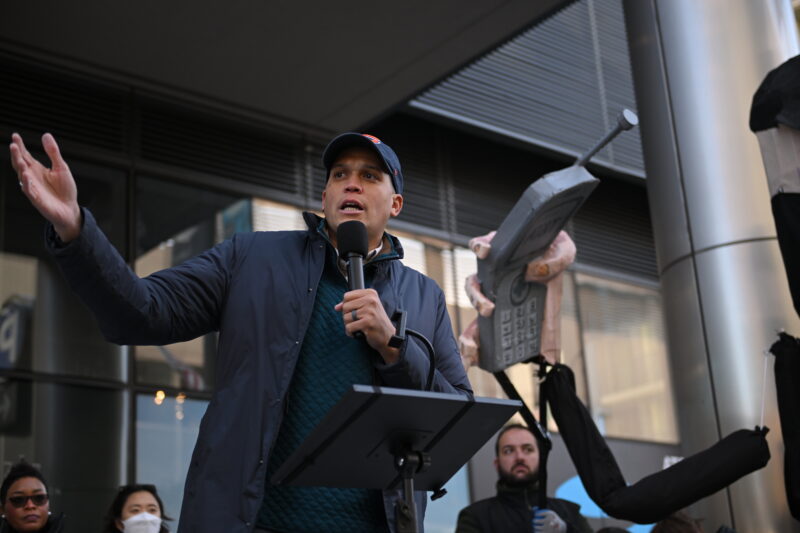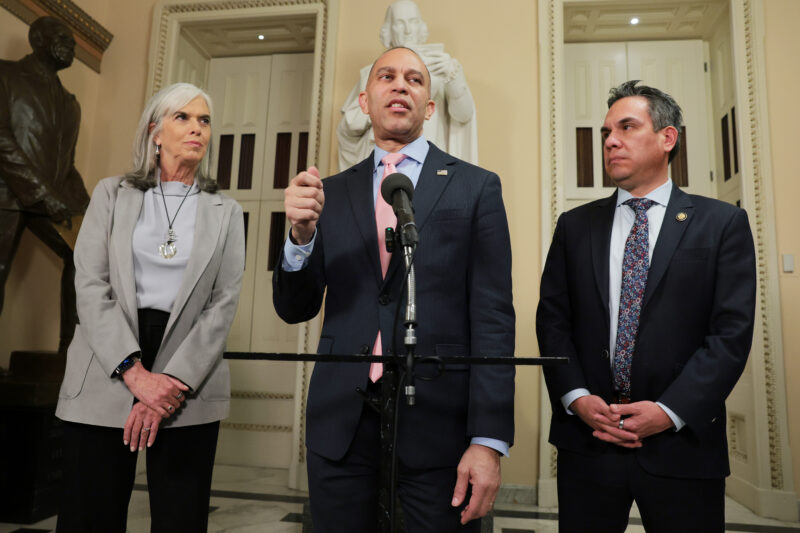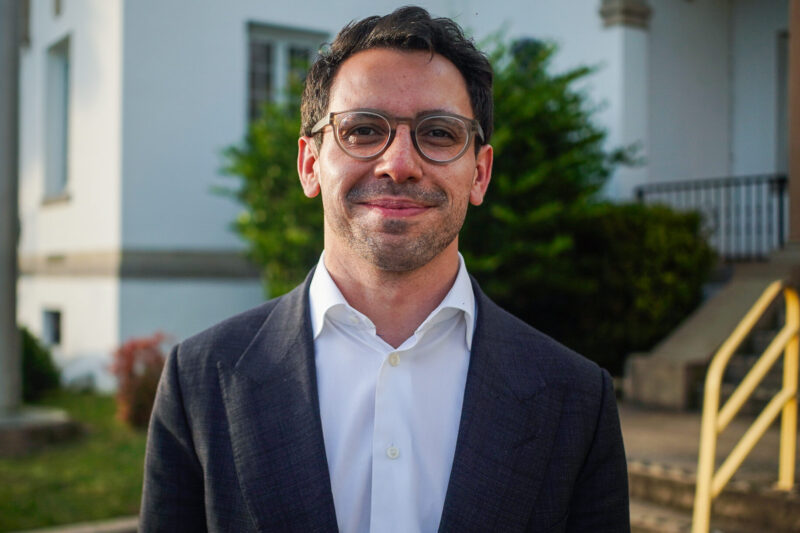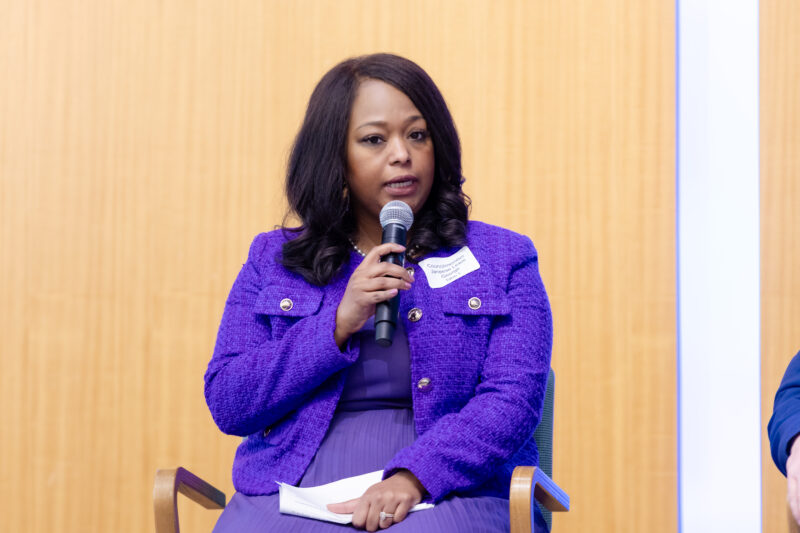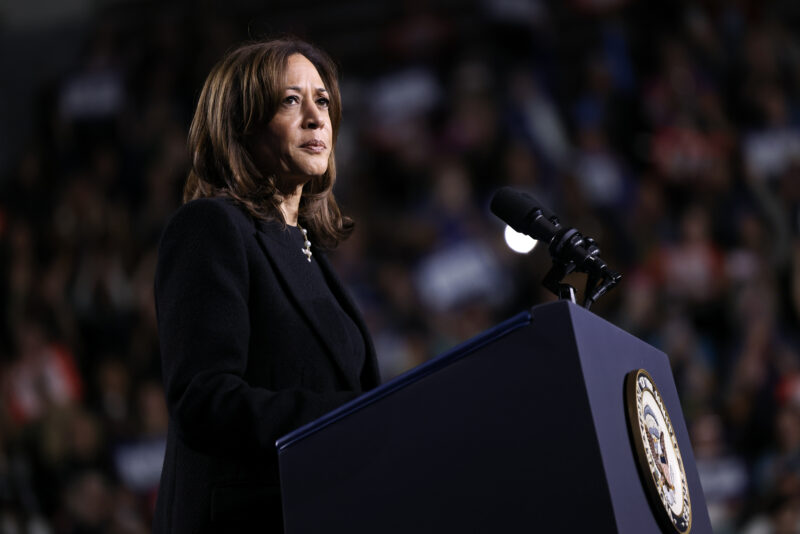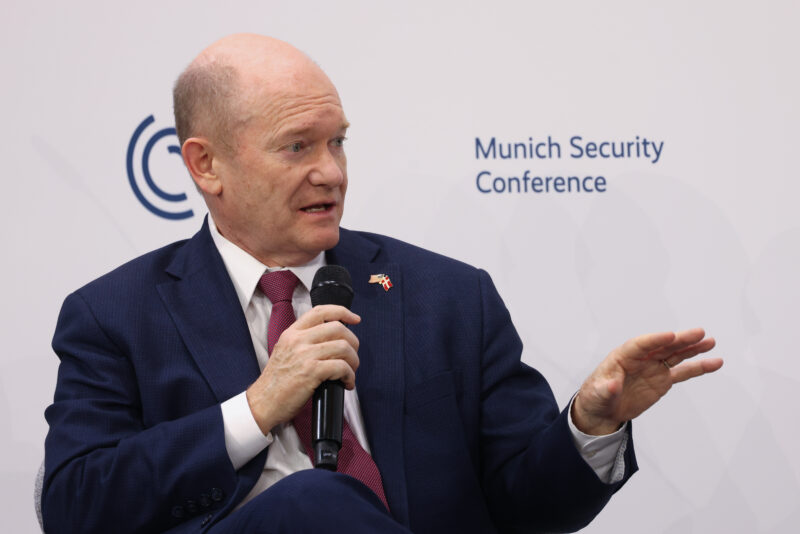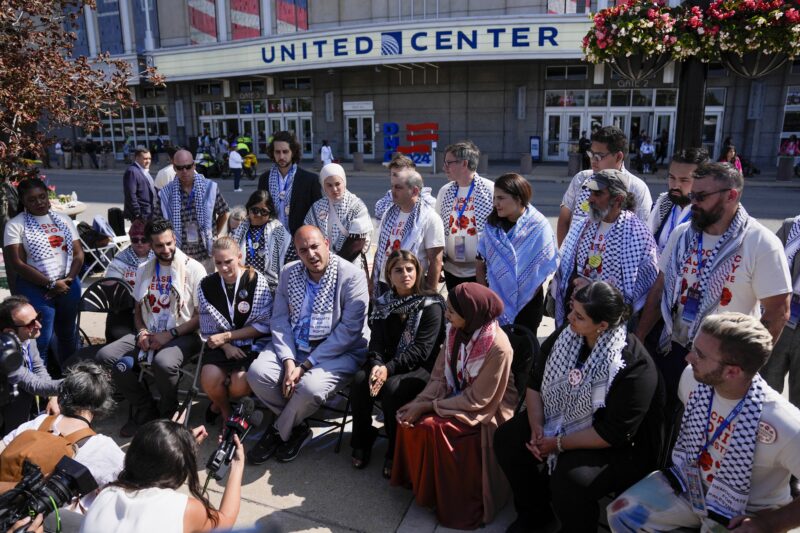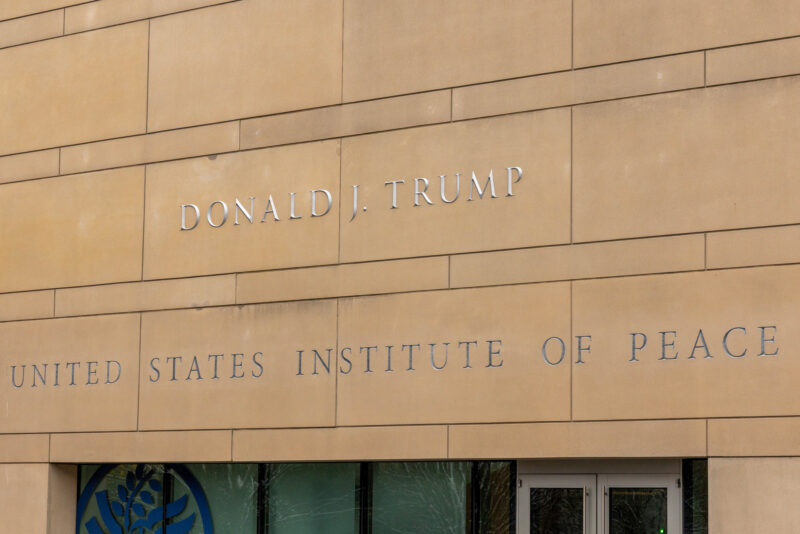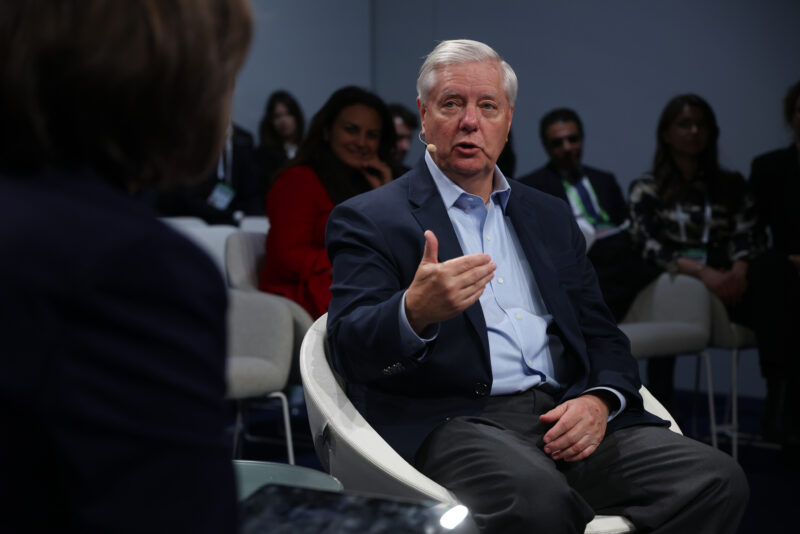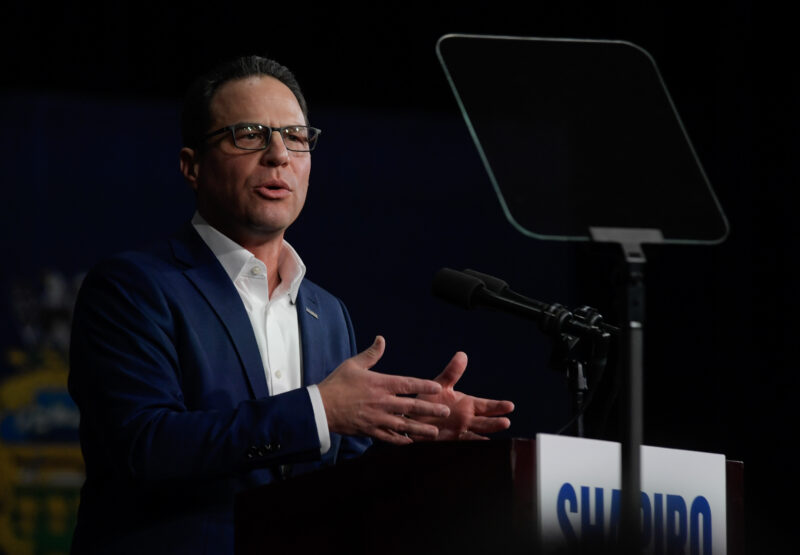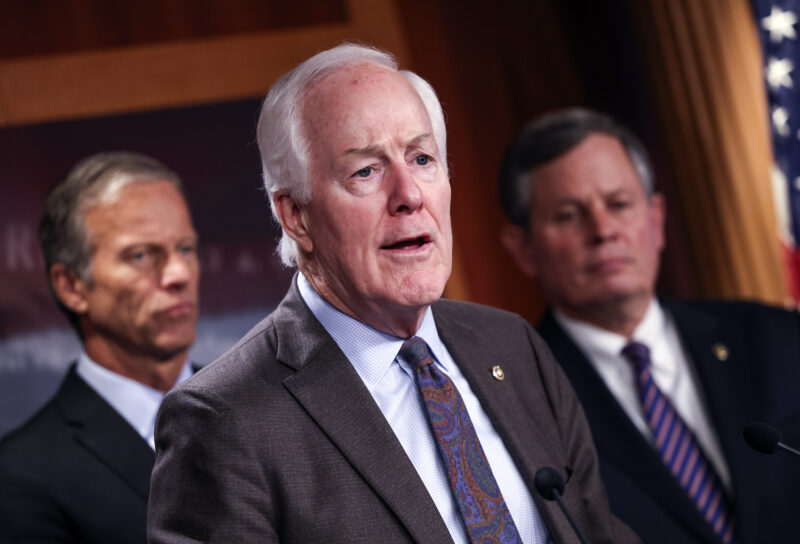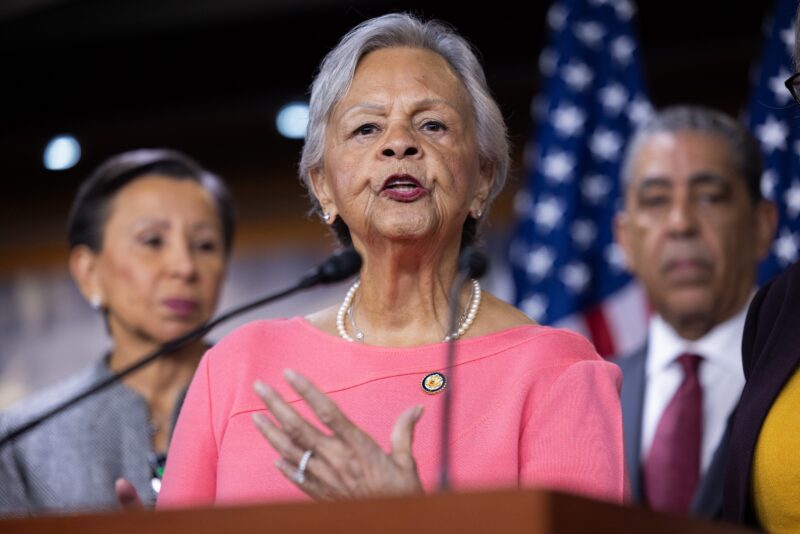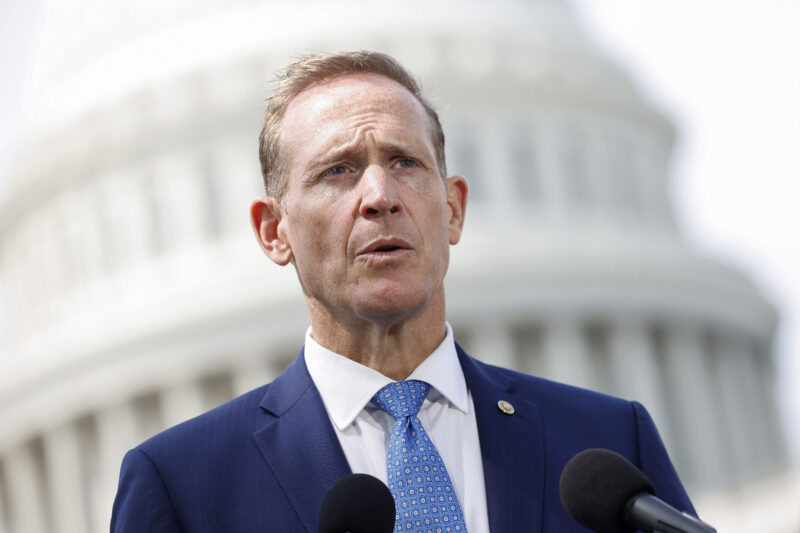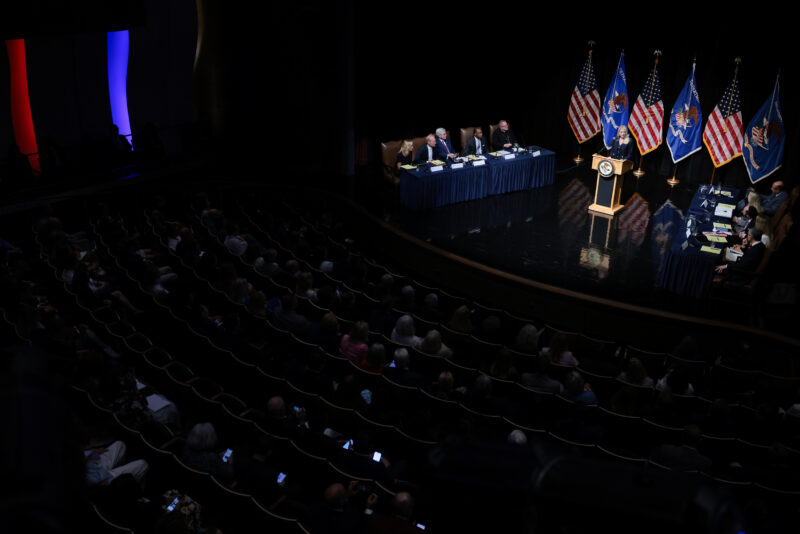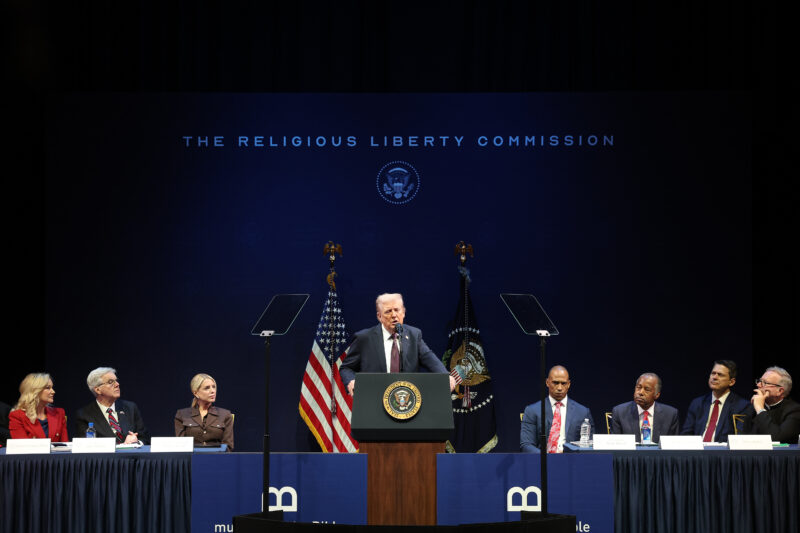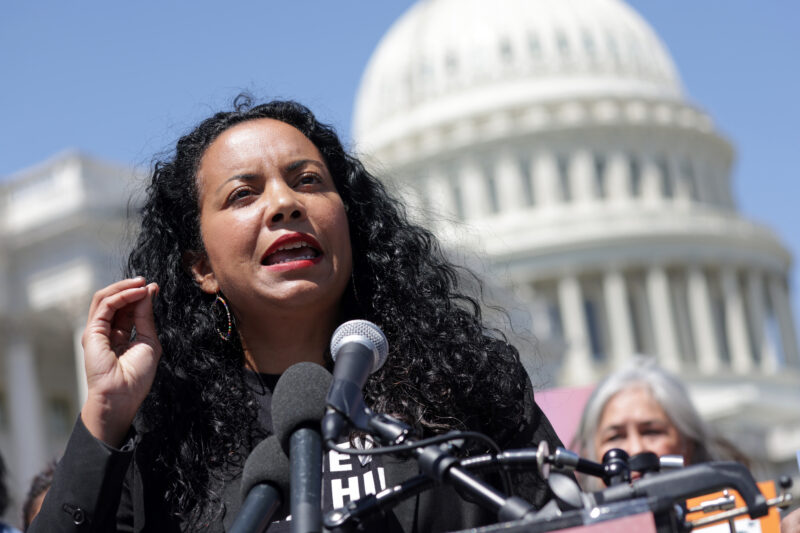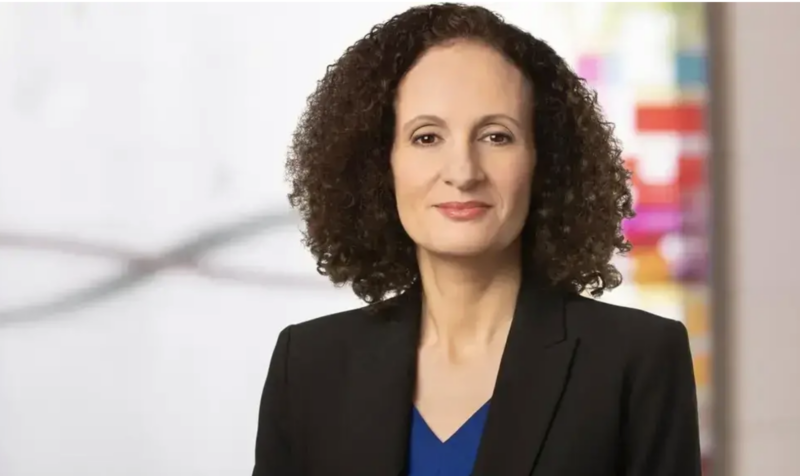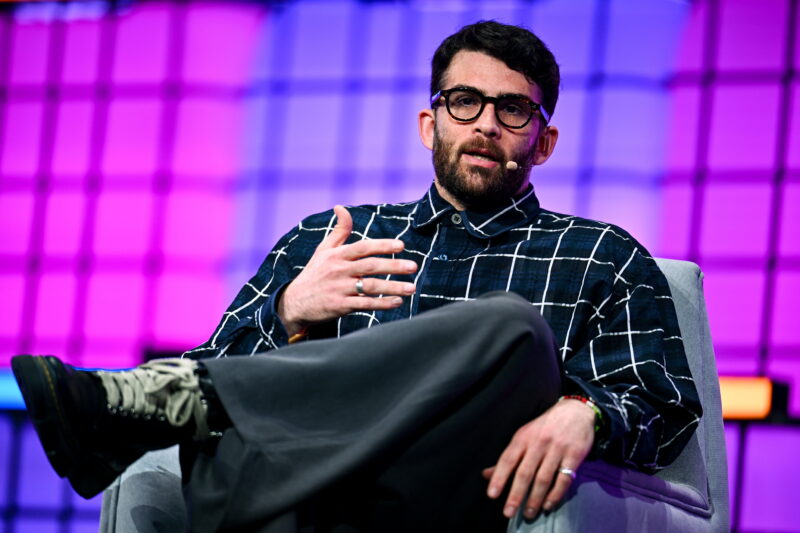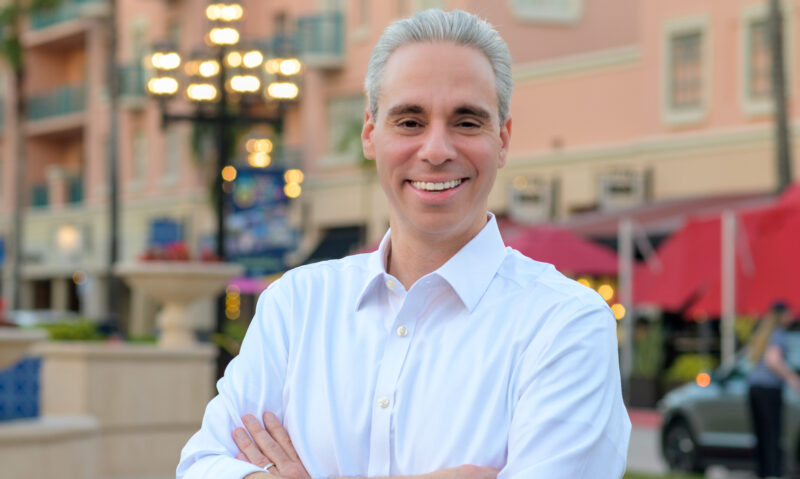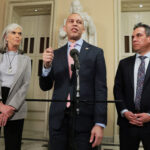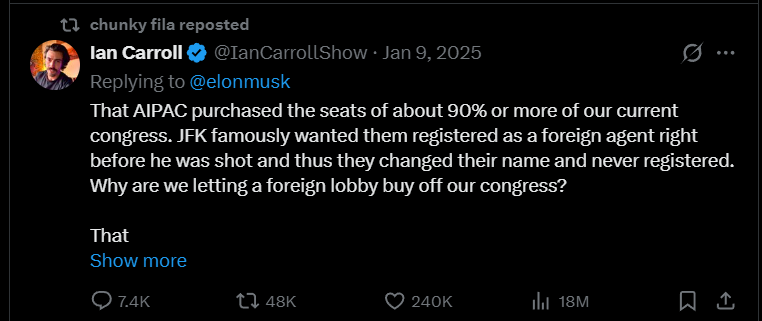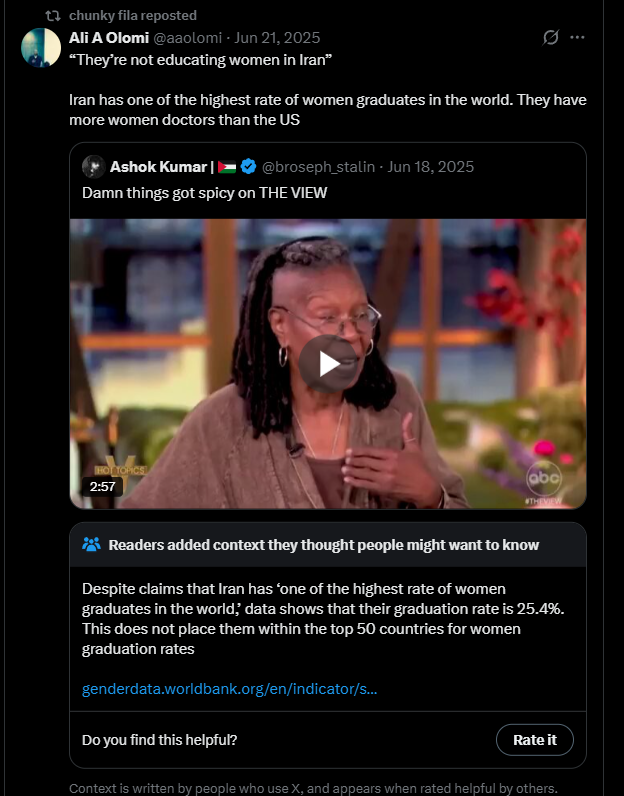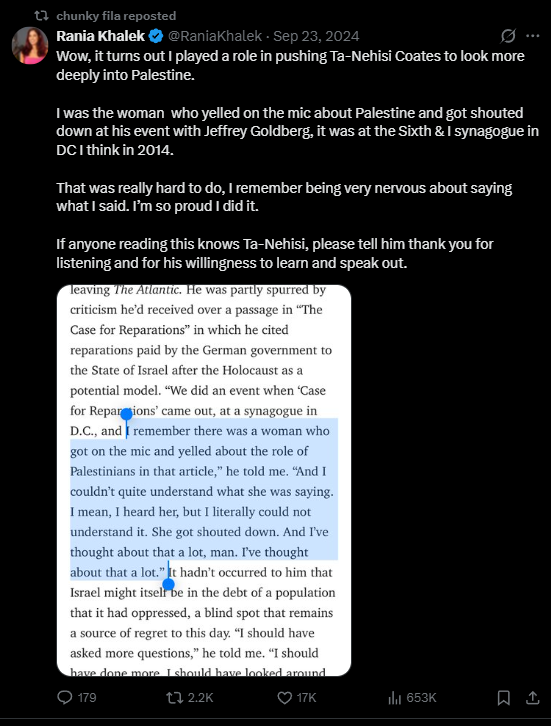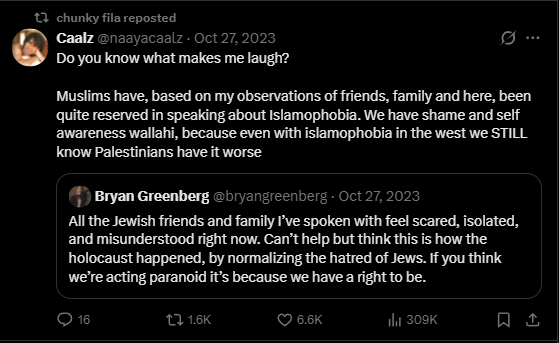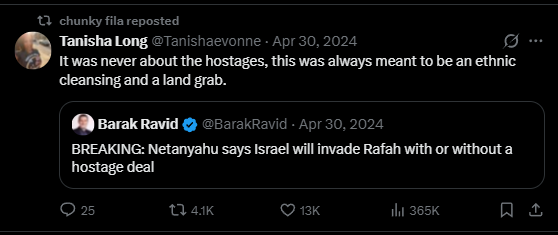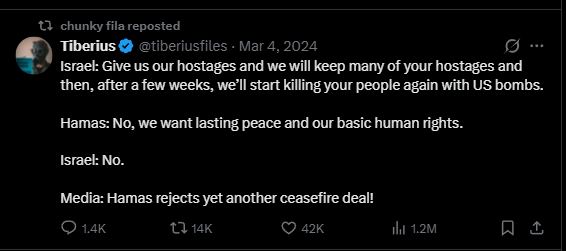Plus, Mamdani makes surprise WH visit

Umman Foreign Ministry/Handout/Anadolu via Getty Images
Special Envoy Steve Witkoff (C) advisor Jared Kushner (L) meet with Omani Foreign Minister Badr bin Hamad Al Busaidi (R), who is mediating between the parties in the third round of Iran-U.S. negotiations held in Geneva, Switzerland, on February 26, 2026.
Good Thursday afternoon!
This P.M. edition is reserved for our premium subscribers — offering a forward-focused read on what we’re tracking now and what’s coming next.
It’s me again — Danielle Cohen-Kanik, U.S. editor at Jewish Insider and curator, along with assists from my colleagues, of the Daily Overtime. Please don’t hesitate to share your thoughts and feedback by replying to this email.
📡On Our Radar
Notable developments and interesting tidbits we’re tracking
U.S.-Iran negotiations wrapped up for the day in Geneva without a decisive result: Omani Foreign Minister Badr Albusaidi said the sides had made “significant progress” while Iranian Foreign Minister Abbas Araghchi told state media they negotiated “very seriously,” but no agreement was reached.
Araghchi said technical experts will meet on Monday in Vienna at the International Atomic Energy Agency and fourth round negotiations will take place later next week, after consultations in both capitals…
Secretary of State Marco Rubio told reporters yesterday that Iran “poses a very grave threat to the United States” and is trying to reconstitute its nuclear program. “After their nuclear program was obliterated, they were told not to try to restart it, and here they are. You can see them always trying to rebuild elements of it. They’re not enriching right now, but they’re trying to get to the point where they ultimately can.”
Beyond the nuclear issue, Rubio said, Iran also has “conventional weapons that are solely designed to attack America and attack Americans. … These things have to be addressed.” While the current talks are focused solely on Tehran’s nuclear program, “it’s also important to remember that Iran refuses to talk about ballistic missiles to us or to anyone, and that’s a big problem”…
House Democratic leaders said in a joint statement today that they plan to force a vote “as soon as Congress reconvenes next week” on a resolution blocking military action against Iran without congressional authorization, Jewish Insider’s Marc Rod reports. Three Democrats have already indicated they will oppose the resolution, with other defections likely to follow…
U.S. forces raided a ship last month and seized cargo heading from China to Iran, officials told The Wall Street Journal, part of a broader effort to head off Iran’s covert arms purchases after the 12-day war last June. The cargo was reportedly intended for Iranian companies that procure weapons for the regime’s missile program…
The Journal interviews fighter pilots involved in the U.S. bombing campaign against the Houthis last spring, as military assets are once again amassing in the Middle East for a potential operation against Iran…
Maine Senate candidate Graham Platner amplified a social media post today from a far-right conspiracy theorist well-known for viciously antisemitic commentary — before quickly deleting the statement, JI’s Matthew Kassel reports. In a comment on X, Platner approvingly boosted a remark opposing war with Iran from Stew Peters, who has said Judaism is “satanic” and a “death cult,” promoted blood libels and called for a “final solution” to mass-deport American Jews…
The issue is particularly sensitive for Platner, who earlier in his campaign faced scrutiny over a Nazi tattoo on his chest, which he has since had covered. He was pressed today on a YouTube call-in show about his knowledge of the tattoo’s symbolism because of his self-identification as a WWII history enthusiast.
“I was well aware that they [Nazis] used a similar-looking thing,” Platner said. “You have to admit it’s not a ‘similar-looking thing,’ it’s the same thing. … Anyone who’s remotely a WWII buff knows what that is,” the caller replied. Platner answered, “I’m not going to apologize for something that I didn’t know about or do”…
New York City Mayor Zohran Mamdani made an unannounced visit to the White House to meet with President Donald Trump today. Among other issues, the two discussed housing and immigration activities…
The family of Francesca Albanese, the U.N. special rapporteur for Israel and the Palestinian territories, sued Trump and other administration officials yesterday in district court, alleging that the sanctions imposed on Albanese by the U.S. violate her First, Fourth and Fifth Amendment rights…
Israeli President Isaac Herzog and Foreign Minister Gideon Sa’ar attended an iftar meal to break the Ramadan fast hosted by UAE Ambassador to Israel Mohamed Al Khaja in Tel Aviv, where Herzog said that the “members of the Abraham Accords should be treated in an upgraded manner as they pursue the noble cause of peace.”
“And this I say especially,” Herzog continued, “when there are nations who are spreading hate, spreading blasphemy against nations who seek peace — against the Emiratis, against the Israelis,” ostensibly referring to Saudi Arabia…
As Indian Prime Minister Narendra Modi wrapped up his trip to Israel today, the two countries signed 16 memorandums of understanding to expand cooperation in fields including agriculture and AI. Modi also met with the cast of “Fauda”…
⏩ Tomorrow’s Agenda, Today
An early look at tomorrow’s storylines and schedule to keep you a step ahead
Keep an eye out in Jewish Insider for a profile of Sam Bregman, the Jewish cowboy-hat wearing former district attorney running for governor of New Mexico.
ADL’s Desert Region will hold its annual conference at Arizona State University, with speakers including ADL CEO Jonathan Greenblatt, Arizona Gov. Katie Hobbs, Phoenix Mayor Kate Gallego and state Rep. Alma Hernandez.
J Street’s annual conference will kick off Saturday in Washington. Speakers will include former Israeli Prime Minister Ehud Olmert, Sens. Chris Van Hollen (D-MD), Brian Schatz (D-HI), Adam Schiff (D-CA), Tim Kaine (D-VA) and Chris Murphy (D-CT) and Reps. Nancy Pelosi (D-CA), Sara Jacobs (D-CA), Sean Casten (D-IL) and Madeleine Dean (D-PA). J Street’s PAC will hold an event with Roy Cooper, the former governor of North Carolina now running for Senate, and phone banking sessions for Evanston, Ill., Mayor Daniel Biss, running for the House.
We’ll be back in your inbox with the Daily Overtime on Monday. Shabbat Shalom!
Stories You May Have Missed
EDUCATION CONSTERNATION
Jewish groups file suit against California for widespread failure to address antisemitism in K-12 schools
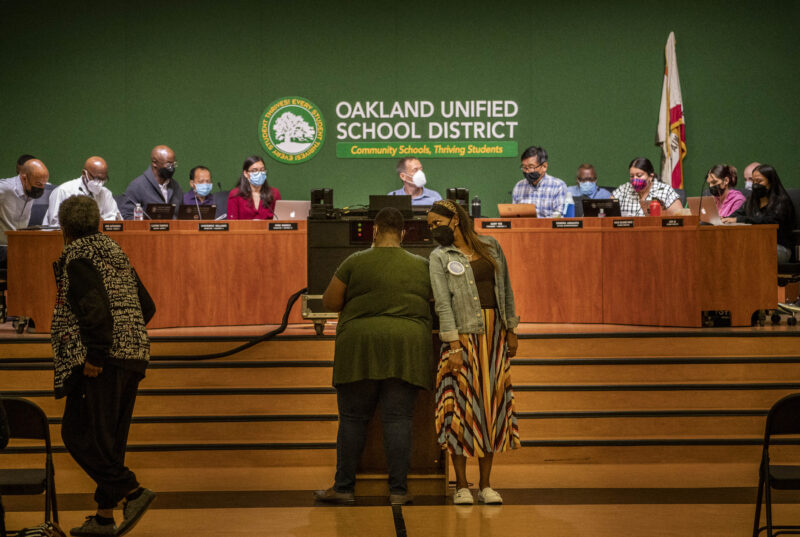
The suit highlights several complaints from Jewish parents and children statewide, in school districts including Berkeley, Los Angeles, Santa Clara, San Francisco, Campbell Union, Fremont, Etiwanda and Oakland
PRAIRIE STATE DEBATE
Abughazaleh says she doesn’t support Iron Dome, dodges on Israel’s right to exist

The far-left influencer, running competitively in a Chicago-area district with a sizable Jewish constituency, debated primary rivals Laura Fine and Daniel Biss on Wednesday
Plus, Witkoff calls for indefinite Iran nuclear deal

Mario Tama/Getty Images
An attendee wears a jacket at an Iowa caucus watch party organized by Metro D.C. Democratic Socialists of America, on February 3, 2020 in Washington, DC.
Good Wednesday afternoon!
This P.M. edition is reserved for our premium subscribers — offering a forward-focused read on what we’re tracking now and what’s coming next.
It’s me again — Danielle Cohen-Kanik, U.S. editor at Jewish Insider and curator, along with assists from my colleagues, of the Daily Overtime. Please don’t hesitate to share your thoughts and feedback by replying to this email.
📡On Our Radar
Notable developments and interesting tidbits we’re tracking
Ahead of the third round of U.S.-Iran negotiations taking place in Geneva tomorrow, Vice President JD Vance told Fox News that President Donald Trump “has a number of other tools at his disposal” besides diplomacy to ensure “the craziest and worst regime in the world” does not obtain nuclear weapons, following on the president’s remarks during last night’s State of the Union calling Iran “the world’s No. 1 sponsor of terror”…
In response to Trump’s comments, where he also said Iran was developing advanced ballistic missiles and had killed 32,000 protesters, Iranian Foreign Ministry spokesperson Esmail Baghaei tied Trump to the “law of propaganda coined by Nazi [chief propagandist] Joseph Goebbels.”
“This is now systematically used by the U.S. administration and the war profiteers encircling it, particularly the genocidal Israeli regime … Whatever they’re alleging in regards to Iran’s nuclear program, Iran’s ballistic missiles, and the number of casualties during January’s unrest is simply the repetition of ‘big lies,’” Baghaei wrote on X…
White House Special Envoy Steve Witkoff, who is leading Iran negotiations alongside Jared Kushner, reportedly told AIPAC members at the group’s summit in Washington yesterday that any deal reached with Iran should not have a “sunset clause,” as the 2015 Joint Comprehensive Plan of Action was criticized for.
“We start with the Iranians with the premise that there is no sunset provision. Whether we get a deal or not, our premise is: you have to behave for the rest of your lives,” Witkoff told the group, according to Axios. He said talks are currently focused only on the nuclear issue, but if they are successful, the administration would look to hold additional talks on Tehran’s missile program and support for terror proxies…
Satellite photos analyzed by the Associated Press appear to show U.S. ships that typically dock in Bahrain as part of the U.S. Navy’s 5th Fleet have moved out to sea. The 5th Fleet similarly scattered its ships during the U.S. strikes in Iran last June…
Dutch airline KLM announced a suspension of flights between its hub in Amsterdam and Israel’s Ben Gurion Airport starting March 1 until further notice, saying in a statement that it is currently “not commercially or operationally feasible for KLM to operate flights to Tel Aviv.” It’s the first airline to pause flights amid the current unrest with Iran…
On the campaign trail, Washington, D.C., mayoral candidate Janeese Lewis George vowed to reject the “Zionist lobby” in a questionnaire seeking the endorsement of the Metro D.C. chapter of the Democratic Socialists of America, Jewish Insider’s Gabby Deutch reports, a category that the DSA said includes AIPAC, Democratic Majority for Israel, Christians United for Israel and J Street.
Referencing her appearance at an event with the Jewish Community Relations Council of Greater Washington in December, Lewis George assured the DSA she “disagree[s] with the JCRC on a number of issues,” including its opposition to describing Israel’s actions in Gaza as a genocide and its “definition of antisemitism that criminalizes dissent, and their attacks on activists.”
Ron Halber, CEO of the JCRC, told JI, “As far as I’m concerned, [the DSA’s questionnaire] is an antisemitic manifesto. They are making the price of their endorsement the social exclusion of Jews”…
Illinois state Sen. Laura Fine, a Democrat running for an open Illinois House seat, unapologetically championed her backing for Israel in a position paper obtained by JI’s Marc Rod, amid attacks from anti-Israel activists and groups over her support for the Jewish state and backing from pro-Israel supporters.
Fine described Israel in the paper as “more than just a strategic ally, it is a beacon of democracy in one of the world’s most volatile regions,” as she and some of her primary opponents, including Evanston Mayor Daniel Biss and far-left activist Kat Abughazaleh, are set to participate in a televised debate tonight…
The U.S.-led Board of Peace released a video today laying out its vision for Gaza. The board’s goal by Year 3 is to fully rebuild the southern Gazan city of Rafah and have Gaza “connected to the world through an Abrahamic gateway, linking it with Egypt, Israel, Jordan, Saudi Arabia, the UAE and extending to India and Europe.” By the board’s 10th year, it said, Gaza will be “self-governed,” without specifying who will oversee the enclave and how Hamas will be removed from power…
Knesset Speaker Amir Ohana awarded Indian Prime Minister Narendra Modi the newly established Medal of the Knesset, the highest honor of the body, after Modi’s address there today. His remarks were warmly received by members of Knesset and Israeli Prime Minister Benjamin Netanyahu, who was also in the chamber…
Following Israel’s recognition of Somaliland’s independence in December, Jerusalem accepted the appointment of Mohamed Hagi as the first Somaliland ambassador to the Jewish state (and its first fully accredited ambassador anywhere in the world). Hagi “was a member of the inner circle of officials who promoted the establishment of relations between Israel and Somaliland,” the Israeli Foreign Ministry said, and vowed that a reciprocal Israeli ambassador “will soon be appointed”…
Former Harvard President Larry Summers will remain on leave from his teaching position at the Ivy League school for the duration of the academic year, at which point he will retire, Harvard announced today, after files released by the Department of Justice showed Summers maintained a relationship with sex trafficker Jeffrey Epstein after the financier had been convicted of prostitution involving a minor…
⏩ Tomorrow’s Agenda, Today
An early look at tomorrow’s storylines and schedule to keep you a step ahead
Keep an eye out in Jewish Insider for a preview of Fox Nation’s new docudrama on King David, offering a dramatic reenactment of the biblical coming-of-age story of the Jewish leader.
White House Special Envoy Steve Witkoff and Jared Kushner will hold discussions with Iranian Foreign Minister Abbas Araghchi in Geneva, mediated by Omani Foreign Minister Badr Albusaidi.
California Jewish groups including the JCRC Bay Area, the Jewish Federation of Los Angeles and Jewish California, which rebranded today from its previous name of JPAC, are hosting a forum for candidates running for governor, as Gov. Gavin Newsom reaches his term limit. Participating candidates include former presidential contender Tom Steyer, Rep. Eric Swalwell (D-CA), San Jose Mayor Matt Mahan and former Los Angeles Mayor Antonio Villaraigosa, all of whom are Democrats, as well as Republican commentator Steve Hilton.
Stories You May Have Missed
PUSHING BACK
Moderate Democrats mock notion that Kamala Harris lost because she wasn’t tougher on Israel
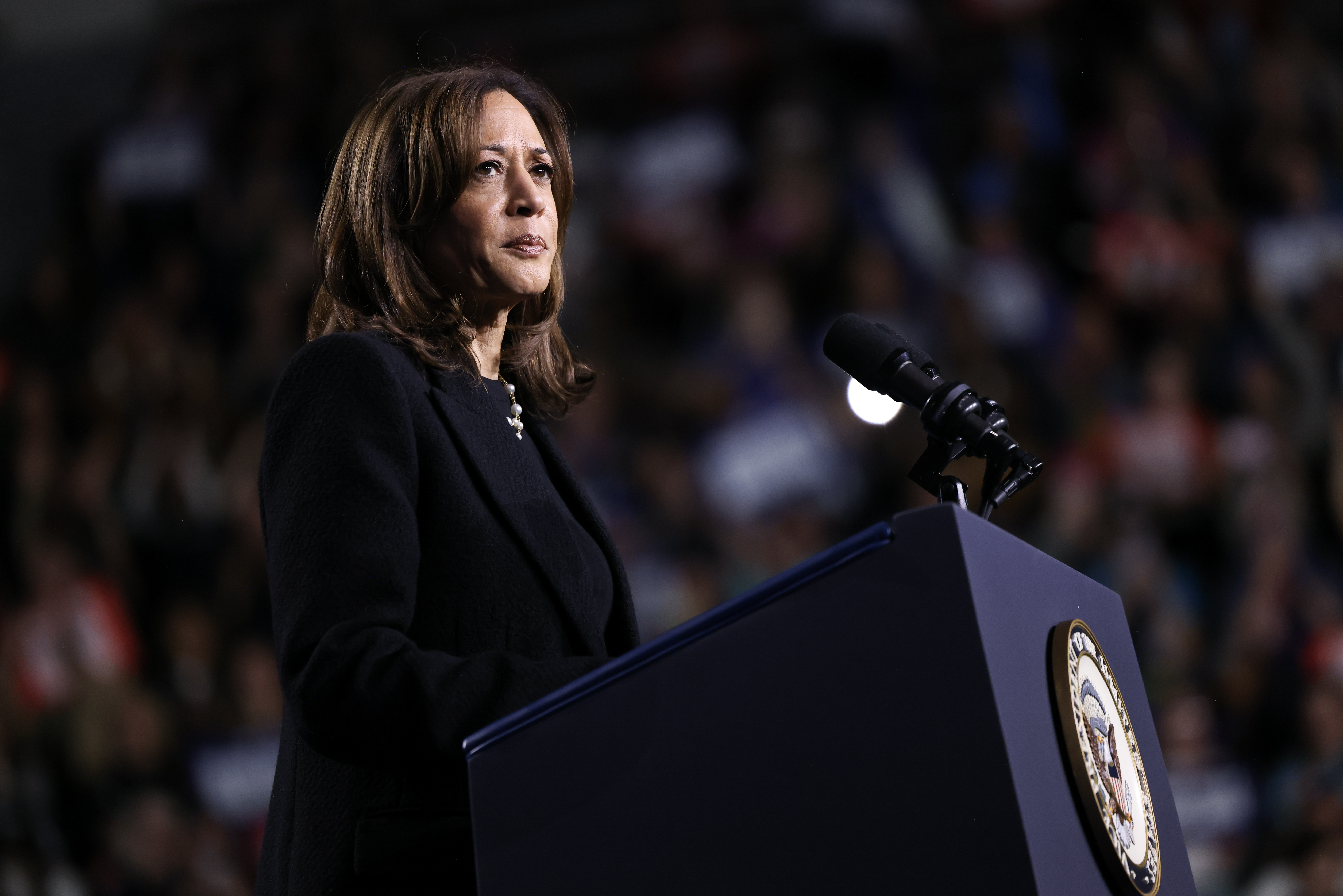
Rep. Jared Moskowitz, representing a swing district: ‘The idea that the vice president lost every swing state because she wasn’t more extreme on this issue is laughable’
CAPPELLO’S CAMPAIGN
Democrat John Cappello brings military experience in Israel to race against Mike Lawler

The Air Force veteran, who served for six years at the U.S. Embassy in Israel, said Israel should continue to make efforts toward peace
The Air Force veteran, who served for six years at the U.S. Embassy in Israel, said Israel should continue to make efforts toward peace
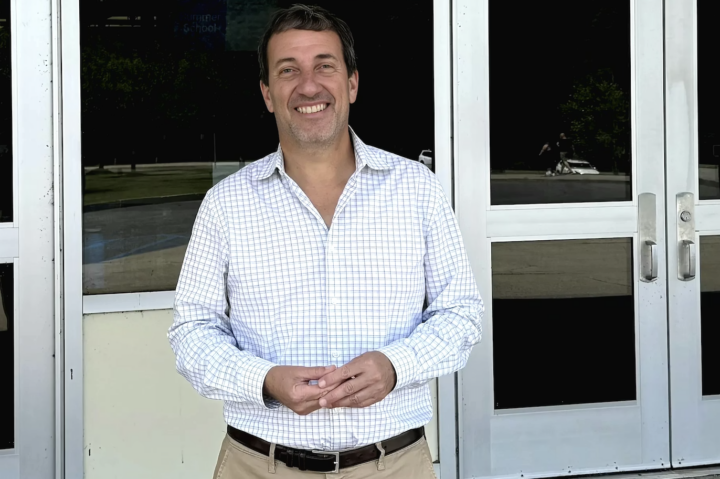
Campaign Website
John Cappello
Democrat John Cappello, an Air Force veteran, brings experience as a senior U.S. military official in Israel to the crowded race to take on Rep. Mike Lawler (R-NY) in New York’s 17th Congressional District.
But, entering the race later than most other competitors and lagging behind in fundraising, he has significant ground to make up before the June primary.
Cappello spent six years working as a military official in the U.S. Embassy in Israel, from 2010- 2016, first as the Air Force attache and later on missile-defense issues. After his time in the military, Cappello was tapped as a senior fellow at the Foundation for Defense of Democracies, before going on to found his own foreign policy-focused groups.
“I always understood, being a student of history and of politics, that the United States’ relationship with Israel was a very unique one and a very close one,” Cappello said in an interview with Jewish Insider. “But to be able to be there to see it and to be part of both nurturing it and building it was an honor.”
During his first three years at the embassy, Cappello worked under then-U.S. Ambassador to Israel Dan Shapiro, helping to set up and escort delegations of American military officials and business leaders; in his second three years, he helped run the Missile Defense Agency liaison office.
While in Israel, he also took classes in Middle East Studies at Tel Aviv University.
He said he was on the ground in a period in which “the challenges towards Israel were morphing and were changing dramatically” — including an increase in rocket attacks from Gaza into Israel.
Cappello said that the U.S. and the world need to stop “kicking the can” on the Israeli-Palestinian peace process, and that the current cycle of “mow[ing] the grass” with a new war every few years is not a viable long-term solution for Israel’s prosperity.
But he also acknowledged the concerns in Israel about trying to reach peace, after previous efforts have gone unreciprocated.
“It’s complex because the Israelis see it that they’ve continually extended a hand, continually tried to compromise,” Cappello said. “How many times do your neighbors attack you, you defeat them, and then you’re still expected to somehow compromise and give back?”
But he said that, with U.S. support, Israel has “never been more powerful” and that there is “room for them to accept risk,” but only with a guarantee that the U.S. and the Western world have its back.
He said moving toward peace will require strong leadership on all sides — including an end to Palestinian incitement and hatred against Jews and Israel — and backing from the U.S., the Europeans and the Arab states.
He added that the events of and since Oct. 7, 2023, while tragic, have “opened a door, in a way,” with Hamas and Hezbollah weakened, the fall of the Syrian regime and the weakening of the Iranian regime.
“I think the United States needs to play a leadership role, and an aggressive leadership role — not about building hotel complexes and luxury resorts in Gaza, but actually working towards development that will provide the Palestinians the opportunity to live in partnership with their neighbors, because all of the countries in that region can benefit from what the Israelis have done,” Cappello argued.
Cappello rejected the idea of conditioning U.S. aid to Israel and said that, while Israel is “an imperfect democracy” and deserving of criticism for some of the way it handled the war in Gaza, “it is a democracy, it is an important partner.”
“The Israelis have legitimate concerns to defeat an enemy that’s bent on destroying it. They also have a responsibility … to do everything they can to limit civilian casualties,” Cappello said.
He said the U.S. should “use our partnership, our leverage, in a way that allows Israel to defend itself, but to do so in a manner that fits the democratic values it espouses.” He said that cutting off weapons sales would not reduce conflict because Israel would still need to find ways to defend itself.
He emphasized that Israel does have stringent targeting procedures to limit civilian casualties and that the war in Gaza was a pursuit of “legitimate military goals” but these are complicated by Hamas militants intermingling with civilians.
“The Israelis have legitimate concerns to defeat an enemy that’s bent on destroying it. They also have a responsibility … to do everything they can to limit civilian casualties,” he said.
Cappello said that the U.S. strikes on Iran’s nuclear program sent an important message in punishing the regime for its ballistic missile strikes on Israel and set back nuclear efforts, but did not fulfill the administration’s initial claims of fully obliterating the nuclear program.
“The lack of seriousness and planning and strategic foresight, I think, is a real problem,” he said.
Cappello also said that it would be “irresponsible” if the U.S. repeatedly promised protesters in Iran that help was on the way, “unless we are really going to back it up.” But he said that any further strikes on Iran need to be based on specific goals and objectives that can be achieved.
“I’ve talked to a lot of young people, and this topic has come up a couple of times, about Israel, support for Israel. Smart, intelligent young people that have graduated from university — but they have this misguided notion because they’re being fed information. They see it on their feed, this is what they read,” Cappello said.
“What is the objective here? I don’t know — and so in the absence of knowing, I’m reticent to use military force because it has other ramifications, not the least of which is putting American service members in harm’s way,” he continued. He said other nonmilitary responses include continued and increased sanctions targeting Iranian officials.
He tied the antisemitism crisis in the United States to a failure of leadership — with leaders failing to call out antisemitism and distortions of history and indulging in antisemitic narratives themselves. He said that education about antisemitism is also critical.
“I’ve talked to a lot of young people, and this topic has come up a couple of times, about Israel, support for Israel. Smart, intelligent young people that have graduated from university — but they have this misguided notion because they’re being fed information. They see it on their feed, this is what they read,” Cappello said.
Asked about New York City Mayor Zohran Mamdani’s record, he said that he “understand[s] the concerns and he has a responsibility to address the things that he said in the past,” adding that he wants to see Mamdani admit mistakes he has made and change.
“Just because the voters voted [for] him doesn’t mean we accept racism or antisemitism or any of those, but, I think he is a work in progress, and let’s see,” Cappello said. “He should be held accountable. He has a responsibility to continue. He said he’s ‘the mayor for everyone’ … now he’s got to step up.”
Facing a wide field of competitors in the Democratic primary, Cappello argued that his service to the country and experience dealing with national and international challenges would make him a strong leader for the district.
But he also acknowledged that he entered the race later than most other candidates, and that he needs to work to introduce himself to voters. He argued that most voters aren’t paying attention to the race yet, so there is still plenty of time for him to make that outreach.
“The thing that keeps me going, despite the crazy local politics and the disgusting amount of money we have to raise, is when I talk to people, people do want change,” Cappello said. “They want to believe that we can do politics differently.”
Cappello has raised $53,000 since entering the race and closed out 2025 with just $20,000 on hand, making his total fundraising haul less than one-fifth of the next closest competitor’s. But several others closed out the quarter with similarly depleted war chests.
Plus, Trump says Iran won't rule out nuclear weapons

Mario Tama/Getty Images
Protestors gather after police cleared a new encampment on the UCLA campus on May 23, 2024 in Los Angeles, California.
Good Tuesday afternoon!
This P.M. edition is reserved for our premium subscribers — offering a forward-focused read on what we’re tracking now and what’s coming next.
It’s me again — Danielle Cohen-Kanik, U.S. editor at Jewish Insider and curator, along with assists from my colleagues, of the Daily Overtime. Please don’t hesitate to share your thoughts and feedback by replying to this email.
📡On Our Radar
Notable developments and interesting tidbits we’re tracking
Previewing his State of the Union address tonight, where it remains to be seen if he will make any announcements on Iran, President Donald Trump told reporters, “Iran wants to make a deal more than I do, but they just won’t say the sacred phrase: ‘We won’t build nuclear weapons,’” signaling that the two sides are still at an impasse ahead of the third round of negotiations scheduled for Thursday…
Secretary of State Marco Rubio briefed the congressional Gang of Eight, the bipartisan set of leaders advised on classified matters by the executive branch, this afternoon to provide an update on Iran, with CIA Director John Ratcliffe reportedly joining the discussion. The White House did not brief the group before striking Iran last June, drawing ire from Democrats…
Ahead of the meeting, Senate Minority Leader Chuck Schumer (D-NY) told C-SPAN about potential Iran strikes, “Closed-door briefings are fine, but the administration has to make its case to the American people on something as important as this”…
Around a dozen U.S. F-22 stealth fighter jets departed from the U.K. today to be deployed at an Israeli Air Force base in the south of the country, as over 150 aircraft are being moved to the region. Military experts told The Washington Post that the “assets being assembled are indicative of a multiday campaign without a ground invasion”…
The Coast Guard is investigating a swastika drawn at its primary recruit training center in New Jersey, where Coast Guard commandant Adm. Kevin Lunday quickly flew to address recruits and staff about the incident. Lunday recently came under fire from Congress, and had his confirmation delayed, over a change in Coast Guard policy that downgraded the swastika from a prohibited hate symbol to “potentially divisive,” which was eventually walked back.
Regarding the recent incident, Lunday said in a statement to The Washington Post, “Anyone who adheres to or advances hate or extremist ideology — get out. Leave. You don’t belong in the United States Coast Guard and we reject you”…
Rep. Brad Sherman (D-CA) is pushing for legislation to require an affirmative congressional vote prior to the U.S. reaching any nuclear deal with Saudi Arabia, Jewish Insider’s Marc Rod reports, following a notification from the administration to Congress indicating that it is moving toward a deal that could allow Riyadh to enrich uranium for civilian purposes.
The notification procedures, which do not include specific terms of a potential deal, suggest that Saudi Arabia will not be required to agree to more intrusive International Atomic Energy Agency inspections or “gold standard” safeguards — which would require Saudi Arabia to agree not to enrich or reprocess nuclear material — used for the U.S. nuclear cooperation agreement with the United Arab Emirates…
The Justice Department sued the University of California today under Title VII of the Civil Rights Act, which prohibits employment discrimination, alleging that the UCLA campus created a “hostile work environment against Jewish and Israeli faculty and staff.”
During campus anti-Israel protests in 2024, the DOJ said, “the University allowed antisemitic harassment to continue unabated for days” and “has ignored, and continues to ignore, gross and repeated violations” of time, place and manner restrictions on student protest. The department further claimed Jewish and Israeli faculty at the school have been physically threatened, ostracized, harassed, forced to take leave and assaulted…
The New York Times details efforts by New York’s business community and Democratic establishment to organize and promote the moderate wing of the party in response to New York City Mayor Zohran Mamdani’s rise to power. Some of the individuals involved, including former Gov. Andrew Cuomo allies Phil Singer and Steven Cohen, are considering forming PACs, watchdog groups, lobbying campaigns and more…
New York’s Working Families Party endorsed Brooklyn Borough President Antonio Reynoso to replace retiring Rep. Nydia Velázquez (D-NY) yesterday over Mamdani’s objections. The mayor has been backing Assemblymember Claire Valdez, who, like Mamdani, is a member of the Democratic Socialists of America and a vocal critic of Israel, and he had lobbied the WFP to endorse her or to stay out of the race. WFP’s director, Jasmine Gripper, told the Times, “At the end of the day, Zohran is an individual who gets to weigh in as an individual”…
A new poll from the University of New Hampshire found oyster farmer Graham Platner with a commanding lead among likely Senate Democratic primary voters, outdistancing Gov. Janet Mills by 34 points, with the primary less than four months away. In a general election matchup with incumbent Sen. Susan Collins (R-ME), Platner leads Collins by 11 points, while Mills and Collins are neck-and-neck…
Khalid Turaani, executive director of the Ohio branch of the Council on American-Islamic Relations (CAIR), testified at the Ohio Senate Judiciary Committee last week against a bill to codify the International Holocaust Remembrance Alliance’s working definition of antisemitism, where he claimed that Israel operates the world’s largest human skin bank and harvests the skin from deceased Palestinians. “And if I call them Nazis,” Turaani continued, “your law is going to punish me.”
The Anti-Defamation League’s Ohio River Valley office condemned Turaani’s speech, saying that the “antisemitic organ harvesting myth plays on the blood libel trope, which has spurred the torture, murder, and expulsion of Jews for centuries”…
The U.S. Embassy in Israel announced that, as part of the government’s “efforts to reach all Americans,” the embassy will be providing consular services for one day only at several locations across Israel and the West Bank, including Ramallah and the Jewish settlement of Efrat…
⏩ Tomorrow’s Agenda, Today
An early look at tomorrow’s storylines and schedule to keep you a step ahead
Keep an eye out in Jewish Insider for the highlights from President Donald Trump’s State of the Union address, taking place at 9 p.m. ET tonight, as all eyes are on possible U.S. military action against Iran.
Indian Prime Minister Narendra Modi arrives in Israel tomorrow, where he will be greeted by Prime Minister Benjamin Netanyahu before addressing the Knesset. In the evening, the two leaders will have dinner at Jerusalem’s King David Hotel. Read JI’s interview on Modi’s visit with Israeli Ambassador to India Reuven Azar.
The New York City Council will hold its first hearing on Council Speaker Julie Menin’s bill aiming to create “buffer zones” around houses of worship to protect from disruptive protests. The bill’s language was updated last night to remove the original 100-foot figure, which had reportedly emerged as a point of concern for the NYPD.
Congressional candidates from Illinois’ 9th District, where pro-Israel spending is boosting state Sen. Laura Fine and attacking Evanston Mayor Daniel Biss, will hold a debate on local news.
Stories You May Have Missed
SHIFTING STANCE
Sue Altman pivoting on Israel as she runs in safely Democratic N.J. district

The progressive activist ran as a pro-Israel candidate in a neighboring swing district, but is now walking back her support as she runs to succeed Rep. Bonnie Watson Coleman
PRAIRIE STATE OF PLAY
Raja Krishnamoorthi emerging as the strongest ally of Jewish voters in Illinois Senate race
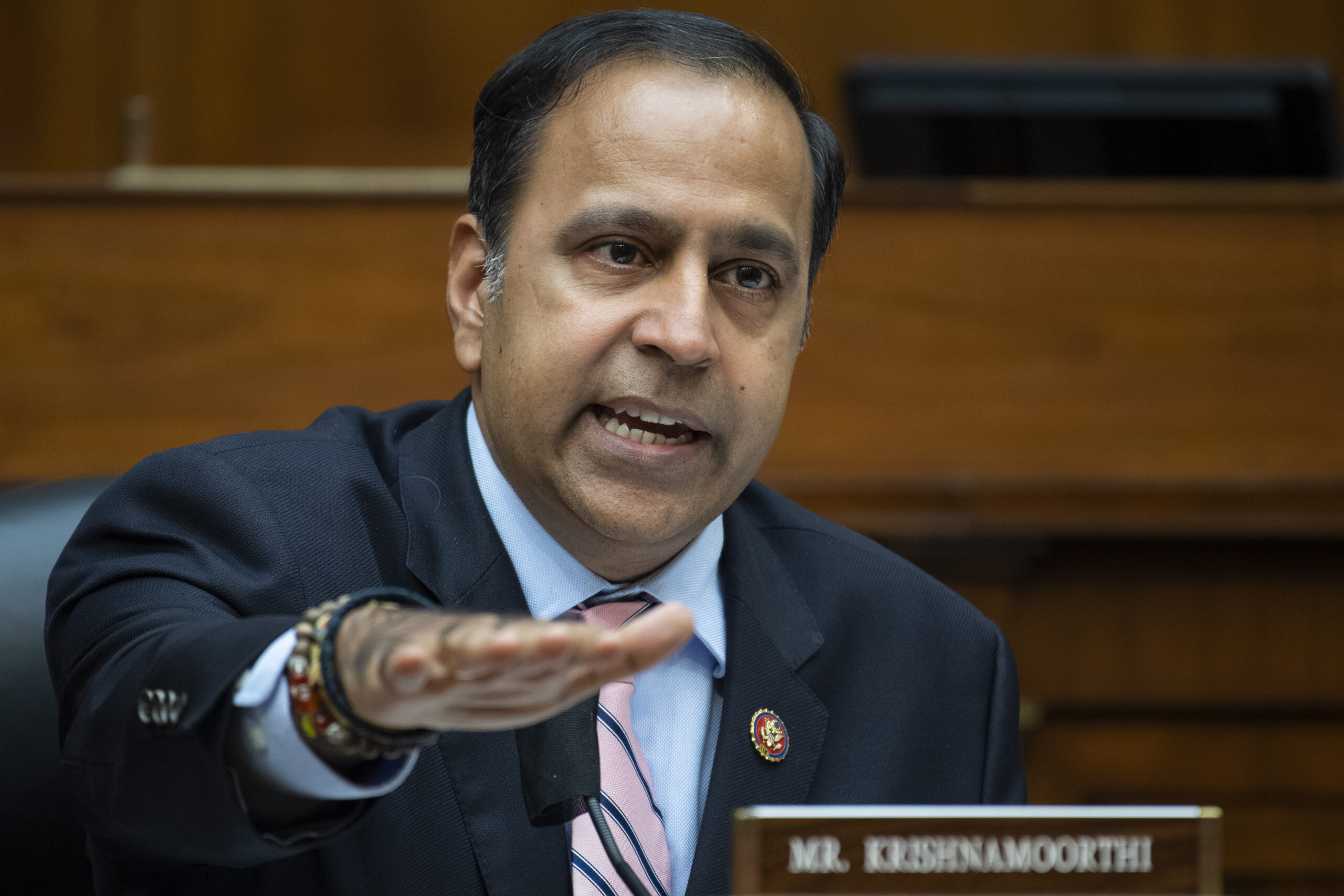
Lt. Gov. Juliana Stratton seems to be running to the congressman’s left on Israel, even as Rep. Robin Kelly is the most outspoken critic of Israel in the race
Plus, Modi heads to Israel to deepen defense ties

Chip Somodevilla/Getty Images
U.S. President Donald Trump gives a speech at the World Economic Forum (WEF) on January 21, 2026 in Davos, Switzerland.
👋 Good Tuesday morning!
In today’s Daily Kickoff, we preview tonight’s State of the Union address, and look at the debate taking shape among New York City officials over new legislation providing protest buffer zones around places of worship ahead of a hearing on the issue tomorrow. We interview Israeli Ambassador to India Reuven Azar about Indian Prime Minister Narendra Modi’s upcoming visit to Israel, slated for tomorrow, and talk to Sen. Chris Coons about a potential U.S. strike on Iran. Also in today’s Daily Kickoff: Michael Sacks, Richard Baker and Sue Altman.
Today’s Daily Kickoff was curated by JI Executive Editor Melissa Weiss and Israel Editor Tamara Zieve, with assists from Danielle Cohen-Kanik and Marc Rod. Have a tip? Email us here.
What We’re Watching
- President Donald Trump will deliver the State of the Union address at 9 p.m. ET. More below on what we’ll be looking out for tonight.
- Secretary of State Marco Rubio is slated to brief Senate and House leaders at 3 p.m. ET.
- Ali Larijani, the head of Iran’s National Security Council who in recent weeks has been designated by Iranian Supreme Leader Ayatollah Ali Khamenei to try to ensure the regime’s continued survival in the event of military conflict, is in Muscat today to deliver Tehran’s response to U.S. negotiators through Omani interlocutors.
- The House Foreign Affairs Committee will hear from Jacob Helberg, the Trump administration’s under secretary of state for economic growth, energy, and environment, in a hearing this morning set for 10 a.m.
- AIPAC’s Congressional Summit wraps up today in Washington.
What You Should Know
A QUICK WORD WITH JI’S MARC ROD
President Donald Trump is set to address Congress for his State of the Union speech tonight, with U.S. forces amassing in the Middle East and administration officials engaged in an ongoing flurry of diplomacy with the Iranian regime.
We’ll be watching for how Trump will address the situation with Iran in his speech, if at all. Will he set red lines or negotiate demands for the regime? Will he lay out his plan or goals for a potential military attack? The White House, as of now, isn’t previewing his remarks.
Trump took to Truth Social yesterday afternoon with a post rejecting as “fake news” reporting from a series of outlets that Gen. Dan Caine, chairman of the Joint Chiefs of Staff, had raised concerns about a sustained military campaign against Iran.
The president said that Caine “like all of us, would not like to see War” but also believes that a military conflict would be “easily won.” Although talks have reportedly centered around limits on Iran’s nuclear program, Trump continued to insist that the regime’s nuclear development is “no longer, but rather, was blown to smithereens.” He called reports that the administration is considering limited strikes on Iran “fake.”
It’s not out of the question that Trump, who loves a made-for-TV moment, breaks major news on Iran during the speech — last year, he announced in the middle of his speech that the U.S. had apprehended a terrorist allegedly involved in the bombing that killed 13 U.S. servicemembers during the pullout from Afghanistan.
On the other hand, Trump, with midterms on the horizon, might steer clear of the topic entirely as he focuses on domestic issues dominating the headlines, such as tariffs and immigration.
We’ll also be keeping an ear out for whether Trump tries to draw any boundaries for the conservative movement on Israel policy and antisemitism in his speech. The president has largely stayed out of the ongoing fight over Israel roiling the right, but the GOP’s most prominent Israel critic, Tucker Carlson, visited the White House on Monday after an interview with U.S. Ambassador to Israel Mike Huckabee that grabbed headlines.
BUFFER BATTLE
‘Buffer zone’ bill to protect houses of worship sets up NYC clash

A bill introduced in the New York City Council in response to pro-Hamas demonstrations outside New York synagogues and slated for a hearing on Wednesday has sparked a battle between mainstream Jewish advocacy organizations and protest groups and their allies — and leaves New York City Mayor Zohran Mamdani and the NYPD in an awkward spot, Jewish Insider’s Will Bredderman reports. At the center of the agenda to counter antisemitism that Council Speaker Julie Menin unveiled in January was her proposal directing the NYPD to establish a plan for “security perimeters,” demarcated with police barriers or tape, up to 100 feet from entrances and exits at religious facilities to prevent protesters from obstructing or harassing people attempting to enter or exit.
State of play: In response to feedback from the police department, the speaker’s office stripped out any specific reference to distance, and a new draft of the bill simply compels NYPD Commissioner Jessica Tisch to propose her own plan for “buffer zones” of sizes she deems appropriate “to address and contain the risk of injury, intimidation, and interference, while preserving and protecting protest rights.” Like the previous bill, the zones in the updated legislation could extend from both doorways and driveways.
Bonus: In The New York Post, Marvin Gerber, who has faced protesters outside his Ann Arbor, Mich., synagogue for more than two decades, argues in favor of a federal law prohibiting protests within a certain range of houses of worship: “A federal baseline sets one clear line everywhere and lets the Justice Department step in when locals can’t or won’t. Congress should pass a law barring targeted protests within a reasonable distance of entrances, driveways or parking lots of houses of worship during service hours, with authority for local police to extend that perimeter when necessary for safety or crowd control.”
DELHI DIPLOMACY
Modi’s upcoming visit expected to take Israel-India relations ‘to a new, strategic level,’ Israeli ambassador says

Indian Prime Minister Narendra Modi is set to arrive in Israel on Wednesday to address the Knesset and head an innovation event in Jerusalem, as part of what Israeli Ambassador to India Reuven Azar told Jewish Insider’s Lahav Harkov is an “upgrade” in relations between the countries “to a new, strategic level.” The visit of the head of the world’s most populous nation, whose relations with Israel have grown stronger since Modi became prime minister in 2014, has important implications for the Jewish state’s security, geopolitics and trade, Azar said.
Friends in arms: India has been the Israeli defense industry’s largest customer in recent years, with arms sales totaling $20.5 billion during 2020-2024. The countries have reportedly closed deals worth $8.6 billion since the beginning of 2026. During his visit, Modi plans to sign an “updated security agreement to allow the private sector to work on more sensitive products when it comes to joining production,” Azar, who has been Israel’s envoy to India since September 2024, said. “The updated protocols will allow us to work on more sensitive technology. It will create a lot of action.”
Bonus: Globes does a deep dive into the defense cooperation between Israel and India.
SHIFTING STANCE
Sue Altman pivoting on Israel as she runs in safely Democratic N.J. district

Progressive activist Sue Altman shook up the race in New Jersey’s 12th Congressional District earlier this month when she announced she was entering the already packed field of Democratic candidates to replace retiring Rep. Bonnie Watson Coleman (D-NJ) in the House, immediately becoming the presumptive front-runner, Jewish Insider’s Marc Rod reports.
Now and then: Altman ran as a pro-Israel progressive when she was the Democratic nominee in the neighboring district, where she lost to Rep. Tom Kean Jr. (R-NJ). In audio shared by the anti-Israel publication Drop Site, Altman said she’s reassessing elements of her position towards Israel from 2024 and working on a new position paper. “A lot has happened since then. It has been a horrific tragedy,” Altman said, in an unknown setting. “I always looked up to Israel as a young person. … Israel is an important ally to the United States, but what has happened in Palestine is just horrific, and I don’t want our taxpayer money being used to kill children and women who are innocent.”
PRAIRIE STATE OF PLAY
Raja Krishnamoorthi emerging as the strongest ally of Jewish voters in Illinois Senate race
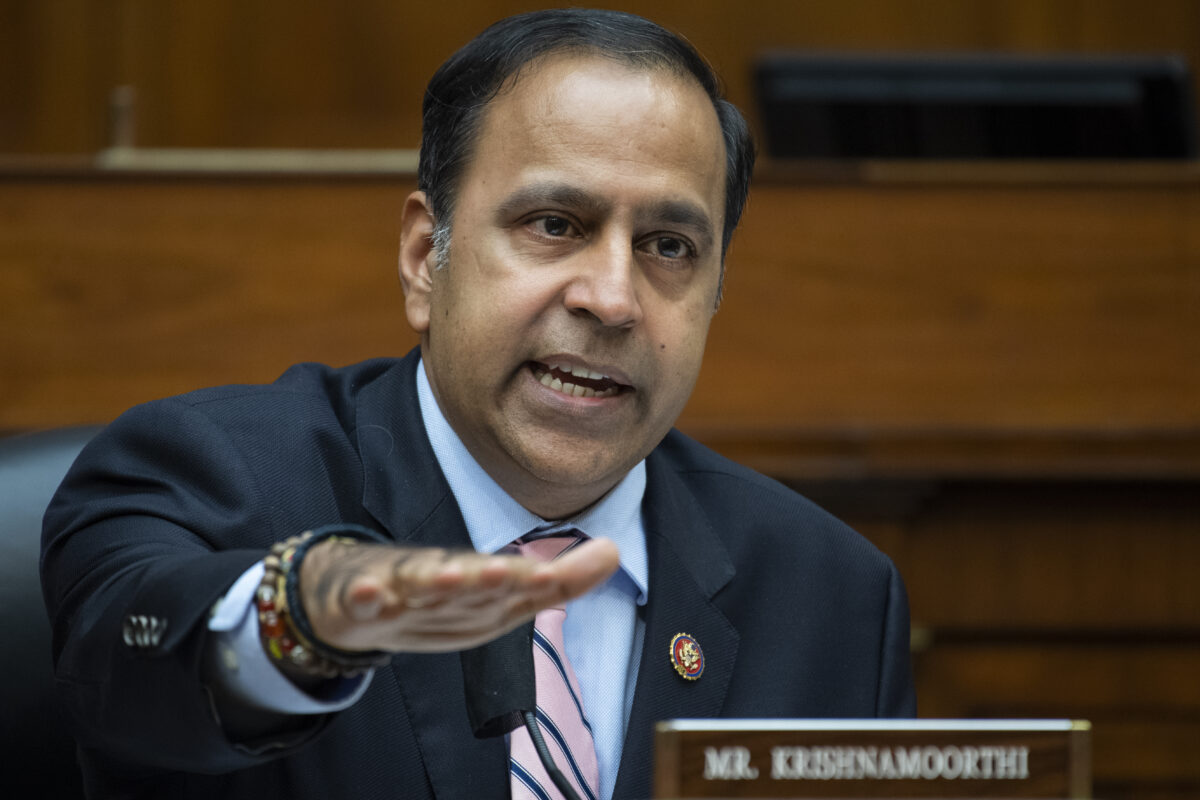
Democrats running for the open Senate seat in Illinois are increasingly trying to differentiate themselves on Israel policy ahead of next month’s primary, Jewish Insider’s Marc Rod reports. In the final weeks of the campaign, Illinois Lt. Gov. Juliana Stratton appears to be trying to straddle a line on Israel policy between Rep. Raja Krishnamoorthi (D-IL), who has a largely pro-Israel record, and Rep. Robin Kelly (D-IL), who has been increasingly critical of Israel.
Debate watch: Stratton, of the three, has the least established record on Middle East policy issues, and her approach was on display at a debate last week with fellow candidates, where she did not offer direct answers to questions on whether additional conditions should be applied to U.S. aid to Israel or whether the war in Gaza constitutes a genocide. “I can tell you that as our democratic ally in the Middle East, I believe that Israel has a right to safety and security, but at the very same time, I totally disagree with the way that [Israeli Prime Minister Benjamin] Netanyahu has responded to those attacks, and I believe that he should be removed from power, or he should step down, and there should be elections, as the people have been calling for,” Stratton said. Israel is set to go to elections in October.
AID ARRANGEMENT
With J Street backing, 26 Democrats introduce legislation to impose wide-ranging conditions on aid to Israel
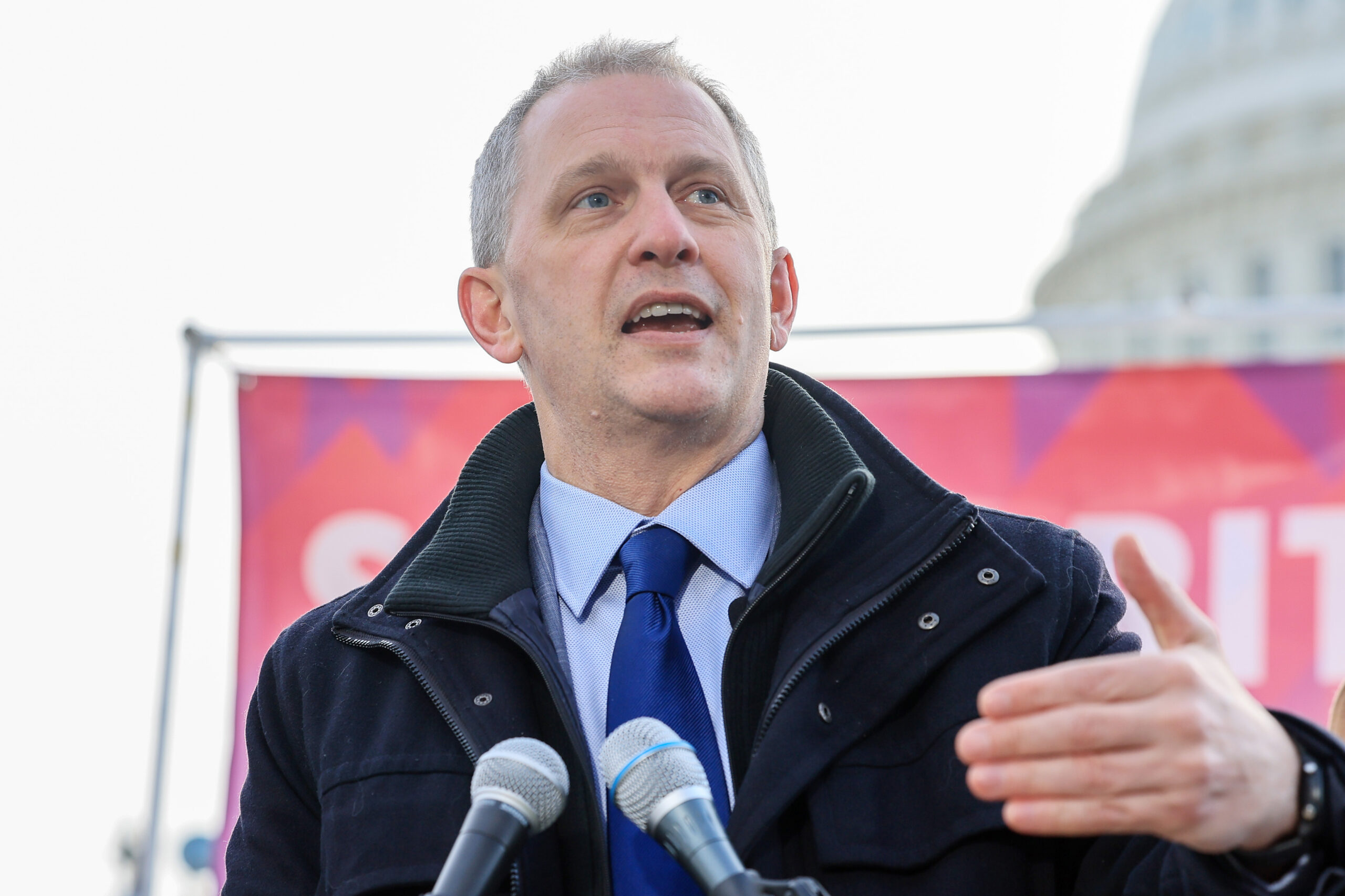
Rep. Sean Casten (D-IL) and 25 Democratic co-sponsors introduced a bill on Monday that would implement wide-ranging new conditions and restrictions on U.S. aid to Israel, Jewish Insider’s Marc Rod reports.
Conditions: The “Ceasefire Compliance Act” would require the administration to assess and report to Congress every 90 days on whether Israel is complying with the ceasefire agreement in Gaza, including halting military operations and bombing campaigns, as well as a raft of other conditions related to Gaza and the West Bank. If Israel does not meet any of the conditions included in the law, the U.S. would be banned from selling or transferring any U.S. military systems to Israel for use in Gaza or the West Bank. In addition, any further transfers would be subject to a specific agreement by Israel that the weapons would not be used in Gaza or the West Bank and the administration would be required to reach an agreement with Israel that U.S.-origin systems already in Israel’s possession would also be banned from use in Gaza or the West Bank.
DELAWARE DISPOSITION
Chris Coons warns White House over striking Iran without support from European allies
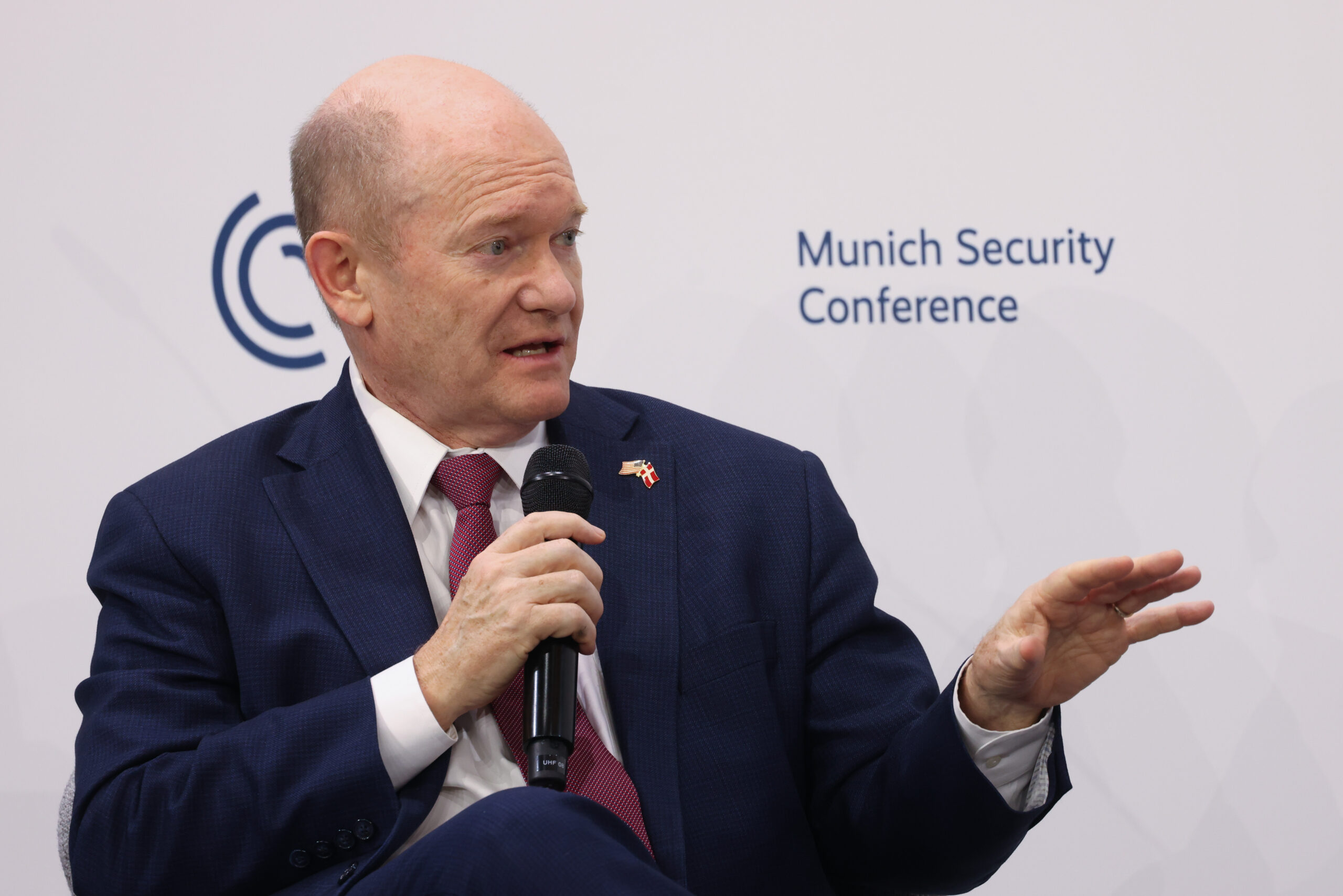
Sen. Chris Coons (D-DE), one of the leading foreign policy voices in the Democratic Party’s moderate wing, expressed concern over the weekend that any White House decision to move ahead with military action against Iran would deeply alienate leading European allies of the United States. “There are pretty stark early warning signs of some challenges where core allies do not share our priorities,” Coons told Jewish Insider’s Emily Jacobs following a weeklong trip to Europe, which included stops at the Munich Security Conference, along with meetings in Ukraine and Moldova with top European diplomats.
Coons’ concerns: “It leaves me genuinely concerned that if Trump goes ahead with a strike against Iran, it is not going to enjoy support from any of our core allies,” he continued. “That will make it harder, and it may deepen this growing challenge for us.” Asked how he would like to see the Trump administration address the Iranian regime’s violent crackdown on protesters and its nuclear program, Coons urged the president to work with close allies to “ramp up pressure” on Tehran and explain his approach to the public. The Delaware senator also encouraged Trump to include Congress in his deliberations.
Worthy Reads
Class Warfare: Semafor’s Ben Smith reviews the “bad ideas” that have emerged since the start of the year, citing as one the phrase “Epstein class” that was popularized by Rep. Ro Khanna (D-CA) and Sen. Jon Ossoff (D-GA) to describe a specific, largely Jewish set of power brokers. “The notion that there is a ‘class’ that includes Noam Chomsky and Howard Lutnick makes little sense except to lunatic antisemites. But hustlers of various sorts have long targeted elites for their own purposes. Take the crypto founder Sam Bankman-Fried, who contributed to Ossoff and Khanna’s political campaigns. It would be absurd to see Ossoff, Khanna, Tom Brady — a paid spokesman for Bankman-Fried’s crypto exchange — and me as part of an ‘SBF class.’” [Semafor]
Trump and Tucker: The Bulwark’s Will Sommer spotlights the relationship between President Donald Trump and Tucker Carlson and the “seeming impunity” the commentator, who platforms Holocaust deniers and antisemitic conspiracy theorists, enjoys even as he complicates relations between the White House and traditional conservatives. “Ultimately, Carlson’s perseverance in Trump’s orbit is a remarkable testament to his staying power. Lesser media luminaries would have been pushed to the outskirts of punditry. The question now is how long the alliance between the administration and Carlson can hold. After all, there are several major factions now tugging at Trump, including Israel supporters like [Laura] Loomer and Ben Shapiro, and the [Vice President JD] Vance faction that Carlson is close to. As 2028 gets closer, expect many more fights over the White House guest list — and a whole lot more drama.” [TheBulwark]
Word on the Street
The Trump administration’s Board of Peace is considering using a form of cryptocurrency known as stablecoin in Gaza as an alternative to cash, which is in short supply after more than two years of war…
The State Department ordered non-essential personnel at the U.S. Embassy in Beirut, as well as their family members, to leave Lebanon, and is restricting the in-country travel of diplomats still stationed in the country…
Michael Sacks, a prominent Jewish Chicago-area Democratic donor and philanthropist, lamented rising anti-Israel sentiment and antisemitism after a progressive Illinois congressional candidate, union organizer Anthony Driver Jr., issued a public statement saying he would reject the donor’s contribution to his campaign due to his ties to AIPAC, Jewish Insider’s Marc Rod reports…
City & State New York profiles New York City Council Speaker Julie Menin as she settles into her new role, describing her as “someone who hopes to steer the council with a firm hand, notching real accomplishments” as well as “a structural counterweight to Mamdani and his fledgling administration”…
Organizers of the Atlanta Jewish Film Festival issued an apology following an uproar over the inclusion of a film festival student judge with an extensive history of criticizing Israel and comparing the war in Gaza to the Holocaust; the Israeli consulate in the Southeast, based in Atlanta, had withdrawn its support of the festival over the AJFF’s initial defense of the juror, who is the leader of the Morehouse College Muslim Student Association…
The New York Times profiles Saks Global head Richard Baker, whose newly formed company filed for bankruptcy just over a year after it was created in a merger between Saks Fifth Avenue, Neiman Marcus and Bergdorf Goodman…
The Nate D. Sanders auction house announced the upcoming sale of a letter signed by Ze’ev Jabotinsky written in 1938 as part of the Revisionist Zionism founder’s efforts to raise funds for a mass evacuation of European Jews ahead of Germany’s annexation of Austria…
Former U.K. Ambassador to the U.S. Peter Mandelson was arrested on suspicion of misconduct while in office, charges connected to Mandelson’s relationship with Jeffrey Epstein…
France is blocking U.S. Ambassador Charles Kushner from directly accessing government officials after Kushner did not appear in response to a summons from French Foreign Minister Jean-Noël Barrot over the U.S. envoy’s comments earlier this month about the death of a far-right French activist…
In The New York Times, music critic Anthony Tommasini reflects on Anne Frank’s love of music as he experiences the arts in the diarist’s adopted city of Amsterdam, where she and her family lived until they went into hiding…
Australia began a royal commission, its highest form of federal inquiry, into the December 2025 terror attack targeting a Hanukkah party at Sydney’s Bondi Beach…
Internal investigators at Binance found that roughly $1.7 billion had been sent from Binance accounts to Iranian entities with ties to terror groups…
Pic of the Day

Israeli President Isaac Herzog hosted an iftar at the President’s Residence in Jerusalem last night for diplomats, religious leaders and Arab-Israeli community leaders. Among those in attendance were Bahraini Ambassador to Israel Khaled Yousif al-Jalahma (at right, with Herzog) and Emirati Ambassador to Israel Mohamed al-Khaja.
Birthdays
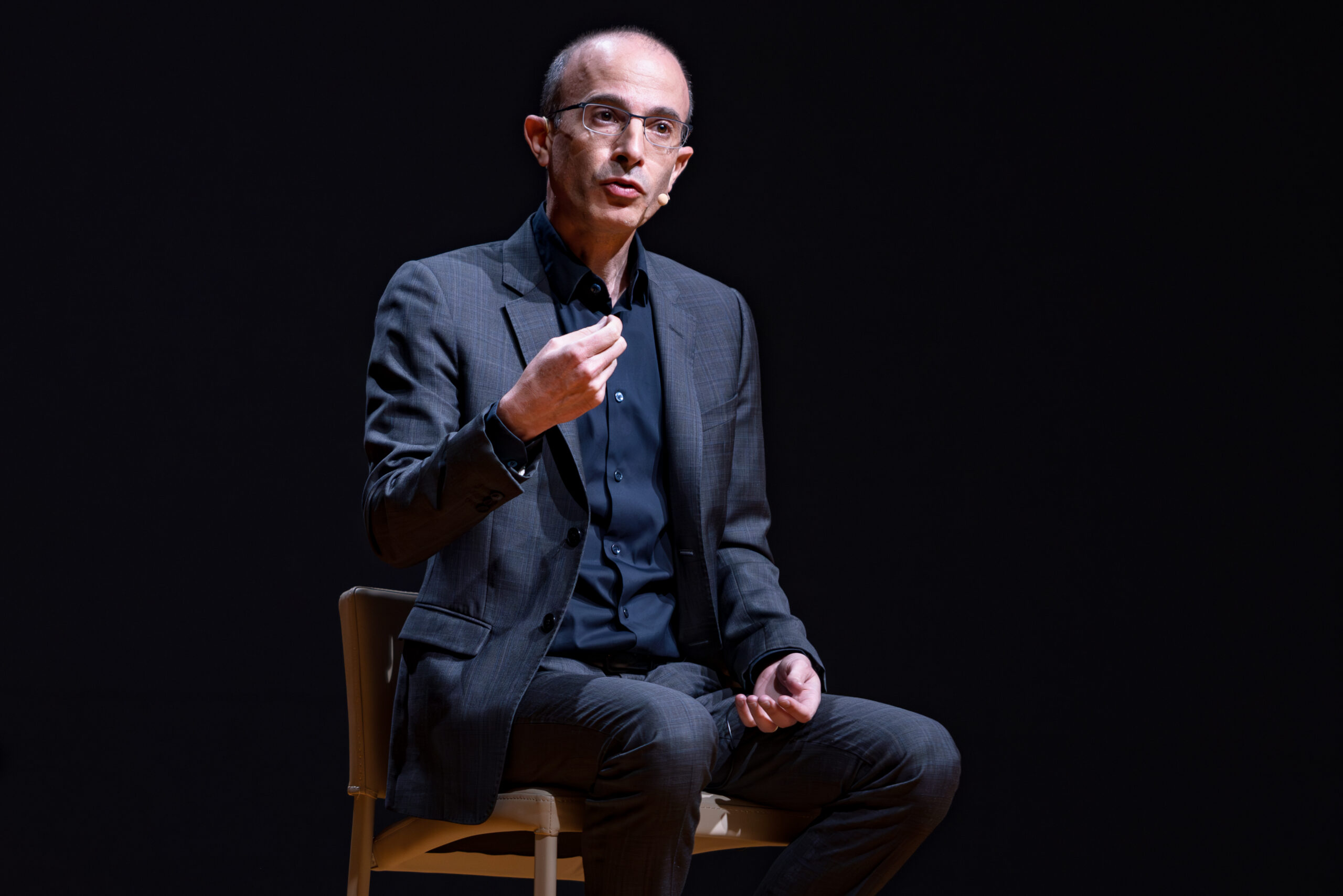
Professor of history at the Hebrew University, his books have been translated into 65 languages and have sold over 45 million copies, Yuval Noah Harari turns 50…
Chairman and CEO of Warner Bros until 2001, then chairman and CEO of Yahoo, Terence Steven “Terry” Semel turns 83… Moscow-born professor of mathematics at Yale University since 1991, Grigory Margulis turns 80… Encino, Calif., resident, Faye Gail Waldman… Rabbi and author of a book about chocolate and Judaism, she has held leadership positions in the national and regional Reform movement, Deborah R. Prinz turns 75… President of the Foundation for Defense of Democracies, Clifford D. May turns 75… Member of the New Jersey Senate (R-21) since 2022 following 18 years in the N.J. General Assembly, Jon M. Bramnick turns 73… Head basketball coach in a Puerto Rican league, he coached in the Israeli Premier League and has been on NBA and college basketball staffs in the U.S., Brad Greenberg turns 72… Film critic for Entertainment Weekly and then for Variety magazine, Owen Gleiberman turns 67… Founder of the Baltimore Center of Advanced Dentistry, Gary H. Bauman, DDS… Former member of the Knesset for the Likud party, Nurit Koren turns 66… Managing director at SKDKnickerbocker, Karen Olick… Former Israeli minister of health and leader of the Meretz party, Nitzan Horowitz turns 61… Professor of piano and artist-in-residence at the University of Alabama at Birmingham, Yakov Kasman turns 59… Author, survival expert, anthropologist and TV host, Josh Bernstein turns 55… Member of the Knesset for the Likud party, now serving as minister of science, technology and space, Gila Gamliel turns 52… Kyiv-born founder of WhatsApp in 2009, he sold the company to Facebook in 2014 for $19 billion, Jan Koum turns 50… NYC-based independent filmmaker, who, together with his older brother Joshua, directed and wrote the 2019 film “Uncut Gems” starring Adam Sandler, Benjamin Safdie turns 40… Partner at MizMaa Ventures Limited, Aaron Applbaum… Israeli actress and model, she has appeared in advertising campaigns for Urban Outfitters, Samsung and Sephora, Dar Zuzovsky turns 35… YouTube beauty guru known as RCLBeauty101 with 14.3 million subscribers, Rachel Claire Levin turns 31… Mitchell Brown…
In an interview with JI, Amb. Reuven Azar says joint manufacturing ‘means that, during times of need, we can supply things to each other, unlike what happened [with other countries] during the war’

PRAKASH SINGH/AFP via Getty Images
Indian Prime Minister Narendra Modi (R) and Israeli Prime Minister Benjamin Netanyahu pose for photographers after Netanyahu arrived at the Air Force Station in New Delhi on January 14, 2018.
Indian Prime Minister Narendra Modi is set to arrive in Israel on Wednesday to address the Knesset and head an innovation event in Jerusalem, as part of what Israeli Ambassador to India Reuven Azar told Jewish Insider is an “upgrade” in relations between the countries “to a new, strategic level.”
The visit of the head of the world’s most populous nation, whose relations with Israel have grown stronger since Modi became prime minister in 2014, has important implications for the Jewish state’s security, geopolitics and trade, Azar said.
Modi last visited Israel eight years ago. At the time, a photo of the Indian leader and Israeli Prime Minister Benjamin Netanyahu wading barefoot in the Mediterranean Sea during a visit to a desalination plant went viral.
His trip this week, during which he will address Israel’s Knesset, comes amid rising tensions across the Middle East — and as Israelis prepare for a potential attack from Iran.
India has been the Israeli defense industry’s largest customer in recent years, with arms sales totaling $20.5 billion during 2020-2024. The countries have reportedly closed deals worth $8.6 billion since the beginning of 2026.
During his visit, Modi plans to sign an “updated security agreement to allow the private sector to work on more sensitive products when it comes to joining production,” Azar, who has been Israel’s envoy to India since September 2024, said. “The updated protocols will allow us to work on more sensitive technology. It will create a lot of action.”
Netanyahu and leading Israeli defense figures have spoken about moving toward greater self-sufficiency in arms manufacturing. Delhi has long had a “Make in India” campaign to increase local production, requiring Israeli arms companies to open production lines in India in order to sell to the country, and the agreement means that joint production “will get a significant upgrade, because we are expanding both the scope and range of technologies we can apply,” Azar said.
“Both Israel and India want to be more independent and self-reliant when it comes to production and less reliant on foreign supply. Producing things together means that, during times of need, we can supply things to each other, unlike what happened during the war [in Gaza] … in which we had interruptions in supply from different countries,” Azar said.
Economically, Israel and India are working on a free-trade agreement, and hope to expand their cooperation on emerging technologies, as well as large infrastructure projects. Azar said that he worked to bring Indian companies to bid on tenders relating to the ongoing Tel Aviv Metro subway project, and that 15 have already applied.
The U.S. has long expressed concern about security risks related to Chinese companies working on major infrastructure projects in Israel. Companies from India, which views China as an adversary, have been considered as a potential competitive alternative.
Though Azar, a former deputy national security advisor for foreign policy, served as head of the Israel-U.S.-China Internal Task Force Israel’s Foreign Ministry at the beginning of the decade, he declined to comment on that aspect, preferring to focus on Israel-India bilateral relations.
With regard to the India–Middle East–Europe Economic Corridor (IMEC), a trade route meant to pass through Israel, among other countries in the region, and compete with China’s Belt and Road Initiative, Azar said that “we need to wait for the right geopolitical moment to make it happen. … It needs to happen, but evidently, it won’t now.”
“Currently, there is some movement of merchandise, but to see it become massive, we need some change in Saudi Arabia,” Azar said.
Saudi Arabia and the U.A.E., both points on the IMEC route, are facing increased tensions between them. Riyadh has pointed some of its ire at Jerusalem, and has been growing closer to India’s historic foe, Pakistan.
Azar was enthusiastic about an Israeli Cabinet decision approved on Sunday in which Israel plans to allocate over $48 million to cooperation with India in a variety of spheres. Half of the funds come from individual government ministries seeking the cooperation, and the other half was specially allocated by the Finance Ministry.
“The most important is upgrading research and development with funds from the Israel Innovation Authority, and academic cooperation. Israeli universities are all over India now, getting into agreements to exchange students and transfer technology and innovation offices. They feel very welcome in India,” he said.
Asked if that means India has become an alternative to much of the West, where Israeli academics have faced hostility in recent years, Azar said that India and Israel “don’t have challenges in this realm and continue working together to discover the joint resilience so needed in times of war.”
At the same time, he added, “it’s important for any country to diversify. We feel we have so much in common with India, which is a rising force in the world. It’s natural, and it’s not only Israel. Last week, 20 heads of state and 50 foreign ministers went to an AI summit in India. … Everybody is chasing India now.”
Though India-Israel relations were worse before Modi’s rise, Azar said they have the potential for longevity.
“We are now building the pillars of relations that are going to last,” he said. “We are trying to get bipartisan support. There is a lot of support for Israel, not just in [Modi’s Bharatiya Janata Party]. The general public feels it, and we have a high appreciation of that. There are some parties, like the communists, that are more critical, but I think this relationship is going to last.”
Plus, major Dem donor calls out 'Jew hate' in party

Andrew Harnik/Getty Images
President Donald Trump in the Oval Office at the White House on September 25, 2025 in Washington, DC.
Good Monday afternoon!
This P.M. edition is reserved for our premium subscribers — offering a forward-focused read on what we’re tracking now and what’s coming next.
It’s me again — Danielle Cohen-Kanik, U.S. editor at Jewish Insider and curator, along with assists from my colleagues, of the Daily Overtime. Please don’t hesitate to share your thoughts and feedback by replying to this email.
📡On Our Radar
Notable developments and interesting tidbits we’re tracking
As rumors abound about the possibility and timing of U.S. strikes on Iran, the State Department ordered the evacuation of non-essential personnel and their families from the U.S. Embassy in Beirut. “Based on our latest review, we determined it prudent to reduce our footprint,” a State official told Fox News…
Nearby, amid the buildup of U.S. military assets in the region, American refueling and cargo planes were spotted at Ben Gurion Airport…
President Donald Trump denied reports that Pentagon officials, namely Joint Chiefs of Staff Chairman Gen. Dan Caine, are raising concerns about striking Iran, writing on Truth Social this afternoon, “General Caine, like all of us, would like not to see War but, if a decision is made on going against Iran at a Military level, it is his opinion that it will be something easily won.”
“He has not spoken of not doing Iran, or even the fake limited strikes that I have been reading about, he only knows one thing, how to WIN and, if he is told to do so, he will be leading the pack,” Trump said of Caine, while alluding to the potential breadth of military action against Iran…
Secretary of State Marco Rubio pushed back his visit to Israel, originally scheduled for this weekend, to March 2, The Jerusalem Post reports, days after the next round of U.S.-Iran negotiations in Geneva on Thursday…
Sen. Chris Coons (D-DE), a leader on foreign policy among Democrats in Congress, told Jewish Insider’s Emily Jacobs that he heard “pretty stark early warning signs of some challenges where core allies do not share our priorities” on a potential Iran strike during his recent trip t0 Europe, which included stops at the Munich Security Conference, along with meetings in Ukraine and Moldova with top European diplomats.
Coons laid out what he hopes to see from the president: “A) Consult Congress. B) Make a case to the American people about why this is in our national security interest. C) Clarify what on earth he’s planning with this Board of Peace … And D) If he’s going to work with close allies to ramp up pressure to try and achieve something at the negotiating table, he should work with close allies”…
Anthony Driver Jr., a union organizer and candidate in Illinois’ 7th Congressional District, doubled down on his recent repudiation of AIPAC, despite previously having little public record on Israel policy issues. Following a press conference last week where Driver, who is running against AIPAC-backed Chicago Treasurer Melissa Conyears-Ervin, denounced the pro-Israel group, he returned donations from major Democratic Party donor Michael Sacks over the finance executive’s ties to AIPAC.
Sacks, who was a major backer of former President Barack Obama and former Chicago Mayor Rahm Emanuel, said in his reply, “It is truly sad there is so much anti Israel sentiment and outright Jew hate that Anthony found himself in this position. I can only hope that the electorate rejects hate in all forms”…
As more details emerge about Rep. Tony Gonzales’ (R-TX) alleged affair with a staffer who later committed suicide, a poll commissioned by the campaign of Brandon Herrera, Gonzales’ opponent, shows the congressman trailing Herrera by a whopping 24 points among likely GOP primary voters. The story, which entered the news cycle right as early voting kicked off, could catapult Herrera, a social media influencer with a history of antisemitism, to the Republican nomination and on to Congress…
Investigators at the cryptocurrency giant Binance found last year that about $1.7 billion had been sent from two accounts to Iranian entities with links to terror groups, The New York Times reports, even after Binance pleaded guilty to violating anti-money laundering laws in 2023 and vowed to prevent sanctioned actors from accessing its platform. Trump pardoned Binance founder Changpeng Zhao, who was jailed for his role in the saga, in October 2025…
The Atlanta Jewish Film Festival backtracked in its defense of a juror selected for a judging panel who had posted antisemitic and anti-Israel content online, whom it had stood behind even after the Israeli Consulate in Atlanta announced it was withdrawing its funding and support of the event over the pick.
The festival changed its tune yesterday, saying it is “first and foremost, a Jewish institution” and has “a responsibility, particularly at this fraught time, to stand firmly against antisemitism and to affirm the Jewish people’s right to self-determination.” It said it would review its “organizational processes and policies, including those related to antisemitism, BDS, and cultural boycotts”…
The French Foreign Ministry has moved to block U.S. Ambassador to France Charles Kushner’s access to government officials after he declined to appear for a summons by Foreign Minister Jean-Noël Barrot today, which was issued after the U.S. Embassy reposted comments by Trump about a far-right French activist who was killed in a clash with far-left protesters. It was Kushner’s second summons, after his first last year when he accused the French government of not adequately combating antisemitism…
⏩ Tomorrow’s Agenda, Today
An early look at tomorrow’s storylines and schedule to keep you a step ahead
Keep an eye out in Jewish Insider for a look at Sue Altman’s shifting views on Israel as the formerly pro-Israel congressional candidate is now running in New Jersey’s more heavily Democratic 12th Congressional District.
We’ll be watching for mention of President Donald Trump’s thinking on Iran as he delivers the annual State of the Union address tomorrow night. Virginia Gov. Abigail Spanberger will deliver the Democratic response.
The House Foreign Affairs Committee will hold a hearing on “advancing national security through commercial diplomacy” with Jacob Helberg, under secretary of state for economic affairs, who recently told JI that he hopes the Pax Silica initiative, which he leads, “will pave the way for peace and economic integration” in the Middle East.
Australia’s royal commission on antisemitism, formed after the Hanukkah terror attack at Sydney’s Bondi Beach, will hold its first public hearing, though no testimony or evidence will be heard.
Stories You May Have Missed
OVERTON WINDOW
Jewish Democrats alarmed about whether their party will remain welcoming
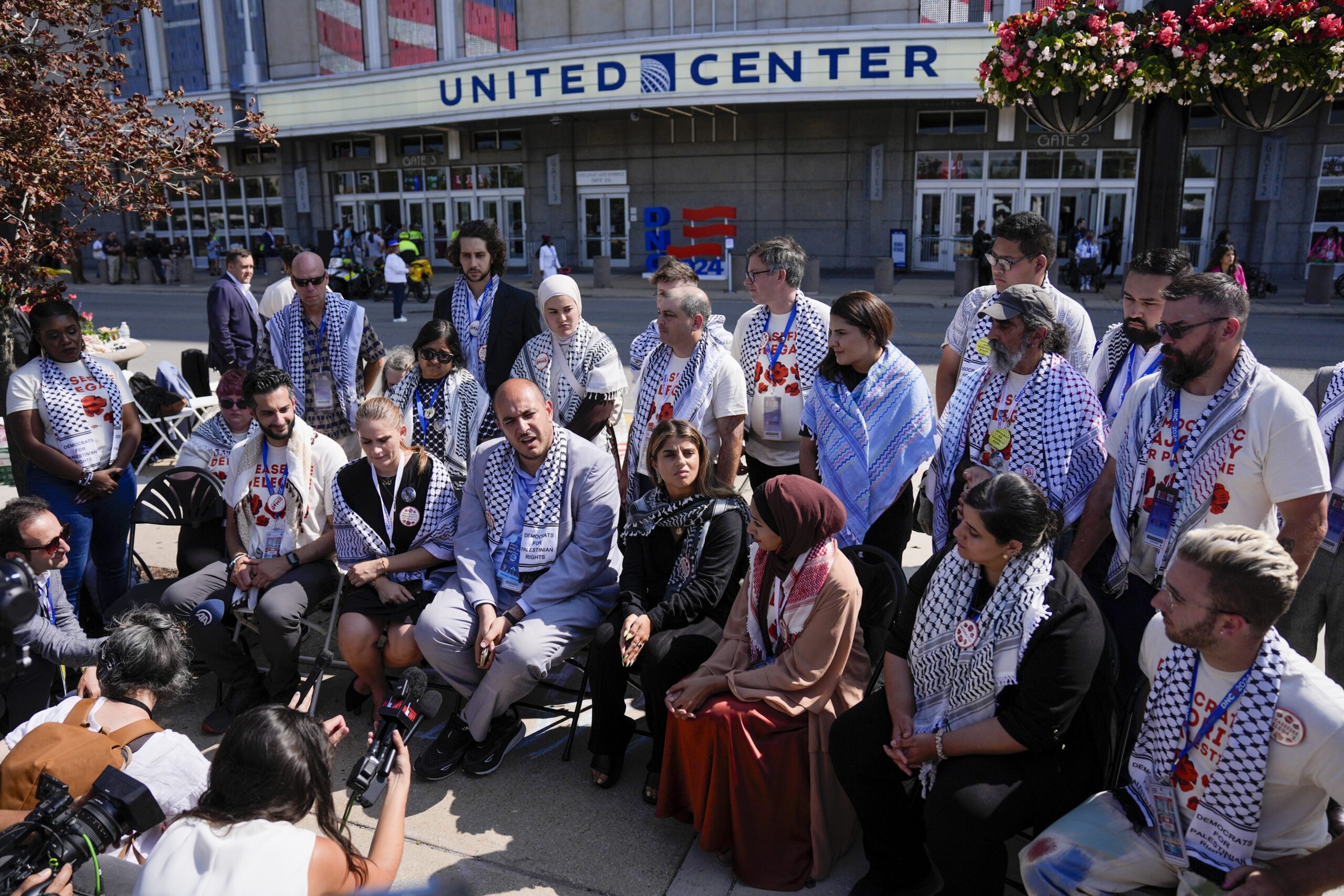
Former Democratic Rep. Kathy Manning: ‘There is no doubt that we are living through very difficult times for American Jews’
BIG TENT SHABBAT
State Dept. Shabbat dinner draws UAE, Saudi ambassadors and senior Trump officials
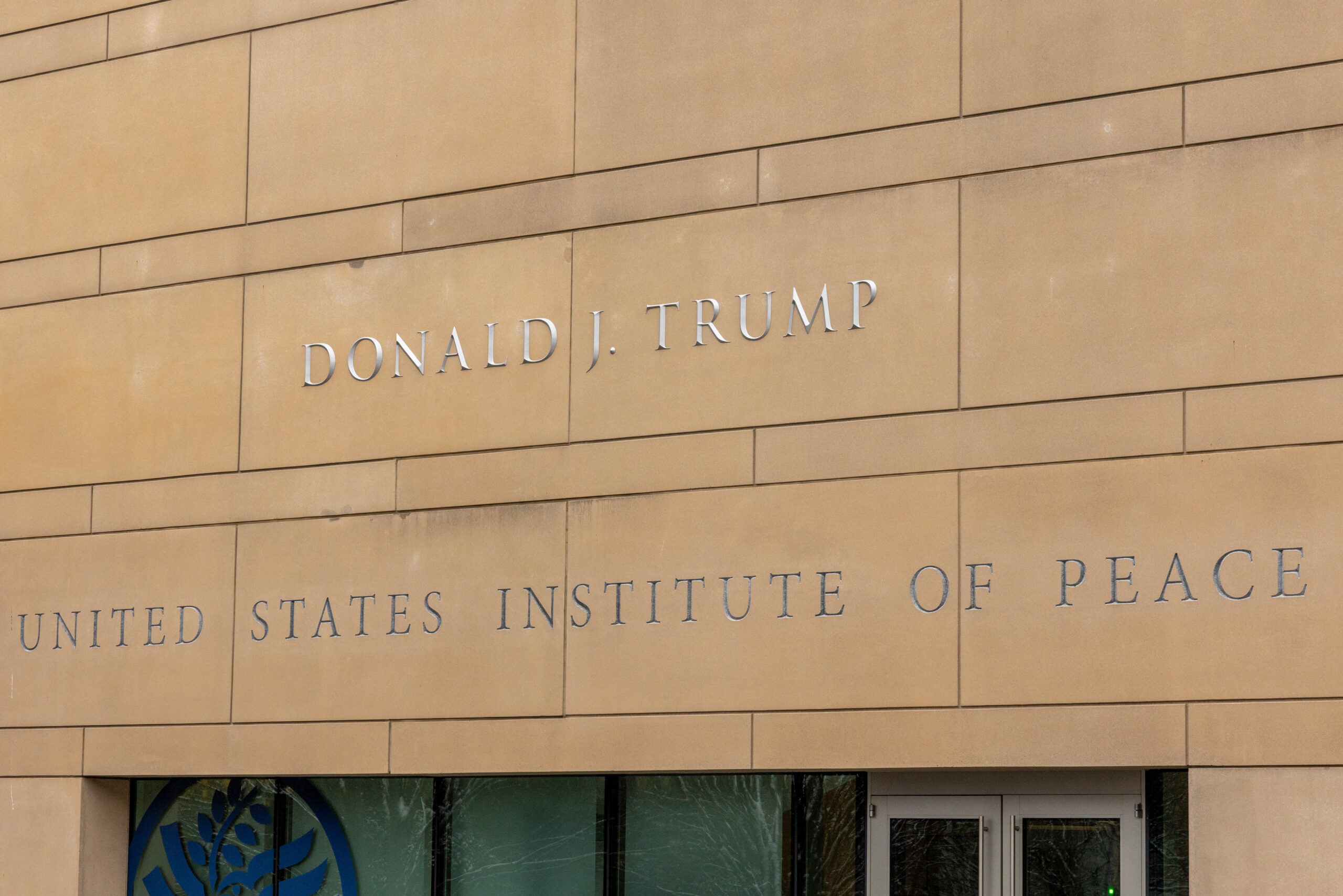
The dinner was hosted by Rabbi Yehuda Kaploun, the U.S. antisemitism special envoy
Plus, Trump's kind words for Qatari PM
Alex Wong/Getty Images
A visitor holds an AIPAC folder in an elevator in Rayburn House Office Building on March 12, 2024 on Capitol Hill in Washington, DC.
Good Thursday afternoon!
This P.M. edition is reserved for our premium subscribers — offering a forward-focused read on what we’re tracking now and what’s coming next.
It’s me again — Danielle Cohen-Kanik, U.S. editor at Jewish Insider and curator, along with assists from my colleagues, of the Daily Overtime. Please don’t hesitate to share your thoughts and feedback by replying to this email.
📡On Our Radar
Notable developments and interesting tidbits we’re tracking
President Donald Trump used the occasion of the first meeting of the Board of Peace in Washington today to announce significant monetary and troop commitments from the U.S. and other countries to stabilize Gaza, as well as lay out a timeline for military action against Iran, Jewish Insider’s Matthew Shea reports.
The pledges included $10 billion from the U.S. and $7 billion from several Middle Eastern countries for Gaza’s reconstruction, as well as commitments to provide troops and police to the U.S.-led International Stabilization Force. (The Guardian reports the White House is currently exploring plans to build a 5,000-person military base to house the ISF in southern Gaza.)
On Iran negotiations, Trump said in his remarks, “Now we may have to take it a step further or we may not. Maybe we are going to make a deal [with Iran]. You are going to be finding out over the next probably 10 days.”
He later told reporters on Air Force One, “Ten, 15 days, pretty much maximum.” Remember: Last June, Trump said he would decide whether to take action against Iran within two weeks, and carried out strikes on Iranian nuclear facilities two days later…
U.K. Prime Minister Keir Starmer has reportedly not given approval to Washington to use the joint U.S.-U.K. base on Diego Garcia island for a strike on Iran, as Trump said yesterday he is considering. London is concerned that a U.S. strike from the shared base, which the U.K. must grant permission to use, could implicate it in violating international law…
Trump also offered praise for Qatar’s prime minister, Sheikh Mohammed bin Abdulrahman Al Thani, during his Board of Peace remarks, despite widespread criticism of Doha’s backing of Hamas and platforming of anti-Israel actors.
“His excellency, Prime Minister Al Thani of Qatar, just a great and highly respected man,” Trump said. “I always say he needs a public relations agency because you do so much good, and they have you down as evil, and you’re not evil. You help us so much and you’re such a good ally”…
Meanwhile, Hamas is entrenching itself further in Gaza, repositioning its loyalists in government and paying salaries across the enclave, according to Reuters. Hamas has said it is willing to hand power over to the Palestinian technocratic committee established by the U.S. and led by former Palestinian Authority official Ali Shaath, but as one Palestinian source told the outlet, “Shaath may have the key to the car, and he may even be allowed to drive, but it is a Hamas car”…
Former Rep. Tom Malinowski (D-NJ), who recently lost the Democratic primary for New Jersey’s 11th Congressional District, called AIPAC’s attacks against him in the race “bizarre in several ways,” writing in an op-ed today that he has “no problem identifying as a Zionist” and calling on Democratic leaders to collectively “refuse [AIPAC’s] support, instead of letting it pick off candidates one by one”…
Rep. Jan Schakowsky (D-IL) withdrew her endorsement of Cook County Commissioner Donna Miller, the front-runner in Illinois’ 2nd District Democratic primary, over Miller’s backing by groups that are reported to be affiliated with AIPAC, though the pro-Israel group hasn’t endorsed her and neither AIPAC nor its super PAC are publicly spending any money in the district.
“Illinois deserves leaders who put voters first, not AIPAC or out-of-state Trump donors,” Schakowsky told the Chicago Sun-Times. “I cannot support any candidate running for Congress who is funded by these outside interests”…
Ahead of a hearing next week on New York City Council Speaker Julie Menin’s proposed 100-foot ban on protests around houses of worship, Mayor Zohran Mamdani said today that he had the NYPD review the legality of the measure, “and I can tell you, my police commissioner has expressed concerns about that proposal”…
Three officials appointed by Mamdani to administration posts are co-founders of a group that blamed Israel for the Oct. 7 Hamas attacks two days after they took place, the Washington Free Beacon reports.
The group, the Muslim Democratic Club of New York (MDCNY), was founded by Faiza Ali, now commissioner of the Mayor’s Office of Immigrant Affairs; Aliya Latif, now executive director of the mayor’s Office of Faith-Based Partnerships; Ali Najmi, tapped as chair of the mayor’s Advisory Committee on the Judiciary; and anti-Israel activist Linda Sarsour.
On Oct. 9, 2023, the MDCNY posted on X, “Many NYers are feeling pain, fear, and anger after the horrific events in the Holy Land this weekend. Especially as the Israeli apartheid regime have forced millions of Palestinians in Gaza to live under occupation for decades and an open air prison since 2007.” The group went on to condemn “elected officials offering support for Israeli occupation’s rampant violence as it openly declares & enacts its intent to engage in mass violence and genocide against Palestinians,” well before Israel’s ground invasion of Gaza had begun…
The Forward profiles Los Angeles City Councilmember Nithya Raman as she runs for mayor with a unique ideology: Raman is a member of the Democratic Socialists of America, but has also been vocally supportive of Israel. She called DSA’s statement blaming Israel for the Oct. 7 attacks “unacceptably devoid of sympathy” and rejects the BDS movement, but was also condemned by the local Jewish community for introducing a ceasefire resolution in June 2023…
⏩ Tomorrow’s Agenda, Today
An early look at tomorrow’s storylines and schedule to keep you a step ahead
Keep an eye out in Jewish Insider for a preview of the AIPAC Congressional Summit, which is kicking off Sunday amid the group’s increasing involvement in midterm election races.
President Donald Trump is expected to meet with governors at the White House tomorrow, though the meeting will no longer be held under the auspices of the National Governors Association, as is done annually, after the White House declined to invite Democratic Govs. Jared Polis of Colorado and Wes Moore of Maryland to a black-tie dinner on Saturday.
We’ll be back in your inbox with the Daily Overtime on Monday. Shabbat Shalom!
Stories You May Have Missed
FULOP’S FIGHT
Former Jersey City Mayor Steve Fulop brings the fight against antisemitism to NYC’s business community
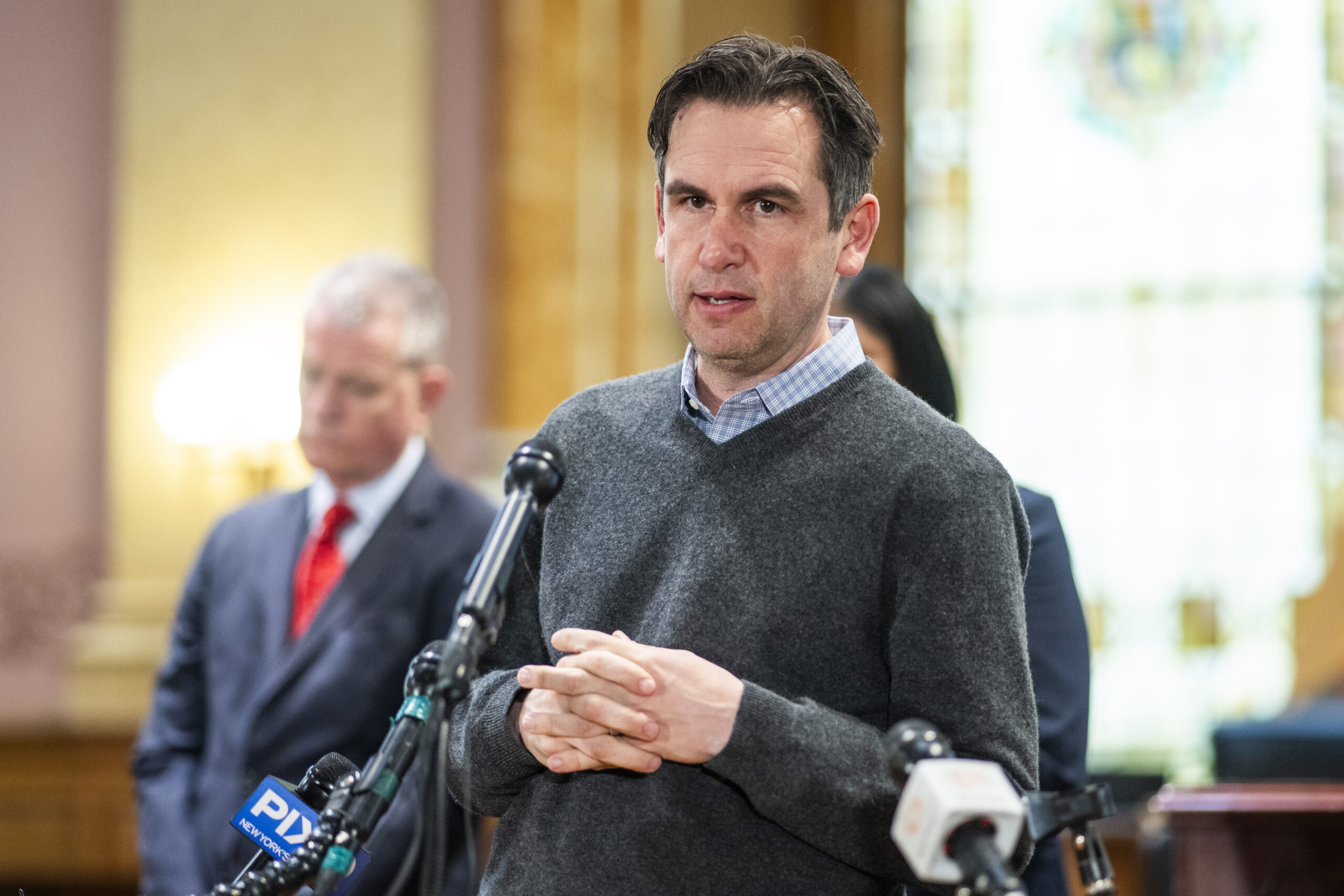
As the new head of NYC’s leading business advocacy group, Fulop said he’s preparing for ‘this experiment of what it means to be an executive in a DSA world’
TEXAS TROUBLE
How an anti-Israel Republican with an antisemitic history could get elected in Texas

An unfolding scandal involving Rep. Tony Gonzales could cost him his seat at the hands of a far-right social media influencer
Plus, Sen. Graham reports MBZ is alive and well

Mass Communication Specialist 3rd Class Amber Smalley/U.S. Navy via Getty Images
Flight deck of the Nimitz-class aircraft carrier USS Abraham Lincoln (CVN 72) May 10, 2019 in the Red Sea.
Good Wednesday afternoon!
This P.M. edition is reserved for our premium subscribers — offering a forward-focused read on what we’re tracking now and what’s coming next.
It’s me again — Danielle Cohen-Kanik, U.S. editor at Jewish Insider and curator, along with assists from my colleagues, of the Daily Overtime. Please don’t hesitate to share your thoughts and feedback by replying to this email.
📡On Our Radar
Notable developments and interesting tidbits we’re tracking
President Donald Trump warned U.K. Prime Minister Keir Starmer not to relinquish control over Diego Garcia — an island in the Indian Ocean that hosts a joint U.S.-U.K. base, as the U.K. plans to transfer sovereignty of the larger island chain to Mauritius, while maintaining a 99-year lease on the base — because it may act as the launching pad for a U.S. strike on Iran.
“Should Iran decide not to make a Deal, it may be necessary for the United States to use Diego Garcia, and the Airfield located in Fairford, in order to eradicate a potential attack by a highly unstable and dangerous Regime — An attack that would potentially be made on the United Kingdom, as well as other friendly countries,” Trump wrote on Truth Social…
Iran is also signaling its readiness for military conflict, The Wall Street Journal reports, including deploying Islamic Revolutionary Guard Corps naval units to the Strait of Hormuz, launching cruise missiles along the coast, conducting a military exercise with a Russian warship near the USS Abraham Lincoln, testing air defense systems, hardening nuclear sites and cracking down once more on dissidents…
Israel, meanwhile, is preparing for its civilian infrastructure to be “a central arena” in a potential U.S.-Iran conflict, Jewish Insider’s Lahav Harkov reports, as Home Front Command chief Maj.-Gen. Shay Klapper told the Knesset Foreign Affairs and Defense Committee today. Committee Chairman Boaz Bismuth said, “There is not one [Israeli] who doesn’t ask himself several times a day when there will be a campaign against Iran. The entire population and home front are preparing”…
Sen. Lindsey Graham (R-SC) dispelled rumors, seemingly spread by Saudi media, that UAE President Sheikh Mohamed bin Zayed was ill or even dying after meeting with him in Abu Dhabi today: “Not only is he alive, but he is also well and as sharp as I’ve ever seen him. To those powers that feel the need to attack MbZ and the UAE for doing the right thing — you do so at your own peril,” Graham said on X.
He also called MBZ’s decision to join the Abraham Accords and “to try to integrate the region with the whole world … one of the most consequential decisions any Middle Eastern leader has made.” Graham is now headed to Saudi Arabia where he will meet with Crown Prince Mohammed bin Salman, whom he recently told publicly to “knock it off” regarding the kingdom’s destabilizing activities in the region…
Democratic Texas state Rep. James Talarico raised $2.5 million in donations for his Senate campaign in the 24 hours after his interview on Stephen Colbert’s late-night show was reportedly quashed by CBS, Politico reports, as early voting in Texas kicked off yesterday ahead of the March 3 primary.
CBS denied it had banned the interview, saying Colbert’s show “was provided legal guidance that the broadcast could trigger the FCC equal-time rule for two other candidates, including Rep. Jasmine Crockett, and presented options for how the equal time for other candidates could be fulfilled,” which Colbert derided as a statement “written by — and I’m guessing for — lawyers”…
On the GOP side of the Texas Senate ballot, Attorney General Ken Paxton looks like the front-runner in his hotly contested primary against incumbent Sen. John Cornyn (R-TX) and Rep. Wesley Hunt (R-TX), despite the GOP establishment spending more than $60 million in attack ads against Paxton, Punchbowl News reports. (And the infighting goes further: Hunt said yesterday he filed criminal charges against a senior member of Cornyn’s campaign team for allegedly doxxing a member of his family.)
Trump told reporters last night that he still hadn’t decided which of the GOP candidates, if any, to endorse, saying, “I like all three of them actually. Those are the toughest races. They’ve all supported me. They’re all good. You’re supposed to pick one, so we’ll see what happens. But I support all three”…
Democratic Virginia state Del. Dan Helmer, a key architect of the state’s current redistricting effort, plans to enter the race for the 7th Congressional District that will be created if state voters approve a constitutional amendment to allow redistricting to proceed.
Helmer, who is Jewish and the son of an Israeli immigrant, ran for the state’s 10th District in 2024 on a staunchly pro-Israel platform, telling JI at the time that calls for conditions on U.S. aid to Israel are “incredibly frustrating.” He became the target of late-stage ad campaigns, which their backers insisted to JI were unrelated to his support for Israel, and ultimately came in second in the Democratic primary…
Humain, Saudi Arabia’s state-sponsored AI company, invested $3 billion in Elon Musk’s xAI, the company announced today. The investment came just before Musk combined xAI with his SpaceX aerospace company, giving the Saudi firm a significant stake in the major U.S. government contractor…
⏩ Tomorrow’s Agenda, Today
An early look at tomorrow’s storylines and schedule to keep you a step ahead
Keep an eye out in Jewish Insider for a look at how the emerging scandal involving Rep. Tony Gonzales (R-TX) — whom the San Antonio Express News confirmed yesterday was engaged in an extramarital affair with a staffer who committed suicide — could catapult an anti-Israel Republican, who has posted videos featuring Nazi imagery, to Congress.
Our focus tomorrow will be the first meeting of the Board of Peace, which will bring several heads of state and senior ministers, including Israeli Foreign Minister Gideon Sa’ar, to Washington. Read JI’s preview of the meeting.
Jewish Federations of North America CEO Eric Fingerhut will deliver what JFNA is calling the first “State of the Jewish Union Address,” ahead of the president’s State of the Union next week, from the organization’s Washington headquarters.
The U.S. Commission on Civil Rights will hold a daylong hearing on antisemitism on college campuses, featuring legal experts, former administration officials, students and Jewish communal leaders, which include Amy Spitalnick, CEO of the Jewish Council for Public Affairs; Kenneth Marcus, founder and CEO of the Louis D. Brandeis Center; Erin Beiner, J Street U director; and Kevin Rachlin, Washington director of The Nexus Project.
Stories You May Have Missed
MONIKER MEANING
Anger at ‘Epstein class’ bleeds into conspiratorial finger-pointing

Follow the language to its most extreme end, and what emerges is undiluted antisemitism
ROCK AND A HARD PLACE
In North Carolina’s Research Triangle, pro-Israel voters at a loss
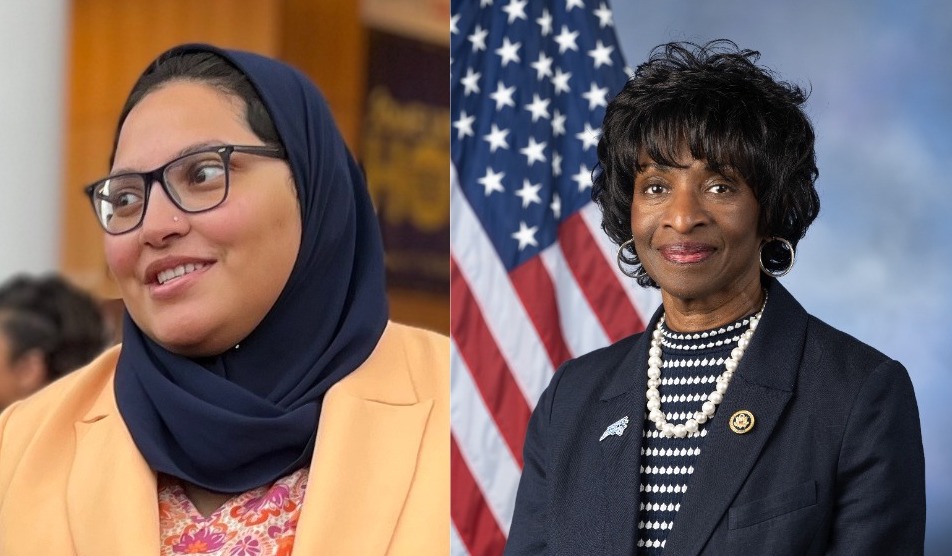
Rep. Valerie Foushee was backed by AIPAC, but has since turned against supporting Israel. Her Democratic opponent is a virulently anti-Israel activist
Plus, Belgium's mohel madness

Jim Watson - Pool/Getty Images
U.S. Vice President JD Vance gives remarks following a roundtable discussion with local leaders and community members amid a surge of federal immigration authorities in the area, at Royalston Square on January 22, 2026 in Minneapolis, Minnesota.
Good Tuesday afternoon!
This P.M. edition is reserved for our premium subscribers — offering a forward-focused read on what we’re tracking now and what’s coming next.
It’s me again — Danielle Cohen-Kanik, U.S. editor at Jewish Insider and curator, along with assists from my colleagues, of the Daily Overtime. Please don’t hesitate to share your thoughts and feedback by replying to this email.
📡On Our Radar
Notable developments and interesting tidbits we’re tracking
As the second round of U.S.-Iran negotiations wrapped up in Geneva this morning, Iranian Foreign Minister Abbas Araghchi told state media that the parties reached a “general understanding on a set of guiding principles” and will “begin working on the text of a potential agreement.”
A U.S. official sounded a more reserved note, telling Axios the talks “made progress” but “there are still a lot of details to discuss.” Iranian officials are expected to present proposals in the next two weeks “to address some of the open gaps in our positions,” the official said.
Vice President JD Vance said on Fox News this afternoon that “the United States has certain red lines. Our primary interest here is we don’t want Iran to get a nuclear weapon. We don’t want nuclear proliferation.”
On today’s negotiations, Vance explained, “in some ways it went well — they agreed to meet afterwards — but in some ways it was very clear that the president has set some red lines that the Iranians are not yet willing to actually acknowledge and work through.”
Ayatollah Ali Khamenei, Iran’s supreme leader, demonstrated that unwillingness, posting on X as talks were underway that if the U.S. insists on prohibiting Iran from enriching uranium “there is no room for negotiation.” As the U.S. sends more military assets to the region, he also threatened to “send that [U.S.] warship to the bottom of the sea”…
New York City Mayor Zohran Mamdani tapped Faiza Ali as commissioner of the Mayor’s Office of Immigrant Affairs today, elevating the longtime activist with ties to the Council on American-Islamic Relations and anti-Israel activist Linda Sarsour. Ali previously served as the community affairs director for CAIR’s New York chapter, and she and Sarsour have co-led Muslim advocacy efforts, including being arrested together in 2017…
Several Chicago-era endorsees of the Congressional Progressive Caucus PAC — Evanston Mayor Daniel Biss, union organizer Anthony Driver Jr., state Sen. Robert Peters and activist Junaid Ahmed — held a joint press conference today slamming AIPAC as a “pro-Trump, right-wing aligned organization” that “is rooted and based in lobbying for this right-wing Israeli government.”
Driver, a candidate in the 7th District who was just endorsed by the CPC PAC today and has not previously spoken at length about his position on Israel, said, “AIPAC is not your friend. … They are in the business of buying elections”…
U.S. Ambassador to Belgium Bill White was summoned to a meeting with Belgian Foreign Minister Maxime Prévot today after White accused the country in a series of heated social media posts of a “RIDICULOUS AND ANTI SEMITIC ‘PROSECUTION’” of three mohels who are being charged with practicing medicine without a license.
Prévot said White’s posts “and interference in judicial matters violate basic diplomatic norms” and denied accusations of antisemitism, while Ambassador Yehuda Kaploun, the State Department’s antisemitism envoy, concurred with White…
Sen. Mark Kelly (D-AZ) told BBC “Newsnight” yesterday that he will “seriously consider” a presidential run in 2028 “because we’re in some seriously challenging times.” The former astronaut, who has recently been the target of the White House’s ire over a video in which he and fellow veterans urged servicemembers to refuse illegal orders, touted his military experience and engineering certifications as part of his pitch…
Texas state Rep. James Talarico, running in a competitive primary for U.S. Senate against Rep. Jasmine Crockett (D-TX), shared an interview he conducted with late-night host Stephen Colbert that CBS declined to run.
Colbert said in his show’s opening remarks last night that the clip would not be broadcast because “we were told in no uncertain terms by our network’s lawyers, who called us directly, that we could not have [Talarico] on the broadcast,” claiming the network was threatened by the Federal Communications Commission…
Eric Trump has invested in Israeli drone maker Xtend as part of a $1.5 billion deal in which the company, which already has a multimillion-dollar contract with the Pentagon, is merging with a Florida construction firm. Xtend was also selected this month by the Department of Defense as one of 25 companies participating in its “Drone Dominance Program”…
Tricia McLaughlin, Homeland Security Secretary Kristi Noem’s spokesperson, is leaving her post next week, Politico reports, after becoming one of the most vocal defenders of the Trump administration’s deportation efforts…
Warner Bros. Discovery announced today it will restart talks with Paramount after initially rejecting the company’s hostile takeover bid in favor of its current agreement with Netflix. Paramount has since increased its nearly $78 billion all-cash offer, including paying the $2.8 billion termination fee Warner will owe Netflix if their deal falls through…
⏩ Tomorrow’s Agenda, Today
An early look at tomorrow’s storylines and schedule to keep you a step ahead
Keep an eye out in Jewish Insider for an interview with Steven Fulop, the former Jersey City mayor who is making a priority of countering antisemitism in his new role as the head of New York City’s business advocacy group.
The International Federation of Social Workers will hold a vote on a contentious effort to expel the Israeli Union of Social Workers, after some European members complained that Israeli social workers had served in combat roles during Israel’s war against Hamas in Gaza — a move that the U.S.-based National Association of Social Workers unexpectedly said today it resoundingly opposes.
U.S. Ambassador to Israel Mike Huckabee will sit down with Tucker Carlson in Jerusalem for an episode of the commentator’s podcast, as the two have been at loggerheads over Carlson’s repeated criticisms of Israel.
The Kigali Forum, a conference bringing together policy leaders and think tanks from the United States, Africa and Israel to discuss “the new Middle East,” will take place in Kigali, Rwanda.
The trial of the man accused of killing Paul Kessler, a Jewish man who was beaten and died during rival pro- and anti-Israel protests in the Los Angeles area in November 2023, is set to begin in Ventura County Superior Court.
Stories You May Have Missed
ENVOY ISSUES
Lawmakers alarmed by Barrack’s Turkey tilt in his Middle East diplomacy
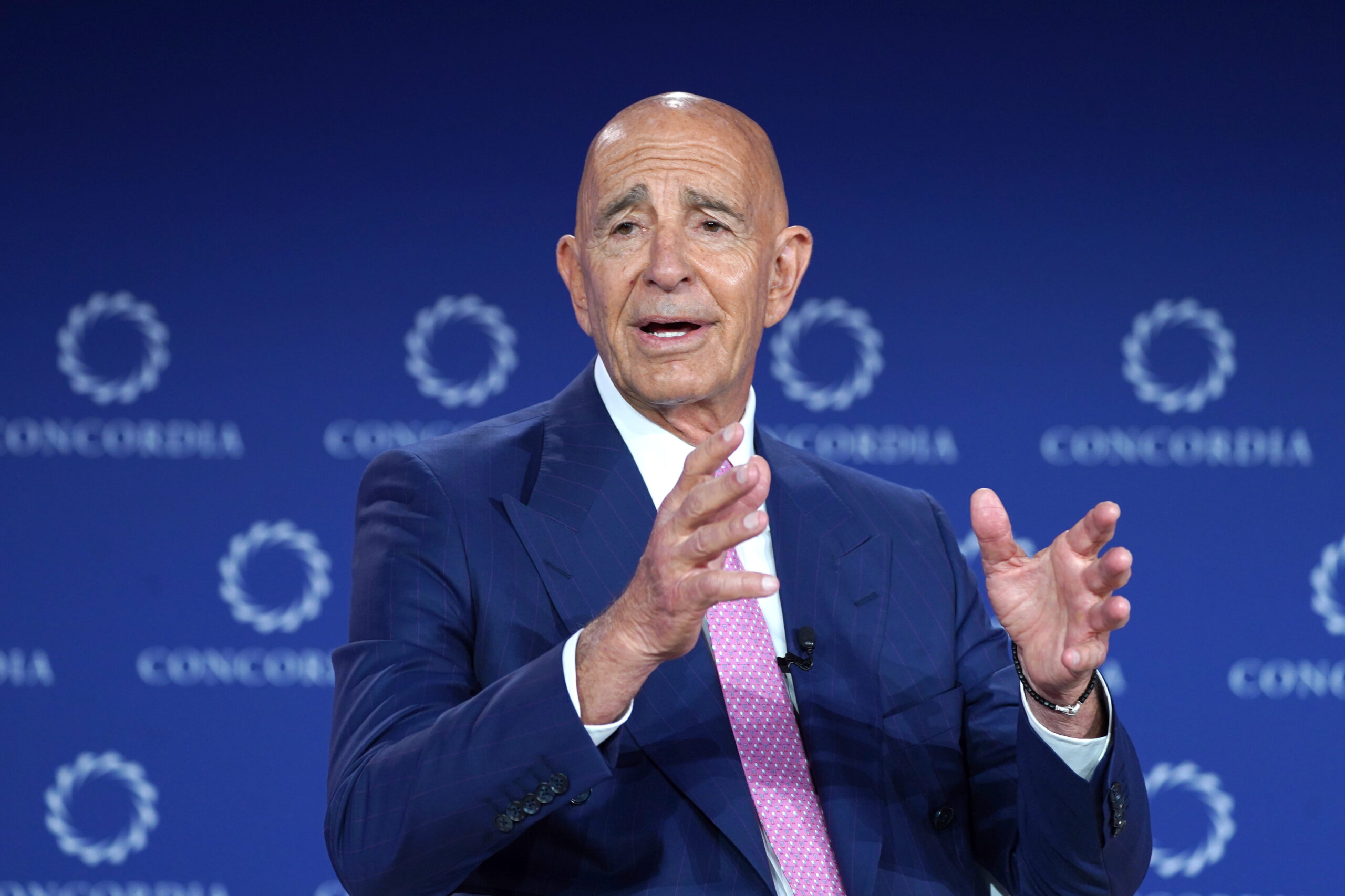
Barrack, the U.S. ambassador to Turkey, plays an outsized role in setting foreign policy in the region, lawmakers and experts say
SENATOR SAYS
Lindsey Graham calls on Saudi Arabia to ‘knock it off’

The senator addressed Saudi and Emirati leadership directly about escalating tensions in the region in his remarks at the Munich Security Conference
The Texas senator, facing a competitive primary, praised Sen. Ted Cruz for taking the lead in speaking out against anti-Jewish hate
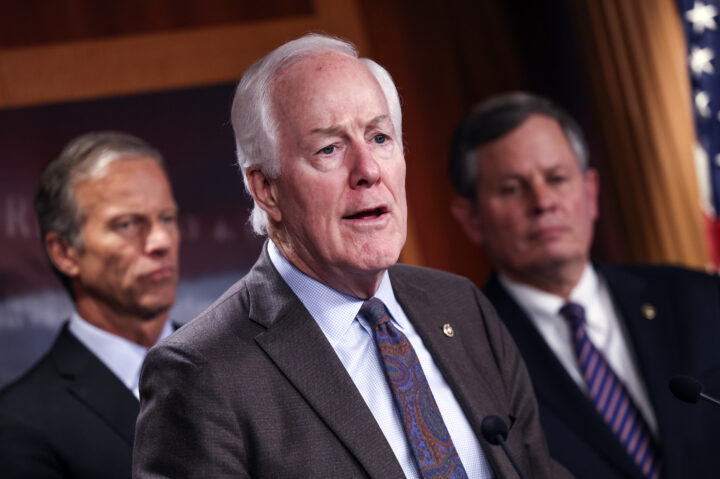
Kevin Dietsch/Getty Images
Sen. John Cornyn (R-TX), joined by Sen. John Thune (R-SD) (L) and Sen. Steve Daines (R-ID) speaks about the Senate Democrats at the U.S. Capitol on September 29, 2021 in Washington, D.C.
Facing a heated primary against Texas Attorney General Ken Paxton, Sen. John Cornyn (R-TX) accused his right-wing challenger on Thursday of associating with antisemitic and anti-Israel voices within the MAGA movement.
Cornyn told Jewish Insider in a wide-ranging interview that Texas Republican voters should view Paxton’s associations with figures such as former Trump advisor Steve Bannon as “alarming” — while urging Republicans to call out antisemitic and anti-Israel voices within the party, along the lines of his outspoken Texas GOP colleague Sen. Ted Cruz (R-TX).
“There’s this interesting, and troubling, tendency of some folks who claim the MAGA mantle to associate with antisemites like Nick Fuentes, Candace Owens and Steve Bannon. I know Ken Paxton regularly goes on Bannon’s ‘War Room’ podcast, and it’s something that should be alarming to Texas voters. People like that I don’t think are what I would call conservatives,” Cornyn said.
“Once they “get their foot in the door, they have a way of corrupting the whole party and the whole movement,” he continued. “I just think allowing somebody like Ken Paxton inside the tent will end up being the destruction of the Republican Party.”
Paxton has been a guest on Bannon’s “War Room” podcast on numerous occasions in recent years, even as Bannon has made a number of controversial comments, most notably labeling popular Jewish conservative podcast host Ben Shapiro as a “cancer” on the party after he spoke out against Tucker Carlson and Owens’ antisemitism at a Turning Point USA conference last year.
Bannon has also ramped up attacks on Israel, calling the Jewish state a “protectorate” of the United States — while speaking out against President Donald Trump’s decision last year to attack Iran’s nuclear facilities.
A spokesperson for Paxton defended the Texas attorney general’s record on Israel and fighting antisemitism in a statement to JI.
“AG Paxton has been a fierce friend of Israel,” the spokesperson said. “After spending $70 million and still being double digits behind in the polls, Sen. Cornyn has nothing else left but to throw random attacks at the wall and see if they stick. AG Paxton has a STRONG and unquestionable record standing against antisemitism.”
Cornyn is facing a tough reelection battle against Paxton and Rep. Wesley Hunt (R-TX), both of whom are running to his right in next month’s Republican primary.
The senator, a fixture in Texas politics for nearly four decades who served at the top levels of Senate leadership, argued that his primary contest would help determine what it means to be an electable Republican at a time when the party’s principles and values are being debated internally.
“A lot of it [the GOP primary election] is going to boil down to a question of character. I think character still matters and the attorney general doesn’t believe it matters at all,” Cornyn said. “I just can’t in good conscience turn over this job representing 32 million people and a state that I love and a party that I helped build over my career, I can’t turn it over to a corrupt and unprincipled individual like the attorney general.”
Cornyn warned that the GOP is at risk of being overrun by extremists if prominent conservatives continue to align themselves with fringe figures who espouse antisemitic views, drawing a comparison to his assessment of the current ideological trajectory of the Democratic Party.
“It starts out with the old saying: the enemy of my enemy is my friend. A lot of these folks were opposed to a lot of the worst excesses of the Democratic Party and the leftists. They began to corrode that movement with things like antisemitism and graft and greed. I think that’s how credibility of the opposition was eroded, by failing to call out people like that,” Cornyn said.
“To maintain the integrity of conservatives, that’s why it’s so important to call out and to cut out some of these cancers that I think ultimately would result in the failure of the conservative movement,” he continued. “Because people could point to the corruption that was allowed to develop and thus undermine the credibility and integrity of the whole movement.”
Cornyn praised Cruz for “being one of the first to stand up and call out some of the fringe characters,” and criticized Republicans who associate themselves with far-right figures.
“I’ve tried to do my part, initially through an editorial in the Dallas Morning News. I know this is a cancer, because antisemitism is just another way of dehumanizing people, and then using that behavior to justify in some people’s minds acts of violence,” the GOP senator said. “Obviously, the history of the Jewish people, dating back to the Holocaust, has been one of opponents trying to dehumanize them and make them seem to be something less than equal in terms of their dignity and their right to exist.”
Asked whether Trump would back him before the March primary, Cornyn told JI that he did not expect an endorsement, adding that he was dealing with “a lot of misinformation and lies.”
“I’ve been supportive of the president and his policies. Unfortunately, you always have to contend with a lot of misinformation and lies in modern elections,” Cornyn explained. “He [Trump] said he considers all three of us [GOP candidates] to be friends. If your base is divided among three people, choosing one out of those three people and disappointing the supporters of the other two, I can understand [that being] not something he would want to necessarily embrace unless he felt like it’s worth the cost.”
Cornyn argued that he would be the strongest general election candidate between himself, Paxton and Hunt, whereas Paxton would “ultimately provide the Democrats the best opportunity they’ve had since 1994 to turn Texas blue.”
“President Trump desperately wants to maintain the majority in the House, and we’ve got five new congressional seats in Texas,” he said. “If I’m the nominee, I will provide some help to those downballot races since I’ll be at the top of the ballot. I won by 10 [points] in 2020. If Paxton is the nominee, he’ll either lose or win by the skin of his teeth.”
Asked about Texas state Rep. James Talarico and Rep. Jasmine Crockett (D-TX), the Democrats in the race, Cornyn suggested he would enjoy running against either in a general election.
“They should be running for Senate in California because they are totally out of step with where I think Texans are,” he said.
Cornyn added that he would not underestimate Crockett.
“I wouldn’t count out Jasmine. Jasmine is smart, but I think she’s not running as good a campaign as Talarico,” Cornyn said. “Talarico is raising a lot of money, and he definitely has a better organization than Jasmine does.”
Plus, Trump sets monthlong timeline for Iran deal
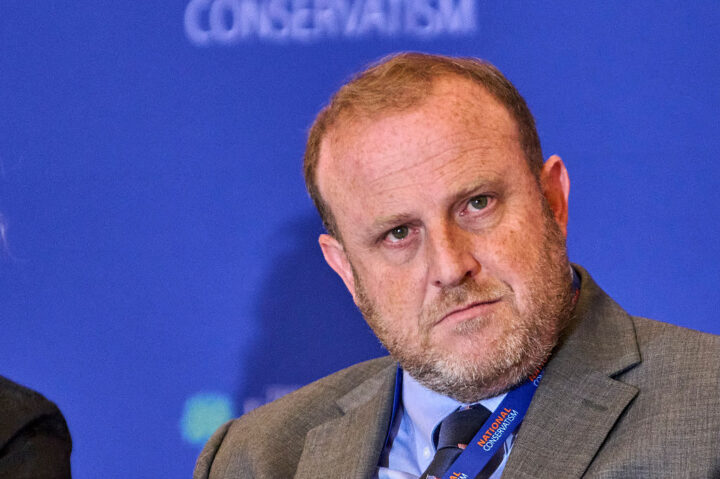
DOMINIC GWINN/Middle East Images/AFP via Getty Images
Jeremy Carl speaks at the National Conservatism Conference in Washington D.C., Sept. 3, 2025.
Good Thursday afternoon!
This P.M. edition is reserved for our premium subscribers — offering a forward-focused read on what we’re tracking now and what’s coming next.
It’s me again — Danielle Cohen-Kanik, U.S. editor at Jewish Insider and curator, along with assists from my colleagues, of the Daily Overtime. Please don’t hesitate to share your thoughts and feedback by replying to this email.
📡On Our Radar
Notable developments and interesting tidbits we’re tracking
Israeli Prime Minister Benjamin Netanyahu again voiced skepticism about the U.S.’ ability to reach an agreement with Iran as he departed Joint Base Andrews today, reports Jewish Insider’s Lahav Harkov, who is traveling with the prime minister’s delegation.
A day after his White House meeting with President Donald Trump, Netanyahu told reporters, “The president thinks the Iranians understand who they’re dealing with. He thinks the conditions he is setting, combined with their understanding that they made a mistake last time not reaching a deal, could bring them to agree to conditions that will allow a good deal to be reached.”
The prime minister’s view was more reserved: “I do not hide my general skepticism about the possibility of any deal with Iran.” Netanyahu said he told Trump that if a deal is indeed reached, “it must include the components that are important to us, the State of Israel, and, I think, the entire international community: not just the nuclear matter, but also ballistic missiles and Iranian proxies in the region.”
The Prime Minister’s Office also said Netanyahu will not be returning to Washington next week as scheduled, in order to speak at an AIPAC conference, and will instead appear virtually…
At a press conference this afternoon, Trump said the timeline for a potential deal with Iran is “over the next month … should happen quickly.” Asked why Netanyahu wants him to stop negotiating, Trump said, “He didn’t say that, we didn’t discuss that. I’ll talk to [Iran] as long as I like.” Trump additionally said Israeli President Isaac Herzog “should be ashamed of himself” and called him “disgraceful” for not issuing a pardon to Netanyahu…
The Trump administration smuggled around 6,000 Starlink terminals, used to establish internet connection, to activists in Iran during the regime’s violent suppression of nationwide protests, which included internet blackouts, U.S. officials told The Wall Street Journal…
New York City Mayor Zohran Mamdani and his team refused to condemn antisemitic and pro-Hamas social media posts from the co-founder of the group ‘Hot Girls for Zohran’ when pressed by JI’s Will Bredderman and other reporters today.
Speaking from City Hall, Mamdani would only stress that Gilani’s organization operated independently of his official election effort: “This was an individual leading an outside group and was never paid for by our campaign,” said Mamdani. “If New Yorkers want to know my views then they can hear it directly from me.
But when JI pressed the mayor directly whether he condemned the content of Gilani’s posts, he refused to respond and left the room, similar to how he fled questions on the matter from Politico on Wednesday…
Rep. Elise Stefanik (R-NY) urged the Trump administration today to investigate reports that a clique of radical staffers at the New York City Department of Health and Mental Hygiene had launched an anti-Israel “working group” inside the agency, JI’s Will Bredderman reports.
In a letter addressed to Health and Human Services Secretary Robert F. Kennedy Jr., Stefanik decried reports that employees had met during work hours at the city bureaucracy’s Queens headquarters. She raised the possibility that the department’s federal funding might have gone toward a prohibited political purpose — or that the gathering may have violated civil rights protections by creating a discriminatory environment for Jewish New Yorkers…
The nomination of Jeremy Carl, tapped to be the assistant secretary of state for international organizations, appears bound to fail after Sen. John Curtis (R-UT) announced his opposition to Carl’s confirmation following his contentious hearing in the Senate Foreign Relations Committee this morning, JI’s Marc Rod reports.
Curtis and a series of Democrats questioned Carl over past antisemitic, anti-Israel and otherwise inflammatory comments that the nominee had made online and in a series of podcast appearances, including his assertion that the U.S. spends too much time and energy on Israel “often to the detriment of our own national interest” and that “the Jews love to see themselves as oppressed”…
CENTCOM announced today it had completed a “deliberate and conditions-based” withdrawal of U.S. forces from al-Tanf Garrison in Syria, handing control of the site on the country’s border with Iraq and Jordan to forces aligned with the Syrian government. The U.S. has had a presence at the base since 2016 as part of its fight against ISIS; over 7,000 ISIS detainees are also being transitioned out of Syria into Iraq, while the U.S. troops were relocated to Jordan…
Germany joined the growing calls today for U.N. Special Rapporteur Francesca Albanese to resign, after France did the same yesterday, over her recent speech at the Al Jazeera Forum where she called Israel humanity’s “common enemy.” German Foreign Minister Johann Wadephul wrote on X, “I respect the system of independent rapporteurs of the UN. However, Ms. Albanese has already repeatedly failed in the past. I condemn her recent statements about Israel. She is untenable in her position”…
Israeli authorities arrested several people, and indicted one army reservist and one civilian, for allegedly using classified information to place bets on the popular prediction market Polymarket around the timing of Israel’s war with Iran last June, the Shin Bet announced today. The bets all correctly predicted the timeline of the strikes, raking in more than $150,000, Israeli media reported…
⏩ Tomorrow’s Agenda, Today
An early look at tomorrow’s storylines and schedule to keep you a step ahead
Keep an eye out in Jewish Insider for reporting on the race to succeed Rep. Bonnie Watson Coleman (D-NJ) in New Jersey’s 12th Congressional District, where the congresswoman is coming out forcefully against the lone Jewish candidate in the race — for being too supportive of Netanyahu.
The Munich Security Conference kicks off tomorrow, with Secretary of State Marco Rubio leading the U.S. delegation and speaking from the main stage on Saturday. Dozens of members of Congress were also expected to attend — official travel was canceled due to the impending shutdown of the Department of Homeland Security tomorrow, but members still may attend on their own. One member making a foray into foreign policy is Rep. Alexandria Ocasio-Cortez (D-NY), who will be speaking on two panels at the high-level summit. Other Democrats in attendance will be California Gov. Gavin Newsom, Michigan Gov. Gretchen Whitmer and Boston Mayor Michelle Wu.
In observance of President’s Day, we’ll be back in your inbox with the Daily Overtime on Tuesday. Shabbat Shalom!
Stories You May Have Missed
DOUBLING DOWN
Two Trump religious liberty appointees joined forces in anti-Israel push for antisemitism hearing

Activist Sameerah Munshi was appointed by the White House to the commission’s advisory board; the two women have jointly posted antisemitic content online
DOHA DEALINGS
GOP senator Ted Budd calls on Qatar to extradite Hamas leader to the U.S.

Budd says Qatar should hand over Khaled Mashaal because he has the ‘blood of Americans on his hands’
Plus, France calls for resignation of U.N.'s Albanese

GPO
President Donald Trump greets Israeli Prime Minister Benjamin Netanyahu at the White House on Feb. 11, 2026.
Good Wednesday afternoon!
This P.M. edition is reserved for our premium subscribers — offering a forward-focused read on what we’re tracking now and what’s coming next.
It’s me again — Danielle Cohen-Kanik, U.S. editor at Jewish Insider and curator, along with assists from my colleagues, of the Daily Overtime. Please don’t hesitate to share your thoughts and feedback by replying to this email.
📡On Our Radar
Notable developments and interesting tidbits we’re tracking
The U.S. will continue pursuing diplomacy with Iran, President Donald Trump said following his White House meeting with Israeli Prime Minister Benjamin Netanyahu earlier today, Jewish Insider’s Lahav Harkov reports.
“There was nothing definitive reached” in the meeting “other than I insisted that negotiations with Iran continue, to see whether or not a deal can be consummated,” Trump wrote on Truth Social. “If it can, I let the Prime Minister know that will be a preference.”
If negotiations do not lead to a deal, the president added, “we will just have to see what the outcome will be. Last time, Iran decided they were better off not making a deal, and they were hit with [Operation] Midnight Hammer. That did not work out well for them. Hopefully, this time, they will be more reasonable and responsible.”
Netanyahu’s office said about the meeting, “The prime minister stood up for the State of Israel’s security needs in the context of the negotiations, and the two agreed to continue to coordinate closely”…
Even as Trump insists diplomacy will continue, the Pentagon has told a second aircraft carrier strike group to prepare for deployment to the Middle East, The Wall Street Journal reports, to join the USS Abraham Lincoln along with dozens of U.S. aircraft and other warships…
Meanwhile, a bipartisan group of 23 senators, spanning the political and ideological spectrums, introduced a resolution today condemning the Iranian government for its crackdown on protesters and attempts to cut off internet access across the country, JI’s Marc Rod reports.
“Iranian civilians’ unprecedented nationwide protests and bravery, confronted with the regime’s unprecedented widespread extrajudicial killing of thousands and disruption of all electronic communication, have profoundly destabilized the country and constitute changed conditions in Iran,” the resolution reads, highlighting that the regime’s suppression and killing of protesters continues…
The Trump administration expects to be able to announce several billion dollars in donations for Gaza reconstruction at the Board of Peace’s inaugural meeting in Washington next week, The Times of Israel reports, even as it is still working on a proposal to disarm Hamas. That plan so far reportedly envisions Hamas relinquishing its heavy weapons and destroying manufacturing sites, without fully addressing lighter arms…
Conservative activist Carrie Prejean Boller was removed from the White House’s Religious Liberty Commission today, JI’s Gabby Deutch reports, two days after the commission held its first public hearing on antisemitism, which turned contentious when Prejean Boller pressed Jewish witnesses about whether they would consider her antisemitic for not being a Zionist and for believing Jews killed Jesus.
“No member of the Commission has the right to hijack a hearing for their own personal and political agenda on any issue,” Texas Lt. Gov. Dan Patrick, who chairs the commission, wrote in a post on X. “This is clearly, without question, what happened Monday in our hearing on antisemitism in America. This was my decision”…
France is calling for the resignation of U.N. Special Rapporteur Francesca Albanese, French Foreign Minister Jean-Noël Barrot announced today, after Albanese called Israel humanity’s “common enemy” in a speech at the Al Jazeera Forum in Qatar over the weekend.
“France unreservedly condemns the outrageous and reprehensible remarks made by Francesca Albanese, which are directed not at the Israeli government, whose policies may be criticized, but at Israel as a people and as a nation, which is absolutely unacceptable,” Barrot said in remarks to lawmakers. Her latest comments add “to a long list of scandalous positions,” including “justifying” the Oct. 7 attacks and “comparing Israel to the Third Reich,” he said…
Senate Minority Leader Chuck Schumer (D-NY) and Sen. Adam Schiff (D-CA) introduced legislation seeking oversight into the hundreds of millions of dollars in Venezuelan oil proceeds that the U.S. has acquired, some of which officials have said is being held in an account in Qatar…
New York City’s only Ethiopian-Israeli restaurant is closing its doors to diners, Jewish Telegraphic Agency reports, and turning only to private events over rising anti-Israel harassment, which the owner, Beejhy Barhany, said escalated after the restaurant became kosher in February 2024…
The Department of Homeland Security hired a social media manager who had raised red flags at his previous position at the Department of Labor posting messaging that echoed white nationalist sentiments on official social media accounts, The New York Times reports.
Those posts “used evocative imagery, some reminiscent of the 1920s and 1930s, with phrases like ‘Restore American Greatness’ and ‘the globalist status quo is OVER.’ … Colleagues warned superiors that the department’s accounts could be seen as promoting white-supremacist rhetoric, Nazi imagery and QAnon conspiracy theories”…
⏩ Tomorrow’s Agenda, Today
An early look at tomorrow’s storylines and schedule to keep you a step ahead
Keep an eye out in Jewish Insider for an interview with Jason Friedman, a longtime Chicago Jewish federation leader making a bid for Illinois’ open 7th Congressional District.
The Senate Foreign Relations Committee will hold a nomination hearing for conservative commentator Jeremy Carl to serve as assistant secretary of state for international organizations. Schumer denounced Carl and his nomination on the Senate floor this week, “citing Carl’s long history of racist, white supremacist, and antisemitic views.”
Sinai Temple in Los Angeles will host a summit tomorrow on faith and sports, ahead of NBA All-Star weekend taking place in the city. The convening will feature several NBA athletes, coaches and faith and civic leaders.
Stories You May Have Missed
BASEBALL DIARIES
Team Israel’s World Baseball Classic team unveils its 2026 roster

The team is anchored by its pitching ace Dean Kremer of the Orioles, while Harrison Bader and Spencer Horwitz are among its best known hitters
SYRIA SPOTLIGHT
House members say Syrian government is not meeting U.S. expectations for sanctions relief
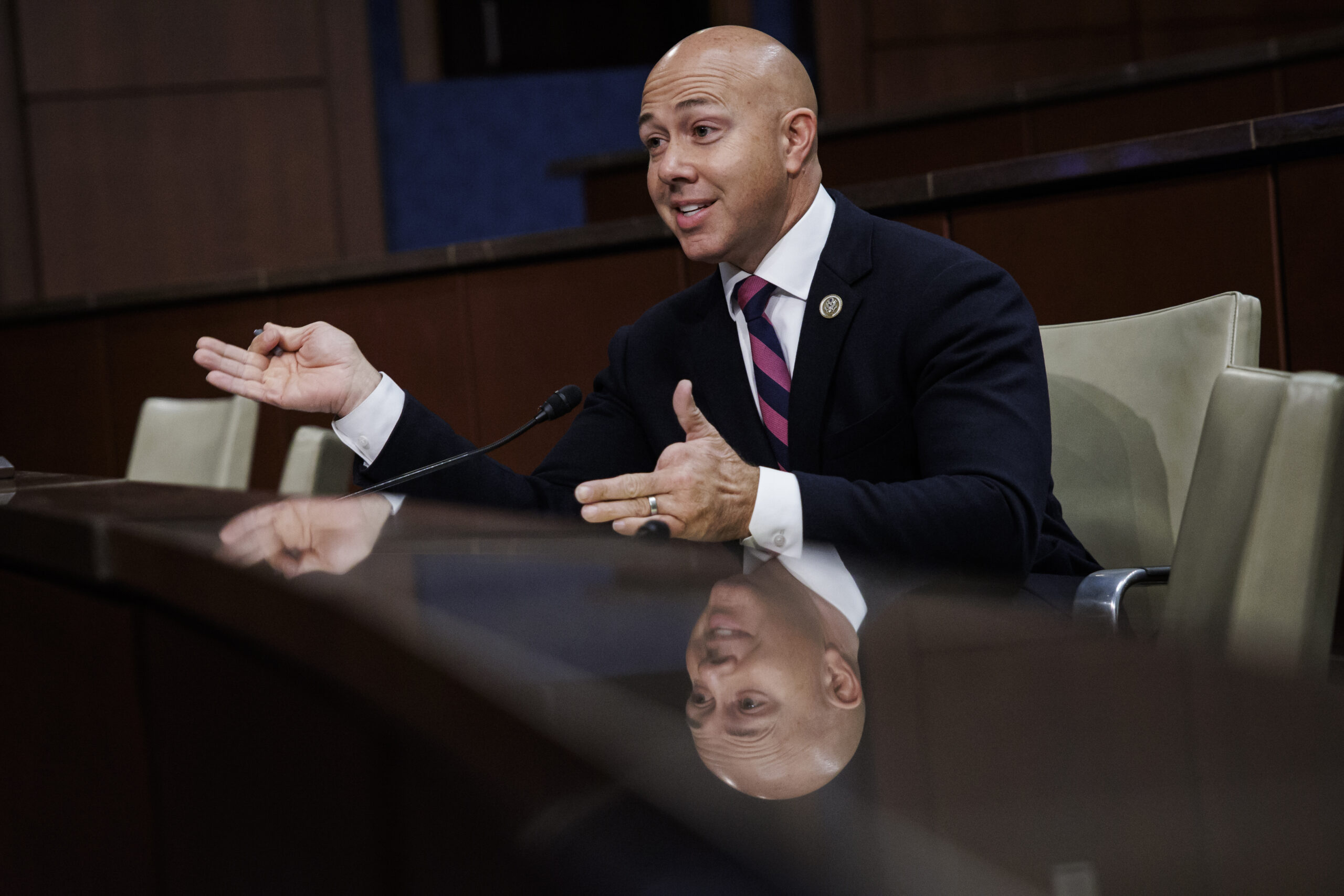
Speaking at a House Foreign Affairs Committee hearing, Republican and Democratic lawmakers highlighted ongoing abuses by the Syrian government
The ‘Hot Girls for Zohran’ creator, who moved to Brad Lander's congressional campaign, promoted extremist material claiming Israeli foreknowledge of 9/11 and urging violence against the Jewish state

Andres Kudacki/Getty Images
Former New York City Comptroller Brad Lander speaks during his campaign launch event at Nitehawk Cinema on December 10, 2025 in New York City.
The highest-paid consultant for former New York City Comptroller Brad Lander’s congressional bid is the founder of the “Hot Girls for Zohran” campaign — and a prolific X user who has shared posts lauding Hamas and insinuating Israeli involvement in 9/11 and the assassination of President John F. Kennedy, all while attacking police and Democratic elected officials.
Among the 21 payments appearing in the first campaign finance filing from Lander — New York City Mayor Zohran Mamdani’s endorsed candidate against Rep. Dan Goldman (D-NY) — the largest is $15,000 disbursed to a company called Brain Child LLC for “Website and social media.” State corporation records reveal that the two-and-a-half-month-old firm belongs to Kaif Gilani and is based out of his triplex Brooklyn apartment.
According to his LinkedIn, Gilani serves as the vice president of the enterprise data office at Citi (the financial company did not confirm or deny this when reached for comment, but said it is “investigating the matter”). But Gilani gained attention, often using the name Kaif Kabir, during the 2025 mayoral campaign as one half of the team behind “Hot Girls for Zohran”: a viral merchandising, social media and volunteer canvassing effort backing the insurgent democratic socialist.
“Hot Girls for Zohran” also organized such high-engagement events as a Mamdani look-alike contest and a costumed Halloween bash profiled in Vanity Fair. In a photo posted to Substack, the future mayor posed with Gilani holding up one of the group’s signature T-shirts.
But amid all the fanfare, Gilani’s X account — from which he tweeted as @chunkyfila, after formerly using his own name as a handle — passed unnoticed, despite numerous extreme views he expressed or amplified on the platform. After Jewish Insider requested comment, Gilani deleted his X and LinkedIn profiles; he also set his Instagram profile, which also uses @chunkyfila as a handle and formerly linked an empty — now deleted — account for Brain Child, to private.
A representative for Lander, a self-proclaimed progressive Zionist who has been deeply critical of Israel during its war against Hamas, maintained that the campaign was unaware of the posts JI uncovered at the time it contracted with Gilani. They added that they have ended their relationship with his firm as of Tuesday in response to JI’s findings.
“We were not aware of these tweets when we hired them. As soon as we became aware, we terminated their contract. They definitely do not reflect Brad’s views,” said spokeswoman Lauren Hitt. “Brad has denounced and condemned Hamas, the October 7th attacks, and the sexual violence that they committed on after [sic] October 7th, on many occasions.”
Hitt did not answer, however, how the campaign came to hire Brain Child in the first place, or whether it would scrap any products the company created for Lander’s congressional bid.
Gilani’s social media activity includes numerous posts and retweets assailing Israel, which he has called a “settler project country.” In January 2025, just a few months before “Hot Girls for Zohran” launched, Gilani retweeted a post by Holocaust revisionist Ian Carroll — a recurring guest on Tucker Carlson’s show — in which Carroll suggested that Israel was implicated in the Kennedy assassination and the 9/11 attacks.
Giliani also retweeted a conspiratorial post from Carroll which read, “AIPAC purchased the seats of about 90% or more of our current congress. JFK famously wanted them registered as a foreign agent right before he was shot.” The post further repeated the long-debunked “dancing Israelis” conspiracy theory, which falsely claims Mossad agents had advance notice of 9/11.

The pinned post at the top of his Instagram is a photo of posters bearing the slogan “long live Palestine” and showing the entire territory of Israel, the West Bank and the Gaza Strip swathed in a keffiyeh with no boundary lines. Last May, he shared another X user’s assertion that “‘Israel has a right to exist’ is a racist, anti-Palestinian dog whistle which implies the extermination of the Palestinian People.”
Gilani has also repeatedly authored or promoted tweets sympathetic to or supportive of Hamas, in March 2024 sharing a post claiming that the bargaining table position of the terrorist organization — which rejects Israel’s existence and which initiated the latest wave of the conflict with its rampage into Israeli territory on Oct. 7, 2023 — is “we want lasting peace and our basic human rights.”

He also retweeted a clip of former Hamas chief Yahya Sinwar, who was killed by Israeli forces in October 2024 after he masterminded the previous year’s attacks, with a caption that read, “Does the world expect us to be well-behaved victims while we are getting killed? For us to be slaughtered without making a noise?” Gilani also retweeted a post that attacked stylistic differences between the Time cover honoring Ukrainian President Volodymyr Zelensky, who is Jewish, as “Person of the Year” and the issue announcing Sinwar’s death as “A tale of two ethnicities.”
In November 2023, Gilani reacted to a tweet decrying a Hamas rocket that struck an Israeli kindergarten in Sderot by writing, “I thought this was satire for a second.” He further boosted tweets mocking or dismissing Jewish Americans’ concerns about rising antisemitism, retweeting one post stating that such fear “makes me laugh” because of how American Muslims purportedly downplay their own experience of Islamophobia, and another that sneered “really love the internet when I can watch videos of a Jewish pogrom in the West Bank where 3 Palestinians were killed and then see people on the Upper East Side tweeting about how unsafe they feel as Jews in New York after a Democratic primary election.”
He also shared multiple posts denying or downplaying well-documented incidents of antisemitic violence during November 2024 riots in Amsterdam.
In October 2024, after Iran launched more than 200 ballistic missiles and drones at Israel, he reposted a tweet, the text of which stated, “One side is cartoonishly evil in this war, and it ain’t Iran.” On June 13, 2025, when Israel severely damaged Iranian nuclear sites and military installations, Gilani tweeted about the news, saying, “May Allah protect the children of this earth. Those who have to learn about the perils of war before getting to experience the simple pleasures of this dunya.” One day later, he retweeted a post stating “Tell Iran we voting for a Muslim in NYC please let them know lmao.”
Gilani has also repeatedly signal-boosted individuals and organizations linked to the global propaganda network controlled by Beijing-based tech mogul Neville “Roy” Singham, including CODEPINK, BreakThrough News and pundit Rania Khalek, who first became famous as an apologist for Syrian dictator Bashar al-Assad on Russian state-owned media.
And in July of last year, Gilani retweeted a post asserting “there is no negotiating with Israel,” which the user labeled “a racist supremacist state.” He also shared another post that called for “overwhelming military force” against Israel over its policies toward Gaza.
He also shared multiple posts urging Mamdani not to abandon the slogan “globalize the intifada,” a phrase that has been invoked at anti-Israel demonstrations and criticized as an anti-Jewish call to violence, and which the now-mayor has distanced himself from but refused to condemn.
That same month, he retweeted a post from a now-deleted account that denied the extensive evidence of sexual assaults conducted by Hamas during the Oct. 7 attacks, denouncing such assertions as “so obscenely racist it’s disgusting anyone remotely believed that shit.”
In a statement to JI, Gilani did not directly address the content or substance of any of his tweets. Rather, he insinuated that he was being singled out for his Muslim faith. He denied holding any animus toward Jewish people, and maintained those he knows personally hold the same views as he does.
“My critiques of the Israeli government as it carries on a U.S.-backed slaughter are not antisemitism, they are indicative of a basic level of morality and empathy for others,” he wrote in an email. “I’m grateful for my many Jewish friends who share my opinions. Free Palestine.”
Gilani has also gone after leading Democratic politicians, including some with whom Mamdani and Lander would need to work to achieve their policy aims.
In 2020, Gilani referred to then-candidate Joe Biden as “a pedophile with dementia,” while in 2024 he quote-tweeted the then-president with the message: “My prayer is that your heart stops beating.” He has also asserted that Sen. Kirsten Gillibrand (D-NY) “is going to hell.” He also urged a primary campaign against House Minority Leader Hakeem Jeffries (D-NY), writing to City Councilman Chi Osse: “Let’s get his ass.” Mamdani reportedly discouraged Osse from running against Jeffries, and intervened to block an endorsement of his candidacy from the Democratic Socialists of America.
Gilani has also lashed out at City Councilwoman Inna Vernikov, a Jewish Republican representing parts of Brooklyn. In May 2024, Gilani tweeted at the lawmaker, “You’re a f*cking idiot and your face resembles that of a horse.”
He has also attacked Mamdani’s close ally Sen. Bernie Sanders (I-VT), tweeting at him “u a f*cking b*tch fr.”
Gilani has vented strong anti-police sentiments, having written that “all cops are going to hell,” as well as “there’s no such thing as a good cop” and “we literally do not give a f*ck about videos of cops or military on their knees. we won’t be satisfied until the entire racist system is on its knees.” He has also tweeted “f*ck the police” on at least two occasions.
As the NYPD cleared the anti-Israel encampments at Columbia University on May 1, 2024, Gilani retweeted a post which stated, “Cops are violent psychopaths who pray for a moment like this where they get to live out their rotten fantasies of beating and killing protestors,” and added, “Reform isn’t real.” Additionally, Gilani shared a statement from activists at Emory University that labeled police “pigs.”
Besides his political and religious musings, Gilani’s feed consists largely of references to sports gambling, cryptocurrencies and lewd jokes.
Plus, N.C. Dems condemn antisemitism from Muslim caucus chair

Heather Khalifa/Bloomberg via Getty Images
Analilia Mejia, US Democratic House candidate for New Jersey, speaks to supporters and members of the media at Paper Plane Coffee Co. in Montclair, New Jersey, US, on Thursday, Jan. 29, 2026.
Good Tuesday afternoon!
This P.M. edition is reserved for our premium subscribers — offering a forward-focused read on what we’re tracking now and what’s coming next.
It’s me again — Danielle Cohen-Kanik, U.S. editor at Jewish Insider and curator, along with assists from my colleagues, of the Daily Overtime. Please don’t hesitate to share your thoughts and feedback by replying to this email.
📡On Our Radar
Notable developments and interesting tidbits we’re tracking
President Donald Trump is considering sending a second aircraft carrier group to the Middle East as a contingency if negotiations with Iran fail, he told Axios today. “Either we will make a deal or we will have to do something very tough like last time,” the president said, adding, “We have an armada that is heading there and another one might be going.”
Still, Trump expressed optimism that Tehran “wants to make a deal very badly” and said the negotiations are “very different” since he authorized strikes last June on Iran’s nuclear facilities. He also said he doesn’t think Israeli Prime Minister Benjamin Netanyahu, who is en route to Washington for his Wednesday meeting with Trump, is nervous about the negotiations, stating Netanyahu “also wants a deal. He wants a good deal”…
Trump also reiterated his opposition to West Bank annexation, days after Israel’s Security Cabinet voted to expand Israeli authorities in the area. “I am against annexation. We have enough things to think about now. We don’t need to be dealing with the West Bank,” he told Axios. While Trump’s meeting with Netanyahu tomorrow will ostensibly focus on Iran, the latest Israeli moves could drive a wedge between the two leaders…
On the campaign trail, former Rep. Tom Malinowski (D-NJ) conceded the race for New Jersey’s 11th Congressional District to far-left activist Analilia Mejia today, after outstanding ballots broke decisively in her favor over the weekend.
In his statement, Malinowski, the presumed favorite who was the target of over $2 million of ads by the AIPAC-linked United Democracy Project super PAC, claimed that “the outcome of this race cannot be understood without also taking into account the massive flood of dark money that AIPAC spent on dishonest ads” attacking him. He warned, “If AIPAC backs a candidate — openly or surreptitiously — in the June NJ-11 Congressional primary, I will oppose that candidate and urge my supporters to do so as well.”
Mejia was congratulated by New Jersey Democratic leaders including Sens. Andy Kim and Cory Booker and Gov. Mikie Sherrill, though it remains to be seen if she will retain their support in the June primary when she must run for the Democratic nomination again if she hopes to retain the office for a full term…
Sen. Susan Collins (R-ME) officially launched her reelection campaign today for her seat which Democrats likely need to flip if they hope to take back the chamber. Collins, who has been targeted by Trump due to her occasional votes across the aisle, will likely face either Maine Gov. Janet Mills or oyster farmer Graham Platner in the general, after they battle it out in a hotly contested primary…
New York Lt. Gov. Antonio Delgado dropped his primary challenge to Gov. Kathy Hochul today, whom he had hoped to beat out in her reelection race from the left. The move comes after several progressive leaders, including New York City Mayor Zohran Mamdani, endorsed Hochul, which Delgado alluded to in his statement: “After much consideration, I’ve concluded that there simply is no viable path forward. And though my campaign has come to an end, I fully intend to do all I can in our effort to build a more humane, affordable, and equitable state that serves all New Yorkers”…
The Washington Free Beacon details several Mamdani administration staffers with a history of comments defaming Israel, including one who called Israel a “modern-day Nazi Germany” and one who called people ripping down posters of Israeli hostages “heroes”…
North Carolina Gov. Josh Stein, a Democrat, condemned rhetoric from the leader of the state Democratic Party’s Muslim Caucus, Elyas Mohammed, in a statement shared exclusively with JI’s Matthew Kassel. Mohammed recently described Zionists as “modern day Nazis” and as a “threat to humanity,” among other incendiary social media posts.
“Antisemitic comments and conspiracy theories have no place anywhere, including in the North Carolina Democratic Party,” the governor said, after the leaders of several prominent Jewish groups in the state sent a joint letter urging Democratic officials and lawmakers to publicly denounce Mohammed’s statements…
Columbia University is considering expanding and refocusing how its Middle Eastern studies department teaches about Israel, JI’s Haley Cohen reports. The provost’s regional review committee announced a set of recommendations this week for the department, including a stronger partnership with the school’s Institute for Israel and Jewish Studies, marking a pivot in a field and at a school that have come under immense scrutiny from the federal government and Jewish leaders following the Oct. 7, 2023, Hamas attacks…
Shaare Tefila, a Conservative congregation in Olney, Md., in the Washington suburbs, was defaced with antisemitic graffiti today, JI’s Haley Cohen reports. A swastika, the word “genocide” and the phrase “AZAB,” an acronym standing for “All Zionists Are Bastards,” were spray-painted on street signs and banners outside the synagogue.
Ron Halber, CEO of the Jewish Community Relations Council of Greater Washington, called the act “outrageous. While it is fortunate that no one was physically hurt, it is yet another sad reminder that antisemitic incidents have become common occurrences throughout our region,” he said…
Harmeet Dhillon, the assistant attorney general for civil rights, said the Justice Department intends to pursue and ultimately shut down groups that have engaged in disruptive protests at synagogues and other antisemitic activities, as well as those supporting those groups, JI’s Marc Rod reports.
Speaking today at a conference on antisemitism organized by The George Washington University Program on Extremism, Dhillon said her division’s work includes pursuing those funding, training and supporting groups such as American Muslims for Palestine and the Party for Socialism and Liberation, which she said are engaging in “acts of domestic terrorism”…
⏩ Tomorrow’s Agenda, Today
An early look at tomorrow’s storylines and schedule to keep you a step ahead
Keep an eye out in Jewish Insider for a preview of Israeli Prime Minister Benjamin Netanyahu’s bilateral meeting with President Donald Trump tomorrow at the White House, as the Israeli PM seeks to provide input on U.S. negotiations with Iran.
The House Appropriations Committee will hold a hearing on the potential impacts of a Department of Homeland Security shutdown, which looks likely as lawmakers struggle to reach a deal before its funding runs out on Friday.
The House Judiciary Committee will hold a hearing on oversight of the Department of Justice with Attorney General Pam Bondi.
American Jewish Committee CEO Ted Deutch will speak at New York City’s Temple Emanu-El on the organization’s annual State of Antisemitism in America survey, released today.
Stories You May Have Missed
POSTWAR PROBLEMS
White House needs to confront limits of Hamas disarmament, experts say

The options for demilitarization ‘strike me as not feasible from a military point of view and certainly not practical from a political point of view,’ says the Carnegie Endowment’s Aaron David Miller
POST-TRAUMA ACTIVISM
‘Bringing voice to the voiceless’: Former hostages Aviva and Keith Siegel heal through helping others

The couple, once held captive by Hamas, channel their trauma into humanitarian work, volunteering in Kenya’s Kakuma refugee settlement with IsraAid and amplifying the stories of those suffering in silence
Plus, report finds DSA may be acting as unregistered foreign agent
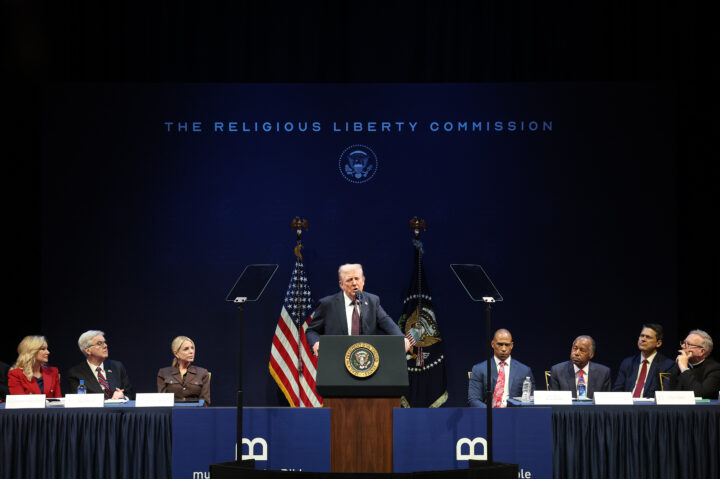
Win McNamee/Getty Images
President Donald Trump speaks at the Museum of the Bible September 8, 2025 in Washington, DC.
Good Monday afternoon!
This P.M. edition is reserved for our premium subscribers — offering a forward-focused read on what we’re tracking now and what’s coming next.
It’s me again — Danielle Cohen-Kanik, U.S. editor at Jewish Insider and curator, along with assists from my colleagues, of the Daily Overtime. Please don’t hesitate to share your thoughts and feedback by replying to this email.
📡On Our Radar
Notable developments and interesting tidbits we’re tracking
The Trump administration’s Religious Liberty Commission’s first hearing on antisemitism, which took place in Washington this morning, turned contentious as one commissioner declared herself an anti-Zionist and defended Candace Owens, Jewish Insider’s Gabby Deutch reports.
Amid testimony from Jewish witnesses about their experiences with antisemitism, Carrie Prejean Boller, a Catholic conservative activist and former Miss California, said about Owens, “I listen to her daily. I haven’t heard one thing out of her mouth that I would say is antisemitic.”
“Catholics do not embrace Zionism, just so you know. So are all Catholics antisemites?” Prejean Boller later asked the panel, earning some boos from the audience, a mix of Jewish professionals, Christian activists and members of the Washington Jewish community. “I want to be clear on what the definition of antisemitism is. If I don’t support the political State of Israel, am I an antisemite, yes or no?”…
The Network Contagion Research Institute accused the Democratic Socialists of America, in a report released in late January, of activities that may run afoul of the Foreign Agents Registration Act — alleging that the far-left group may be acting as an unregistered agent of various U.S. adversaries, JI’s Marc Rod reports.
The report points to foreign trips by DSA members to Venezuela, Cuba and China which have included access to top-level officials and, the report alleges, lodging, transportation and other services provided by the host governments “that may constitute in-kind benefits from foreign government-linked entities” and “participation in quasi-official functions.”
The report claims that the DSA’s foreign engagements are followed by brief upticks in the group’s promotion of U.S. adversaries’ priority issues, such as removing sanctions on Cuba and Venezuela, “consistent with campaign-style political activity rather than incidental commentary”…
Anti-Defamation League CEO Jonathan Greenblatt defended his organization’s approach to combating antisemitism in eJewishPhilanthropy today, after New York Times columnist Bret Stephens called for the ADL to be dismantled and for the organized Jewish community to reallocate its resources to focus on building Jewish identity rather than combating antisemitism.
“Stephens’ framing risks replacing one error with another,” Greenblatt wrote. “The choice is not ‘fight antisemitism’ or ‘build Jewish life.’ Security and identity aren’t competing priorities; they’re inseparable preconditions for Jewish flourishing in an open society. Shutting down the Anti-Defamation League or other Jewish organizations is not some magic formula that promises self-reliance; it’s a disastrous prescription for unilateral disarmament”…
Guy Christensen, an anti-Israel influencer who defended the Capital Jewish Museum shooting in which two Israeli Embassy employees were killed, spoke at the Al Jazeera Forum wrapping up in Doha, Qatar, today. As a last-minute addition to the event, which has already seen Hamas leader Khaled Mashaal defend the Oct. 7 attacks, Christensen spoke on a panel about content creation and influence.
The forum’s website touts Christensen, who was expelled from The Ohio State University over his defense of the alleged Capital Jewish Museum shooter, as “a political activist, commentator, and content creator who dedicates his efforts to advancing social justice and educating the masses. Over the past two years, he has proven himself to be one of the most prominent Gen Z voices supporting Palestinian liberation”…
Rep. Jerry Nadler (D-NY) endorsed state Assemblyman Micah Lasher today as his successor in New York’s 12th Congressional District, an expected move to boost his protege for the hotly contested seat. The endorsement comes shortly after reports emerged that one of Lasher’s opponents, Kennedy scion Jack Schlossberg, is set to receive his own prized endorsement from Rep. Nancy Pelosi (D-CA), who is also retiring after this term.
About Schlossberg, Nadler told The New York Times, “He’s a nice guy, and he comes from a nice family, but what’s his experience for this job? No, I don’t think people ought to support him. I don’t think they will support him”…
Adm. Brad Cooper, commander of CENTCOM, congratulated the Lebanese Armed Forces today for “recently finding a massive underground Hizbollah tunnel for the second time in the past two months.” He commended a “job well done by the LAF and U.S.-led Mechanism team that is helping enforce commitments made by Israel and Lebanon.”
The appreciative comments come as experts, lawmakers and Israeli officials have cast doubt on efforts by the Lebanese government to disarm Hezbollah, as required in the Israel-Lebanon November 2024 ceasefire agreement.
At the same time, Lebanese Prime Minister Nawaf Salam visited southern Lebanon today for the first time since the LAF said it had disarmed Hezbollah south of the Litani River, where he claimed that continuous Israeli “attacks” — strikes which Israel says it is carrying out due to Hezbollah’s rearmament and continued terror efforts in the area — are a “blow to our dignity”…
Indonesia is preparing to send a delegation of several thousand troops into Gaza, Israeli media reports. The timing, size and mandate of the deployment remains unknown, though the Indonesian defense minister said in November that the country had trained 20,000 troops to conduct health and construction-related efforts for the U.S.-led International Stabilization Force. The troops are expected to be stationed between the cities of Rafah and Khan Yunis in the southern Gaza Strip…
Arab states and the EU condemned the Israeli Security Cabinet’s approval of a series of measures that will allow Israeli authorities to exert more control in the West Bank, with the foreign ministers of Jordan, the UAE, Pakistan, Turkey, Saudi Arabia, Qatar and Egypt rejecting the “expansionist Israeli policies and illegal measures” in a joint statement.
EU spokesperson Anouar El Anouni called it “another step in the wrong direction, while the whole international community is making an effort to implement Phase 2 of the comprehensive plan for Gaza.” President Donald Trump, whom Israeli Prime Minister Benjamin Netanyahu is meeting with this week, has also voiced his opposition to annexation efforts, saying in October that “Israel would lose all of its support from the United States if that happened”…
⏩ Tomorrow’s Agenda, Today
An early look at tomorrow’s storylines and schedule to keep you a step ahead
Keep an eye out in Jewish Insider for an interview with former hostages Keith and Aviva Siegel, as they pivot from hostage advocacy efforts to engaging in humanitarian work abroad.
On the Hill, the House Ways and Means Committee will hold a hearing on foreign influence in American nonprofits, including testimony from Adam Sohn, the co-founder of the Network Contagion Research Institute, which authored the recent study on the Democratic Socialists of America.
The House Foreign Affairs Committee will hold a hearing on Syria and U.S. policy challenges in a post-Assad world. Witnesses will include James Jeffrey and Andrew Tabler of the Washington Institute for Near East Policy and Nadine Maenza, the former chair of the U.S. Commission on International Religious Freedom.
The Jewish Community Relations Council of Greater Washington will host its Virginia Jewish Advocacy Day, featuring remarks from newly sworn in Gov. Abigail Spanberger.
Stories You May Have Missed
MEJIA’S MOMENTUM
Will Democrats rally behind progressive socialist Mejia as she vies to represent wealthy N.J. district?

Already several members of the state’s congressional delegation have begun to coalesce around Mejia’s campaign
STICKING BY THE STICKY NOTE
Amid criticism, Kraft’s anti-hate group defends Super Bowl ad against antisemitism

The head of the Blue Square Alliance Against Hate emphasized the ad was intended to persuade all Americans — not just Jews — and survey research proved its effectiveness
Plus, Massie challenger gets strong GOP backing

Julie Menin, speaker of the New York City Council and Zohran Mamdani, mayor of New York, arrive for an announcement in the Brooklyn borough of New York, US, on Monday, Jan. 12, 2026 (Photographer: John Lamparski/Bloomberg via Getty Images)
Good Thursday afternoon!
This P.M. edition is reserved for our premium subscribers — offering a forward-focused read on what we’re tracking now and what’s coming next.
It’s me again — Danielle Cohen-Kanik, U.S. editor at Jewish Insider and curator, along with assists from my colleagues, of the Daily Overtime. Please don’t hesitate to share your thoughts and feedback by replying to this email.
📡On Our Radar
Notable developments and interesting tidbits we’re tracking
Sen. Bill Cassidy (R-LA), the chairman of the Senate Health, Education, Labor and Pensions Committee, wrote to New York Mayor Zohran Mamdani today voicing “serious concerns” about Mamdani’s “rescission of executive orders related to antisemitism and boycotts of Israel.”
Cassidy said the New York City Department of Education’s $2.2 billion in federal funding could be rescinded “contingent on compliance with federal civil rights laws and applicable executive orders designed to protect students”…
New York City councilmembers on both sides of the aisle denounced a new working group established by employees of the city’s Department of Health on “global oppression,” Jewish Insider’s Will Bredderman reports, which a presenter at its first meeting on Tuesday acknowledged was “really developed in response to the ongoing genocide in Palestine.”
City Council Speaker Julie Menin called for a probe into the working group at DOH, which operates under Mamdani’s administration, telling the New York Post, “Our health care officials should be fighting infectious diseases and addressing skyrocketing health care costs instead of spending public time debating geopolitics”…
Moshe Davis, the former executive director of the Mayor’s Office to Combat Antisemitism in New York City, told The Free Press upon being ousted from the role by Mamdani, “I don’t think the priority of the administration has been to combat antisemitism.”
Davis, who was a political appointee of former Mayor Eric Adams, said a Mamdani staffer told him they were “looking to go in a different direction” in replacing him with Phylisa Wisdom, a progressive Jewish activist. “Look, I’m a loud, proud Jewish person with a kippah on my head, a proud Zionist. This administration maybe felt that was too much for them,” Davis said. He noted that his requests to meet with the mayor and the memos he produced on rising antisemitism in the city had gone ignored…
Mamdani officially endorsed New York Gov. Kathy Hochul in an anticipated move, boosting her reelection prospects while also dealing a blow to her lieutenant governor, Antonio Delgado, who is running to oust Hochul from her left…
Rep. Andy Barr (R-KY) and businessman Nate Morris, two of the leading Republican candidates for Kentucky’s Senate seat, today endorsed Ed Gallrein, the GOP challenger to Rep. Thomas Massie (R-KY), one of the leading Republican critics of Israel in Congress, JI’s Marc Rod reports.
“Ed will never side with AOC or the radical-left against President Trump. He is exactly the kind of conservative warrior we need in Congress, and I’m proud to endorse him,” Barr said in a statement, referencing Massie’s pattern of breaking with various elements of Trump’s agenda, which has included voting against support for Israel.
The endorsements came amid an ongoing series of attacks by Trump on Massie, which included calling Massie a “moron” in remarks at the National Prayer Breakfast this morning, as well as attacks on Truth Social this week targeting Massie’s wife…
Daniel Flesch, a senior policy analyst at the Heritage Foundation who led the drafting of the organization’s Project Esther report on combating left-wing antisemitism, has parted ways with the conservative think tank, according to Heritage’s website.
Flesch had raised the alarm on right-wing antisemitism after Heritage President Kevin Roberts released a video defending Tucker Carlson for hosting neo-Nazi Nick Fuentes on his podcast, telling the Young Jewish Conservatives in December that, “Now, in some ways, the call is coming from inside the house.” Flesch had also been Heritage’s point person for the National Task Force to Combat Antisemitism, a coalition of conservative groups that disaffiliated from the think tank after the incident…
White House Press Secretary Karoline Leavitt confirmed today that Special Envoy Steve Witkoff and Jared Kushner will be traveling to Oman for negotiations with Iran tomorrow, saying at a press conference this afternoon that the president is “standing by for an update from them.”
“The president has obviously been quite clear in his demands of the Iranian regime — zero nuclear capability is something he’s been very explicit about and he wants to see if a deal can be struck. And while these negotiations are taking place, I would remind the Iranian regime that the president has many options at his disposal aside from diplomacy as the commander-in-chief of the most powerful military in the history of the world,” Leavitt added…
Israeli Prime Minister Benjamin Netanyahu told lawmakers at a closed-door meeting of the Knesset Foreign Affairs and Defense Committee that U.S.-Israel coordination is “as high and as close as possible” ahead of the nuclear talks tomorrow, Israeli media reports, but that he still doesn’t know if President Donald Trump will choose to take military action…
Middle East countries that were originally meant to participate in the talks, including Saudi Arabia, Qatar, Egypt, Oman, the UAE and Pakistan, drafted a potential agreement for the U.S. and Iran, including a nonaggression pact, diplomats told The Times of Israel…
Iran’s Islamic Revolutionary Guard Corps seized two foreign oil tankers in the Persian Gulf today, Iranian state media reported, days after attempting to stop and board a U.S.-flagged oil tanker. Reports did not provide the country of origin of the tankers seized today…
Sen. Lindsey Graham (R-SC) expressed frustration with the Lebanese government’s stance toward Hezbollah amid struggling disarmament efforts, describing on X a meeting he’d had with Gen. Rodolphe Haykal, the commander of the Lebanese Armed Forces. “I asked him point blank if he believes Hezbollah is a terrorist organization. He said, ‘No, not in the context of Lebanon.’ With that, I ended the meeting.”
“They have been designated as a foreign terrorist organization by both Republican and Democrat administrations since 1997 — for good reason. As long as this attitude exists from the Lebanese Armed Forces, I don’t think we have a reliable partner in them,” Graham continued. The U.S. has provided over $3 billion to shore up the LAF in the last 20 years, including $230 million approved by the Trump administration as recently as October…
⏩ Tomorrow’s Agenda, Today
An early look at tomorrow’s storylines and schedule to keep you a step ahead
Keep an eye out in Jewish Insider for whether AIPAC’s active role in the New Jersey 11th Congressional District Democratic primary — opposing former Rep. Tom Malinowski (D-NJ) — paid off. Polls in the district close at 8 p.m.
We’ll be watching for readouts from the meeting between White House Special Envoy Steve Witkoff, advisor Jared Kushner and Iranian Foreign Minister Abbas Araghchi in Oman at 10 a.m. local time tomorrow, including whether issues beyond Tehran’s nuclear program are discussed.
We’ll be back in your inbox with the Daily Overtime on Monday. Shabbat Shalom!
Stories You May Have Missed
AI AMBITION
Alphabet’s AI bet shows early returns under Israeli-American CFO Anat Ashkenazi
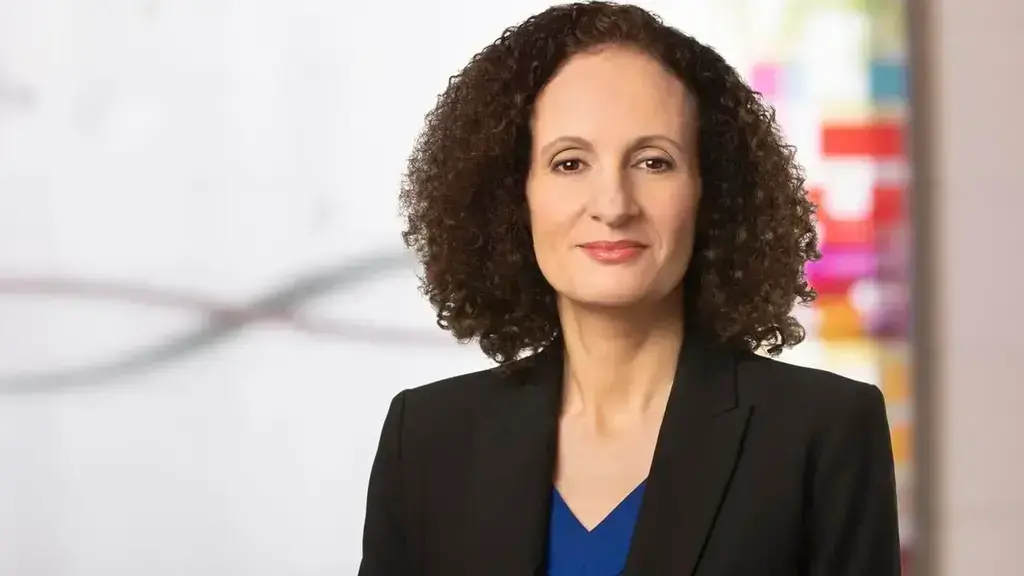
The Israeli-American CFO first fueled Eli Lilly’s success, and is now turning her attention to the tech sector
SURVEY SAYS
Israelis split on whether to join a U.S. strike on Iran – poll

Right-wing Israelis support a strike even if Iran does not attack, while other political camps prefer to wait and see if Iran strikes Israel first, IDI poll finds
Plus, Israel continues to cast doubt over Iran talks
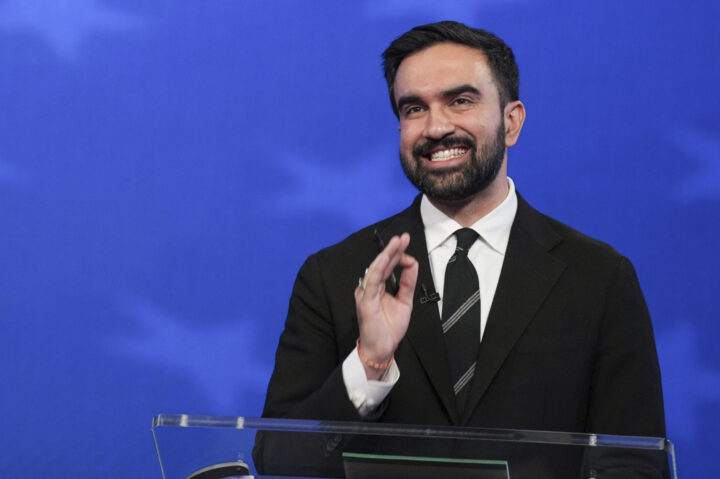
Angelina Katsanis-Pool/Getty Images
Democratic mayoral nominee Zohran Mamdani speaks during a mayoral debate at Rockefeller Center on October 16, 2025 in New York City.
Good Wednesday afternoon!
This P.M. edition is reserved for our premium subscribers — offering a forward-focused read on what we’re tracking now and what’s coming next.
It’s me again — Danielle Cohen-Kanik, U.S. editor at Jewish Insider and curator, along with assists from my colleagues, of the Daily Overtime. Please don’t hesitate to share your thoughts and feedback by replying to this email.
📡On Our Radar
Notable developments and interesting tidbits we’re tracking
U.S. officials reportedly backtracked on their rejection of Iranian demands to change the format and venue of nuclear negotiations, set for Friday, after several Middle East leaders intervened to keep the U.S. from walking away, according to Axios. “They asked us to keep the meeting and listen to what the Iranians have to say. We have told the Arabs that we will do the meeting if they insist. But we are very skeptical,” one U.S. official told the outlet.
Iranian Foreign Minister Abbas Araghchi confirmed on X that “nuclear talks … are scheduled to be held in Muscat” at 10 a.m. on Friday, indicating the U.S. agreed to move the venue from Turkey to Oman…
But Secretary of State Marco Rubio reiterated today that the Trump administration is seeking a comprehensive deal with Iran to address more than just its pursuit of nuclear weapons — including its ballistic missiles program, support for terror proxies and internal repression as well. Iran has traditionally been resistant to discussing anything beyond its nuclear program.
Asked if Iranian Supreme Leader Ayatollah Ali Khamenei should be worried right now, President Donald Trump told NBC News today, “I would say he should be very worried, yeah, he should be.” Trump said he was interested in negotiations again as he understood Iranian officials were considering restarting their nuclear program, “and if they do, we’re going to send” B-2 bombers “right back to do their job again,” referencing the U.S.’ June strikes…
Israeli officials have voiced skepticism over the prudence of negotiating with Iran at all, Jewish Insider’s Lahav Harkov reports. After Israeli Prime Minister Benjamin Netanyahu told White House Special Envoy Steve Witkoff yesterday that Iran’s “promises cannot be trusted,” Energy Minister Eli Cohen told Israeli radio, “Our message to the U.S. is that negotiations with Iran are a waste of time”…
Sam Brownback, the former U.S. ambassador at large for international religious freedom and a former GOP senator from Kansas, warned at a House Foreign Affairs Committee hearing today that, unless Syrian minority groups are allowed to maintain their own security forces, they face a likely genocide by government-aligned forces, JI’s Marc Rod reports.
“The new administration in Syria is purging religious minorities, threatening and killing them,” Brownback said. “These groups must be allowed to maintain their own security forces, or I guarantee you today, a genocide will happen in Syria like happened in Iraq to the Yazidis and Christians.”
The Trump administration has remained largely supportive of the al-Sharaa government, and critics have accused the White House of essentially abandoning the U.S.’ longtime Kurdish allies to the Syrian government onslaught…
First Lady Melania Trump welcomed freed Israeli hostages Aviva and Keith Siegel to the White House today, JI’s Gabby Deutch reports, one year after Aviva met the first lady for the first time and pleaded for help in securing her husband’s release.
“Aviva is a warrior. She’s a warrior. She was fighting very hard for Keith, and I know he suffered a lot,” Trump said at the meeting. “I’m happy to see you healthy at home with your children, with your grandchildren, with your family, and I know you’re giving back your time, your energy, to other people”…
New York City Mayor Zohran Mamdani tapped Phylisa Wisdom, the executive director of the progressive group New York Jewish Agenda, to lead the Mayor’s Office to Combat Antisemitism, the Forward reports.
Wisdom told JI last month that tackling the “scourge of antisemitism” in the city will require a comprehensive strategy,” noting that the office she will now lead “can play a key role, coordinating between long-standing offices and agencies tasked with combating hate, and input from the diversity of New York’s Jewish community.”
The appointment of the left-wing activist indicates Mamdani’s administration isn’t looking to placate the mainstream Jewish community. Wisdom, while well-known in the New York Jewish community, has traditionally opposed the International Holocaust Remembrance Alliance’s working definition of antisemitism and at times vocally opposed Israel’s war in Gaza after the Oct. 7 attacks…
Meanwhile, New York Gov. Kathy Hochul selected former New York City Council Speaker Adrienne Adams as her running mate in her reelection race this year — a pick that provoked both applause and consternation among leaders of the state’s Jewish community, JI’s Will Bredderman reports.
Adams was the first council speaker not to lead a delegation to Israel — although she denied that she was boycotting the country, she raised concerns in 2024 when her office drafted an ultimately abandoned resolution urging a ceasefire between Israel and Hamas that one Jewish community leader described to JI as “one-sided” and “inflammatory”…
A pair of well-financed groups, whose origin is currently unknown, is set to begin running ads boosting moderate pro-Israel candidates in a series of open House seats in Chicago, each of whom is facing off against vocal anti-Israel opponents, JI’s Marc Rod reports.
The ads — being run by newly formed super PACs Elect Chicago Women and Affordable Chicago Now — boost state Sen. Laura Fine, running in the 9th Congressional District, former Rep. Melissa Bean (D-IL), running in the 8th District and Cook County Commissioner Donna Miller, running in the 2nd District.
The ad buys for the two groups add up to millions of dollars across the three races. Given that the groups were just launched, FEC filing policies will not require them to disclose their donors until close to Election Day. But the ads, which do not focus on Israel policy, are widely rumored to be connected to United Democracy Project, the AIPAC-affiliated super PAC…
PEN America, an organization promoting free expression for artists and journalists, said today it would retract its Jan. 29 statement expressing concern about the abrupt cancellation of Israeli comedian Guy Hochman’s shows in New York and Los Angeles. The organization, which alleged Hochman “has been accused by advocacy organizations of incitement to genocide in Gaza,” said it would “remain committed to open and respectful dialogue about the divisions that arise in the course of defending free expression”…
The Washington Post announced mass layoffs of one-third of its staff today, including closing its sports section, reducing its local coverage and letting go all of its Middle East correspondents. The outlet has faced repeated criticism for major factual errors and alleged institutional and reporter bias related to its coverage of Israel and the war in Gaza…
⏩ Tomorrow’s Agenda, Today
An early look at tomorrow’s storylines and schedule to keep you a step ahead
Keep an eye out in Jewish Insider for a profile of Alphabet’s Israeli-American chief financial officer, Anat Ashkenazi, who got her start at Israel’s Bank Hapoalim more than two decades ago.
It’s primary day in New Jersey’s 11th Congressional District, as candidates vie for the Democratic nomination to fill Gov. Mikie Sherrill’s House seat. The race has attracted attention for the more than $2 million the AIPAC-linked super PAC United Democracy Project has spent targeting former Rep. Tom Malinowski (D-NJ), who is attempting to beat out others including Lt. Gov. Tahesha Way, far-left activist Analilia Mejia and Essex County Commissioner Brendan Gill.
The Hudson Institute will host Rabbi Yehuda Kaploun, the special envoy to monitor and combat antisemitism, for a conversation on the Trump administration’s strategy in confronting the rise of antisemitism.
Stories You May Have Missed
UNDER SCRUTINY
Jewish leaders raise alarm over Fairfax County GOP chair candidate’s antisemitism

‘Just because someone is a hateful antisemitic looney-tune doesn’t mean they can’t win office,’ one Jewish community activist said of Shelly Arnoldi
SCHOOL OF THOUGHT
New Seattle school superintendent claims tikkun olam as central leadership value

Ben Shuldiner, who is Jewish, is bringing his progressive politics to a school district facing a spike in antisemitism
Plus, Congress questions Hezbollah disarmament delays

TUR Presidency/Mustafa Kamaci/Handout /Anadolu via Getty Images
Turkish President Recep Tayyip Erdogan arrives in the Saudi capital Riyadh at King Khalid International Airport, on February 03, 2026.
👋 Good Wednesday morning!
In today’s Daily Kickoff, we report on yesterday’s meeting in Riyadh between Saudi Crown Prince Mohammed bin Salman and Turkish President Recep Tayyip Erdoğan, as Saudi Arabia and Turkey clash with Israel on a range of geopolitical issues, and cover a House Foreign Affairs Committee subcommittee hearing in which experts raised concerns about Lebanon’s slow-walking of its disarmament of Hezbollah. We report on concerns by Jewish leaders in Virginia over antisemitic statements espoused by a candidate for Fairfax County GOP chair, and profile Ben Shuldiner, the new head of Seattle Public Schools. Also in today’s Daily Kickoff: Isaac Mizrahi, Guy Gilboa-Dalal and Matt Nosanchuk.
Today’s Daily Kickoff was curated by JI Executive Editor Melissa Weiss and Israel Editor Tamara Zieve, with assists from Danielle Cohen-Kanik and Marc Rod. Have a tip? Email us here.
What We’re Watching
- White House Special Envoy Steve Witkoff is in the United Arab Emirates today for meetings aimed at reaching a ceasefire in the Russia-Ukraine war. Witkoff traveled to the UAE from Israel, where he met with Prime Minister Benjamin Netanyahu yesterday afternoon.
- The meeting between Witkoff and Netanyahu came amid increasing tensions between the U.S. and Iran, and took place hours before a U.S. aircraft carrier shot down an approaching Iranian drone. On Tuesday evening, reports emerged that Tehran was pushing to move a meeting between Witkoff and Iranian Foreign Minister Abbas Araghchi from Turkey to Oman.
- In Washington, First Lady Melania Trump is hosting former hostages Keith and Aviva Siegel at the White House this afternoon for a private sit-down.
- Israeli Foreign Minister Gideon Sa’ar is in Washington for a critical minerals conference hosted by Secretary of State Marco Rubio. Last night, Sa’ar convened a group of Latin American and U.S. diplomats, including the ambassadors of Argentina, Paraguay and Ecuador as well as Deputy Secretary of State Christopher Landau, White House Faith Advisor Paula White and Reps. Maria Elvira Salazar (R-FL) and Mario Díaz-Balart (R-FL).
- The House Foreign Affairs Committee is holding a hearing on religious freedom around the world. Sam Brownback, who served as ambassador at large for international religious freedom, is among those set to testify.
- The Muslim World League is holding an event on Capitol Hill with former Saudi Justice Minister Sheikh Mohammed Al-Issa and Rabbi Yehuda Kaploun, the State Department’s special envoy to monitor and combat antisemitism.
- The Manhattan Institute is awarding Ben Shapiro with the annual City Journal Award at a reception tonight in Palm Beach, Fla.
- The World Governments Summit continues today in Abu Dhabi, United Arab Emirates. Earlier today, Tucker Carlson interviewed newly appointed Venezuelan Vice President Calixto Ortega Sánchez on the main stage. Former Secretary of State Mike Pompeo, who took the stage yesterday, told attendees that a new deal between the U.S. and Iran was “unimaginable” while Iranian Supreme Leader Ayatollah Ali Khamenei remains in power.
- Web Summit Qatar wraps up today in Doha, Qatar. During one of yesterday’s mainstage sessions, far-left streamer Hasan Piker alleged that Israel “played a significant role in how Oct. 7 took place.” Read more from JI’s Matthew Shea here.
What You Should Know
A QUICK WORD WITH JI’S JOSH KRAUSHAAR
Tomorrow’s New Jersey special Democratic primary election to fill Gov. Mikie Sherrill’s vacant House seat will offer an early test of AIPAC’s ability to continue showcasing its political clout. The pro-Israel group’s super PAC, in a potentially risky move, has spent over $2 million in ads attacking former Rep. Tom Malinowski (D-NJ), who has come out in favor of conditioning some aid to Israel, in hopes of electing a more reliable ally in former Lt. Gov. Tahesha Way.
The group’s ad hits Malinowski not for his views on Israel, but for a bipartisan vote in 2019 funding the Immigration and Customs Enforcement (ICE) and over stock trades he made as a congressman. The ICE attacks, in particular, are expected to resonate in the affluent, center-left district. Because of his name recognition representing a neighboring district before losing reelection in 2022, Malinowski started out as the early front-runner but is taking a serious hit on the airwaves.
But complicating that strategy is the presence of a far-left, anti-Israel candidate in Analilia Mejia, who leads a progressive advocacy group and has been endorsed by Sen. Bernie Sanders (I-VT) and Rep. Alexandria Ocasio-Cortez (D-NY). Mejia has been polling in second place, according to some reports, and has a path to winning the nomination — and the seat, given the 11th Congressional District’s Democratic lean.
The race also features Essex County Commissioner Brendan Gill, an establishment-oriented politician — endorsed by former Gov. Phil Murphy — who has expressed consistently pro-Israel views on the campaign trail and in an interview with Jewish Insider.
Even as the political environment within the Democratic Party has shifted to the left, AIPAC isn’t backing down from its aggressive, on-offense playbook from 2024, when a number of mainstream pro-Israel Democrats backed by the group won their elections to Congress — while two of AIPAC’s most extreme opponents, former Reps. Cori Bush (D-MO) and Jamaal Bowman (D-NY), fell short in their reelection bids.
Given the changed intraparty mood, there was a question about whether pro-Israel groups would need to play a little more defense this election cycle, or at least refocus attention on stopping the most radical candidates with a chance of winning instead of going all-out for the most principled allies.
That’s looking — at least for now — not to be the case.
DEEPENING TIES
Riyadh and Ankara jointly condemn Jerusalem’s recognition of Somaliland, call for Israeli withdrawal from Syria

Saudi Arabia and Turkey issued a joint declaration on Tuesday pledging to expand cooperation across a wide range of defense, economic and regional security issues, signaling deepening strategic ties between the two countries and cementing a markedly improved relationship between former foes, Jewish Insider’s Matthew Shea reports.
Areas of agreement: As part of the joint statement, the two countries outlined their alignment on several regional issues, including rejecting Israel’s recognition of Somaliland and calling for an immediate Israeli withdrawal from Syria, as well as a two-state solution. The two leaders also agreed to push the U.S. toward de-escalation with Iran. The parties also agreed to “strengthen their cooperation” in areas including oil and gas and renewable energies, “building on Saudi Arabia’s massive energy investments,” the statement read.
ON THE HILL
Foreign Affairs subcommittee hearing highlights Hezbollah disarmament challenges and opportunities for peace with Lebanon
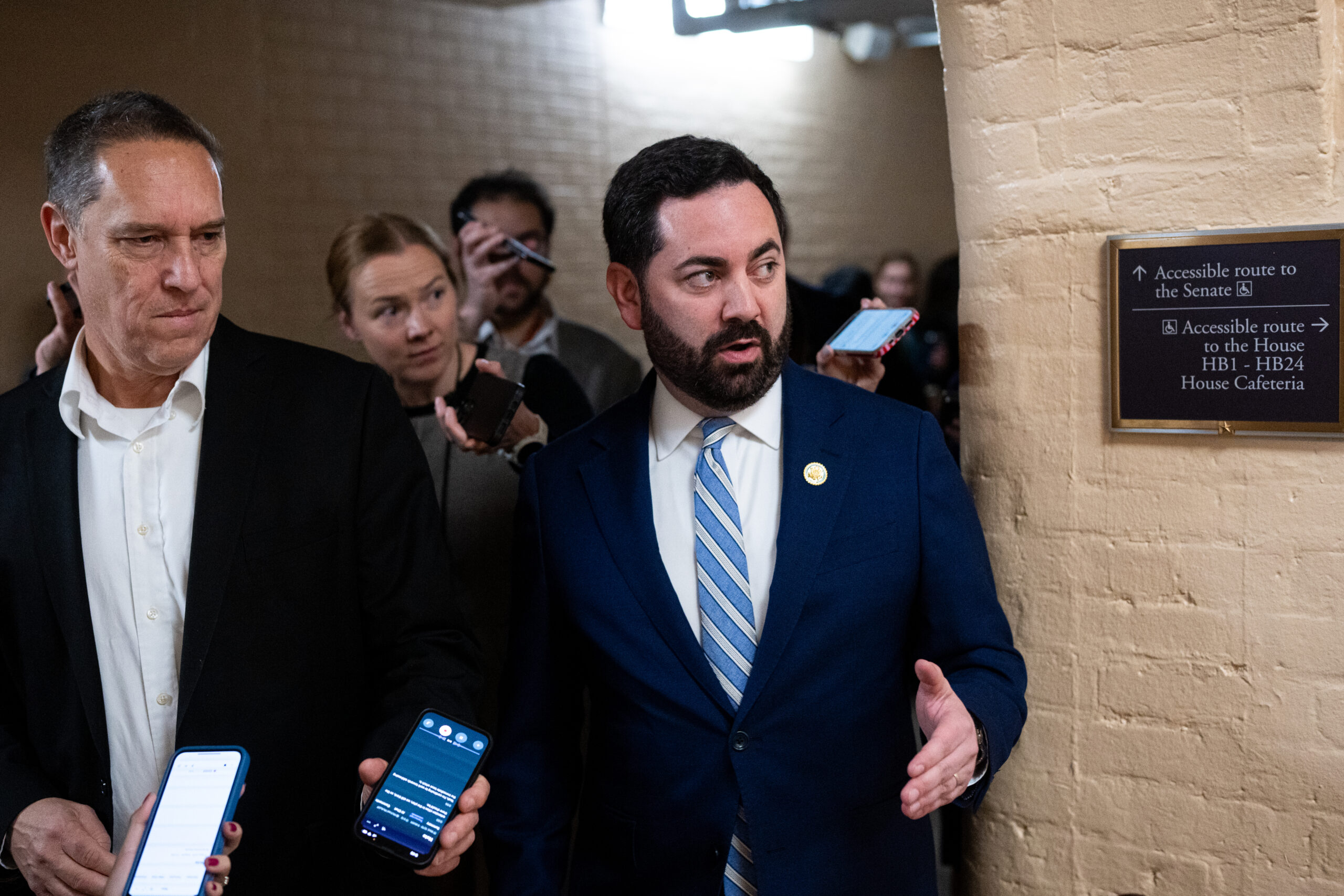
Lawmakers and expert witnesses at a House Foreign Affairs Committee subcommittee hearing on Tuesday highlighted the ongoing challenges and delays in the disarming of Hezbollah in southern Lebanon, but also argued that there is tremendous opportunity in the country if Hezbollah’s influence can be defeated — including potential moves in the near term toward normalization with Israel, Jewish Insider’s Marc Rod reports.
Notable quotable: “We have the chance to help this government break free of the shackles of Iran’s malign influence. Hezbollah’s influence is vastly diminished thanks in large part to decisive Israeli action. But difficult choices now need to be made,” Rep. Mike Lawler (R-NY), the Middle East subcommittee chair, said in his opening statement, noting the “haphazard at best” efforts to disarm Hezbollah. Rep. Brad Sherman (D-CA), the ranking member, said that there is a “historic opportunity” in Lebanon but “[t]hat window of opportunity, however, is narrow. Hezbollah is working hard to rebuild, rearm and to reconstitute itself as a major terrorist organization. He criticized the Trump administration and Special Envoy Tom Barrack in particular as hampering U.S. interests.
Syria spotlight: Lawmakers and expert witnesses pushed back at a Helsinki Commission hearing on Tuesday on efforts to reimpose sanctions on the Syrian government for its assault against the Kurds and other minorities, and pushed for the U.S. to facilitate a diplomatic arrangement between Israel and Turkey that would allow for a greater Turkish presence in Syria — in part as a counterweight to Russia, Jewish Insider’s Marc Rod reports.
UNDER SCRUTINY
Jewish leaders raise alarm over Fairfax County GOP chair candidate’s antisemitism

A new candidate for Republican county chair in Virginia’s largest jurisdiction is facing scrutiny over a range of antisemitic social media posts in which she has told Jews to “move to Israel,” spread conspiracy theories about Jewish control of U.S. politics and expressed admiration for prominent neo-Nazis and Holocaust deniers, among other extremist comments. Shelly Arnoldi, who recently launched her bid to lead the Fairfax County Republican Committee, is stoking concerns among Jewish community leaders now seeking to raise awareness about her extensive public record of promoting antisemitic tropes while demonizing Israel, Jewish Insider’s Matthew Kassel reports.
Sign of the times: While Arnoldi is not seen as a particularly viable candidate in the upcoming Feb. 28 election, local political observers say, her campaign has still given some pause to both Jewish and Republican activists who worry her radical views underscore a creeping embrace of antisemitic sentiment in the GOP fueled by leading far-right commentators including Tucker Carlson, whose interviews she has eagerly endorsed. “She does not appear to be a serious person,” one Jewish community activist told Jewish Insider on condition of anonymity to address a sensitive topic. “But just because someone is a hateful antisemitic looney-tune doesn’t mean they can’t win office. She strikes me as someone who would continue to run, and in that regard I consider her to be a real threat.”
NAZI-ERA ACCOUNTABILITY
Senators demand UBS release documents on Credit Suisse’s Nazi ties
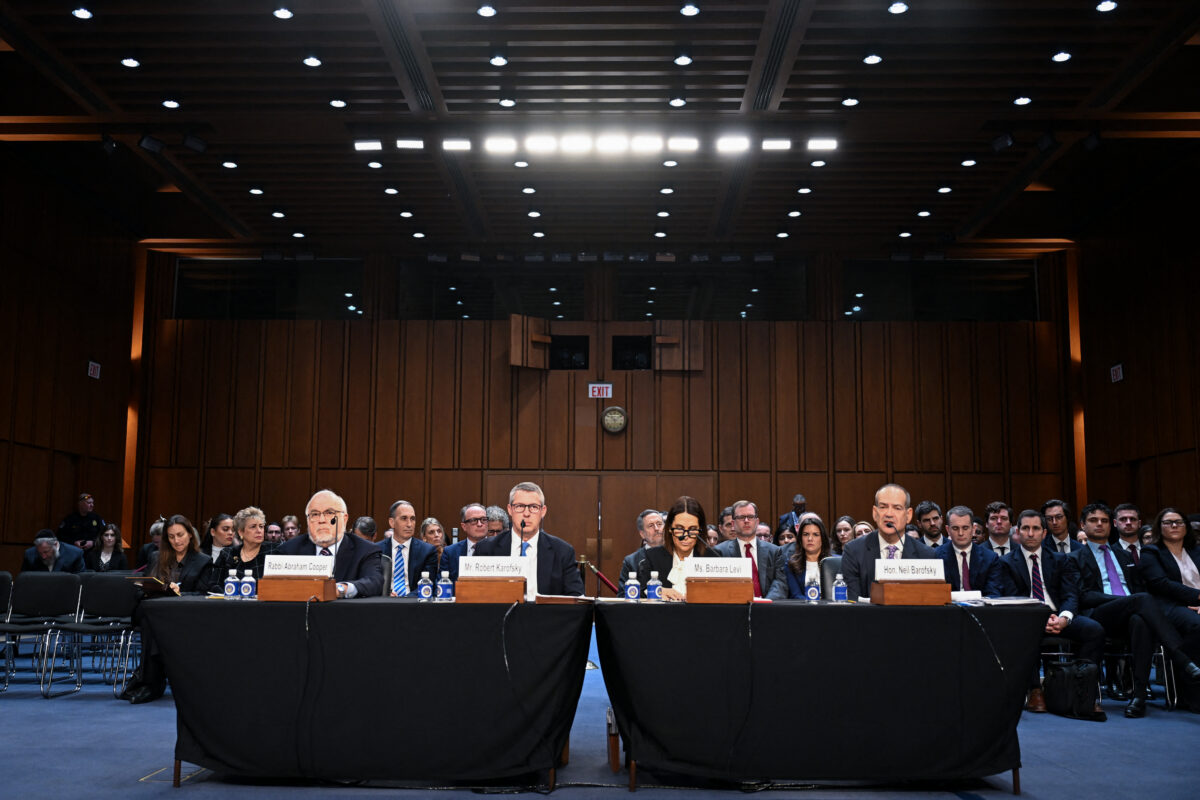
Republican and Democratic senators urged senior UBS executives in a hearing on Tuesday to reconsider the Swiss banking giant’s continued refusal to hand over more than 150 documents to an investigator probing Credit Suisse’s support for Nazi Germany during and after World War II, Jewish Insider’s Emily Jacobs reports.
The arguments: Senators pressed Robert Karofsky, president of UBS Americas, and Barbara Levi, UBS Group’s general counsel, to reverse course on the bank’s opposition to sharing with attorney Neil Barofsky and Congress the remaining files on the yearslong investigation into the ways that Credit Suisse, which UBS acquired in 2023, aided Adolf Hitler’s war efforts. Karofsky and Levi testified at the Senate Judiciary Committee hearing that UBS could not provide the documents until the New York judge that approved a $1.25 billion settlement in 1998 between multiple Swiss banks, including Credit Suisse, and Holocaust survivors issued an order affirming that the deal would cover any future claims.
BARAKA’S BACKING
In progressive pivot, N.J. congressional candidate Brian Varela

Brian Varela, a businessman running in New Jersey’s 7th Congressional District, picked up an endorsement on Monday from Newark, N.J., Mayor Ras Baraka, a sign of Varela’s increasing outreach to progressive voters, Jewish Insider’s Marc Rod reports.
Background: Baraka’s progressive candidacy in last year’s New Jersey gubernatorial race raised concerns in the Jewish community, in part because Baraka, in the early 2000s, appeared alongside Nation of Islam leader Louis Farrakhan, who has a long record of antisemitism, and applauded violent rhetoric by the controversial preacher. Baraka also faced scrutiny over his record on Israel and antisemitism. A Varela spokesperson said the candidate is proud to have Baraka’s endorsement but “wants to be unequivocal” in condemning Farrakhan and his violent rhetoric and antisemitism.
school of thought
New Seattle school superintendent claims tikkun olam as central leadership value

As Ben Shuldiner begins his tenure as superintendent of Seattle Public Schools, he’s got his hands full: The district is dealing with, among other things, a sharp decline in enrollment, a roughly $100 million budget deficit and serious gun violence issues, including the deaths of two students who were killed in a shooting outside a district high school on Friday. Adding to his plate, SPS has also made headlines in recent years with a series of high-profile antisemitic incidents, and Shuldiner, who is Jewish, knows he will likely be called to account for them, Jewish Insider’s Danielle Cohen-Kanik reports.
Shuldiner’s message: “What I’d say to Jewish readers, or anyone who wants to be an ally: If you see something bad, tell us. And we must act. If something is brought to me and we don’t deal with it, that’s on me. You should come after me — just give me a couple days to find a place to live first,” he told The Cholent, a local Seattle blog, in November. Shuldiner, 48, who took the helm at SPS on Feb. 1, comes from a family of New York educators. “Perhaps the most visceral and powerful concept in our faith is tikkun olam, repairing the world,” he wrote in an essay for The School Superintendents Association in November.
Worthy Reads
Talking to Tehran: In Newsweek, former White House Middle East Envoy Jason Greenblatt urges U.S. negotiators to address Iran’s treatment of its citizens when the parties meet later this week for talks aimed at calming tensions between Washington and Tehran. “The Iranian people are too often treated as a secondary concern, eclipsed by geopolitical calculations and security debates. That framing misses something fundamental. The regime’s threat to the outside world begins with how it governs at home. … Too often, international negotiations bracket domestic repression as an internal matter. That choice has consequences. A regime sustained by fear is not stable; it is brittle. Its violence is not incidental to its strategy. It is the strategy. Any serious approach to Iran must therefore confront the full scope of the threat the regime poses — not only to regional security and global nonproliferation, but to the Iranian people themselves. Their repression is not peripheral to the problem. It is central to it.” [Newsweek]
Pahlavi’s Path: The Free Press’ Eli Lake spotlights exiled Iranian Crown Prince Reza Pahlavi and the challenges he faces as he works to position himself as the successor to the current regime, should it collapse. “The moment has arrived for Pahlavi to decide what role he’ll play in any future beyond the regime. And there are signs that he is not well-positioned to unite the factions of Iran’s opposition and lead an orderly transition to a new form of government. Many other Iranian opposition figures told The Free Press that the crown prince’s organization has sought to marginalize them. Based on interviews with Iranian activists, along with journalists and friends and advisers to Pahlavi, it’s clear that the crown prince has alienated many of the Iranians who are challenging the Islamic Republic on the ground. Friends of the crown prince have bullied rival political figures and tried to curb their influence. And Pahlavi himself has at times exaggerated the fragility of the regime that just slaughtered thousands of his countrymen.” [FreePress]
San Francisco’s Mr. Fix-it: The New York Times’ Heather Knight profiles San Francisco Mayor Daniel Lurie, who has spent the bulk of his first year in office targeting minor bureaucratic hurdles and inconveniences facing city residents. “His quality-of-life strategy, which also included trying to bring businesses back to the hollowed-out downtown and clearing sidewalks of daytime drug markets, has paid off so far, resulting in strong first-year approval ratings. At the same time, Mr. Lurie, a moderate Democrat and earnest technocrat, insists he has no interest in national politics, and he still refuses to say President Trump’s name in public. … The maze at City Hall is so complex that some savvy San Franciscans earn a living as ‘permit expediters.’ Mr. Lurie’s administration has convened focus groups to figure out how to smooth the permitting process, yielding a running ‘no nonsense list’ that includes dozens of fixes.” [NYTimes]
Word on the Street
State Department Deputy Spokesman Tommy Pigott slammed South Africa for expelling Israel’s top diplomat in the country after video surfaced last week of Israel offering water technology and medical aid to minority tribes; “Expelling a diplomat for calling out the African National Congress party’s ties to Hamas and other antisemitic radicals prioritizes grievance politics over the good of South Africa and its citizens,” Pigott wrote on X…
The Chicago Tribune endorsed state Sen. Laura Fine over Evanston, Ill., Mayor Daniel Biss and far-left activist Kat Abughazaleh in the Democratic primary in Illinois’ 9th Congressional District…
Democrat Sue Altman, who lost to Rep. Tom Kean Jr. in the 2024 congressional election in New Jersey’s 7th District before working for Sen. Andy Kim (D-NJ) as state director, is mounting a bid in the 12th District, which covers central Jersey…
New England Patriots owner Robert Kraft’s Blue Square Alliance released its upcoming Super Bowl ad aimed at tackling antisemitism, Jewish Insider’s Haley Cohen reports; the commercial will also air during the Winter Olympics and is part of a $15 million campaign that additionally includes digital advertisements and billboards…
The New York Times spotlights fashion designer and actor Isaac Mizrahi, whose three-week cabaret residence at New York’s Café Carlyle opened this week…
The descendants of French-Jewish art dealer Max Julius Braunthal, who was forced to sell a painting by Camille Pissarro under duress in 1941, are suing the Metropolitan Museum of Art for ownership of the work, which had been bequeathed to the museum more than two decades ago by its former chairman…
In an interview with The New York Times, former Israeli hostage Guy Gilboa-Dalal recounts his experiences in captivity, including the numerous sexual assaults he endured over the course of two years…
Israel’s high court ruled that Israeli Prime Minister Benjamin Netanyahu must explain why he has not fired National Security Minister Itamar Ben-Gvir despite a determination by the country’s attorney general, with whom Ben-Gvir has clashed in the past, that the far-right minister abused his powers…
The two Human Rights Watch staffers comprising the organization’s Israel bureau resigned after the NGO refused to publish a report that called Israel’s refusal to allow Palestinians the “right of return” a “crime against humanity”…
Somaliland President Abdirahman Mohamed Abdullahi said that Hargeisa expects to soon reach a trade agreement with Israel, which in December became the first country to formally recognize the East African nation; Abdullahi said the country would seek access to Israeli technology as part of the deal, while it would give Israel rights to some of the country’s mineral deposits…
NPR spotlights efforts by the Syrian government to return ownership of the country’s Jewish sites to the largely exiled community…
Matt Nosanchuk was announced as The George Washington Law School’s new Lerner family associate dean for public interest and lecturer in public service law; Nosanchuk, a co-founder of the New York Jewish Agenda, was previously deputy assistant secretary for strategic operations and outreach in the Office for Civil Rights in the Biden administration…
The National Jewish Advocacy Center announced that it has acquired the Zachor Legal Institute…
Rochel Pinson, the oldest Chabad-Lubavitch emissary, who helped expand the movement’s footprint across North Africa while living in Morocco and Tunisia, died at 102…
Pic of the Day

Cypriot Foreign Minister Constantinos Kombos (center) met earlier this week with American Jewish Committee CEO Ted Deutch (left) and Hellenic American Leadership Council Executive Director Endy Zemenides at AJC’s Washington office to discuss the opportunities and challenges presented by the India-Middle East-Europe Economic Corridor.
Birthdays
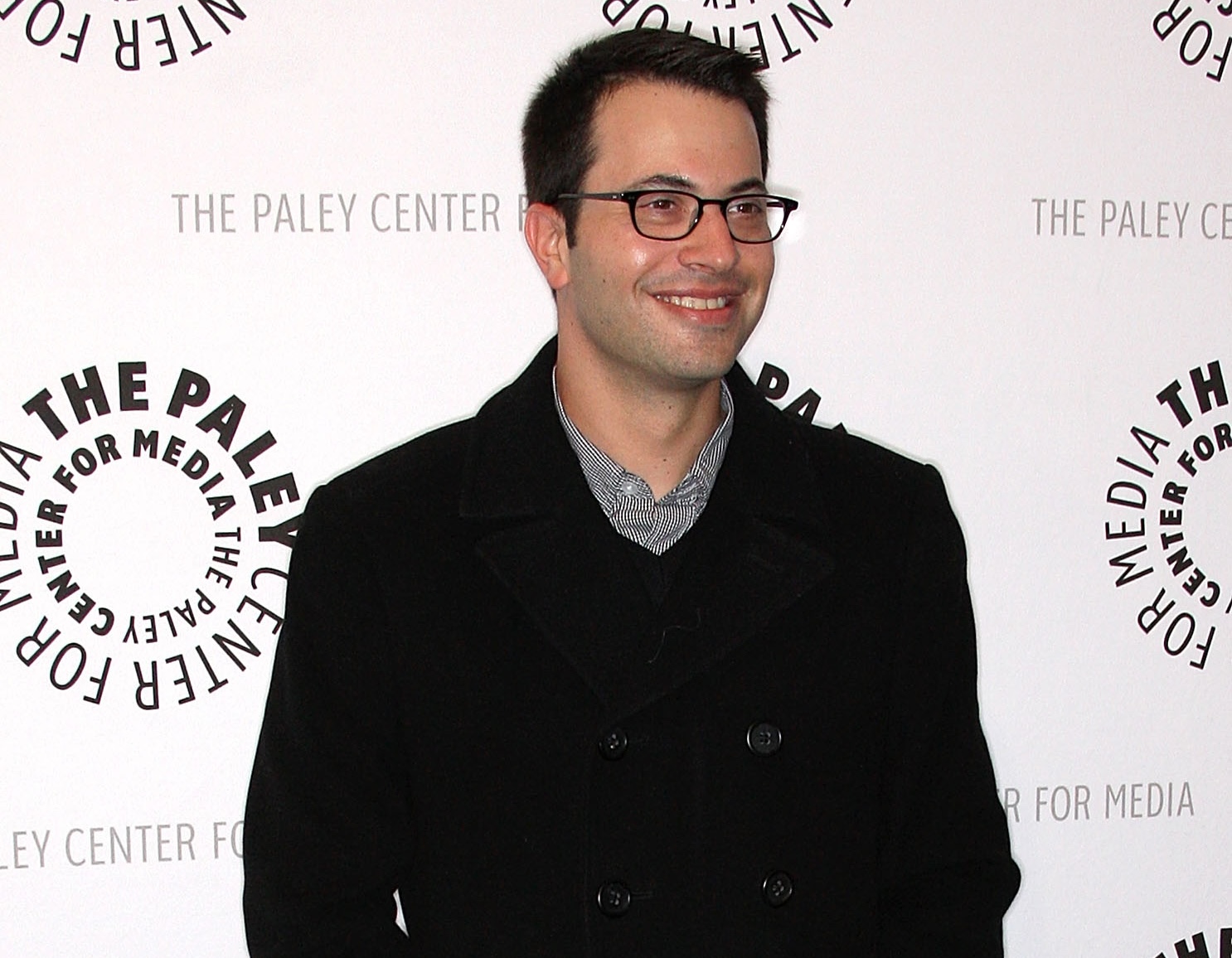
Television writer and producer, best known for his work on two ABC dramas, “Lost” and “Once Upon a Time,” Edward Lawrence “Eddy” Kitsis turns 55…
One of the founders of the Jewish Community of Greater Stowe (Vt.), Barbara Gould Stern… Co-founder and chair of Sage Publications, an academic publishing company, she was international president of B’nai B’rith Girls at 19, Sara Miller McCune turns 85… Attorney, bank executive and philanthropist, donor of the Adrienne Arsht Center for the Performing Arts of Miami-Dade County, Adrienne Arsht turns 84… Torrance, Calif., resident, Patrick B. Leek… Senior counsel at the global law firm Dentons, Evan Wolfson turns 69… Director of English-language programming at Herzog College in Alon Shvut, Israel, Shalom Berger turns 66… Actress, best known for her award-winning role in the 1986 science fiction action film “Aliens,” Jenette Elise Goldstein turns 66… Member of the state Senate of Maryland, representing portions of Montgomery County, Brian J. Feldman turns 65… Former mayor of Anchorage, Alaska, Ethan Avram Berkowitz turns 64… Former kickboxing champion, ultra-distance cycling champion and IDF soldier, Leah Goldstein turns 57… President and COO of Blackstone Group and chairman of the board of Hilton Worldwide, Jonathan D. “Jon” Gray turns 56… The first Jewish mayor of Los Angeles, he then served as the U.S. ambassador to India until 2025, Eric Garcetti turns 55… Executive director of the Baltimore Jewish Council, Howard Libit… Senior vice president and chief policy officer at J Street, he was previously director of Jewish outreach for Kamala Harris’ 2024 presidential campaign, Ilan Goldenberg… Author, psychotherapist and group fitness instructor, her book is about her genetic disease that has made her almost completely blind and deaf, Rebecca Alexander turns 47… Washington-based economic policy reporter for The New York Times since 2014, Alan Rappeport… CEO at Aeris Medical Group PLLC in Minneapolis, Noson “Nelson” Weisbord turns 43… Senior manager in the NYC office of Monitor Deloitte, he previously held a series of White House, OMB and Commerce Department positions, Justin Meservie turns 43… Client operations and legal project manager at Ropes & Gray, Abigail Dana Cable… Professor emeritus at Northeast Forestry University in Harbin, China, Dan Ben-Canaan… Jan Winnick…
‘Just because someone is a hateful antisemitic looney-tune doesn’t mean they can’t win office,’ one Jewish community activist said of Shelly Arnoldi

Shaban Athuman/Richmond Times-Dispatch via AP
Shelly Arnoldi looks over her notes during a Joint Commission on Administrative Rules meeting regarding the Youngkin's administration's proposed K-12 transgender policies on Monday, Dec. 19, 2022, at Pocahontas Building in Richmond, Va.
A new candidate for Republican county chair in Virginia’s largest jurisdiction is facing scrutiny over a range of antisemitic social media posts in which she has told Jews to “move to Israel,” spread conspiracy theories about Jewish control of U.S. politics and expressed admiration for prominent neo-Nazis and Holocaust deniers, among other extremist comments.
Shelly Arnoldi, who recently launched her bid to lead the Fairfax County Republican Committee, is stoking concerns among Jewish community leaders now seeking to raise awareness about her extensive public record of promoting antisemitic tropes while demonizing Israel.
While Arnoldi is not seen as a particularly viable candidate in the upcoming Feb. 28 election, local political observers say, her campaign has still given some pause to both Jewish and Republican activists who worry her radical views underscore a creeping embrace of antisemitic sentiment in the GOP fueled by leading far-right commentators including Tucker Carlson, whose interviews she has eagerly endorsed.
“She does not appear to be a serious person,” one Jewish community activist told Jewish Insider on condition of anonymity to address a sensitive topic. “But just because someone is a hateful antisemitic looney-tune doesn’t mean they can’t win office. She strikes me as someone who would continue to run, and in that regard I consider her to be a real threat.”
In recent months, Arnoldi has instructed Jewish social media critics to “move to Israel,” where she has said they “belong,” while promoting antisemitic materials alleging Zionist plots to subvert American governance and to weaken Christian representation. She has also suggested that Jews “appear to control the world,” said that “nobody cares about Jews” and claimed that “Israel owns us,” among multiple other derogatory and conspiratorial remarks posted to X.
Meanwhile, Arnoldi has frequently voiced her enthusiastic support for antisemitic influencers and conspiracy theorists on the far right, such as Nick Fuentes, Candace Owens and Ian Carroll, the latter of whom she has called a “brave man.”
Several posts were flagged by antisemitism watchdogs on social media this week. Arnoldi, who has accused her critics of attempting to smear her, did not return a request for comment from JI.
A new letter circulated on social media by Jewish community activists on Monday called attention to what it described as Arnoldi’s “sustained pattern of antisemitic rhetoric,” saying it is “incompatible with party leadership.”
“If elevated to chair,” the letter warned, “this record will not remain local or contained.”
Arnoldi, who in November ran an unsuccessful campaign for state delegate as an independent, is challenging the incumbent GOP chair, Katie Gorka, who declined to comment on the race when reached by JI on Tuesday.
Even if Republicans face long odds of winning elected office in Fairfax County — increasingly a Democratic stronghold — Arnoldi’s insurgent campaign still carries implications for the future direction of GOP politics in one of the largest jurisdictions in the D.C. area, some party observers cautioned.
Gary Aiken, a former Republican candidate for Fairfax supervisor, expressed alarm at Arnoldi’s campaign on Tuesday. “If these are the kinds of people running for chairman, I may have to get more involved again,” he told JI.
Still, Mike Ginsberg, a member of the Fairfax County Republican Party who also serves as its general counsel, downplayed such concerns — even as he acknowledged that Arnoldi’s messaging would likely resonate with a minority faction of committee members whom he noted are “perpetually disaffected and constantly complaining.”
“People of a certain age would analogize her to Statler and Waldorf in ‘The Muppet Show’ from the 1970s — criticizing from the peanut gallery without making any constructive contributions,” Ginsberg, who is Jewish, told JI. “Statler and Waldorf at least had the benefit of being entertaining — Shelly does not.”
“Put bluntly, Shelly Arnoldi is a crank,” he added. “Every party has them. She is ours.”
Plus, Fine lands key endorsement, polling bump in key IL-9 primary

Tajh Payne/US Navy via Getty Images
U.S. Navy's Gerald R. Ford Carrier Strike Group on Nov. 13, 2025.
Good Tuesday afternoon!
This P.M. edition is reserved for our premium subscribers — offering a forward-focused read on what we’re tracking now and what’s coming next.
It’s me again — Danielle Cohen-Kanik, U.S. editor at Jewish Insider and curator, along with assists from my colleagues, of the Daily Overtime. Please don’t hesitate to share your thoughts and feedback by replying to this email.
📡On Our Radar
Notable developments and interesting tidbits we’re tracking
Despite negotiations between the U.S. and Iran set for Friday, Tehran is still behaving belligerently — the U.S. military shot down an Iranian drone today as it was flying toward the USS Abraham Lincoln aircraft carrier in the Arabian Sea, and Iranian gunboats attempted to stop and board a U.S. oil tanker in the Strait of Hormuz.
Iranian officials are also pushing to alter the talks dramatically, including changing the venue from Turkey to Oman, disinviting the foreign ministers of several Middle Eastern countries who were set to participate and limiting discussions only to the nuclear issue and not Tehran’s other malign activities, Axios reports.
Amid these developments, White House Press Secretary Karoline Leavitt said the talks “are still scheduled as of right now, but of course the president has always a range of options on the table and that includes the use of military force. The Iranians know that better than anyone”…
President Donald Trump does have plenty of firepower at his disposal should talks with Iran not pan out — The Washington Post lays out which military assets are in the region, as the U.S. recently deployed “dozens of aircraft to bases operating near Iran and assembled about 12 warships in or near the Middle East”…
White House Special Envoy Steve Witkoff, before heading to the talks, wherever they may be held, met with Israeli Prime Minister Benjamin Netanyahu in Jerusalem today. The prime minister “clarified his position that Iran has proven time and again that its promises cannot be relied upon,” according to a readout, signaling lingering skepticism in Israel that the U.S. will extract any meaningful concessions from Tehran…
Netanyahu also made clear Israel’s expectations for postwar Gaza as the U.S. presses ahead with Phase 2 of the ceasefire deal: that Hamas disarm and the enclave be demilitarized, that Israel be allowed to fulfill its “war objectives prior to the reconstruction of the Strip” and that the Palestinian Authority “not be part of the administration of the Gaza Strip in any way.” The latter demand comes after the technocratic committee set up by the U.S. to oversee reconstruction changed its logo to replicate a PA symbol…
The House of Representatives passed a spending bill to end the partial government shutdown, which Trump signed this afternoon. While the package includes several provisions providing funding to Israel and for joint U.S.-Israel cooperative programs, it only funds the Department of Homeland Security through next week, setting up another battle as the parties spar over funding for Immigration and Customs Enforcement…
State Sen. Laura Fine secured the endorsement of the Chicago Tribune editorial board in the competitive race for Illinois’ 9th Congressional District, over her competitors Daniel Biss, the mayor of Evanston, and social media influencer Kat Abughazaleh.
While Fine’s opponents have been outspoken about their criticisms of Israel on the campaign trail, the editorial board noted Fine said she “had left the progressive caucus in Springfield after she was made to feel uncomfortable for her belief in Israel’s right to defend itself or even to exist,” which it called a “principled position for a principled Democrat.”
Fine’s fundraising figures for the final quarter of 2025 showed she pulled in a whopping $1.2 million, and a new internal poll for Fine’s campaign shows her tied with Biss in first place, holding the momentum in the crowded primary…
New Jersey’s 7th Congressional District’s Democratic primary gained another prominent candidate today: Sue Altman, the state director for Sen. Andy Kim (D-NJ) and the 2024 Democratic nominee for the neighboring 12th District, jumped into the race to succeed retiring Rep. Bonnie Watson Coleman (D-NJ).
Altman has been a member of the progressive left as the former state director for the New Jersey Working Families Party, but took pro-Israel stances during her prior congressional run. Attempting to gain traction in the 7th, though, where the progressive Watson Coleman has said her endorsement will hinge on a candidate’s stance on Israel, Altman said she is now “reevaluating” her position…
Michael Blake, the former New York state assemblyman now mounting a primary challenge to Rep. Ritchie Torres (D-NY), was endorsed today by the longtime mayor of Newark, N.J., Ras Baraka, further solidifying Blake’s departure from his pro-Israel past.
Baraka’s support for violent rhetoric by the controversial Nation of Islam leader Louis Farrakhan and his condemnation of Israel’s war in Gaza are among several positions that have alarmed Jewish leaders in the state; Baraka’s support boosts Blake as he attempts to establish himself as the candidate hostile to Israel in his race, even as he once engaged extensively with AIPAC…
The two Human Rights Watch employees who comprised the organization’s “Israel and Palestine” team both resigned after HRW leadership postponed the publication of their report calling Israel’s refusal to recognize Palestinians’ “right of return” a “crime against humanity,” Jewish Currents reports.
Among other concerns, the organization’s chief advocacy officer had voiced hesitation that the findings were overbroad and “will be misread by many, our detractors first and foremost, as a call to demographically extinguish the Jewishness of the Israeli state”…
⏩ Tomorrow’s Agenda, Today
An early look at tomorrow’s storylines and schedule to keep you a step ahead
Keep an eye out in Jewish Insider for a profile of Seattle Public Schools’ new Jewish superintendent, as the district grapples with rising antisemitism in the aftermath of the Oct. 7 attacks.
First Lady Melania Trump will host former hostages Keith and Aviva Siegel for a private discussion at the White House.
Israeli Foreign Minister Gideon Sa’ar is also in Washington today and tomorrow to attend Secretary of State Marco Rubio’s inaugural Critical Minerals Ministerial, with over 50 countries participating to “strengthen and diversify critical minerals supply chains.”
The House Foreign Affairs Committee will hold a hearing on “defending religious freedom around the world.” Among those testifying is Sam Brownback, the former ambassador-at-large for international religious freedom; the ambassador role is currently empty after former Rep. Mark Walker (R-NC), who was tapped by Trump last April for the position, failed to be confirmed (he now holds a similar advisory role at the State Department, which did not require Senate confirmation).
Also taking place on the Hill, the Muslim World League will host a gathering highlighting “faith, leadership, and global coexistence.” Among those speaking are Ambassador Yehuda Kaploun, the special envoy to monitor and combat antisemitism; Sheikh Mohammed Al-Issa, a prominent Saudi scholar and former justice minister; Imam Talib Shareef, the president of The Nation’s Mosque; and members of Congress.
In the evening, the University of Nebraska–Lincoln’s student government will vote on a Boycott, Divestment and Sanctions resolution.
Stories You May Have Missed
TEHRAN TALK
Will he or won’t he? Analysts don’t rule out Iran strike despite diplomatic flurry

U.S.-Iran negotiations scheduled are ‘likely a diplomatic box-checking exercise and smokescreen,’ FDD’s Andrea Stricker said, while JINSA’s Jonathan Ruhe said U.S. military action is ‘unlikely for the moment’
DEM DIVIDE
Mamdani, socialist allies face first electoral test in battle for NYC House seat
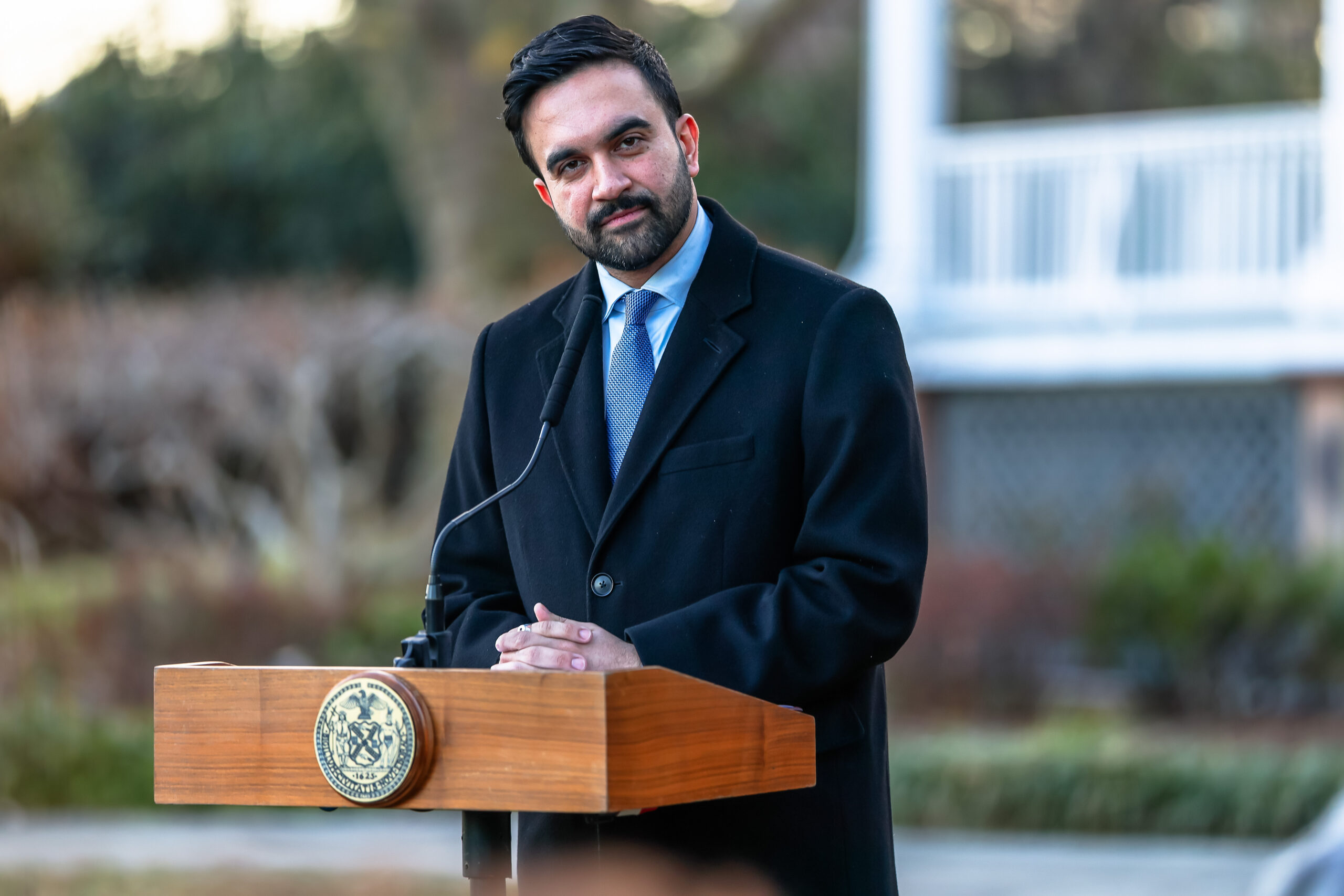
The fight to succeed Rep. Nydia Velazquez pits Mamdani and the DSA faithful against the congresswoman and her protege
Carol Obando-Derstine told JI she supports continued aid to Israel and rejected characterizations of the war in Gaza as a genocide
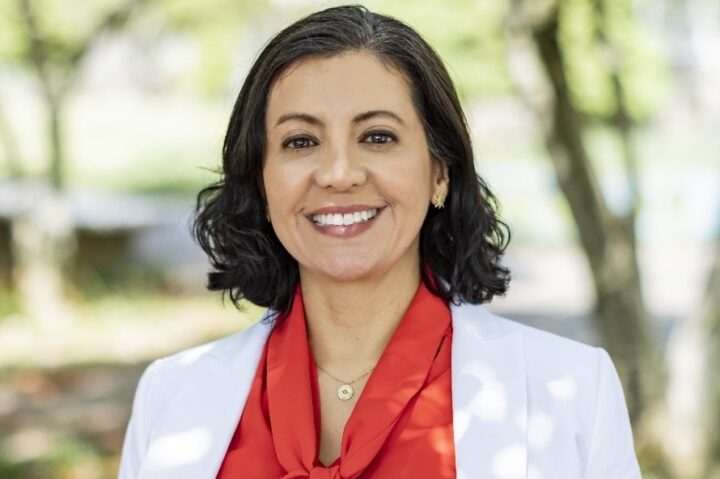
Carol Obando-Derstine/Facebook
Carol Obando-Derstine
As she competes in a crowded Democratic primary for Pennsylvania’s 7th District, Carol Obando-Derstine is hoping support from the former Democratic incumbent, her Latina immigrant background, her experience in politics and activism and her expertise in energy will help her stand out in the competitive field of Democrats vying to unseat Rep. Ryan Mackenzie (R-PA) in the upcoming midterms.
Asked by Jewish Insider about her path to victory in the Democratic primary — facing opponents with, variously, stronger fundraising numbers and backing from popular Gov. Josh Shapiro — Obando-Derstine emphasized that she was endorsed by Rep. Susan Wild (D-PA), who held the seat from 2018-2025.
She said she also understands firsthand the difficulties that voters in the district are facing, as well as the “strength of our community.” She said has a record in getting results for the district through her work with community organizations, while working for former Sen. Bob Casey (D-PA) as an advisor on Latino affairs and her background in the energy industry.
Though she didn’t speak at length about the Israeli-Palestinian conflict, Obando-Derstine is taking a positive approach to the U.S.-Israel relationship on the campaign trail, telling JI, “America has a special relationship with Israel … and I will ensure that we continue to have [that] … there’s a deep connection between our two countries that spans generations.”
She said she supports continued aid to Israel and rejected characterizations of the war in Gaza as a genocide. She also called for the U.S. to continue to pursue a two-state solution.
Obando-Derstine also said that it’s “essential for [Iran] not to have access to a nuclear weapon, for our safety as well as Israel” and that she approves of any necessary methods, including military strikes or sanctions, to stop Iran from obtaining nuclear weapons, adding that “diplomacy is always the first approach that we should have.”
At home, Obando-Derstine said she’s very concerned by the rise in antisemitism, alongside rising hate against Latinos and immigrants, and said that “there is no place for that type of hate in America.”
She praised the approach taken by the Biden administration, including its national task force to combat antisemitism, and said that Congress must work to protect people from being attacked for their religion or the color of their skin.
“I know what that’s like to be targeted because I’m Latina and we have that, we have a firm and very clear responsibility to protect all Americans,” she continued.
Obando-Derstine noted she’s the only woman, the only Latina candidate and the only bilingual and bicultural candidate in the race, and has made outreach in Spanish a component of her campaign since its launch — in a district, the 7th, in the Lehigh Valley, that’s about one-fifth Latino.
She also highlighted her experience as an energy expert, at a time when voters are struggling with utility costs and are grappling with the rapid spread of data centers.
Obando-Derstine is backed by EMILY’s List, the Congressional Hispanic Caucus’ PAC and 314 PAC, which supports candidates with STEM backgrounds. Obando-Derstine and fellow primary candidate Bob Brooks are both designated by J Street PAC as “primary approved” candidates.
“I decided to run for Congress because I had had enough of watching working families struggle while politicians like Ryan Mackenzie voted to cut health care, food assistance and raise prices, all the while giving trillions in tax cuts to billionaires,” Obando-Derstine said. “And I’m also an immigrant, and I see blatant attacks on immigrants and Latinos in particular, and I just couldn’t stay on the sidelines.”
Like many candidates nationwide, she said her top priority is improving affordability and expanding health-care access. She said she’s also focused on supporting the workforce and small businesses, promoting clean energy and fighting back against the “reckless agenda that’s coming out of Washington … the prioritization of billionaires over working families, the targeting of law-abiding folks by ICE and health-care cuts.”
Plus, White House press corps welcomes Hamas-friendly outlet

YAR/Middle East Images/AFP via Getty Images
Pedestrians walk past a mural bearing anti-American symbols on the outer wall of the former U.S. Embassy, now called the "U.S. Den of Espionage Museum," in Tehran, Iran, on October 26, 2025.
Good Monday afternoon!
This P.M. edition is reserved for our premium subscribers — offering a forward-focused read on what we’re tracking now and what’s coming next.
It’s me again — Danielle Cohen-Kanik, U.S. editor at Jewish Insider and curator, along with assists from my colleagues, of the Daily Overtime. Please don’t hesitate to share your thoughts and feedback by replying to this email.
📡On Our Radar
Notable developments and interesting tidbits we’re tracking
After weeks of rising tensions, the U.S. and Iran are back on the diplomatic track: White House Special Envoy Steve Witkoff is expected to meet with Iranian Foreign Minister Abbas Araghchi in Istanbul, Turkey, on Friday, Axios reports, possibly alongside Jared Kushner and the foreign ministers of several countries including Turkey, Qatar, Egypt, Oman, the UAE, Saudi Arabia and Pakistan.
What exactly will be up for discussion in the first meeting between the U.S. and Iran since the 12-day war last June is unclear — Iranian officials have said only nuclear activity is on the table, while the U.S. has traditionally maintained support for a comprehensive deal covering nuclear, missile and terror activity…
Before the dialogue in Turkey, Witkoff is slated to stop in Israel tomorrow to consult with Prime Minister Benjamin Netanyahu and Lt. Gen. Eyal Zamir, the IDF chief of staff, and hold meetings in the UAE and Qatar…
The parties are still covering all their bases: The U.S. and Israeli navies conducted a joint “routine maritime exercise” in the Red Sea today, after CENTCOM warned Iran’s Islamic Revolutionary Guard Corps on Friday to “avoid escalatory behavior at sea”…
Back in Washington, the White House tapped Drop Site News, a publication founded in 2024 to offer reporting explicitly hostile to Israel over the war in Gaza and the U.S. response to it, for the press corps’ new media seat on Sunday, Jewish Insider’s Gabby Deutch reports.
Drop Site has credulously interviewed several Hamas leaders, vigorously denied claims that Hamas terrorists raped anyone during the Oct. 7 attacks in Israel and supported the Iranian regime during the anti-government protests last month. Its inclusion among the outlets in Sunday’s press rotation (when no press briefing was held, so its reporter did not get the opportunity to ask a question) was a marked contrast to the mostly right-wing outlets that are usually selected…
And on the campaign trail, Sen. Tina Smith (D-MN) came out today in support of Minnesota Lt. Gov. Peggy Flanagan in the closely fought Democratic primary to replace her, joining fellow progressives Sens. Bernie Sanders (I-VT) and Elizabeth Warren (D-MA) in supporting Flanagan over the more moderate Rep. Angie Craig (D-MN). The endorsement comes days after fundraising reports for the final quarter of 2025 showed Craig raised double what Flanagan brought in ($2 million and $1 million, respectively)…
In New York City, Comptroller Mark Levine endorsed Rep. Dan Goldman (D-NY) in his primary against former Comptroller Brad Lander. Lander, challenging Goldman from the left on issues including his support for Israel, is endorsed by Mayor Zohran Mamdani, further highlighting divisions between Levine and the mayor as the two have sparred over issues including city investment in Israel bonds…
Jacobin profiles Diana Moreno, the democratic socialist running to fill Mamdani’s Queens seat in the state Assembly on a platform highlighting her progressive credentials as an organizer and immigrant.
“Moreno, wearing a keffiyeh, is featured in Mamdani’s launch video, pushing a stroller carrying her newborn son, saying ‘I want to raise my kid in New York.’ ‘I got pregnant one month after the genocide in Gaza started. My relationship to motherhood cannot be divorced from witnessing the world dehumanize children in Palestine,’” she said…
In New York’s 7th Congressional District, Councilmember Julie Won filed paperwork today to join the competitive race to replace retiring Rep. Nydia Velázquez (D-NY). All three candidates for the highly progressive district — which include Assemblymember Claire Valdez, who has the backing of Mamdani and the DSA, and Brooklyn Borough President Antonio Reynoso, who has been endorsed by Velázquez — have made comments critical of Israel.
On the one-year anniversary of the Oct. 7 attacks, Won expressed hope for a ceasefire and return of the hostages, mourning the 1,200 people “brutally killed” by Hamas in Israel and the “over 40,000 brutally killed in Palestine,” a figure Israel disputed at the time.
When a campaign last summer opposing a neighborhood development plan in her district invoked antisemitic rhetoric, Won denounced the move while maintaining her support for the “free Palestine” movement, saying in a statement, “It’s extremely alarming to me that someone would go so low to co-opt a movement of free Palestine for their own purpose — to incite anger and potentially violence … It’s shameful to compare Long Island City to Gaza — where people are literally losing their lives, land and starving to death — to this rezoning and blaming it on a local Jewish landlord who isn’t even part of the rezoning”…
Former Rep. Colin Allred (D-TX), who switched his candidacy from running for the open Texas Senate seat to its 33rd Congressional District, endorsed Rep. Jasmine Crockett (D-TX) for the Senate over his former primary rival, state Sen. James Talarico. Allred alleged that Talarico had called him a “mediocre Black man” and took aim at Talarico’s platform as a devout Christian: “You are not saving religion for the Democratic Party or the left,” Allred said…
⏩ Tomorrow’s Agenda, Today
An early look at tomorrow’s storylines and schedule to keep you a step ahead
Keep an eye out in Jewish Insider for the view from Washington on the continued possibility of U.S. strikes on Iran, even as diplomatic efforts unfold.
We’ll be watching for indications out of White House Special Envoy Steve Witkoff’s meetings in Israel on where the parties stand on engaging with Tehran.
It will be a busy day on the Hill, amid ongoing efforts to end the partial government shutdown: The House Foreign Affairs Committee will hold a hearing on U.S. policy towards Lebanon and “obstacles to dismantling Hezbollah’s grip on power” with testimony from several Washington Institute experts; the Senate Judiciary Committee will hold a hearing on the Nazis’ use of Swiss banks; the Helsinki Commission will hold a hearing on Russia’s influence in post-Assad Syria; and the Senate Foreign Relations Committee will hold a hearing on terrorism in North Africa.
The Jewish Community Relations Council of Greater Washington will host its Maryland advocacy day with Gov. Wes Moore as keynote speaker.
The World Governments Summit will kick off in Dubai, United Arab Emirates, with speakers including former Secretary of State Mike Pompeo, Lebanese Prime Minister Nawaf Salam, Spanish President Pedro Sánchez, Israeli philanthropist and Mobileye CEO Amnon Shashua and several other world leaders.
Stories You May Have Missed
DIPLOMATIC SPAT
South Africa banishes Israeli diplomat days before vote in Congress on trade benefits

Pretoria angered after Israel offers parched region water management aid; Jerusalem declares South African diplomat serving Palestinians persona non grata
RHOADES’ RUN
Swing district Democratic congressional candidate in Omaha blasts rivals over their criticism of Israel

Crystal Rhoades, the clerk of the District Court in Douglas County, is running on an unapologetically pro-Israel platform
Crystal Rhoades, the clerk of the District Court in Douglas County, is running on an unapologetically pro-Israel platform

Courtesy
Crystal Rhoades
Democrat Crystal Rhoades, the district court clerk of Douglas County, Neb., is running for Congress in the state’s 2nd District on an unapologetically pro-Israel platform, with the explicit goal of blocking a progressive, whose record on Israel has attracted scrutiny in the pro-Israel community, from becoming the party’s nominee in the critical swing district.
Asked by Jewish Insider in an interview last week why she’s running for Congress, Rhoades answered simply, “to stop John Cavanaugh,” referring to the Democratic state senator seen as the front-runner in the race.
Rhoades, who said she’s been involved in Democratic politics in the area for two decades, during which she has held three elective offices and served as the county Democratic chair, said that “it was just not a good idea to allow him to emerge as the nominee” in the swing district. “What’s best for this district is for someone other than John Cavanaugh to represent it.”
“With everything that is happening right now, with the Trump administration, there’s too much risk in his candidacy,” she continued, noting that if Cavanaugh wins, the state’s Republican governor would appoint his replacement in the state Senate, potentially giving Nebraska Republicans enough votes to redraw the district and move to a winner-take-all system in the presidential election, rather the current arrangement in which the state’s two congressional districts are allocated separate electoral votes.
The Omaha-area 2nd district has, in recent presidential elections, voted with Democrats.
“That, combined with his position on Israel — which I find to be abhorrent, and frankly, very inconsistent with American values and national security — were strong motivators for me to get into the race, because I do have a long history of service here. I’m well known to these voters, and the only one that can compete with his family legacy,” Rhoades said.
Cavanaugh is a progressive state senator who hails from a Nebraska political dynasty. He was one of only a handful of lawmakers who declined to sign on to a letter in the state Senate expressing support for Israel on the first anniversary of the Oct. 7, 2023, attacks, and at a recent candidate forum swore off accepting any support from AIPAC or Democratic Majority for Israel.
“I support Israel and believe Israel has a right to exist. And I also believe a two-state solution is the only way to secure lasting peace,” Cavanaugh said in a statement to JI in response to Rhoades. “Democrats in NE-02 want a candidate who will fight the Trump agenda and bring positive ideas to fix our economy, lower health care costs, and end the corruption we see from Trump and Washington. That’s why I’m running for Congress.”
In her interview with JI and a position paper she authored on Israel, Rhoades expressed a deep commitment to the Jewish state, its security and the U.S.-Israel relationship, and offered significant criticism for fellow Democrats who are critical of Israel.
She traced her support for the Jewish state to her time as a teenager working in a nursing home, where she helped take care of a Holocaust survivor and first learned about his story, antisemitism and the Holocaust.
“For me, this is very cut and dry and not at all controversial or confusing,” Rhoades said. “I just fundamentally disagree with the position that some of the members of the party have taken [against Israel]. … It’s really sad and it makes me quite angry.”
“I knew someone who described unspeakable evil and horror. This was a man who, in the ‘90s, was still hiding [extra] food,” a practice he took up in the concentration camps, Rhoades said. “It’s really difficult for me to express how much of an impression it actually made, but it was an incredibly powerful experience, knowing a survivor and having the opportunity to talk with them about what had happened.”
She saved her money from that job and used it for a trip to Europe, during which she visited a concentration camp. She went on to study terrorism in college in the wake of the 9/11 attacks, which she said further enhanced her understanding of the threat of global terrorism and Israel’s stabilizing presence in the Middle East.
“For me, this is very cut and dry and not at all controversial or confusing,” Rhoades said. “I just fundamentally disagree with the position that some of the members of the party have taken [against Israel]. … It’s really sad and it makes me quite angry.”
She said that she believes fellow Democrats are falling for misleading or false narratives pushed by online algorithms. She added that those who would support divestment from Israel, cutting off U.S. support or anti-Israel slogans like “from the river to the sea” have a fundamental lack of understanding of Israel’s role in the world and in combating terrorism.
“It is, quite frankly, shocking to me that so many people are taking this position,” she continued. “I really can’t make sense of it. I just do not understand it.”
In her position paper, Rhoades argued that Democrats who aren’t standing with Israel are betraying Democratic values and vowed not to cave to anti-Israel pressures in the party.
“These principles: democracy, equality, and freedom from persecution, are supposed to be the foundation of our core values as Democrats,” Rhoades wrote. “So why are so many ignoring them when it comes to Israel? I won’t bend my values to appease a social media mob. I won’t apologize for standing up for our ally. And I won’t stop calling out double standards when I see them. That’s not weakness … it’s leadership.”
She said that she hopes her first trip as a member of Congress would be to Israel, a signal “to my colleagues and my constituents that these issues are of moral importance to me.”
Rhoades told JI she believes the U.S.-Israel relationship has helped prevent terrorist incidents at home and elsewhere, and benefitted the U.S. in a variety of other ways — in technology, commerce, defense and intelligence.
She also emphasized that it’s the only democracy in the Middle East and the only country in the region where women, LGBTQ people and minorities enjoy equal rights.
Rhoades said she hopes the ceasefire in Gaza holds, and that a two-state solution can eventually be reached, but that it must be negotiated between the parties and that Hamas cannot be allowed to continue to hold any authority.
She emphasized in her paper that the “eradication of Hamas” was the only reasonable response to the Oct. 7 attacks and that a two-state solution must guarantee Israel’s security, demilitarize any future Palestinian state and end support for terrorism.
“While compassion for Gazan civilians is well-intentioned, it too often misses the point that they are oppressed by the same terrorist regime that insists on harming their own civilians to try to turn public opinion globally against Israel,” she said in the position paper. “All leaders, but particularly Democratic leaders, should be calling that out as a betrayal of our core values.”
Rhoades also expressed deep skepticism of the Palestinian Authority, writing that its “weakness and corruption facilitated Hamas’s ascension.” She called for “permanent enforcement,” on an international basis, of the Taylor Force Act — which bars U.S. support for the PA until the governing body ends its payments to terrorists.
Rhoades did not attend a candidate forum in January where most candidates, including Cavanaugh, swore off pro-Israel support and several said they would have voted against a government funding package that included funding to Israel and maintained a ban on funding for UNRWA.
She told JI that if she had been there, she would have pushed back on the premise of the questions posed by audience members, which she said provided a “fundamental misframing of the issue,” and conflated anger with Israel’s leadership with all Israeli and Jewish people.
She vowed to vote in support of any and all resources Israel needs to defend itself, and oppose any legislation imposing new conditions on aid to Israel.
Rhoades told JI she would have supported the U.S. strikes on Iran last summer, but emphasized that the Trump administration should be consulting Congress before engaging in military operations in foreign countries. If presented to her for a vote as a member of Congress, she said she would have supported the U.S. operation.
Looking ahead, she said that Congress should be involved in any decisions regarding further action against Iran, but that she is “very supportive of looking for ways to help the Iranian people, who, very clearly, are unhappy with their leadership.”
“The problem is that people conflate [Israel and Jews], and in doing so, it always kind of ends up being antisemitic. The idea that Israel does not have the right to exist, in my mind, is just inherently antisemitic,” Rhoades told JI.
In her position paper, Rhoades said that Iran cannot maintain any nuclear weapons or enrichment capacity, and additionally emphasized the need to work with other U.S. partners to “snuff out” Iran’s proxy forces.
She also argued that the debate over whether anti-Zionism is antisemitic “is the wrong debate” and that in practice, anti-Zionist rhetoric veers into antisemitism “almost immediately.” She said “it is insane” that the idea that Israel has a right to exist in safety could be considered controversial.
“The problem is that people conflate [Israel and Jews], and in doing so, it always kind of ends up being antisemitic. The idea that Israel does not have the right to exist, in my mind, is just inherently antisemitic,” she told JI.
When political leaders endorse or refuse to condemn rhetoric like “globalize the intifada” or “from the river to the sea,” Rhoades said that she sees those officials as empowering antisemitism.
She expressed strong support for the International Holocaust Remembrance Alliance’s working definition of antisemitism and for the Antisemitism Awareness Act that would codify the use of that definition in education.
“I’m not at all interested in any other definition,” Rhoades told JI, warning that spikes in antisemitism like the one currently happening in the U.S. have historically presaged authoritarian and oppressive regimes.
The 2nd District is currently represented by moderate Republican Rep. Don Bacon (R-NE), himself an outspoken supporter of Israel and prominent voice against antisemitism. Bacon, who has managed to fend off a series of Democratic challengers, is not running for reelection, and the Cook Political Report rates the district as “Lean Democratic.”
Internal polling by Rhoades’ campaign has put her in second behind Cavanaugh, 25%-17% with 53% undecided, but there are also several other candidates in the race. Polling by Cavanaugh’s campaign in mid-January had him with a commanding lead, with 43% to Rhoades’ 15%.
Rhoades said she’s the only candidate in the race from a working-class background, and understands the challenges that voters who have been disillusioned with the Democratic Party face. She said she thinks she can bring those voters back to the Democratic Party.
Outside of Israel policy, Rhoades said her top priorities include implementing mandatory retirement ages for members of Congress, eliminating gerrymandering and strengthening checks and balances; investing in infrastructure to provide economic stimulus and better-paying jobs; and helping to lower health-care costs, including by de-linking health insurance from the workplace.
Pretoria angered after Israel offers parched region water management aid; Jerusalem declares South African diplomat serving Palestinians persona non grata

Amb. David Saranga/X
King Buyelekhaya Zwelibanzi Dalindyebo, the monarch of the AbaThembu people, and Amb. David Saranga.
South Africa and Israel banished each other’s highest-ranking diplomat serving in each country, after a video of Israel offering water technology and medical aid to minority tribes angered Pretoria last week.
The diplomatic row took place days before Congress is expected to vote on renewing the African Growth and Opportunity Act, which would allow many products from the continent to enter the U.S. duty-free. The Trump administration has considered removing South Africa from the program because it is a “unique problem,” as U.S. Trade Representative Jamieson Greer described it in December. Removal from AGOA would adversely affect about half of South Africa’s exports to the U.S., its second-largest trading partner, Bloomberg reported.
Pretoria declared Israel’s chargé d’affaires, Ariel Seidman, persona non grata on Friday, and hours later, Israeli Prime Minister Benjamin Netanyahu and Foreign Minister Gideon Sa’ar expelled South African envoy Shaun Edward Byneveldt, whom they called “the senior diplomatic representative of South Africa.” Byneveldt is South Africa’s “ambassador to Palestine,” but he was based in Tel Aviv, and diplomats serving the Palestinians are accredited by Israel.
Israel and South Africa have not exchanged ambassadors in recent years. South Africa announced in 2019 that it had downgraded its embassy in Tel Aviv to a liaison office. Israel maintained an ambassador in Pretoria until South Africa petitioned the International Criminal Court to arrest Netanyahu and then-Defense Minister Yoav Gallant in 2023.
However, with an active Jewish community of over 50,000, Israel has dispatched Amb. David Saranga, the Foreign Ministry’s director of digital diplomacy and a former ambassador to Romania, to be a kind of ambassador-at-large, visiting South Africa for specific meetings and projects.
Saranga visited South Africa’s Eastern Cape last Sunday, as a guest of King Buyelekhaya Zwelibanzi Dalindyebo, the monarch of the AbaThembu people. The group is part of the Xhosa nation, the second-largest tribe in the country. Dalindyebo had visited Israel weeks earlier. The largest tribe, the Zulu, dominates South African politics through the African National Congress, the largest party in the country’s parliament.
In a post on X, Saranga characterized the Eastern Cape as “a region rich in heritage, poor in infrastructure,” noting that in some areas, “access to clean drinking water remains a luxury rather than a given” and “healthcare challenges are equally severe.” Saranga helped arrange partnerships between Innovation:Africa, Israel’s Sheba Hospital, Dalindyebo and other traditional leaders in the region.
Saranga and Dalindyebo held a joint press conference with other traditional leaders outside the tribal leader’s home during the Israeli diplomat’s visit last week, videos of which were posted to social media by the Israeli embassy. In one of them, Dalindyebo said of the South African government’s opposition to cooperation with Israel: “They can go to hell if they wish.” Saranga can be seen chuckling next to him.
“As a king, I am a bona fide head and owner of the land. If any government, if any constitution disputes that, someone must educate me afresh,” Dalindyebo said, asserting his authority to accept aid from Israel if he so chooses.
Days later, the Eastern Cape province’s premier, Lubabalo Oscar Mabuyane, expressed “shock and concern” that Israel acted without consulting his office, calling it “a clear breach of diplomatic protocol.” Israel argued to the South African Jewish Report that it was acting within diplomatic norms.
On Friday, South Africa’s Department of International Relations and Cooperation (DIRCO) gave Seidman a 72-hour deadline to leave the country following what it called “unacceptable violations of diplomatic norms and practice which pose a direct challenge to South Africa’s sovereignty.” According to DIRCO, the violations included a failure to inform the department of visits by “senior Israeli officials” and insults to South African President Cyril Ramaphosa on official Israeli social media accounts.
South African political news site The Common Sense reported that the ANC, of which Mabuyane is a member, was “panicked by an Israeli effort to expand a service delivery programme in the Eastern Cape and the positive reception to that programme by communities,” and “feared that positive imagery of ordinary South Africans cooperating with Israelis would be very damaging to the government’s hostile foreign policy towards Israel.”
The South African Jewish Board of Deputies contrasted DIRCO’s actions against Israel with its “willful blindness toward ongoing international atrocities [in Sudan and Iran] … This glaring inconsistency exposes the hypocrisy at the heart of DIRCO’s actions.”
“Given the dire lack of basic services for countless South Africans, it is striking that just days after Israel offered water solutions to a desperate community in the Eastern Cape, DIRCO expelled the Israeli charge d’affairs, diverting attention from real domestic issues,” the SAJBD added.
The South African Zionist Federation said that the expulsion of Seidman “is an act of staggering moral bankruptcy — a choice that exposes a ruling party more committed to ideological hostility than to the welfare of the people it has so profoundly failed.”
SAZF argued that DIRCO’s actions were “never truly about process, protocol, or sovereignty.”
“A diplomat was declared persona non grata not for espionage, not for misconduct, not for breaching protocol — but for the unforgivable crime of helping South Africans get water. Clean water,” the organization stated. “In a country where taps run dry, where children walk kilometers with buckets, where elderly women queue for hours at communal pumps, and where the state has normalised collapse, neglect, and decay, the ANC chose to punish the one party actually delivering solutions. … When water flowed where excuses had ruled, the ANC did not respond with humility or gratitude. It responded with expulsion.”
SAZF also accused the government of corruption: “What the ANC cannot tolerate is … aid that bypasses the patronage machine. Help that cannot be claimed, captured, or corrupted. … The message sent by this government is as obscene as it is clear: if assistance cannot be politically owned, it must be destroyed, even if people suffer.”
Plus, car ramming suspect charged with multiple hate crimes

John Lamparski/Bloomberg via Getty Images
Julie Menin, speaker of the New York City Council, and Mayor Zohran Mamdani on Jan. 12, 2026.
Good Thursday afternoon!
This P.M. edition is reserved for our premium subscribers — offering a forward-focused read on what we’re tracking now and what’s coming next.
It’s me again — Danielle Cohen-Kanik, U.S. editor at Jewish Insider and curator, along with assists from my colleagues, of the Daily Overtime. Please don’t hesitate to share your thoughts and feedback by replying to this email.
📡On Our Radar
Notable developments and interesting tidbits we’re tracking
After a car repeatedly drove into Chabad Lubavitch world headquarters in Brooklyn last night, New York City Council Speaker Julie Menin announced today she is creating a council task force to combat antisemitism, even as Mayor Zohran Mamdani has said he plans to retain the mayor’s Office to Combat Antisemitism (and told local news today he’s “in the final stages” of hiring someone to lead it). The council task force’s co-chair is Councilwoman Inna Vernikov, an outspoken critic of Mamdani…
The suspect arrested in the car ramming has been charged with attempted assault, reckless endangerment, criminal mischief and aggravated harassment, all enhanced as hate crimes, the NYPD announced this afternoon…
And in the wake of several protests that have disrupted New York Jewish communities in recent months, Menin also introduced a bill that would ban protests within 100 feet of a house of worship — more stringent than Gov. Kathy Hochul’s proposal of a 25-foot ban.
“The First Amendment right to peacefully protest is sacrosanct. What’s not sacrosanct is inciting violence, intimidation and harassment,” Menin told The New York Times, though some experts cast doubt on the constitutionality of the measure…
Rep. Tim Walberg (R-MI), the chair of the House Committee on Education & Workforce, sent a letter to Evanston, Ill., Mayor Daniel Biss — who is running for Congress to replace retiring Rep. Jan Schakowsky (D-IL) — requesting a briefing on Biss’ role in the 2024 anti-Israel encampment at Northwestern University.
Walberg alleged that Biss had failed “to protect Jewish students” at Northwestern “by refusing to give the university the police support it desperately needed to clear its violent and antisemitic encampment,” which resulted in a failure to arrest protesters who had harassed Jewish students. Biss has also drawn condemnation for allegedly walking back his pro-Israel positions once he was denied the support of AIPAC in his congressional campaign…
Rep. Haley Stevens (D-MI) raised $2.1 million for her Senate campaign in the final quarter of 2025, she announced today, bringing her total raised to $6.8 million. But a new Emerson College poll of the race to replace Sen. Gary Peters (D-MI) shows that haul may not be making an impact among primary voters just yet — Stevens polled at 17% to state Sen. Mallory McMorrow’s 22%, with 38% still undecided.
In a general election matchup against presumptive GOP nominee former Rep. Mike Rogers (R-MI), both McMorrow and Stevens poll ahead of Rogers, 46-43% and 47-42% respectively, with 15% undecided. In all cases, physician Abdul El-Sayed, a progressive Democrat who has made his hostility to Israel a central component of his campaign, polls behind his opponents…
The Democratic primary in New York’s 17th Congressional District got a little less crowded today: Former FBI agent John Sullivan, who served as the top bureau intelligence official in Israel from 2017-2020, dropped out of the race to challenge Rep. Mike Lawler (R-NY).
“While my congressional campaign is coming to an end, my dedication to our community is not,” Sullivan wrote, telling supporters to “stay tuned.” He did not endorse any of the remaining Democratic candidates, which include front-runner Beth Davidson, a Rockland County legislator, and national security veteran Cait Conley…
The U.S. Navy dispatched an additional warship, the USS Delbert D. Black, to the Middle East in the past two days amid heightened tensions with Iran, Reuters reports, bringing the total number of destroyers in the region to six, in addition to an aircraft carrier…
The European Union voted unanimously to designate Iran’s Islamic Revolutionary Guard Corps as a terrorist organization today, Jewish Insider’s Matthew Shea reports, in a move anticipated after several countries including Italy and France rescinded their long-held objections to the move.
“Repression cannot go unanswered,” Kaja Kallas, the EU’s high representative for foreign affairs and security policy, wrote on X following the decision. “Any regime that kills thousands of its own people is working toward its own demise”…
Sens. Lindsey Graham (R-SC) and Richard Blumenthal (D-CT) introduced the “Save the Kurds Act” in response to the Syrian government’s campaign against the Kurdish-led and U.S.-backed Syrian Democratic Forces. The legislation would impose sanctions on “Syrian government officials and financial institutions, and any foreign individual who engages in any transaction, including military or financial support, with the Syrian government,” according to a press release.
The bill would also redesignate as a terror organization Hayat Tahrir al-Sham (HTS), the al-Qaida offshoot that Syrian President Ahmad al-Sharaa led before ousting dictator Bashar al-Assad. The Trump administration removed HTS’ terror designation and U.S. sanctions on Syria after al-Sharaa assumed the presidency…
A draft resolution from the Board of Peace dictating the powers of the bodies overseeing postwar Gaza seems to relegate the Gaza Executive Board — whose inclusion of Turkey and Qatar had concerned Israel — to an advisory role for another committee largely made up of White House advisors, The Times of Israel reports. The resolution, which also increases the Trump administration’s role in managing that body, still must be signed by the president…
A man was tried in federal court today for attempting to assassinate former President Joe Biden over anti-Israel animus, traveling to Georgia with a firearm in June 2024 to sneak into a presidential debate hosted by CNN so he could reach Biden, according to the Justice Department.
The man’s manifesto was addressed to “all the Palestinian journalists … and in remembrance of the ones who lost their lives along the way” and said, “It’s time we overthrow these bastards and threaten to pull a f**king D-Day on Tel Aviv,” concluding with “Free Palestine”…
A bipartisan delegation of lawmakers organized by the AIPAC-affiliated American Israel Education Foundation met with Israeli Prime Minister Benjamin Netanyahu in Jerusalem today, including Reps. Ryan Zinke (R-MT), Jen Kiggans (R-VA), Jake Ellzey (R-TX), Mike Bost (R-IL) and Don Davis (D-NC)…
⏩ Tomorrow’s Agenda, Today
An early look at tomorrow’s storylines and schedule to keep you a step ahead
Keep an eye out in Jewish Insider for a look at the legacy of constitutional lawyer and Jewish activist Nat Lewin, who turns 90 this weekend.
Several Jewish and pro-Israel organizations were invited to a meeting with Saudi Defense Minister Khalid bin Salman, who is in Washington meeting with Trump administration officials, tomorrow afternoon, JI’s Danielle Cohen-Kanik has learned, amid a sharp rise in antisemitic and anti-Israel rhetoric from the kingdom. It’s not clear which organizations will be attending, though the Foundation for Defense of Democracies confirmed it will sit down with KBS separately in the morning.
We’ll be back in your inbox with the Daily Overtime on Monday. Shabbat Shalom!
Stories You May Have Missed
PASTOR’S POLEMIC
Contender to succeed Jasmine Crockett blasted Israeli ‘apartheid’ in sermon on Oct. 8
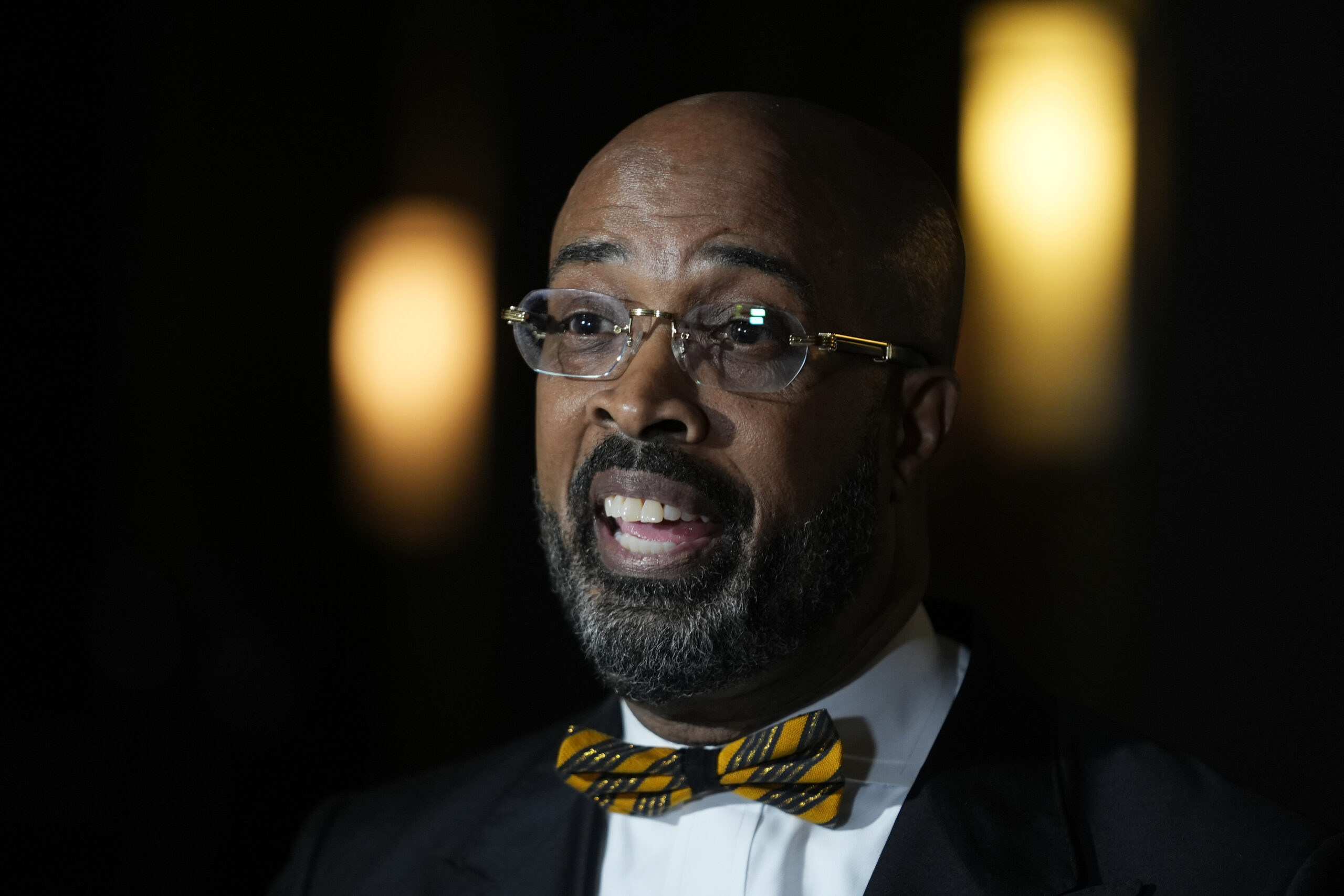
Singer told JI that his alignment with Rev. Frederick D. Haynes III delivered an anti-Israel polemic from the pulpit on Oct. 8, 2023, the day after Hamas’ attack on Israel
COMEBACK BID
Elaine Luria wants to reclaim her post as a pro-Israel leader in Congress
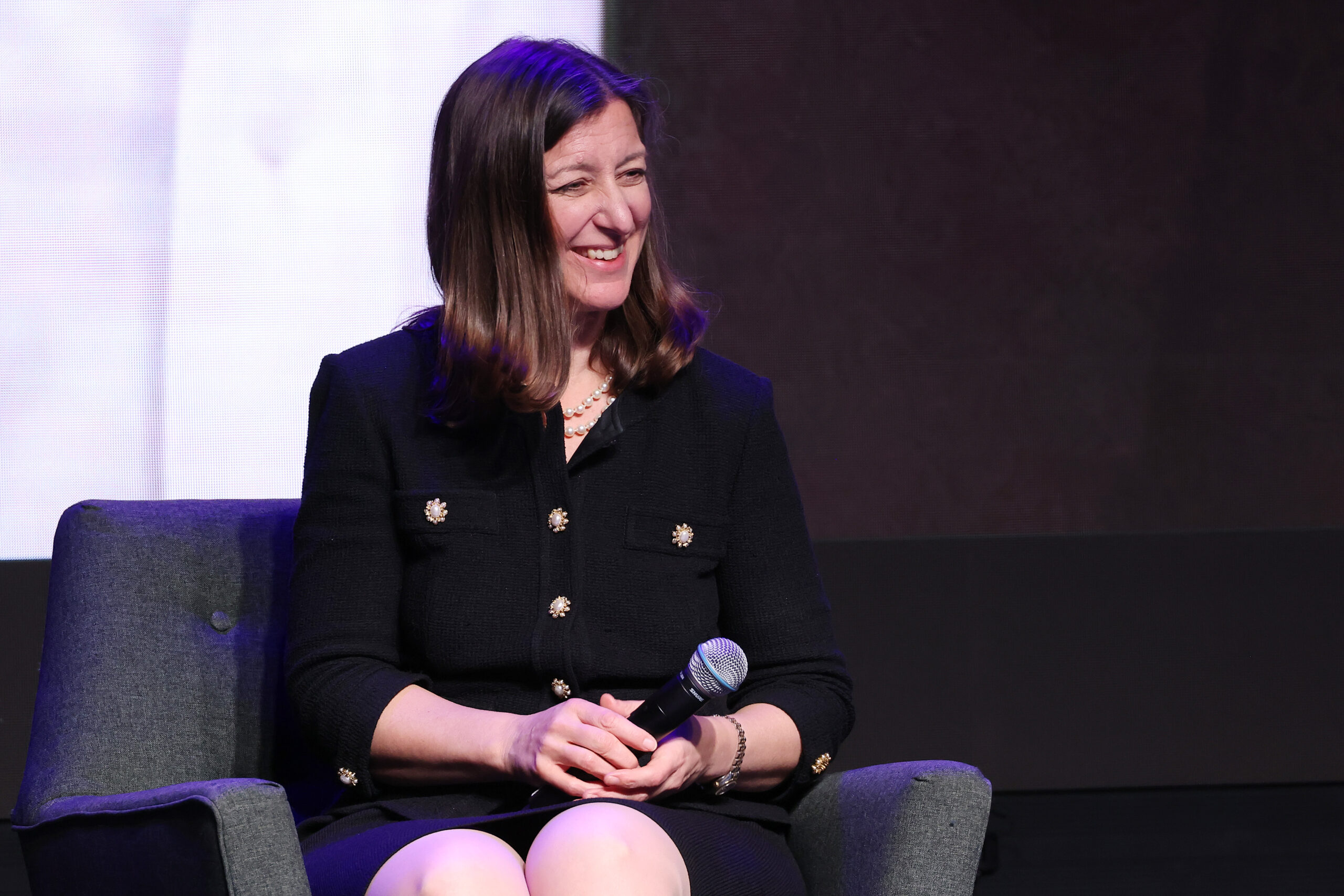
The former congresswoman told JI, ‘Anything that needs to be done to stop Iran from acquiring a nuclear weapon needs to be done’
Plus, Biden officials don't hold back on criticism of Bibi

Mass Communication Specialist 3rd Class Amber Smalley/U.S. Navy via Getty Images
Flight deck of the Nimitz-class aircraft carrier USS Abraham Lincoln (CVN 72) May 10, 2019 in the Red Sea.
Good Wednesday afternoon!
This P.M. edition is reserved for our premium subscribers — offering a forward-focused read on what we’re tracking now and what’s coming next.
It’s me again — Danielle Cohen-Kanik, U.S. editor at Jewish Insider and curator, along with assists from my colleagues, of the Daily Overtime. Please don’t hesitate to share your thoughts and feedback by replying to this email.
📡On Our Radar
Notable developments and interesting tidbits we’re tracking
President Donald Trump indicated he’s losing patience with Iran: He posted a stark warning on Truth Social this morning that a “massive Armada is heading to Iran” and “it is ready, willing, and able to rapidly fulfill its mission, with speed and violence, if necessary.”
Trump encouraged Tehran to come back to the negotiating table where he demanded it have “no nuclear weapons” — a position that differs from Israel’s, which has said Iran must not be allowed to enrich uranium at all — but made no mention of the protesters Trump had pledged to protect…
Despite Trump’s threat, Secretary of State Marco Rubio told lawmakers at a Senate Foreign Relations Committee hearing today that the “armada” of military assets being moved to the Middle East is primarily defensive, Jewish Insider’s Marc Rod reports.
Rubio noted that 30,000-40,000 U.S. troops in the region are “within the reach of an array of thousands of Iranian” drones and missiles. “We have to have enough force and power in the region, just on a baseline, to defend against that possibility,” he explained.
In addition, “the president always reserves the preemptive defensive option — in essence, if we have indications that, in fact, they’re going to attack our troops in the region,” Rubio continued, as well as security agreements to defend allies such as Israel “that require us to have a force posture in the region.”
Rubio admitted the U.S. has little clarity on who would govern Iran if the regime collapses: “I don’t think anyone can give you a simple answer as to what happens next in Iran if the supreme leader and the regime were to fall, other than the hope that there would be some ability to have somebody within their systems you could work towards a similar transition” as the U.S. has supported in Venezuela…
Rubio was also questioned by senators about the Board of Peace: He clarified that “the primary and sole focus of that board right now is to administer Phase 2 and Phase 3 of the plan in Gaza,” despite broad language in the body’s charter, and acknowledged that some European allies have declined to join over their concern that the board is competing with the U.N. “This is not a replacement for the U.N. But the U.N. has served very little purpose in the case of Gaza,” Rubio said…
As their own response to Iran’s violent suppression of protests, several European countries changed their position to support the EU designating the Islamic Revolutionary Guard Corps as a terror organization, a move they have historically opposed over fears of irreparably severing ties with Tehran.
Ahead of a Thursday meeting of EU foreign ministers in Brussels — where the bloc was already expected to approve additional sanctions on Iran — Italy, Germany and earlier today France announced they would support the designation, teeing up its approval, which must be unanimous, at tomorrow’s meeting…
The State Department found that the Palestinian Authority paid more than $200 million to terrorists and their families in 2025, the Washington Free Beacon reports, despite the PA claiming it had ended its “pay-to-slay” program last February.
The PA merely “transferred responsibility” for the payments to a new body “under the guise of social welfare,” a report provided to Congress laid out, with evidence from post offices, social media and Telegram “indicating clearly that the compensation in support of terrorism has continued”…
Biden administration officials jumped to the defense of the former president’s Israel policy after Israeli Prime Minister Benjamin Netanyahu alleged in a press conference yesterday that some IDF soldiers had been killed in Gaza due to a U.S. arms embargo that caused Israel to run out of ammunition during the Biden presidency.
Brett McGurk, Biden’s senior Middle East advisor, told Axios that Netanyahu’s comments were “categorically false” and that Biden’s “commitment to Israel’s security to include U.S. military assistance was unwavering”; diplomat Amos Hochstein slammed Netanyahu as “ungrateful to a president that literally saved Israel at its most vulnerable moment”; and former State Department antisemitism envoy Deborah Lipstadt said that to ignore Biden’s support for Israel “is to ignore history”…
Syrian President Ahmad al-Sharaa visited Moscow today where he and Russian President Vladimir Putin discussed Russia’s continued military presence in the country, Syrian state media reported. Despite its historic backing of longtime Syrian leader Bashar al-Assad, Moscow did not oppose al-Sharaa’s ouster of the dictator, though Russia has sheltered Assad and his family since they fled Damascus.
Russia has begun pulling out from its position in northeast Syria in an area still controlled by the Kurdish-led Syrian Democratic Forces, as Damascus mounts a campaign to oust them, though Moscow reportedly hopes to keep its naval and air bases on the Syrian coast…
⏩ Tomorrow’s Agenda, Today
An early look at tomorrow’s storylines and schedule to keep you a step ahead
Keep an eye out in Jewish Insider for an interview with former Rep. Elaine Luria (D-VA), as she seeks to reclaim her former seat and shore up support for Israel among her Democratic colleagues.
Pennsylvania Gov. Josh Shapiro will speak at Washington’s Sixth & I synagogue in conversation with Sen. Raphael Warnock (D-GA) about the governor’s new memoir, Where We Keep the Light.
The Hudson Institute will host a conversation with Jacob Helberg, the under secretary of state for economic affairs, as he returns from a trip around the Middle East where he brought Qatar and the United Arab Emirates into the Pax Silica initiative and signed a joint AI strategic framework in Israel.
Stories You May Have Missed
FLORIDA FIGHT
Boca Raton Mayor Scott Singer, a Republican, hopes shift to right will push him to victory against Moskowitz
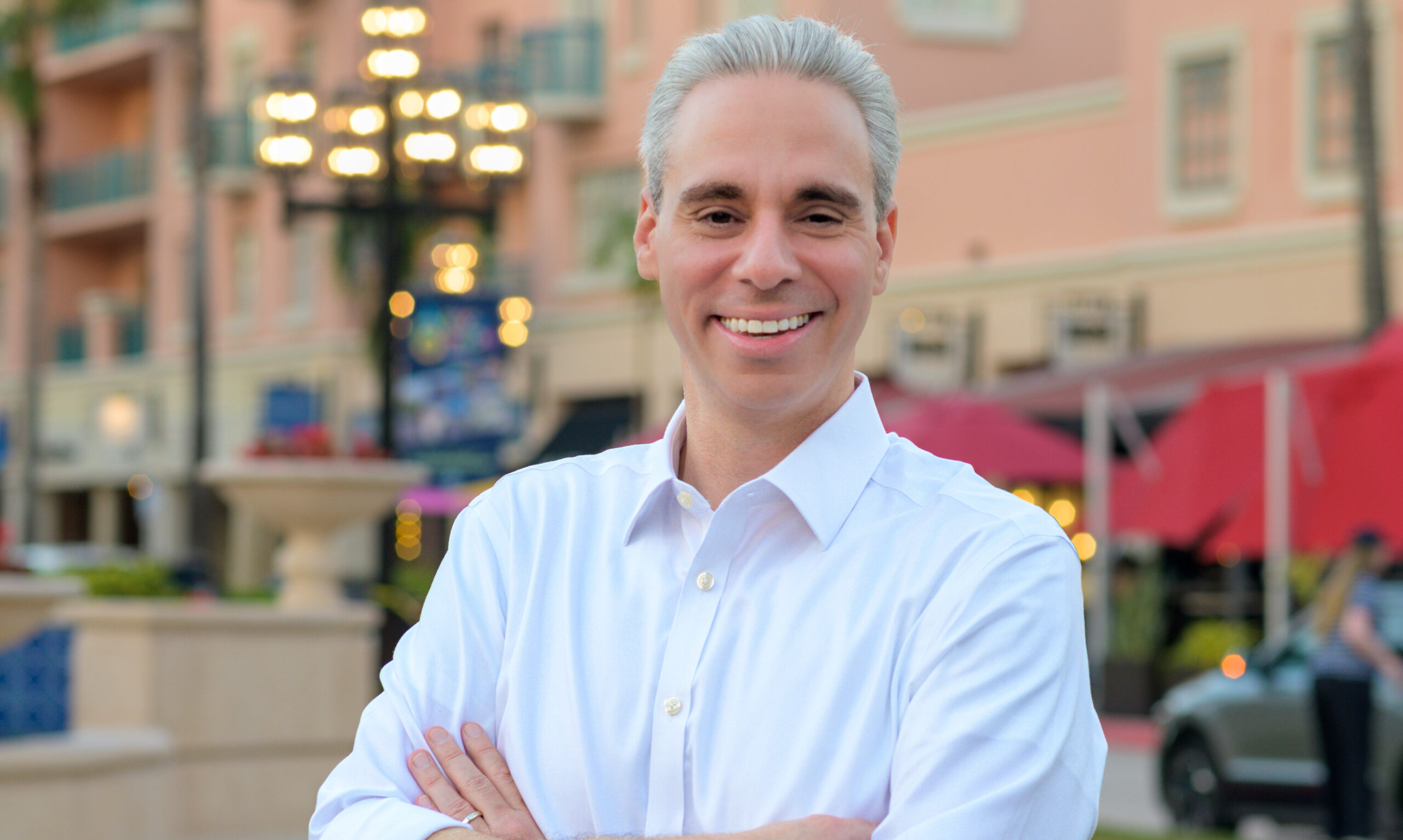
Singer told JI that his alignment with the GOP has been shaped by his Jewish faith
FOLLOW THE MONEY
Anti-Israel group organizing protests outside NYC synagogues gets cash windfall

The group behind the pro-Hamas chants in Queens has a nationwide network and links to pro-terror organizations and individuals
Plus, Emory faculty revolt in defense of Iran official's daughter

MONEY SHARMA/AFP via Getty Images
Saudi Arabia's Crown Prince and Prime Minister Mohammed bin Salman (C) inspects a guard of honor during a ceremonial reception at the President House a day after the G20 summit in New Delhi on September 11, 2023.
Good Tuesday afternoon!
This P.M. edition is reserved for our premium subscribers — offering a forward-focused read on what we’re tracking now and what’s coming next.
It’s me again — Danielle Cohen-Kanik, U.S. editor at Jewish Insider and curator, along with assists from my colleagues, of the Daily Overtime. Please don’t hesitate to share your thoughts and feedback by replying to this email.
📡On Our Radar
Notable developments and interesting tidbits we’re tracking
Saudi Arabia’s shift away from its traditional alliances and towards Islamism is evoking more backlash: Asked about Riyadh’s growing rapprochement with Qatar and Turkey, Israeli Prime Minister Benjamin Netanyahu said at a press conference this afternoon that he’s following the developments and that Israel “expect[s] from anybody who wants normalization or peace with us that they not participate in efforts steered by forces or ideologies that want the opposite of peace”…
Netanyahu’s comments came shortly after Saudi Crown Prince Mohammed bin Salman held a phone call with Iranian President Masoud Pezeshkian, where MBS conveyed that “the Kingdom considers any threat or tension against Iran unacceptable”…
That’s not stopping the U.S. from hinting at the continued possibility of strikes on Iran: U.S. Central Command announced it will be conducting a “multi-day readiness exercise” in order to “demonstrate the ability to deploy, disperse, and sustain combat airpower” across its area of responsibility, which includes Iran…
And Sen. Lindsey Graham (R-SC) slammed Riyadh for other nefarious actions in the region, Jewish Insider’s Emily Jacobs reports, including its “attack” on the UAE and silence regarding the Syrian government’s campaign against the Kurds, demanding the kingdom use its influence to “keep the region from falling further into chaos.”
“Please understand that I am smart enough to know that Saudi Arabia has influence on the Syrian government, and I expect them to use it,” Graham said, adding that he is “trying to work with the administration and regional partners to prevent a bloodbath in Syria against our Kurdish allies”…
(President Donald Trump, meanwhile, had a markedly different take on Syria: He told reporters today that he had a “great conversation” with the “highly respected president of Syria” and that “all of the things having to do with Syria and that area are working out very, very well, so we’re very happy about it”…)
The U.S. Embassy in Riyadh also held its first-ever International Holocaust Remembrance Day event, writing that “Today’s modest but meaningful commemoration reflects a universal duty: protecting our shared humanity across cultures, faiths, and nations”…
With Graham eyeing Damascus and Riyadh, Sen. Ted Cruz (R-TX) took aim elsewhere, calling for the U.S. to arm protesters in Iran “NOW.” “For the Iranian people to overthrow the Ayatollah — a tyrant who routinely chants ‘death to America’ — would make America much, much safer,” he said…
Authorities in Azerbaijan arrested three people allegedly preparing an attack on the Israeli Embassy in Baku today; the men were affiliated with ISIS-K, the Afghani branch of the terror group…
The Board of Peace is attempting to formalize its processes and responsibilities, according to a draft resolution from the board obtained by The New York Times, which bestows expansive powers to its chairman — Trump — including naming the commander of the International Stabilization Force, which still has yet to be established.
The document also names White House Chief of Staff Susie Wiles and attorney Martin Edelman as members of the board, the first time they have been identified as such…
After a doctor who is the daughter of a senior Iranian government official departed from Emory University’s medical school, the professor who serves as head of Emory’s faculty leadership council criticized the school for letting her go, JI’s Haley Cohen has learned.
Noelle McAfee, a professor in Emory’s philosophy department, sent a scathing email to the university expressing concern that the school’s dismissal of Fatemeh Ardeshir-Larijani, the daughter of the secretary of Iran’s Supreme Council for National Security, was a politically motivated firing.
“It’s extremely disappointing to see that our leadership here at Emory are consistently caving to political pressure and never taking the side of faculty,” McAfee wrote, quoting an anonymous faculty member, expressing concern that Ardeshir-Larijani, whose father is responsible for the Islamic Republic’s national security, didn’t receive due process…
In the Garden State, Mussab Ali, the former Jersey City Board of Education president and champion of anti-Israel college encampments, officially launched his primary challenge to Rep. Rob Menendez (D-NJ) today, hitting Menendez on day one for supporting Israel and being endorsed by AIPAC.
“Democrats need to step up and become the party where we abandon corporate PACs, we won’t take money from groups like AIPAC, and we need to be accountable to everyday people,” Ali told the New Jersey Globe. He also enters the race with the endorsement of former Rep. Jamaal Bowman (D-NY), who was unseated in part due to his sharp criticisms of Israel…
Marking International Holocaust Remembrance Day, Chicago’s City Council voted unanimously to adopt the International Holocaust Remembrance Alliance’s working definition of antisemitism into its municipal code…
⏩ Tomorrow’s Agenda, Today
An early look at tomorrow’s storylines and schedule to keep you a step ahead
Keep an eye out in Jewish Insider for an interview with Republican Boca Raton Mayor Scott Singer, who’s hoping for a conservative shift among Jewish voters in South Florida to help him unseat Rep. Jared Moskowitz (D-FL).
“October 7: In Their Own Words,” a play drawn directly from testimonies of survivors of the Oct. 7, 2023, Hamas terror attacks, will premiere at the Kennedy Center. Read JI’s interview with the show’s playwrights here.
Secretary of State Marco Rubio will be on the Hill, testifying at a Senate Foreign Relations Committee hearing on U.S. policy towards Venezuela in the aftermath of the ouster of former President Nicolás Maduro.
Stories You May Have Missed
PROBLEMATIC POST
Top Michigan Democratic fundraiser shared Veterans Day post honoring Nazi officer grandfather

Kelly Neumann is serving as the fundraising co-chair for gubernatorial candidate Jocelyn Benson and Senate candidate Mallory McMorrow and has fundraised for several other Michigan Democrats
SABRA SLAM
Deni Avdija to make triumphant DC return as star NBA player

The Portland Trail Blazers forward has emerged as one of Israel’s all-time top athletes
Plus, Kanye West claims he's 'not a Nazi' in full-page WSJ apology

Mostafa Alkharouf/Anadolu via Getty Images
Vehicle, carrying the body of the last Israeli hostage remaining in Gaza Ran Gvili, arrives the Abu Kabir Forensic Institute prior to the funeral ceremony in Tel Aviv, Israel on January 26, 2026.
Good Monday afternoon!
This P.M. edition is reserved for our premium subscribers — offering a forward-focused read on what we’re tracking now and what’s coming next.
It’s me again — Danielle Cohen-Kanik, U.S. editor at Jewish Insider and curator, along with assists from my colleagues, of the Daily Overtime. Please don’t hesitate to share your thoughts and feedback by replying to this email.
📡On Our Radar
Notable developments and interesting tidbits we’re tracking
The IDF announced this morning it had identified the remains of the final deceased hostage, Ran Gvili, in Gaza and is returning them to Israel for burial, Jewish Insider’s Matthew Shea reports, marking the end of the hostage crisis that had gripped Israel and world Jewry for nearly 850 days in the aftermath of the Oct. 7, 2023, Hamas attacks.
Beyond the hostages taken on Oct. 7, Gvili’s return means that no Israelis — living or deceased — are being held by terror groups in Gaza for the first time since 2014.
While the IDF uncovered Gvili’s body in a Muslim cemetery where Hamas had buried it, President Donald Trump told Axios that the terror group “worked very hard to get the body back. They were working with Israel on it. You can imagine how hard it was.”
“Now we have to disarm Hamas like they promised,” Trump continued, as the parties move into Phase 2 of his peace deal. For its part, Israel announced it will reopen the Rafah crossing between Egypt and Gaza in a “limited” capacity later this week.
Remarking on Gvili’s return, White House Press Secretary Karoline Leavitt added at a press conference this afternoon that “more than 20 new, additional countries have also signed up to join the newly established Board of Peace,” without naming the additions…
The New York Times lays out the latest developments in U.S.-Iran tensions, as American military assets reach the region and Iranian officials, as well as Iranian proxy terror groups, intensify their threats against the U.S. and Israel.
Joe Kent, the director of the U.S. National Counterterrorism Center, has warned Iraqi officials that if Iranian-backed militias in Iraq were to strike U.S. troops, the U.S. would retaliate, according to the Times…
Trump told Axios that the situation in regards to Iran is “in flux” but that the U.S. has “a big armada next to Iran. Bigger than Venezuela.” Still, the president left the possibility of diplomacy with Tehran open: “They want to make a deal. I know so. They called on numerous occasions. They want to talk”…
Despite the ongoing tensions, the Trump administration deported about a dozen Iranians back to Tehran yesterday, CNN reports. It’s the third such deportation flight to Iran during Trump’s second term, and the first since the regime began its violent crackdown on protesters…
Elsewhere in the region, Israeli and Lebanese officials were hosted by the U.S. Embassy in Jordan over the weekend to discuss “steps needed for a more peaceful and prosperous region,” according to the U.S. Embassy in Beirut…
Several leading Jewish and pro-Israel advocacy groups are expressing concerns about the impact of the recent rise in antisemitic and Islamist messaging out of Saudi Arabia, JI’s Matthew Kassel reports, as the Gulf kingdom’s rhetoric is increasingly raising questions about its standing as a reliable U.S. ally in the region.
Among other groups, the Anti-Defamation League said in a sharply worded social media statement last week that it was “alarmed by the increasing frequency and volume of prominent Saudi voices — analysts, journalists and preachers — using openly antisemitic dog whistles and aggressively pushing anti-Abraham Accords rhetoric, often while peddling conspiracy theories about ‘Zionist plots’”…
Turning to the U.S., progressive operative Waleed Shahid announced today that he will assume the newly created role of deputy communications director of economic justice in New York City Mayor Zohran Mamdani’s office, JI’s Will Bredderman, joining us to cover New York City Hall, reports.
Shahid, the former spokesperson for Justice Democrats, was also a leader in the 2024 Uncommitted movement, which sought to deny support to former President Joe Biden and Vice President Kamala Harris over the Biden administration’s support for Israel following the Oct. 7 attacks, and served as an advisor to former Rep. Jamaal Bowman (D-NY)…
After the fatal shooting of a man by ICE officers in Minneapolis this weekend, Gov. Tim Walz compared immigration enforcement activities in Minnesota to Anne Frank’s persecution by the Nazis, drawing condemnation from the U.S. Holocaust Memorial Museum. “Many of us grew up reading that story of Anne Frank. Someone’s going to write that children’s story about Minnesota,” Walz said at a press conference yesterday.
Without referencing Walz or ICE, the USHMM responded in a statement today: “Anne Frank was targeted and murdered solely because she was Jewish. Leaders making false equivalencies to her experience for political purposes is never acceptable. Despite tensions in Minneapolis, exploiting the Holocaust is deeply offensive, especially as antisemitism surges”…
Israeli comedian Guy Hochman, whose New York City show was canceled last week amid protests by pro-Hamas groups, spoke to The Hollywood Reporter about becoming an “international flashpoint” after his subsequent show in Beverly Hills, Calif., was also canceled and his visa to perform in Canada was revoked.
“I’m not a politician. I’m a comedian. A very Zionist comedian. But it’s terrible to see it happening. But I am not giving up and I’m not giving in. I will not give them the pleasure. But I am getting a lot of threats on my life. I know there’s a big difference between us, but I don’t want to be the Israeli Charlie Kirk,” Hochman said…
Rapper Kanye West took out a full-page ad in today’s print edition of The Wall Street Journal apologizing for his erratic, and often antisemitic, behavior in recent years, claiming his actions stemmed from a brain injury sustained years ago that amplified his bipolar disorder.
“In that fractured state, I gravitated toward the most destructive symbol I could find, the swastika, and even sold T-shirts bearing it,” West wrote in the ad. “I regret and am deeply mortified by my actions in that state and am committed to accountability, treatment, and meaningful change. It does not excuse what I did though. I am not a Nazi or an antisemite. I love Jewish people”…
The Washington Post reportedly informed its staff on a Zoom call today that up to half of employees will be laid off, with the biggest cuts to its foreign and sports desks…
⏩ Tomorrow’s Agenda, Today
An early look at tomorrow’s storylines and schedule to keep you a step ahead
Keep an eye out in Jewish Insider for a profile of Deni Avdija, the Israeli NBA star making his triumphant return to Washington tomorrow as his current team, the Portland Trail Blazers, takes on his former team, the Wizards, during their Jewish Heritage Night game.
Pennsylvania Gov. Josh Shapiro’s new memoir, Where We Keep the Light, is out tomorrow. We’ll be taking a look at how Shapiro discusses Israel and Judaism in its pages, as the swing-state governor potentially seeks the Democratic presidential nomination in 2028.
Marking International Holocaust Remembrance Day, representatives of the U.S. and Israel will speak at the United Nations, and the Trump-Kennedy Center in Washington will host “Enduring Music: Compositions from the Holocaust,” a concert of music composed in ghettos and death camps.
Israeli Diaspora Affairs Minister Amichai Chikli’s International Conference on Combating Antisemitism will continue with remarks from Albanian Prime Minister Edi Rama (who addressed the Knesset today), former Australian Prime Minister Scott Morrison, former New York City Mayor Eric Adams, U.S. Ambassador to Israel Mike Huckabee and more.
In Berlin, Israeli Economy Minister Nir Barkat will deliver remarks at the WELT Economic Summit, the annual European business and political confab organized by media conglomerate Axel Springer.
Stories You May Have Missed
HER WAY
Tahesha Way campaigns as close ally of Jewish community in pivotal N.J. special election

Way is touting her support for stalled legislation that would codify the IHRA definition of antisemitism into law
FACING SCRUTINY
Josh Gruenbaum’s rapid rise from overseeing federal contracting to dealmaking on the world stage

Gruenbaum started working with Steve Witkoff and Jared Kushner on Middle East diplomacy after the ceasefire between Israel and Hamas took effect in October
New Yorker reporter Jason Zengerle’s book, ‘Hated By All the Right People: Tucker Carlson and the Unraveling on the Conservative Mind,’ comes out Tuesday

Courtesy/Andrew Kornylak
Book cover/Jason Zengerle
In his richly reported new book, Hated by All the Right People: Tucker Carlson and the Unraveling of the Conservative Mind, Jason Zengerle tracks the evolution of the mainstream conservative journalist for The Weekly Standard, CNN and FOX News into a prominent figure in the far-right media ecosystem whose commentary increasingly descends into open antisemitism.
Zengerle, a veteran political reporter, ruminates over Carlson’s troubling transition from magazine writer to cable news pundit to his current position as a widely followed podcast host whose credulous interviews with Nazi sympathizers and Holocaust deniers, among others, have done little to dampen his influence in the MAGA movement he helped build.
In a recent interview with Jewish Insider, Zengerle, whose book will be published Tuesday, warned that Carlson’s efforts to smuggle antisemitic views into mainstream discourse should not be taken lightly.
“Tucker has credibility, and he comes across as a credible person,” Zengerle said. “That he’s giving voice to these really pretty fringe and dangerous sentiments is not to be underestimated, because people trust him.”
Whether Carlson personally believes the “awful things” he promotes, Zengerle writes in his book, “matters less than that he says them at all, and that millions of people — members of Congress, titans of industry, the president and just everyday Americans — listen to and take their cues from him.”
“What matters is that by saying these things, Carlson has finally achieved the fame, power and influence that for so long eluded him,” he adds.
Zengerle, 52, was recently hired as a staff writer for The New Yorker, and has previously contributed to The New York Times Magazine, GQ and The New Republic, among other publications. His book on Carlson is his first.
Speaking with JI last week, Zengerle discussed Carlson’s professional ascent, his motivations for demonizing Israel and why conservative Jews are so frightened by his potential role in shaping the future direction of the Republican Party after President Donald Trump leaves office, among other topics.
The conversation has been edited and condensed for clarity.
Jewish Insider: This book has been in the works for a while. How did the idea initially come about?
Jason Zengerle: It’s been a bit of a roller coaster. The initial idea sort of came from a conversation I was having with my agent about a book I didn’t want to write, about the Republican civil war that was about to unfold. This is not long after [the] Jan. 6 [2021 Capitol riot]. The people who are going to be vying to inherit Trump supporters, because Trump was obviously a finished product, would never be coming back. And I was sort of talking to my agent about the various characters, and explaining why I didn’t think, no matter how many positions [Sens.] Josh Hawley (R-MO) or Ted Cruz (R-TX) or Tom Cotton (R-AR) took that would seem to appeal to Trump’s base, there was no way they’re ever going to inherit those voters, because they just lacked the charisma and entertainment value that Trump obviously has.
Offhandedly, I said something like, ‘You know, the only guy who really can do that is Tucker Carlson.’ That was the genesis of the idea. Then, obviously, when I started the book, Tucker was at the height of his powers. He had the highest-rated show on Fox. Trump had kind of exited the stage. And Tucker, in a lot of ways, had sort of replaced Trump, just in terms of the headspace he was occupying among both liberals and conservatives. You had this weird Tucker economy of liberal journalists and people on Twitter who would clip his show, sort of like outrage bait.
For the first couple years I was working on the book, Tucker was sort of occupying that space. And then he got fired from Fox, and everyone was predicting that he would basically suffer the same fate all Fox stars suffer when they leave Fox, which is irrelevance. Like, who thinks about Bill O’Reilly these days, right? But I thought that wasn’t going to happen. I thought Tucker was going to stay in the picture. That might have been some motivated self-reasoning on my part, because I wanted the book to be relevant. My original publisher definitely thought he was going to fade away because they canceled my contract.
JI: It certainly seems you were right in suspecting that he would continue to be not only relevant, but extremely influential during the campaign and in influencing hiring decisions for key roles in the Trump administration, as you detail in the book. He’s had a circuitous and occasionally rocky career from print journalism to cable news and now to an independent podcast. How do you view his evolution? Is there a moment where you see a clear turning point toward the type of demagogic commentator he would become, or do you think it was more gradual?
JZ: I think there are definitely inflection points in his career, and you can point to a number of them. I think one was certainly the war in Iraq. I think that had a pretty profound impact on his thinking. You know, I think he harbored some private doubts about the wisdom of going to war there, but was not really comfortable expressing them publicly, for a couple of reasons. Today, he talks a lot about how Bill Kristol and all these guys kind of misled him, and that’s why he hates them so much. At the same time, his best friend and now business partner was Neil Patel, who was working for Scooter Libby [chief of staff to former Vice President Dick Cheney]. And if you want to look at the disinformation that was put out into the world that supported going into Iraq, that was coming from Dick Cheney’s office. And I think Neil played a role in that. The fact that his best friend was sort of making the case for war, I think, made it difficult for him to oppose it. Two, the job he had at CNN at the time, on “Crossfire,” was to represent the right and the Bush administration — so just from a practical standpoint, he had to kind of support the war.
But anyway, the fact that things went so badly for Tucker at CNN, I think, made him reexamine a number of his priors and a lot of his time in his early career, when he was at The Weekly Standard and even after he had started writing for Talk and Esquire. There was such an effort among people like Kristol to excommunicate Pat Buchanan from the conservative movement. I think what happened with Iraq made Tucker reconsider Buchanan a bit, and he sort of saw that, ‘OK, well, I actually think this guy was right about foreign policy, and maybe he’s right about some other stuff as well.’ I think that led him to become much more hawkish on immigration.
I think that what happened with Jon Stewart and CNN was a pretty big inflection point in the sense that the public humiliation he suffered, obviously, was difficult for him. But I also think he felt that his friends in the elite D.C. political and media circles didn’t come to his aid the way he would have liked. That started to breed a certain resentment he felt toward them that really grew as his career limped along. It made it a lot easier for him, when Trump came on the stage and started attacking the swamp and D.C. elites, to join in on those attacks, because I think he still nursed a grudge. So you can see things gradually, but you can also point to these crossroads moments, as well.
JI: You write that, while you didn’t know Carlson well, he often served as an “eager interview” subject and source for your stories over the years. Still, he didn’t agree to any interviews for your book. Why do you think that was?
JZ: I think it really is that Robert Novak expression: “a source, not a target.” I think he plays that game.
JI: There’s an interesting recollection in the prologue about your occasional interactions with Carlson when he would stop by the New Republic offices back in the late ’90s during your time as an intern there. You describe him then as a “hotshot young writer for The Weekly Standard,” and say he “seemed so much older, wiser and worldlier than we were.”
JZ: Maybe it didn’t take much to impress me. But the thing about him back then — and the thing I think others admired about him and looked up to him for — was that he was really courageous. The targets he picked, whether it was Grover Norquist or George W. Bush — it took guts to do that as a conservative journalist, and that was admirable.
JI: You write in the book that Carlson has “come a long way from the days when he described himself as a pro-Israel, Episcopalian neocon.” On his show now, he regularly promotes antisemitic tropes and conspiracy theories, incessantly attacks Israel and hosts neo-Nazis and Holocaust deniers for friendly interviews. Do you have insight into what sparked this openly antisemitic streak?
JZ: It’s funny, someone who’s close to him was telling me that they thought this basically started with his conclusion that all the people who were opposed to him and Trump, post-2016, were big Israel supporters. So Tucker’s like, ‘Alright, I’m just going to piss these people off by going after Israel,’ and that’s kind of where it started. I don’t know if that’s the case.
I mean, Bill Kristol looms so large in his mind and in his own story. The story that he tells people, and the story I think he tells himself, is he was misled and used and kind of exploited by the neocons, that he was this young, naive, innocent writer who got just basically used to get us into a war and support free trade deals and do all these things that hurt the white working class in America, and that what he’s doing now is his penance. And I think that’s not a true story. I don’t think that’s what happened.
Kristol is just such a huge figure in his own mythology. Even before Tucker went in this direction, he was really close to Kristol. He really looked up to him. He was his first boss, and I think he had a real impact on Tucker’s career. But now, Tucker wants that all to be a negative impact. He did an interview recently with his brother, Buckley Carlson, where he talked about how Kristol hates Christians. Bill Kristol, who hired Fred Barnes and took vacations with Gary Bauer. He’s recast all this stuff.
JI: Do you think Carlson’s hostility toward Israel and descent into nakedly antisemitic vitriol, such as when he called Ukrainian President Volodymyr Zelensky “ratlike” and “a persecutor of Christians,” is motivated by more than just resentment of those he believes have spurned him? There’s been a lot of attention recently about a generational turn away from Israel on the right, which raises a question of whether he’s opportunistically tapping into that or directly influencing it.
JZ: I guess it’s both. I do think he’s making the calculation that that is where the energy is, and therefore he wants to make sure he stays out in front of it. He has a very good political radar and good professional radar. I think the Nick Fuentes episode was him recognizing he was in this feud with this guy, and he was losing, and him sort of deciding you cannot be successful in conservative media or conservative politics these days unless you have the support of these neo-Nazis. Unfortunately, it’s not going to work for you, and so he needed to get back on their good side. I think that’s part of the calculus.
At the same time, I think he is influencing some of these people, maybe not the hardcore Nick Fuentes supporters, but young conservatives who, you look at what happened or what’s happening in Gaza and had questions and qualms and concerns. And then Tucker is out there — and Fuentes is out there as well — making the argument about how Gaza is wrong, but taking it so much further than that, and going into these really ugly corners of anti-Israel sentiment and taking them to those places.
Now, I don’t want to get too far afield here, but that JD Vance talk at Ole Miss, where the frat boy asked that question about Israel persecuting Christians — that was a real light bulb moment for me. That this stuff had penetrated that deep that you have this guy who appears to be your regular old SEC frat boy saying this stuff. And I think Tucker is responsible for a lot of that, because that’s something he did at Fox, and he continues to do. He’s really good at taking ideas and arguments and even just stories from extreme, far-right fringy areas, often on the internet, and smuggling them into the mainstream. I think he’s doing that with the Israel stuff and with the Jewish stuff.
JI: His interview in 2024 with Darryl Cooper, the self-proclaimed podcast historian and Holocaust revisionist who has described Winston Churchill as the “chief villain” of World War II, seems an early instance of that effort.
JZ: That’s a perfect example. You have to be really steeped in this stuff to see what this individual is saying and doing and the rhetorical tricks they’re playing. Tucker just brings and vouches for these people, and I think that’s pretty dangerous. Tucker has credibility, and he comes across as a credible person. The fact that he’s giving voice to these really pretty fringe and dangerous sentiments is not to be underestimated, because people trust him, and it validates them.
JI: There’s been some intermittent speculation about whether Carlson will run for president. Do you have any thoughts on that?
JZ: I don’t think he just wants to be a podcaster. I don’t think that’s his goal here. I think he has a real vision for what he wants this country to be, and he wants to achieve that vision, and if it turned out that running for office was the way to do that, I could see him doing it. I don’t think it’d be his first choice. I think right now, he has a nice, nice setup where he obviously has a president who listens to him. Maybe even more importantly, he has a vice president who I think he’s even closer to and more in alignment with. Just sort of thinking through the steps, as long as he thinks JD Vance and he are on the same page ideologically, and as long as he thinks JD Vance is capable of being elected president, that he has the political talent to pull that off, I can’t imagine him doing anything on his own.
But if one of those two things changes, and I think it’s quite possible that the latter becomes a sticking point — if Tucker at some point were to conclude that JD Vance actually isn’t capable of being elected president and that his his ideological project is in jeopardy — I could certainly see him taking a shot at it. The way you would run for president now, it’s so different from how you had to do it before. He could probably do a lot of it from his podcast studio. But I think what’s more important is just understanding why he would do it, which is sort of the bigger point. He really does have a project he’s working on, and I think he’ll do what he thinks is necessary in order to bring that project to fruition.
JI: How would you characterize that project?
JZ: He wants the United States to look like it did in the 1950s. I think he’s very much in alignment with Stephen Miller. Beyond the immigration stuff and us being a much whiter country, I think he wants to return to traditional gender roles.
JI: While some Republican lawmakers have spoken out against Carlson, it seems notable that Trump and Vance have both so far refrained from explicitly distancing themselves from him.
JZ: There’s this weird thing going on where certain Jewish conservatives feel like, as long as Trump’s there, everything’s going to be fine. You know, his grandchildren are Jewish, he might say some stuff, he might do some things, but at the end of the day, the worst-case scenario will never occur. They view Tucker as this bad influence on Vance, and if they can just get rid of the bad influence, Vance will be OK. But they’re really terrified of Tucker. They’re really terrified of what comes after Trump. And they’re terrified that Tucker will have a major influence on whatever comes after Trump. They’re worried about the influence he has on Vance. They want to believe that Vance would be OK, left to his own devices. They think Tucker is leading him in a bad direction, and therefore they need to take out Tucker.
I think it goes beyond Israel. I think it’s genuine fear about what it would mean to be Jewish in the United States. I’ve been talking to some of these folks recently. I think it’s a real, deep-seated fear about, in Tucker Carlson’s America, what would it be like to be Jewish here?
Plus, Swiss Shabbat in Davos

Fabrice COFFRINI / AFP via Getty Images
President Donald Trump as he leaves the World Economic Forum (WEF) annual meeting in Davos on January 21, 2026.
👋 Good Friday morning!
In today’s Daily Kickoff, we look at President Donald Trump’s mixed messaging on Iran this week, and report on California state Sen. Scott Wiener’s resignation as co-chair of the state legislature’s Jewish caucus after he accused Israel of genocide. We cover a letter from more than 100 New Jersey rabbis condemning former Gov. Phil Murphy and state Assembly leaders over their spiking of an antisemitism bill, and talk to GOP legislators about Trump’s decision to invite Russia and China to join the Board of Peace. Also in today’s Daily Kickoff: Emily Damari, AJ Edelman and Rabbi Yehoram Ulman.
Today’s Daily Kickoff was curated by JI Executive Editor Melissa Weiss and Israel Editor Tamara Zieve, with an assist from Marc Rod. Have a tip? Email us here.
For less-distracted reading over the weekend, browse this week’s edition of The Weekly Print, a curated print-friendly PDF featuring a selection of recent Jewish Insider and eJewishPhilanthropy stories, including: Paige Cognetti running in Josh Shapiro’s footsteps in key Pa. swing district; Mississippi’s Jewish community rallies after antisemitic arson; and Amy Acton became a household name in Ohio — now, she wants to be governor. Print the latest edition here.
What We’re Watching
- The World Economic Forum wrapped up this morning in Davos, Switzerland. Some of those who are staying for the weekend will be attending tonight’s Shabbat dinner in the Alpine town. Though not an official WEF event, the exclusive annual dinner will bring together roughly 150 conference attendees at the conclusion of the busy week. Anne Neuberger, the Biden administration’s deputy national security advisor for cyber and emerging technology, and Henry Schein Board Chair and CEO Stanley Bergman, will be the dinner’s main speakers this year, joined by Michelle Bolten, the chief of staff to the vice chairman of BlackRock. Rabbi Menachem Berkowitz, who received his semicha from Chabad last week, will give tonight’s d’var Torah, and professor Ricardo Hausmann will share his thoughts on current events, with a focus on Venezuela. Read more about past Shabbat dinners at Davos here.
- White House Special Envoy Steve Witkoff and Jared Kushner are in the United Arab Emirates for the weekend for meetings aimed at ending the Russia-Ukraine war following a meeting last night in Moscow with Russian President Vladimir Putin, which was also attended by White House advisor Josh Gruenbaum, that went into the early morning hours.
- The U.N. Human Rights Council is holding an emergency session today on Iran‘s weekslong crackdown on anti-government protesters.
- Manhattan’s Temple Emanu-El will hold a special interfaith service tonight honoring Cardinal Timothy Dolan as the longtime Catholic official retires as the archbishop of New York.
- The two-day JLI Leadership Summit starts on Sunday in Palm Beach Gardens, Fla.
What You Should Know
A QUICK WORD WITH JI’S MELISSA WEISS
Tensions are running high across the Middle East after a week in which the U.S. and Iran lobbed threats at each other, dominating headlines, destabilizing markets and leaving many in the region unnerved at the prospect of renewed military action seven months after the 12-day war between Israel and Iran that included U.S. strikes on Iranian nuclear facilities.
On the sidelines of the World Economic Forum in Davos, Switzerland, yesterday, Trump warned that an “armada” was on its way to the Gulf — a reference to the aircraft carrier and fleet of fighter jets being redeployed from the South China Sea.
In response, Gen. Mohammad Pakpour, the head of Iran’s Islamic Revolutionary Guard Corps, warned that Iran had its “finger on the trigger, more prepared than ever, ready to carry out the orders and measures of the supreme commander-in-chief.”
Trump, true to form, has been unpredictable and inconsistent in his approach to Tehran — alternating between threatening force and teasing diplomacy. “Iran does want to talk, and we’ll talk,” Trump said at a signing ceremony in Davos on Thursday, just hours before he told reporters on Air Force One about the naval deployment to the Gulf. “We have a massive fleet heading in that direction, and maybe we won’t have to use it,” he said on AF1, managing in one whiplash-inducing sentence to lob a threat at Iran while also offering it a theoretical off-ramp.
The president has proven that he is willing to engage in bold action — especially when it comes to Iran. One has only to look to the 2020 killing of Quds Force head Gen. Qassem Soleimani or the U.S. strikes on Iranian nuclear facilities last June to see that the Trump administration is willing to engage militarily with Iran in ways prior administrations may have not. (Case in point: former President Joe Biden’s issuance in April 2024 of a one-word warning to Iran — “Don’t” — a day before Tehran launched hundreds of missiles and drones at Israel.)
SCOOP
Scott Wiener steps down as co-chair of California Jewish caucus after accusing Israel of genocide

California state Sen. Scott Wiener announced on Thursday that he is stepping down from his role as one of the co-chairs of the California Legislative Jewish Caucus, capping off nearly two weeks of controversy and frustration among Jewish leaders in the state after the San Francisco Democrat and congressional candidate declared Israel’s actions in Gaza to be a genocide, Jewish Insider’s Gabby Deutch reports. “My campaign is accelerating, and my recent statements on Israel and Gaza have led to significant controversy in the Jewish community. The time to transition has arrived,” Wiener said in a statement. He will remain in the role until Feb. 15.
Background: Wiener, who is running for Congress in a competitive Democratic primary to fill the seat being vacated by retiring Rep. Nancy Pelosi (D-CA), has long declared himself a progressive Zionist while also criticizing the government of Israeli Prime Minister Benjamin Netanyahu and Israel’s actions in Gaza. But after a candidate forum this month where his two competitors were quick to say Israel has committed genocide in Gaza, Wiener faced pressure from his left to use the word himself, and released a video a few days later changing his stance. “I’ve stopped short of calling it genocide, but I can’t anymore,” Wiener said.
MEETING ADJOURNED
Richmond, Calif., City Council fails to censure mayor over antisemitic social media posts
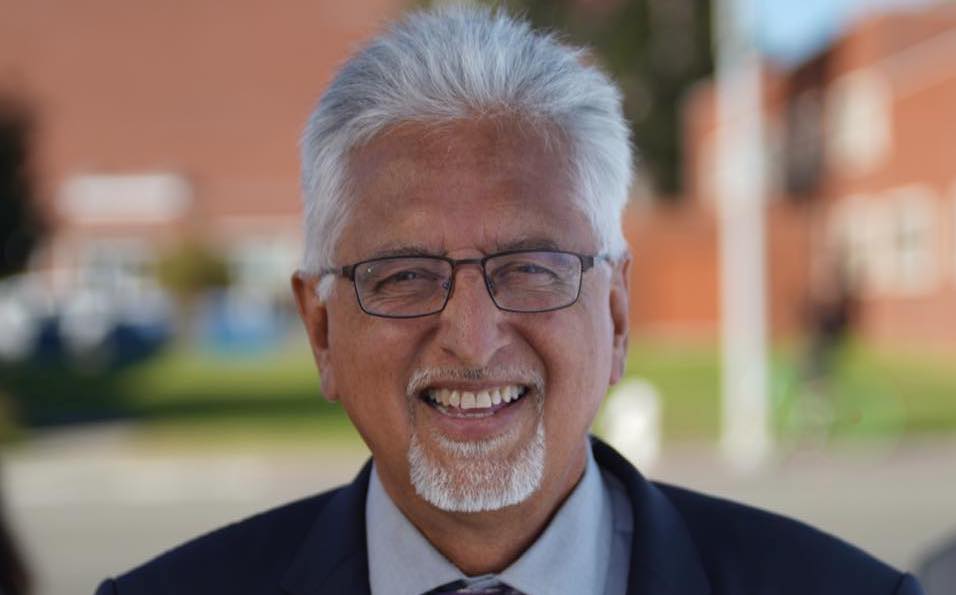
A city council meeting in Richmond, Calif., ended with shouting and frustration after 11 p.m. on Tuesday evening when the body adjourned without considering a measure seeking to censure Mayor Eduardo Martinez, who is under fire from the local Jewish community after sharing antisemitic posts on his LinkedIn page last month, Jewish Insider’s Gabby Deutch reports. Tuesday’s meeting was the first since Martinez shared multiple incendiary posts regarding the terrorist attack at a Hanukkah celebration in Bondi Beach, Australia, last month. He shared one post referring to the shooting as “Israel’s false flag attack.” Another post called the public celebration of Hanukkah “deeply provocative and very un-Jewish” and said it was meant to intimidate Muslims.
Expressing outrage: “This is a complete embarrassment as a city council,” Councilmember Jamelia Brown, one of the officials who sought to issue a formal censure of Martinez, said before walking away from the meeting room. “We will stand in solidarity and say that this was antisemitic conduct and behavior, yet we don’t want to formalize it and put it on record. It’s very coward [sic] behavior.”
PRAIRIE STATE POLITICS
Moderate Democrat faces off against anti-Israel challengers in suburban Chicago battleground

Former Rep. Melissa Bean (D-IL) is emerging as the early front-runner in the Illinois 8th Congressional District primary, with an anti-Israel progressive candidate potentially a strong competitor, Jewish Insider’s Marc Rod reports.
State of play: “Coming into it, you’d say Melissa would probably be the one to beat. The question is, has the party changed a lot, especially in primaries, since she was in the House last?” Peter Giangreco, a Chicago political strategist, told JI. “Has the party moved — or at least Democratic primary voters, have they moved to the left more than where Melissa is, is sort of an open question.”
ON THE TRAIL
In new ad, John Cornyn blasts radical Islam for Oct. 7, Bondi Beach attacks
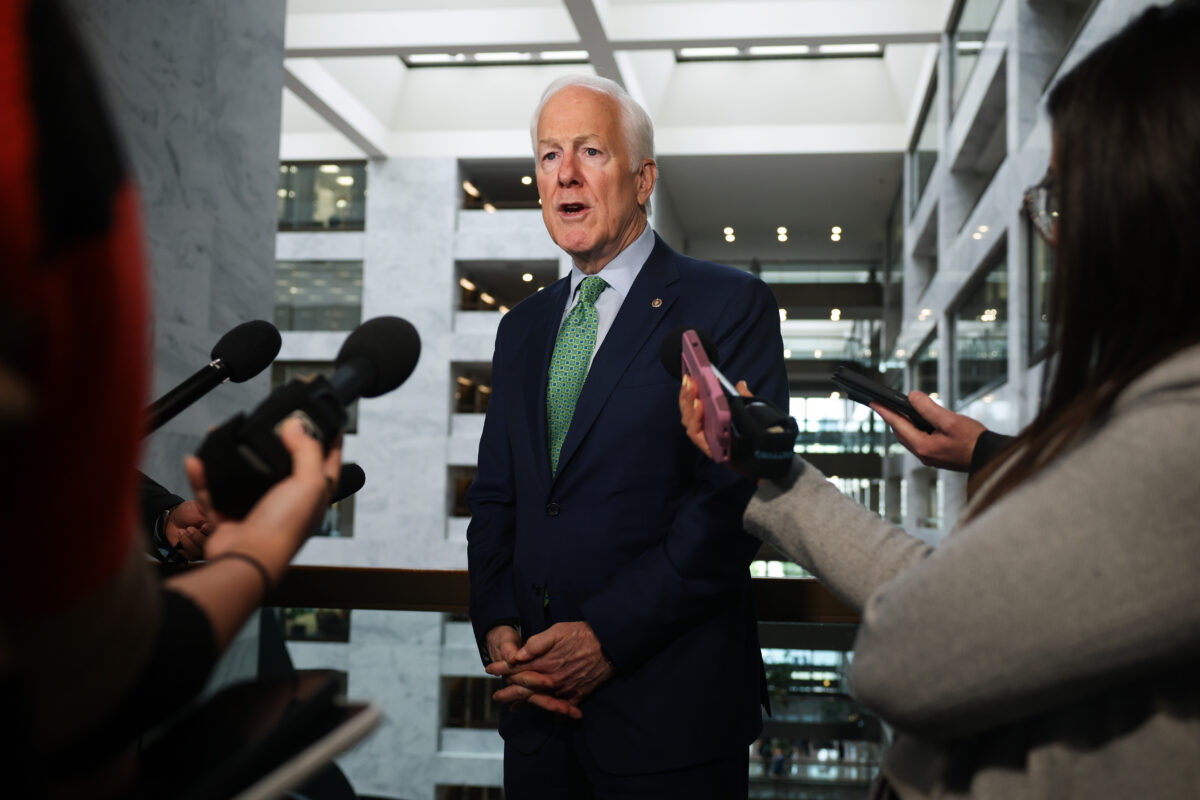
Sen. John Cornyn (R-TX), facing a serious primary challenge from his right, released a new campaign ad on Thursday calling “radical Islam” a “bloodthirsty ideology” that has influenced recent terror attacks targeting Jews, Jewish Insider’s Matthew Kassel reports.
The ad: “It fueled the unspeakable crimes on Oct. 7,” Cornyn says in the 30-second ad, called “Evil Face,” before citing the mass shooting last month during a Hanukkah gathering in Australia that was allegedly motivated by the terrorist group ISIS. “It showed its evil face again at Bondi Beach.” Speaking directly to the camera, Cornyn touted his recent efforts to revoke the tax-exempt status of the Council on American-Islamic Relations, a nonprofit advocacy group whose executive director has drawn scrutiny for celebrating the Hamas attacks of Oct. 7, 2023. “Let me be clear: No organization that supports terrorists should receive taxpayer benefits,” Cornyn concludes in the ad. “And Sharia law has no place in American courts or communities.”
SPEAKING OUT
New Jersey rabbis blast ex-Gov. Murphy, Assembly leaders over IHRA bill

Nearly 100 New Jersey rabbis wrote to now-former Gov. Phil Murphy and members of the New Jersey Assembly this week expressing concerns about reporting from Jewish Insider that Murphy and other Democratic leaders had blocked passage of legislation to adopt the International Holocaust Remembrance Alliance’s working definition of antisemitism, JI’s Marc Rod reports.
The latest: “This is a deeply troubling failure of leadership that places political calculations above the safety of the Jewish population,” the 95 rabbis wrote. “Prioritizing politics over antisemitism signals that Jewish safety is negotiable and subjects our community to further cases of harassment and violence.” They called on state leaders to immediately take up and pass the IHRA bill.
Elsewhere: Political leaders in North Carolina are condemning the Nazi symbols and antisemitic graffiti discovered earlier this week at a hub of Jewish life in Charlotte, Jewish Insider’s Emily Jacobs reports.
NOT CONVINCED
Some Republicans skeptical of Trump’s invitation to Russia, China to join Gaza Board of Peace
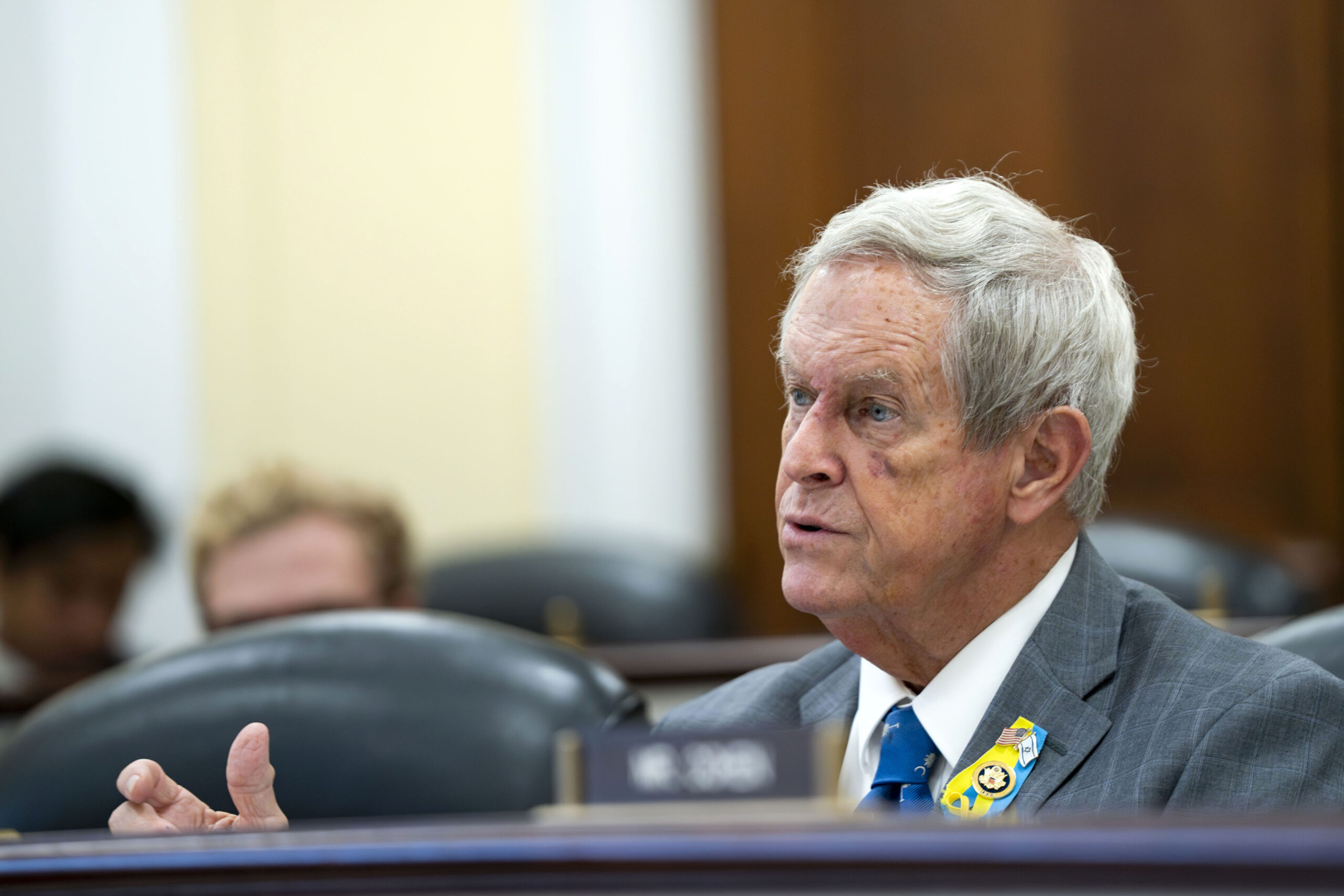
Some Republican lawmakers said they’re hesitant about President Donald Trump’s decision to invite Russia and China to be part of the Board of Peace that is set to manage the reconstruction of Gaza, Jewish Insider’s Marc Rod and Emily Jacobs report.
What they’re saying: “To exclude them from participation would be inappropriate; to include them in any real positive influence — neither one of them contributes money, neither one of them contributes an expertise in democracy,” Rep. Darrell Issa (R-CA) said. “I don’t mind them being included, but I think we have to be realistic. They both lack either the generosity or the expertise necessary to create a different world for the Palestinians in their future government.” Republicans indicated that they’re open to Trump’s idea of the Board of Peace becoming a replacement or alternative to the United Nations, citing the U.N.’s long-standing anti-Israel bias.
Seeing the big picture: Hamas must demilitarize before Gaza can undergo redevelopment, President Donald Trump’s informal advisor Jared Kushner said on Thursday on the sidelines of the World Economic Forum in Davos, Switzerland, as he presented the administration’s plan to disarm the terrorist group and rebuild Gaza, Jewish Insider’s Lahav Harkov reports.
Worthy Reads
Iraq and a Hard Place: Bloomberg’s Sam Bagher observes the difficult decisions facing Iraqi Prime Minister Mohammed Shia al-Sudani as the country finds itself being pulled by both Iran and the U.S.“The Arab country is torn between Iran, its erstwhile enemy that wants to maintain its longtime grip on its neighbor, and the U.S., the superpower whose disastrous 2003 invasion destroyed the country and destabilized the Middle East for a generation. … Over the past two years, Sudani has largely steered a middle path through the fallout from Hamas’ Oct. 7 attack on Israel and the ensuing Gaza war that have humbled Tehran, turned the Jewish state into a regional military hegemon and reshaped the Middle East. But at the same time, taking advantage of Iran’s weakness, he’s worked quietly to move Iraq closer to the US, its wealthy Sunni-led Gulf Arab allies and Turkey. It’s a fine line — he must dismantle Iran-backed militias, entice Western and Gulf Arab investment and bring in American oil companies, all without alienating Shiite political factions backed by Tehran or inviting a stronger response from the Islamic Republic.” [Bloomberg]
Bouncing Bibi: The Financial Times’ Andrew England and James Shotter look at efforts across the Israeli political spectrum to oust Prime Minister Benjamin Netanyahu in this year’s election. “As the incumbent, Netanyahu only has to ensure he doesn’t lose. If there is no clear winner — as happened in a string of elections before a 2022 vote — he could remain as caretaker prime minister. Or Netanyahu, as he has done before, could attempt to peel off opponents to form a government. That means only an outright opposition victory, achieved just once in the past 17 years of Netanyahu’s dominance, would dethrone ‘King Bibi’. ‘Politics-wise, Netanyahu pretty much yet again dug himself out of a political grave,’ says Yohanan Plesner, a former member of the Knesset for the centrist Kadima party, now at the Israel Democracy Institute. ‘The least wise thing you can do is predict Netanyahu’s end in politics.’” [FT]
Day-to-Day Hate: In The Washington Post, Or Moshe, who spent more than two years working in the international department of the Hostages and Missing Families Forum, warns that antisemitism is increasingly being accepted as a part of society even as attacks against Jews escalate in their brutality and frequency. “I have learned something painful and consistent. Jewish pain is rarely allowed to stand on its own. Instead, it is weighed. Qualified. Contextualized. Explained away. Violence against Jews is treated as a reaction rather than an atrocity. Fear is treated as an exaggeration. Mourning is treated as politics. … Antisemitism today does not always look like the caricatures people expect. It does not always announce itself with slurs or symbols. Sometimes it presents itself as moral clarity. It claims righteousness while denying Jews the right to safety, dignity and self-defense. It insists that Jewish fear is suspicious. That Jewish vulnerability is strategic. That Jewish deaths require footnotes.” [WashPost]
Monuments to Evil: In eJewishPhilanthropy, Menachem Z. Rosensaft calls on New York City leaders, including Mayor Zohran Mamdani, to act on a long-standing request from the Jewish community to remove plaques in lower Manhattan honoring French war criminals Marshal Philippe Pétain and Pierre Laval, who were responsible for the deaths of tens of thousands of French Jews during the Holocaust. “The two plaques remain as monuments not only to Laval and Pétain, but also to the callous indifference of three successive NYC mayors and municipal administrations to the glorification of two men who epitomized evil. During the primary campaign for last year’s Democratic mayoral nomination, Zohran Mamdani declared that he ‘condemned the Holocaust.’ … Fair enough. I am prepared to take him at his word. As mayor, Mamdani can now demonstrate affirmatively that he is genuinely committed to honor the memory of the more than six million Jewish people murdered by the Nazis.”[eJP]
Word on the Street
Saudi Ambassador to the U.S. Princess Reema Bandar Al Saud and Israeli President Isaac Herzog both shared optimistic remarks about the region’s future at a lunch, hosted by Meta President Dina Powell McCormick and philanthropist David Rubenstein, following a signing ceremony inaugurating the new Board of Peace in Davos, Switzerland, Jewish Insider’s Gabby Deutch reports…
President Donald Trump said he had rescinded his invitation for Canada to join his newly created Board of Peace, amid a deepening rift between Washington and Ottawa and days after Prime Minister Mark Carney warned that the world was “in the midst of a rupture”…
Israeli Prime Minister Benjamin Netanyahu met this morning with Sen. Joni Ernst (R-IA) in Jerusalem…
The House passed a funding package for the Department of Homeland Security on Thursday, with seven moderate Democrats joining with Republicans to advance the bill in spite of Democratic uproar about Immigration and Customs Enforcement operations; the bill, packaged with Pentagon funding legislation, now heads to the Senate, where its fate is uncertain…
House Republicans narrowly defeated a war powers resolution that would have limited the Trump administration’s ability to act in Venezuela without congressional approval; GOP leaders delayed the closing of the vote in order to give Rep. Wesley Hunt (R-TX) time to reach Capitol Hill from Dulles airport via police escort and cast a vote that tied the total count and prevented the resolution from passing…
Sen. Amy Klobuchar (D-MN) filed paperwork to form a campaign committee as she moves closer to announcing a run for governor in Minnesota…
Former Columbia University graduate student Mahmoud Khalil, a leader of the school’s anti-Israel protest movement, will likely be rearrested and deported to Algeria, a top Department of Homeland Security official said Wednesday, Jewish Insider’s Haley Cohen reports…
A federal judge issued an order blocking the Trump administration from retaliating against the American Association of University Professors and the Middle East Studies Association for their efforts to prevent the detention and deportation of visa holders who engaged in anti-Israel activity…
The NYPD arrested two teenagers in connection with the vandalization of a playground in Gravesend Park, Brooklyn, in which dozens of swastikas were graffitied on structures at the playground in two separate incidents; the teens are facing aggravated harassment charges, with one of them facing an additional charge of criminal mischief as a hate crime…
Children’s entertainer Ms. Rachel is under fire for liking a social media comment calling to “Free america from the Jews”; after posting a tearful apology for her initial engagement with the comment — which she said had been an accident — the educator responded “ooooooooooohhhhh” to another user’s suggestion that Jews had left the antisemitic comment…
Israel’s bobsled team, led by Israeli American athlete AJ Edelman, secured a slot in next month’s Winter Olympics in Milan, making history as the country’s first Olympic entrant in the sport; read more about Edelman’s yearslong effort to get an Israeli team to the Olympics here…
Former hostage Emily Damari got engaged to her girlfriend, food influencer Danielle Amit, at a party celebrating the British-Israeli citizen’s one-year anniversary of her release from Hamas captivity…
The U.S. is mulling a full troop withdrawal from Syria, days after Damascus took control over areas previously controlled by the U.S.-backed Kurdish Syrian Democratic Forces; a U.S. assessment found that approximately 200 low-level Islamic State fighters escaped from a Syrian prison earlier this week but had been recaptured after SDF forces abandoned the facility they had been guarding…
Baltimore-based entrepreneur and political fundraiser Michael Bronfein, the co-founder and CEO of Curio Wellness, died at 70…
Pic of the Day

At the Sydney Opera House on Thursday, Chabad of Bondi, led by Rabbi Yehoram Ulman (pictured), marked the shloshim — the 30-day milestone after death — of the victims of the Hanukkah terror attack at Bondi Beach, eJewishPhilanthropy’s Nira Dayanim reports.
Birthdays

Singer-songwriter and one of the world’s best-selling recording artists of all time, Neil Diamond turns 85 on Saturday…
FRIDAY: Real estate developer, Bruce Ratner turns 81… Professor of biological chemistry at Weizmann Institute of Science, David Wallach turns 80… Educational consultant, trade association and non-profit executive, Peter D. Rosenstein turns 79… Manager of Innovative Strategies LLLP, he is a board member of the Baltimore-based Zanvyl and Isabelle Krieger Fund, Howard K. Cohen… Former U.S. senator (D-DE), Tom Carper turns 79… Israeli archaeologist and professor at the University of Haifa, Estee Dvorjetski turns 75… Former Mayor of Los Angeles, Antonio Villaraigosa turns 73… President of Lazard, Raymond J. McGuire turns 69… Broadway theater owner, operator, producer and presenter and president of the Nederlander Organization, he is a 13-time Tony Award winner, James L. Nederlander turns 66… Former president of Staples Inc., she serves on the boards of Burlington Stores, CBRE and CarMax, Shira Goodman turns 65… Former CEO of the Foundation for Jewish Camp for 15 years, Jeremy J. Fingerman… Journalist and co-author of Game Change and Double Down: Game Change 2012, John Heilemann turns 60… Palm Beach, Fla., resident, formerly of Greenwich, Conn., Hilary Bangash Cohen… Journalist, screenwriter and film producer, in 2009 he wrote and produced “The Hurt Locker” for which he won two Academy Awards including for Best Picture, Mark Boal turns 53…Film director, comic book artist and musician, S. Craig Zahler turns 53… Israeli set and production designer for the television and film industries, Arad Sawat turns 51… Fourth rebbe of the Pittsburgh hasidic dynasty, Rabbi Meshulam Eliezer Leifer turns 47… Founder and executive director of Jew in the City, Allison F. Josephs… Strategic communications consultant, Arielle Poleg… Head of Meta’s Instagram, Adam Mosseri turns 43… Manhasset, N.Y., native who competed for Israel in figure skating, she was the 2014 Israeli national champion, Danielle Montalbano turns 37… Retired in 2024 as a soccer player for DC United, he also played on the U.S. men’s national soccer team, Steven Mitchell Birnbaum turns 35… NYC native who competed for Israel in pairs figure skating, she and her partner won silver medals in the 2008 and 2009 Israeli championships, Hayley Anne Sacks turns 35…
SATURDAY: Canadian architect and urban renewal advocate, she is a member of the Bronfman family, Phyllis Barbara Lambert turns 99… Born in Tel Aviv, 2011 Nobel Prize laureate in Chemistry, professor at Technion and Iowa State University, Dan Shechtman turns 85… Chairman of the Sazerac Company and of Crescent Crown Distributing, two of the largest domestic distillers and distributors of spirits and beer in the US, William Goldring turns 83… Professor of modern Jewish history at New York University, Marion Kaplan turns 80… Politician and lawyer who was an official in the Reagan, Bush 43 and Trump administrations, Elliott Abrams turns 78… Professor of alternative dispute resolution and mediation at Hofstra School of Law, Robert Alan Baruch Bush turns 78… Ukrainian-born comedian, actor and writer, he emigrated to the U.S. in 1977 and is noted for the catchphrase “What a country,” Yakov Smirnoff turns 75… Conductor, violinist and violist, who has performed with leading symphony orchestras worldwide, Yuri Bashmet turns 73… VP of strategy at LiveWorld, Daniel Flamberg… Founder of an online software training website which was acquired by LinkedIn in 2015 for $1.5 billion, Lynda Susan Weinman turns 71… Burlingame, California-based surgeon at Peninsula Plastic Surgery, Lorne K. Rosenfield M.D…. Beryl Eckstein… Former senior correspondent for Fox News for 24 years, now a senior correspondent at Newsmax, Rick Leventhal… Former CEO of Ford Motor Company, and now on the boards of Hertz and Qualcomm, Mark Fields (his family’s original name was Finkelman) turns 65… B’nei mitzvah coordinator at Temple Beth Am of Los Angeles, Judith Alban… Former HUD secretary and OMB director, now the president and CEO of Enterprise Community Partners, a housing non-profit, Shaun Donovan turns 60… Co-founder and executive director of Protect Democracy, he served as associate White House counsel in the Obama administration, Ian Bassin turns 50… Journalist and then tax attorney, now chief legal officer at Ripple Fiber, Joshua Runyan… Sporting director for Hapoel Jerusalem of the Israeli Premier League and the FIBA Champions League, Yotam Halperin turns 42… Founder and CEO at TACKMA and a principal at Schottenstein Property Group, Jeffrey Schottenstein… Former regional director of synagogue initiative at AIPAC, Miryam Knafo Schapira… Law Clerk at Fried Frank, Michael Krasna… Musician and former child actor, Jonah Bobo turns 29…
SUNDAY: Senior partner of The Mack Company and a director of Mack-Cali Realty, a real estate investment trust, David S. Mack (family name was Makofsky) turns 84… Israeli peace activist and author, whose fiction and nonfiction books have been translated into more than 30 languages, David Grossman turns 72… Editor-in-chief of The National Memo, Joe Conason (family name was Cohen) turns 72… Retired in 2023 as Dean of the Jerusalem campus of Hebrew Union College-Jewish Institute of Religion, Naamah Kelman-Ezrachi turns 71… SVP and senior portfolio manager in the Los Angeles office of Morgan Stanley, Robert N. Newman… Stage, film and television actress and television director, Dinah Beth Manoff turns 70… Los Angeles resident, Helene S. Ross… Agent at Creative Artists Agency, Michael Glantz… Chief correspondent and executive editor for CBS News “Eye on America” franchise, Jim Axelrod turns 63… Former member of Knesset for Yesh Atid, he also served as minister of education, Shai Moshe Piron turns 61… Founding partner of merchant bank Finback Investment Partners, John Leachman Oliver III… Member of the Canadian Parliament from Montreal since 2015, he won 12 medals in swimming at the 2013 and 2017 Maccabiah Games, Anthony Housefather turns 55… Author of multiple novels, she is a writer-in-residence in Jewish studies at Stanford University, Maya Arad turns 55… Toronto-born movie and television actress, she had a recurring guest role on the Fox TV series “24,” Mia Kirshner turns 51… National political reporter at The Washington Post covering campaigns, Congress and the White House, Michael Scherer… President and CEO of Knollwood Cemetery Corp, David Newman… President of Ukraine since 2019, he is the first Jewish leader of that country, Volodymyr Zelensky turns 48… Member of the U.S House of Representatives (D-FL), Sheila Cherfilus-McCormick turns 47… Benjamin L. Newton… Managing VP of executive operations for the National Association of Manufacturers, Mark Isaacson… Member of the Arizona House of Representatives until 2023, Daniel Hernández Jr. turns 36… Actress, writer and director, Pauline Hope Chalamet turns 34… Associate director of foreign policy at JINSA, Ari Cicurel…
Plus, Cornyn targets 'radical Islam' in heated TX-SEN primary

Mandel NGAN / AFP via Getty Images
Jared Kushner speaks at the "Board of Peace" meeting during the World Economic Forum (WEF) annual meeting in Davos on January 22, 2026.
Good Thursday afternoon!
This P.M. edition is reserved for our premium subscribers — offering a forward-focused read on what we’re tracking now and what’s coming next.
It’s me again — Danielle Cohen-Kanik, U.S. editor at Jewish Insider and curator, along with assists from my colleagues, of the Daily Overtime. Please don’t hesitate to share your thoughts and feedback by replying to this email.
📡On Our Radar
Notable developments and interesting tidbits we’re tracking
Before officials departed from Davos, Switzerland, today, the Trump administration undertook a big task: laying out its complete vision for the demilitarization and reconstruction of Gaza, Jewish Insider’s Lahav Harkov reports.
Jared Kushner, speaking after President Donald Trump’s remarks at his founding ceremony for the Board of Peace, presented the administration’s “demilitarization principles” meant to be implemented in the next 100 days, including the destruction of “heavy weapons, tunnels, military infrastructure, weapons production facilities and munitions.”
The ultimate vision sees a completely overhauled Gaza including a port and a tourism zone along the Mediterranean coast, as well as large residential areas and industrial complexes, while retaining the IDF security perimeter.
But “this deal only happened because … we all worked together to make this happen,” Kushner said, urging countries, including Israel, to put aside their differences to bring the plan to fruition. “I see people criticizing Israel, or Israel criticizing Turkey and Qatar. Just calm down and work together for 30 days”…
Meanwhile, several of the highest-profile attendees of the Board of Peace ceremony hustled to a private lunch, JI’s Gabby Deutch reports, including Saudi Ambassador to the U.S. Princess Reema Bandar Al Saud and Israeli President Isaac Herzog, who both spoke hopefully about the future of the Abraham Accords.
Also in the room: Bahraini Crown Prince Salman bin Hamad Al Khalifa, Commerce Secretary Howard Lutnick, Treasury Secretary Scott Bessent, Bank of America CEO Brian Moynihan, JPMorgan Chase CEO Jamie Dimon, Dell Technologies CEO Michael Dell and more…
The Wall Street Journal lays out the concerns of the Board of Peace holdouts — including China, Russia, France and Britain, who are wary of joining a body where they don’t hold a permanent veto and that seeks to replace the one where they do, at the U.N. Security Council. There’s also the issue of its broad mandate: EU foreign policy chief Kaja Kallas said today that European leaders could work with the board “if we narrow it down to Gaza like it was meant to be”…
The U.S. is weighing a complete withdrawal of its troops from Syria, the Journal also reports, shortly after Syrian President Ahmad al-Sharaa’s forces carried out a campaign against the Kurdish-led and U.S.-backed Syrian Democratic Forces, ultimately ordering it to disband.
The U.S. has around 1,000 troops in the country, many of whom are co-located with the SDF, where they carry out missions against ISIS (SDF forces were in charge of guarding ISIS prisoners until last weekend). Recent events have led the U.S. to question the viability of its mission in Syria, American officials told the Journal…
Elsewhere in the region, the commander of Iran’s Islamic Revolutionary Guard Corps issued a stark warning to the U.S. and Israel, even as Trump said this morning that he’s open to diplomatic dialogue with Tehran.
The IRGC and Iran “have their finger on the trigger, more prepared than ever, ready to carry out the orders and measures of” Supreme Leader Ayatollah Ali Khamenei, “a leader dearer than their own lives,” Mohammad Pakpour said, as Iran issued its first official death toll of the protests, putting the number killed at 3,117…
Stateside, California state Sen. Scott Wiener, who is running for retiring Rep. Nancy Pelosi’s (D-CA) seat, announced today that he is stepping down from his role as one of the co-chairs of the California Legislative Jewish Caucus, JI’s Gabby Deutch reports, capping off nearly two weeks of controversy and frustration among Jewish leaders in the state after the San Francisco Democrat declared Israel’s actions in Gaza to be a genocide.
Wiener said in a statement, which was obtained by JI, that the decision was prompted in part by the fallout of his genocide comments. “My campaign is accelerating, and my recent statements on Israel and Gaza have led to significant controversy in the Jewish community. The time to transition has arrived,” Wiener said. He will remain in the role until Feb. 15.
In an interview with Politico this week, Wiener said he’s heard from unhappy Jewish voters and leaders in the days after his comments, but asked them to remember his record. “If you’re mad at me, if you feel betrayed, I respect and honor that. But just also remember how many times I’ve gone to the mat for this community, and the bullets I’ve taken for this community,” Wiener said…
In a new ad released today, Sen. John Cornyn (R-TX), facing a serious primary challenge from his right, calls “radical Islam” a “bloodthirsty ideology” that has influenced recent terror attacks targeting Jews, JI’s Matthew Kassel reports.
“It fueled the unspeakable crimes on Oct. 7,” Cornyn says in the 30-second ad, called “Evil Face,” before citing the mass shooting last month during a Hanukkah gathering in Australia that was allegedly motivated by ISIS. “It showed its evil face again at Bondi Beach.”
The ad comes as Cornyn’s opponent, Texas Attorney General Ken Paxton, has also made combating “radical Islamist terrorist groups” a priority, as he engages in a lawsuit with the Council on American-Islamic Relations…
Pennsylvania Gov. Josh Shapiro further clarified the questions he was asked by Vice President Kamala Harris’ presidential campaign as he was vetted to be her running mate, in an interview airing this weekend on “CBS Sunday Morning.” “They actually asked if I was an agent [of the Israeli government] and if I had ever spoken to an undercover agent of the Israeli government,” he said, to which he pointed out that he wouldn’t necessarily be aware if he had spoken to someone undercover.
“I think it went beyond just checking a box on a questionnaire,” Shapiro said of his perception of the questioning. “I can tell you that it landed on me in an offensive way. I have dedicated my entire adult life to serving this country. … For someone to question my loyalty, particularly as someone who is as open about his faith as he is, was offensive to me”…
The Department of Homeland Security said Columbia University graduate student and protest leader Mahmoud Khalil could be deported to Algeria, JI’s Haley Cohen reports, shortly after a federal appeals court ruled Khalil could be rearrested.
Tricia McLaughlin, DHS assistant secretary for public affairs, said on NewsNation yesterday, “it looks like he’ll go to Algeria. That’s what the thought is right now. It’s a reminder for those who are in this country on a visa or on a green card. You are a guest in this country — act like it. It is a privilege, not a right, to be in this country to live or to study.”
New York City Mayor Zohran Mamdani said in a statement that Khalil “is a New Yorker. He should remain in New York City.” He called the “attack” on Khalil “part of a larger attack on the freedom of speech that is especially pronounced when it comes to the use of that speech to stand up for Palestinian human rights. I will make that clear to everyone. He deserves to be in the city just like any other New Yorker”…
Australia’s main opposition coalition, composed of the Liberal and National parties, split yesterday — during the country’s day of mourning for the Hanukkah Bondi Beach massacre — over a disagreement about the government’s proposed hate speech laws, which were introduced as a response to the attack. The Liberal party voted with the government to adopt the reforms, which increase penalties for hate speech and ban groups who promote it, while the Nationals were opposed, citing concerns around free speech…
⏩ Tomorrow’s Agenda, Today
An early look at tomorrow’s storylines and schedule to keep you a step ahead
Keep an eye out in Jewish Insider for a rundown of the state of the race in Illinois’ 8th Congressional District, where former Rep. Melissa Bean (D-IL) is fending off far-left Israel detractors.
Over the weekend, the Trump administration’s focus will shift back from Gaza to Russia and Ukraine, as the countries hold trilateral talks in Abu Dhabi, UAE, tomorrow and Saturday. White House Special Envoy Steve Witkoff and advisor Jared Kushner headed from the Board of Peace ceremony to Moscow earlier today.
Diplomats and Jewish leaders will head to Jerusalem for the 2nd annual International Conference on Combating Antisemitism, hosted by Israeli Diaspora Affairs Minister Amichai Chikli, which kicks off Monday evening. Last year’s inaugural conference was mired in controversy over the inclusion of far-right European politicians, causing several leading Jewish figures to cancel their appearances (many of whom similarly do not appear on this year’s agenda).
We’ll be back in your inbox with the Daily Overtime on Monday. Shabbat Shalom!
Stories You May Have Missed
COGNETTI’S CAMPAIGN
Paige Cognetti running in Josh Shapiro’s footsteps in key Pa. swing district

The Scranton mayor is championing her support for Israel as she challenges GOP Rep. Rob Bresnahan
FACING SCRUTINY
Gov. Spanberger disappoints Va. Jewish leaders with appointment of Jim Moran to GMU board

Moran, a former longtime congressman now lobbying for Qatar, has an extensive record of using antisemitic tropes and hostility to Israel
Plus, is Saudi normalization dead?

Harun Ozalp/Anadolu via Getty Images
President Donald Trump delivers a speech during the World Economic Forum Annual Meeting in Davos, Switzerland, on January 21, 2026.
👋 Good Thursday morning!
In today’s Daily Kickoff, we report on this morning’s signing ceremony for President Donald Trump’s Board of Peace in Davos, Switzerland, and talk to Jewish communal leaders in Virginia about Gov. Abigail Spanberger’s appointment of former Rep. Jim Moran to the board of George Mason University despite his past antisemitic comments and relationship with Qatar. We interview Scranton, Pa., Mayor Paige Cognetti as the Democrat mounts a congressional bid in northeastern Pennsylvania, and report on a Manhattan comedy club’s cancellation of a show by an Israeli comedian amid protest by pro-Hamas groups. Also in today’s Daily Kickoff: Robert Kraft, Rahm Emanuel and Nitzan Chen.
Today’s Daily Kickoff was curated by JI Executive Editor Melissa Weiss and Israel Editor Tamara Zieve, with assists from Danielle Cohen-Kanik and Marc Rod. Have a tip? Email us here.
What We’re Watching
- The World Economic Forum continues today in Davos, Switzerland. Earlier today, President Donald Trump held a signing ceremony with the newly created Board of Peace. More below.
- Later this afternoon in Davos, Ukrainian President Volodymyr Zelensky and Indonesian President Prabowo Subianto will separately take the main stage. The last time the Indonesian leader, whose country is joining the Board of Peace, had a global platform — four months ago at the United Nations General Assembly — he concluded his speech by saying “Shalom.”
- Later in the afternoon, Meta President Dina Powell McCormick, Saudi Foreign Minister Prince Faisal bin Farhan Al Saud and Bridgewater Associates’ Nir Bar Dea will participate in a panel focused on geopolitics and global collaboration. Elon Musk will take the stage following that discussion for a one-on-one conversation with BlackRock CEO and WEF interim Co-Chair Larry Fink.
What You Should Know
A QUICK WORD WITH JI’S LAHAV HARKOV
President Donald Trump hosted a signing ceremony on the sidelines of the World Economic Forum in Davos, Switzerland, on Thursday for the founding members of the Board of Peace, his newly formed organization dedicated to world peace and security.
“We’re going to have peace in the world, and boy, wouldn’t that be a great legacy for all of us,” Trump said in his speech launching the board.
The Board of Peace’s “inaugural resolution,” which Trump signed at the ceremony, is to oversee the demilitarization and reconstruction of Gaza.
On Iran, Trump said that the U.S. bombing in June was because “they were two months from having a nuclear weapon, and we can’t let them have that. Iran does want to talk, and we’ll talk.”
In addition to the U.S., 19 countries attended the “massive event,” as a Trump administration source characterized it to Jewish Insider: Bahrain, Morocco, Argentina, Armenia, Azerbaijan, Bulgaria, Hungary, Indonesia, Jordan, Kazakhstan, Kosovo, Pakistan, Paraguay, Qatar, Saudi Arabia, Turkey, United Arab Emirates, Uzbekistan and Mongolia.
Members of Trump’s team in Davos — Chief of Staff Susie Wiles, Secretary of State Marco Rubio, Special Envoy Steve Witkoff, informal advisor Jared Kushner and Josh Gruenbaum, a diplomatic advisor to the board — spent the hours preceding the event working to bring more countries on board.
Most Western European countries declined to join the Board of Peace because of its apparent aim to replace the United Nations, as well as Trump’s pressure to turn Greenland over to the U.S. and Russia’s invitation to join.
FACING SCRUTINY
Gov. Spanberger disappoints Va. Jewish leaders with appointment of Jim Moran to GMU board

Days after assuming office, Virginia Gov. Abigail Spanberger is facing scrutiny from Jewish leaders over her decision to appoint Jim Moran, a former congressman representing northern Virginia now working as a lobbyist for clients including Qatar, to the George Mason University board of visitors, despite his extensive record of using antisemitic tropes and hostility to Israel. The appointment, which Spanberger announced on Saturday hours after she had been sworn into office, came as part of a broader leadership shake-up of the state’s three public universities — as the Democratic governor seeks to assert her influence in the wake of a Republican administration whose university board oversight she had criticized during the campaign as politically meddlesome, Jewish Insider’s Matthew Kassel reports.
Controversy: Moran, a Democrat who retired from Congress in 2015, faced widespread criticism as well as calls for his resignation over comments in 2003 in which he blamed the Jewish community for pushing the U.S. into war with Iraq, a remark he reiterated four years later while singling out the pro-Israel group AIPAC. Even as he has voiced regret for some of his past remarks, Moran, who is now 80, has downplayed accusations of antisemitism and has continued to echo such rhetoric in recent years while appearing on panel discussions with a London-based NGO led by a former Hamas activist. In one virtual event in 2023, for example, Moran attributed Washington’s support for “apartheid” in Gaza to Jewish control of American politics.
doha dealings
Newly announced Senate candidate Julia Letlow attended 2023 Qatar junket funded by pro-Doha group

Rep. Julia Letlow (R-LA), who announced a primary challenge to Sen. Bill Cassidy (R-LA) this week, was part of a 2023 junket trip to Qatar funded by a pro-Qatar business group, Jewish Insider’s Marc Rod reports. She was joined by Rep. Jasmine Crockett (D-TX), who is mounting a Senate bid in Texas, on the Qatar trip.
About the trip: The February 2023 trip, funded by the U.S.-Qatar Business Council, included meetings with Qatari leaders, some of whom have been accused of backing terrorism. According to ethics paperwork submitted by the members, the group spent nearly $15,000 on Letlow’s travel and close to $18,000 on Crockett’s travel. It included meetings with multiple Qatari figures accused of ties to terrorism, including the head of a bank sued by American victims of terrorism in 2020.Read the full story here.
COGNETTI’S CAMPAIGN
Paige Cognetti running in Josh Shapiro’s footsteps in key Pa. swing district

Paige Cognetti, the Democratic mayor of Scranton, Pa., is staking out a pro-Israel platform as she seeks to unseat freshman Rep. Rob Bresnahan (R-PA) in a Pennsylvania swing district, emphasizing her support for continued military aid to the Jewish state in the wake of its war against Hamas in Gaza. In a recent interview with Jewish Insider’s Matthew Kassel, Cognetti, who is favored to win the Democratic nomination in Pennsylvania’s 8th Congressional District, said “the Israel question,” as she called it, is “very simple” for her.
Case in point: “I vehemently support Israel’s right to defend itself,” she explained, “and would take extremely seriously Congress’ role in ensuring they have the military aid that they need to defend themselves in a really dangerous neighborhood.” To underscore her point, Cognetti, who was sworn into her third term as Scranton’s mayor earlier this month, touted a local munitions plant that she said continues to produce “the shells that we use for our own defense, but also that we ship to our allies, like Ukraine and Israel.”
TEHRAN TALK
Trump: ‘We hope there’s not going to be further action’ against Iran

President Donald Trump said Wednesday that he hopes no military action will be needed in Iran, but stopped short of ruling it out as the U.S. continues to move military assets to the Middle East, Jewish Insider’s Mathew Shea reports.
What he said: “We hope there’s not going to be further [military] action,” Trump said during an interview with CNBC on the sidelines of the World Economic Forum in Davos, Switzerland, while alluding to the fact that it still might be a possibility given Tehran’s conduct in suppressing nationwide demonstrations. “But you know, [the regime is] shooting people indiscriminately in the streets.” The president has previously called the Iranian regime’s killing of protesters a “red line” and vowed to protesters that “help is on its way.” Trump repeated his claim on Wednesday that Iranian authorities had planned to hang 837 protesters last week, but “canceled it” after he warned them not to.
More from Trump: Speaking to a packed room at the World Economic Forum, Trump again issued a stark warning to Hamas on Wednesday, setting a timeline for the terror group’s disarmament and stating that it must deliver on its agreement to demilitarize or face potential military consequences.
CAMPUS BEAT
University of Washington to host radical anti-Israel activists at Palestinian advocacy conference

A university professor who resigned from her position following a Title VI antisemitism investigation, and another who organized large-scale anti-Israel demonstrations, are among several controversial speakers scheduled to speak at an event on Friday hosted by the University of Washington. The daylong conference, called “The World as Palestine: On Advocacy, Activism, and Justice,” is organized by the Middle Eastern Studies department and is scheduled to be held in the university’s student union building, Jewish Insider’s Haley Cohen and Danielle Kanik-Cohen report.
Set to speak: Andrea Brower, a former instructor in a “Solidarity and Social Justice” program at Gonzaga University in eastern Washington, is scheduled to speak during the program’s opening panel, “Reflections from Eastern Washington’s Palestinian Liberation Movement.” She resigned in 2024 after the school opened an antisemitism investigation into the protests she led on campus against Israel’s war in Gaza and her criticism of the university’s investment in companies with ties to Israel. Another speaker, Kathryn DePaolis, an associate professor and interim chair and director of the School of Social Work at Eastern Washington University, helped create a new group called the Inland Northwest Coalition for the Liberation of Palestine two months after the Oct. 7, 2023, Hamas terrorist attacks. During Israel’s war in Gaza, the organization staged Palestinian “die-ins” in front of the Spokane courthouse.
NO LAUGHING MATTER
Manhattan comedy club cancels Israeli comedian amid protest by pro-Hamas groups
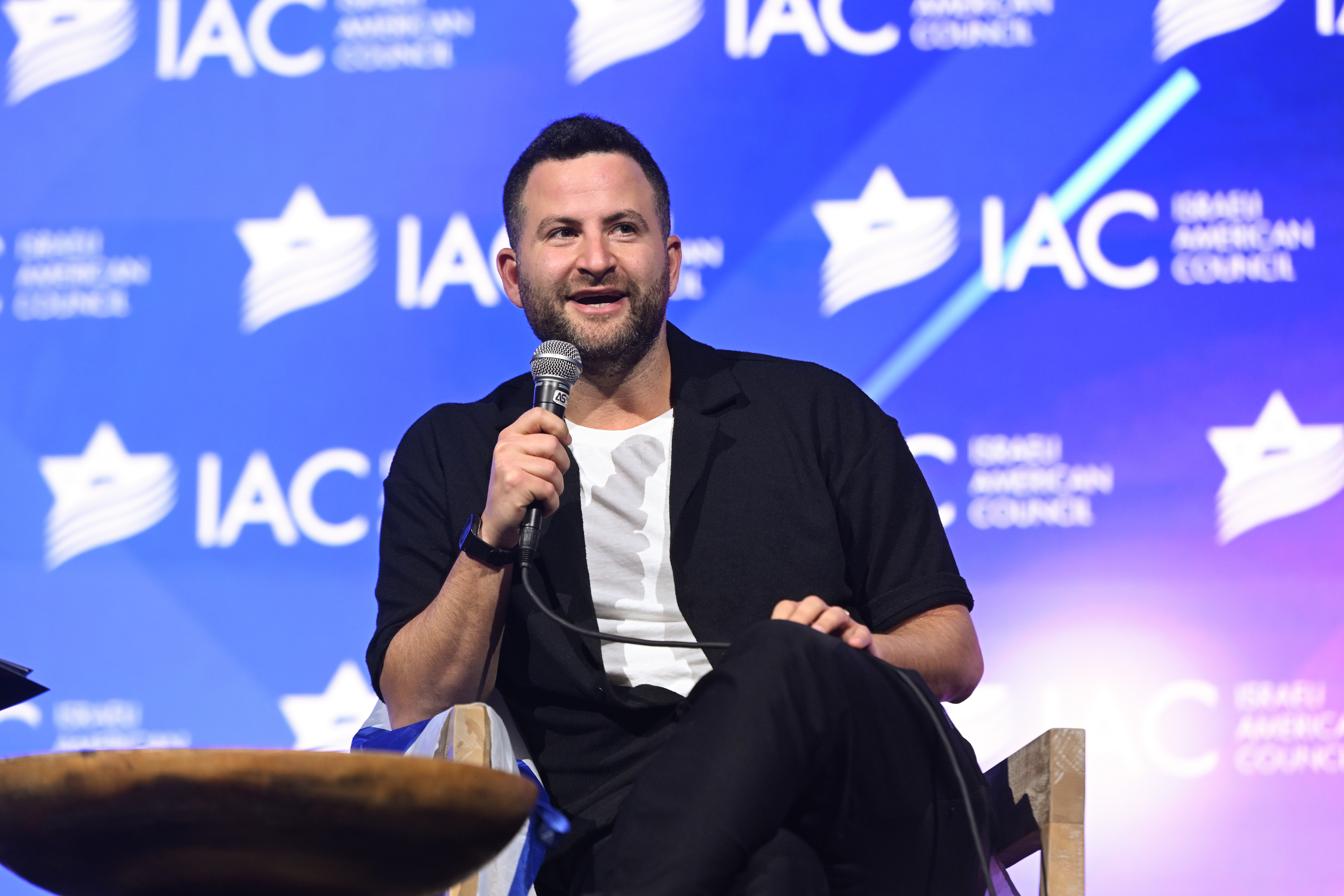
A Manhattan comedy club canceled Israeli comedian Guy Hochman’s show on Tuesday night after pro-Hamas groups protested outside of the venue. “The owner of the place was afraid and canceled the show,” Hochman told Jewish Insider’s Haley Cohen, referring to Broadway Comedy Club, located near Times Square. “So, I did an alternative show for my audience outside freezing to death.”
What happened: City College of New York’s Students for Justice in Palestine chapter was among the groups promoting the Tuesday demonstration on social media. It shared a post from the New York City chapter of the Palestinian Youth Movement that said “victory” was achieved by the cancellation. Outside the comedy venue, masked demonstrators banged on drums, chanted and held signs that read “clean up the trash,” “death to the IDF” and “no war criminals in our city.” A heavy NYPD presence was called to monitor the protest.
Worthy Reads
Saudi Turns on the Hate Spigot: In his Substack “It’s Noon in Israel,” Amit Segal posits that efforts to normalize relations between Israel and Saudi Arabia are dead. “Over the past month, Al Arabiya has been worse than Al Jazeera in the texts broadcast against any normalization with Israel. Saudi podcasters who specialize in luxury cars or sports are suddenly cursing Zionism and the Abraham Accords. … Now, with the Saudis no longer celebrating the Abraham Accords, they are trying to undermine their foundations of support, from Morocco to the Emirates. Someone I spoke with this week used an Arab proverb to explain it: ‘He who cannot reach the grapes says they are sour.’ I suggested an Israeli version, straight from air-defense battle lore: ‘If I don’t fly, nobody flies.'” [ItsNooninIsrael]
Hanging the Protesters Out to Dry: In The Wall Street Journal, William Galston criticizes President Donald Trump’s decision not to assist Iranian anti-regime protesters. “Considering the information Mr. Trump received during the administration’s deliberations, his decision to stand down may well have been correct. Still, he shouldn’t have sent encouraging messages to the protesters if he wasn’t committed to backing them up. Because he did so, the president bears a measure of responsibility for the consequences. … Even if he decides against military action, he has a robust menu of nonmilitary options that could significantly weaken the regime. As my Brookings Institution colleague Suzanne Maloney has proposed, he can target key command-and-control systems to weaken the Islamic Revolutionary Guard Corps and other security forces, seize Iran’s ghost fleet of oil tankers, and impose sanctions on Chinese imports of Iranian oil. He can also fully restore the Voice of America’s Iran Service, press our friends and allies to expel Iran’s diplomats, and help strengthen Iran’s divided opposition groups.” [WSJ]
Blazing a Trail, Quietly: The Athletic’s Jason Quick profiles Portland Trail Blazers forward Deni Avdija, the Israeli basketball phenom who got his start playing for Maccabi Tel Aviv and is having his best season as a pro. “He doesn’t feel pressure to add his voice to the dialogue surrounding his country’s conflict in the Middle East and, in fact, feels irritated when he is put in the middle of it. … He said he understands that he has a larger platform than most to deliver his viewpoint, but he said he doesn’t think that requires him to broadcast his opinion or politicize it. ‘I’ll be honest: What do people expect me to do?’ Avdija said. ‘This is my country, where I was born, where I grew up. I love my country; there are a lot of great things about my country. But obviously, not everyone is educated and knows what is going on, and that’s what pisses me off. Because if you are educated and know what is going on, it’s fine to say what you think and say who you think is right or wrong. But if you are not educated and you are not part of the Middle East, and you don’t understand how long this goes back and understand the consequences and everything … just don’t say anything.’” [TheAthletic]
Copying Caracas: The Economist looks at the continued tensions inside Iran following the regime’s crackdown on the widescale protests that swept the country in recent weeks. “Much of this internal criticism focuses on the 86-year-old Mr Khamenei, who has ruled for 36 increasingly despotic years. Critics complain about his intransigence in nuclear talks with America: by insisting on a token enrichment programme, they argue, he squandered a deal in 2025 that could have lifted sanctions altogether. Some go further. At least one cleric behind the manifesto called for him to stand trial for the state’s slaughter, according to another signatory. ‘We expect the supreme leader to exit within the next three to 12 months,’ says an investor still operating in Iran, citing both Mr Khamenei’s age and unpopularity. Others wistfully seek Mr Trump’s intervention. ‘We used to worry we’d become Venezuela,’ runs a joke in cafés frequented by civil servants. ‘Now we worry we won’t.'” [TheEconomist]
Word on the Street
Organizers of the World Economic Forum are mulling moving the annual gathering to another venue, with interim Co-Chair Larry Fink arguing that the WEF should “start doing something new: showing up — and listening — in the places where the modern world is actually built”; among the places he suggested were Detroit and Dublin…
Fink and Bank of America President and CEO Brian Moynihan were spotted this week at the World Economic Forum in Davos, Switzerland, wearing the blue square pins popularized by Robert Kraft’s foundation that have become a symbol in the fight against antisemitism, Jewish Insider’s Haley Cohen reports…
Commerce Secretary Howard Lutnick was heckled at a WEF dinner last night, with European Central Bank President Christine Lagarde walking out during his speech…
The U.S. Air Force confirmed that the Qatari jet being gifted to President Donald Trump for use as Air Force One will be delivered by this summer…
The Treasury Department announced sanctions on six Gaza-based medical organizations the government said had ties to Hamas’ al-Qassam Brigades, as well as the Popular Conference for Palestinians Abroad, which the department said was “clandestinely controlled” by Hamas and had supported numerous flotillas attempting to reach Gaza; in November, Reps. Andy Barr (R-KY) and Jefferson Shreve (R-IN) sent a letter to the Treasury Department calling for the designation of the PCPA as a Specially Designated Terrorist group…
The House Foreign Affairs Committee voted 45-2 to advance legislation expanding U.S. cooperation programs in the Eastern Mediterranean; Reps. Joaquin Castro (D-TX) and Pramila Jayapal (D-WA) voted against the bill, with Castro citing concerns that U.S.-Israel scientific grant programs cited in the bill may provide funding for programs in the West Bank and East Jerusalem…
Former U.S. Ambassador to Japan Rahm Emanuel, who is mulling a 2028 presidential bid, weighed in on Pennsylvania Gov. Josh Shapiro’s recent revelation that the Harris presidential campaign had asked if he was an Israeli government agent, calling the questions “totally appropriate and totally inappropriate”…
A judge in New York ordered a newly drawn congressional map, determining that the state’s 11th Congressional District — the only New York City district represented by a Republican — had been drawn unconstitutionally…
The New York Times spotlights the relationship between New York City Mayor Zohran Mamdani and NYPD Commissioner Jessica Tisch, who hold differing views on policing and politics, as they work together in Mamdani’s first weeks in office…
The Mississippi state Senate unanimously approved a resolution in support of Jackson’s Beth Israel Congregation, a week and a half after Stephen Spencer Pittman allegedly set fire to the synagogue, which housed the state’s largest Jewish congregation; Pittman pleaded not guilty earlier this week to a federal charge of arson…
The NYPD is investigating an incident in which more than 50 swastikas were graffitied on a playground in Gravesend Park, Brooklyn…
The New York Times reports from the Los Angeles premiere of “Mel Brooks: The 99 Year Old Man!,” a two-part documentary about the legendary comedian and filmmaker…
Israel is moving toward the privatization of Israel Aerospace Industries and considering the sale of stakes in Rafael Advanced Defense Systems in an effort to offset the last two years of massive defense spending…
Three journalists, including contributors to CBS News and Agence France-Press, were killed in an Israeli strike in Gaza…
A report from the Israeli Justice Ministry’s Public Defender’s Office found that some Palestinian detainees in Israeli jails have faced “conditions unfit for human beings,” citing instances of food deprivation, medical neglect and violence…
Nitzan Chen is departing Israel’s Government Press Office after nearly 14 years as its director…
Eliezer “Geizi” Tzafrir, a former Mossad and Shin Bet senior official who oversaw the Mossad’s Tehran station during the 1979 fall of the shah, died at 92…
Legal historian Barbara Aronstein Black, who became the first woman to lead an Ivy League law school when she was named the head of Columbia Law School in 1986, died at 92…
Rifaat al-Assad, who was known as the “butcher of Hama” for his role in quelling an uprising to overthrow his brother, former Syrian President Hafez al-Assad, died at 88…
Pic of the Day

Israeli President Issac Herzog met with his Somalilander counterpart, Abdirahman Mohamed Abdullahi, at a dinner on Wednesday night on the sidelines of the World Economic Forum in Davos, Switzerland.
Birthdays

Jewish hockey player, he was a first-round pick of the New York Islanders in 2014, Josh Ho-Sang turns 30…
Nobel Prize laureate in chemistry in 2000, he is a professor emeritus at the University of California, Santa Barbara, Alan J. Heeger turns 90… Los Angeles resident, Ruth Lynn Kopelove Sobel… Managing director and founder of Brave Warrior Advisors, he is the son of Hall of Fame baseball star Hank Greenberg, Glenn H. Greenberg… Rabbi and leader who has served in New York, New Jersey and California, Mark Samuel Hurvitz… Brooklyn-born conductor, who during his tenure as artistic director of the Kraków Philharmonic became friends with Pope John Paul II for whom he later conducted multiple Papal concerts, Gilbert Levine turns 78… Senior political law counsel and consultant at Akin Gump, Kenneth A. Gross turns 75… Founder and executive director of the Brooklyn-based Bridge Multicultural and Advocacy Project, Mark Meyer Appel… Publisher at Chicago Public Square, Charlie Meyerson… Financial services attorney, Lisa Arlyn Lowe… Former director-general of the Israeli Defense Ministry, he is a retired major general in the IDF, Ehud “Udi” Adam turns 68… Member of the Knesset for Likud, Katrin “Keti” Shitrit-Peretz turns 66… Deputy president of the Supreme Court of Israel, Noam Sohlberg turns 64… Michael S. Marquis… President of the World Jewish Restitution Organization, Gideon Taylor… American-Israeli composer, pianist and music producer, Roy Zu-Arets turns 57… Actor best known for his role as Harvey Specter on the USA Network series “Suits,” Gabriel Macht turns 54… Play-by-play broadcaster for the Washington Commanders of the NFL, Bram Weinstein turns 53… Rabbi at the Midway Jewish Center in Syosset, N.Y., Joel Mark Levenson… Director of the Chabad House in Kathmandu, Nepal, Rabbi Yechezkel “Chezki” Lifshitz… Columnist for Ami Magazine, Yochonon Donn… CEO of Our Generation Speaks, Heidi Rosbe… Managing director at SKDKnickerbocker, Kendra Barkoff Lamy… Congress executive producer at Politico, Zachary Warmbrodt… Music composer and winner of two Academy Awards and two Grammys, Justin Hurwitz turns 41… Head of U.S. at Blue Laurel Advisors and of counsel at Grossman Young & Hammond, Mark Donig… NYC-based managing director at Politico, Jesse Shapiro… Business reporter for The Washington Post, she is also a professional balloon twister and was a 2018 contestant on “Jeopardy!,” Julie Zauzmer Weil… Israeli singer known as Netta, she was the winner of the 2018 Eurovision Song Contest in Lisbon, Portugal, Netta Barzilai turns 33… Actress, best known for her role as Nicky Reagan-Boyle in the CBS series “Blue Bloods,” Sami Gayle Klitzman turns 30… Associate in the Chicago office of Applegate & Thorne-Thomsen, Matthew Lustbader…
The Scranton mayor is championing her support for Israel as she challenges GOP Rep. Rob Bresnahan

Jason Ardan/The Citizens' Voice via Getty Images
From left: Scranton Mayor Paige Cognetti, Scranton Tomorrow CEO Leslie Collins, and Pa. Gov. Josh Shapiro chat while walking through dowtown Scranton on Friday, December 13, 2024.
Paige Cognetti, the Democratic mayor of Scranton, Pa., is staking out a pro-Israel platform as she seeks to unseat freshman Rep. Rob Bresnahan (R-PA) in a northeast Pennsylvania swing district, emphasizing her support for continued military aid to the Jewish state in the wake of its war against Hamas in Gaza.
In a recent interview with Jewish Insider, Cognetti, who is favored to win the Democratic nomination in Pennsylvania’s 8th Congressional District, said “the Israel question,” as she called it, is “very simple” for her.
“I vehemently support Israel’s right to defend itself,” she explained, “and would take extremely seriously Congress’ role in ensuring they have the military aid that they need to defend themselves in a really dangerous neighborhood.”
To underscore her point, Cognetti, who was sworn into her third term as Scranton’s mayor earlier this month, touted a local munitions plant that she said continues to produce “the shells that we use for our own defense, but also that we ship to our allies, like Ukraine and Israel.”
“We’re very proud of that,” she said. “It’s really important to us in northeastern Pennsylvania that we defend ourselves, defend our military personnel at home and abroad. We’re very, very specific and deliberate about how we celebrate our veterans, and we feel the same way about supporting our allies.”
Even as some Democratic candidates have turned away from embracing such positions amid growing chilliness toward Israel within the party, Cognetti, for her part, said she did not feel compelled to join their ranks. “I understand that there has been a lot of rhetoric in the last couple of years — and a lot of folks that feel one way or the other,” she observed.
“But there has never been a question, to me, about what the U.S.’ role in supporting Israel should be,” she said, adding that she “will continue to support Israel as a member of Congress.”
In addition to calling for reauthorization of the current 10-year memorandum of understanding between Israel and the United States that is set to expire in 2028, Cognetti also stressed her support for ensuring humanitarian aid “gets to the people who need it” and backed a “diplomatic, two-state solution” to the conflict, which she acknowledged would be a “complicated and hard-fought” effort.
In her primary campaign to challenge Bresnahan, a first-term incumbent endorsed by AIPAC, Cognetti, 45, is seen by Democratic Party officials as well-positioned to win back the seat held by former Rep. Matt Cartwright (D-PA), who fell last cycle after six consecutive terms in one of two upsets in the state that helped Republicans maintain their increasingly narrow House majority.
Now, the Democratic Congressional Campaign Committee is eyeing the district as one of four possible pickup opportunities in the state, while targeting Bresnahan, 35, as “the poster-child of Washington corruption” due to scrutiny over his multiple stock trades as a congressman, despite a campaign vow to ban the practice among elected officials.
Speaking with JI last week, Cognetti reiterated those accusations, saying Bresnahan was “clearly profiting off of his votes,” and boasting of her own record “delivering results and putting an end to the corrupt machine politics that we’re far too familiar with here in northeastern Pennsylvania.”
Bresnahan’s campaign, for its part, has dismissed Cognetti as a “far-left extremist” who is in favor of open borders and defunding the police. But he may struggle to land those hits as Cognetti casts herself in a moderate light, particularly on sensitive issues relating to Israel and rising antisemitism on the left and right.
Cognetti, who launched her bid last September, has since raised more than $1.1 million, garnering over $640,000 in donations last quarter, her campaign recently announced. Cognetti is widely expected to prevail in the May primary, where she is facing Francis McHale, a retired state official. She has also reportedly claimed support from Pennsylvania Gov. Josh Shapiro, a moderate pro-Israel Democrat.
Larry Ceisler, a public affairs executive based in Pennsylvania who is supporting Cognetti’s House bid, called the mayor a “top-tier candidate” with a “great profile” for the swing district. “At one time, I thought Matt Cartwright was a unique candidate to hold that seat, but Paige has really come on over the last several months,” he told JI, noting that she “will have the resources she needs to win.”
“The fact is Matt Cartwright lost because he was hampered at the top of the ticket,” Ceisler added. “Paige will have the opposite as Josh Shapiro has proven to have coattails and Paige is positioned to take advantage of them.”
Cognetti, the first woman mayor of Scranton, was elected in 2019 when she ran as an independent and defeated a crowded field in what was then viewed as a rebuke of the local Democratic machine.
During her tenure, Cognetti has spoken up in support of Israel after Hamas’ Oct. 7, 2023, terror attacks and sought to raise awareness about the rise of antisemitism on both sides of the aisle. “There is some really, really dangerous rhetoric, and we need to call that out,” she said, characterizing anti-Jewish prejudice as antithetical to “core American values.”
“Of course, here in Pennsylvania, we have a fresh and really horrific example of antisemitism with the arson attack on Gov. Shapiro’s home and his family just last year,” she told JI. If elected, she added, she hopes to be “part of a coalition that raises the issue of antisemitism and passes any legislation necessary to make sure” the subject “remains in the forefront of people’s minds.”
Cognetti, who has never visited Israel, said she had signed up for a trip that was canceled in the wake of the Oct. 7 attacks but is “looking forward to getting there at some point.”
As she mounts her campaign, Cognetti said she is building “a broad coalition across the district” and describes forming “solid relationships” with Jewish community leaders as well as productive talks with “different groups that are focused on Israel.”
Democratic Majority for Israel’s political arm, which has not announced an endorsement in the race, “has had positive conversations with” Cognetti and is “keeping a close eye” on the primary, a source familiar with the matter told JI.
Despite internal divisions over Israel now roiling the Democratic Party, Cognetti argued that “some people have let themselves kind of get away from that simple answer, which is, Israel is surrounded by people who do not believe they should exist.”
“The United States,” she vowed, “has been and will continue to be its most staunch ally.”
Moran, a former longtime congressman now lobbying for Qatar, has an extensive record of using antisemitic tropes and hostility to Israel

ASUYOSHI CHIBA/AFP via Getty Images
Former Rep. Jim Moran (D-VA) speaks at a rally attended by supporters of Sudan's ruling Transitional Military Council (TMC) in the village of Abraq, about 60 kilometers northwest of Khartoum, on June 23, 2019.
Days after assuming office, Virginia Gov. Abigail Spanberger is facing scrutiny from Jewish leaders over her decision to appoint Jim Moran, a former congressman representing northern Virginia now working as a lobbyist for clients including Qatar, to the George Mason University board of visitors, despite his extensive record of using antisemitic tropes and hostility to Israel.
The appointment, which Spanberger announced on Saturday hours after she had been sworn into office, came as part of a broader leadership shake-up of the state’s three public universities — as the Democratic governor seeks to assert her influence in the wake of a Republican administration whose university board oversight she had criticized during the campaign as politically meddlesome.
But her nomination of Moran, whose incendiary rhetoric has long been a subject of controversy, is raising questions about her approach to countering anti-Jewish harassment at public universities such as George Mason, which last July was the subject of a federal Title VI investigation related to its handling of several high-profile incidents of antisemitism and anti-Israel extremism.
Moran, a Democrat who retired from Congress in 2015, faced widespread criticism as well as calls for his resignation over comments in 2003 in which he blamed the Jewish community for pushing the U.S. into war with Iraq, a remark he reiterated four years later while singling out the pro-Israel group AIPAC.
Even as he has voiced regret for some of his past remarks, Moran, who is now 80, has downplayed accusations of antisemitism and has continued to echo such rhetoric in recent years while appearing on panel discussions with a London-based NGO led by a former Hamas activist. In one virtual event in 2023, for example, Moran attributed Washington’s support for “apartheid” in Gaza to Jewish control of American politics.
“It’s about domestic politics and it always has been,” Moran insisted. “The majority of people who contribute to the Democratic Party in America have Jewish surnames. Now think about that,” he added, arguing that their “principal reason for contributing has been the sine qua non of support for Israel, and unqualified support for Israel.”
Moran’s recent lobbying for the Qatari government, meanwhile, has likewise drawn attention as the Gulf state has increasingly sought to burnish its image in the United States through funding higher education and ongoing outreach to federal lawmakers, among other efforts.
His work has included “outreach on Qatar’s higher education funding,” according to recent disclosures, pointing to possible conflicts of interest in his board appointment. Qatar, a major non-NATO U.S. ally that has frequently drawn criticism for hosting Hamas, has donated $5.9 million to George Mason.
Jewish leaders voiced befuddlement over the controversial appointment.
Cookie Hymer Blitz, a Jewish and Democratic activist in Northern Virginia, called Moran’s nomination “very concerning, disappointing and surprising.”
“His long history of anti-Israel bias and antisemitic comments seem to make his appointment to this board ill-advised at best,” she told Jewish Insider.
Another prominent Jewish leader, who spoke on condition of anonymity to avoid antagonizing Spanberger, told JI: “It is concerning to hear of anyone who has shared, or continues to share, antisemitic tropes or messages being appointed to leadership roles. I imagine the vast majority of Virginians would take pause.”
The local organized Jewish community is currently weighing a response to Spanberger’s decision in order to help raise awareness about Moran’s views as he prepares to seek confirmation from the state legislature, where he could face questions about his rhetoric and lobbying, according to a Jewish leader involved in government outreach.
Spanberger’s office did not respond to a request for comment from JI on Wednesday regarding the new appointment.
In an email to JI on Wednesday, Moran said that “Qatar has asked only three things of me but they’re a prerequisite for representing them: 1) always tell the truth, 2) always obey U.S. law and 3) always do what you feel is right.”
George Mason University, he added, “is committed to maintaining a diverse student body where every student feels secure and valued, and it aspires to provide the highest possible quality of educational experience.”
As for his opposition to Israel, he called himself “a longtime supporter of Israel’s Labor Party, although it’s a mere shadow of its former self.” He said he had “shared many meals with” former Israeli Prime Minister Shimon Peres and was “confident” that his “views on Israel today specifically and the Middle East in general are wholly consistent with Shimon’s worldview.”
He did not address his past antisemitic rhetoric, only saying that, “for what it’s worth, I’m a subscriber to the Jewish Insider.”
During the gubernatorial election, Spanberger touted her efforts to combat anti-Jewish prejudice as a former congresswoman and said that working to confront antisemitism in higher education would be “a top priority” for her. “My administration will not tolerate antisemitism in any form,” she vowed.
But Kenneth Marcus, a leading expert on antisemitism and the founder and chairman of the Louis D. Brandeis Center for Human Rights Under Law, questioned Spanberger’s commitment to such pledges as she now moves to elevate Moran to a key role in Virginia’s public university system.
Marcus, whose appointment by former Gov. Glenn Youngkin to George Mason’s board of advisors was rejected by Democratic lawmakers last year, called the nomination “hardly an auspicious start for Gov. Spanberger.”
“Given the lengthy trail of antisemitism accusations that Mr. Moran has faced for a long period of years,” Marcus told JI, “it is surprising that Gov. Spanberger has tapped him for leadership at an institution where so many questions have arisen about antisemitism.”
Plus, Pritzker defends Harris amid Shapiro antisemitism allegations

Harun Ozalp/Anadolu via Getty Images
President Donald Trump delivers a speech during the World Economic Forum Annual Meeting in Davos, Switzerland, on January 21, 2026.
Good Wednesday afternoon!
This P.M. edition is reserved for our premium subscribers — offering a forward-focused read on what we’re tracking now and what’s coming next.
It’s me again — Danielle Cohen-Kanik, U.S. editor at Jewish Insider and curator, along with assists from my colleagues, of the Daily Overtime. Please don’t hesitate to share your thoughts and feedback by replying to this email.
📡On Our Radar
Notable developments and interesting tidbits we’re tracking
President Donald Trump took center stage at the World Economic Forum in Davos, Switzerland, this morning, and while headlines were dominated by his proclamations of the U.S.’ intent to acquire Greenland (and subsequent announcement that he and the NATO secretary general are coming to an agreement on the issue), Trump also issued a stark warning to Hamas in his remarks, Jewish Insider’s Matthew Shea reports.
“Hamas has agreed to give up their weapons,” Trump told a packed room of attendees. “If they don’t do it, they’ll be blown away very quickly.”
The president has made similar statements since the adoption of the ceasefire in October, though he laid out a more concrete timeline for his expectation of disarmament: “They’ve got to do it, and we’re going to know over the next two or three days, certainly over the next two or three weeks, whether or not they’re going to do it,” said Trump…
Ahead of the signing ceremony for the Board of Peace that Trump is hosting in Davos tomorrow, the foreign ministers of Saudi Arabia, Turkey, Egypt, Jordan, Indonesia, Pakistan, Qatar and the UAE issued a joint statement accepting his invitation to join.
White House Special Envoy Steve Witkoff told Bloomberg News “20 or 25 leaders have already said yes” to attend the signing ceremony, despite other world leaders already having departed from Switzerland. “Everyone wants to be a part of this,” he said…
On the sidelines of the confab, Trump spoke with CNBC about U.S. relations with Iran amid heightened tensions and American military assets moving into the Gulf. “We hope there’s not going to be further [military] action, but they’re shooting people indiscriminately in the streets,” Trump said of the Iranian regime.
Asked by host Joe Kernen, “Should we stay tuned in Iran?” Trump was noncommittal: “I guess — I mean, look, it’s a rough place,” he said. But he added that if Iran continues to try to acquire nuclear capabilities, strikes like those the U.S. and Israel carried out in June are “going to happen again.”
Witkoff similarly told Bloomberg, “Iran needs to change its ways, they need to do that. And if they do, if they indicate they’re willing to do that, I think we can diplomatically settle this.” Asked if he has the sense that Iran wants to take the diplomatic path, Witkoff said, “We don’t have that sense yet”…
The Treasury Department issued sanctions today against six “Gaza-based organizations that claim to provide medical care to Palestinian civilians but in fact support the military wing of Hamas, the Izz al-Din al-Qassam Brigades,” the department said. “The fraudulent nature of these organizations, which use deception to raise funds from international donors, demonstrates Hamas’s perfidy and deprives innocent civilians of the medical care they need.”
The department also designated the Popular Conference for Palestinians Abroad as a terror group, a move that lawmakers have pushed, for “not only work[ing] with, and in support of, Hamas — it operates at Hamas’s behest.” The group, which claims to be a Palestinian advocacy organization, was designated as such by Israel in 2021 and was alleged to have organized recent anti-Israel flotillas…
Meanwhile in the Big Apple, divisions between New York City Mayor Zohran Mamdani and Comptroller Mark Levine over their positions on Israel surfaced, as Mamdani pushed back on Levine’s recent statements that he remains committed to resuming the city’s investment in Israel Bonds.
“I’ve made clear my position, which is that I don’t think that we should purchase Israel Bonds. We don’t purchase bonds for any other sovereign nation’s debt. The comptroller has also made his position clear, and I continue to stand by mine,” Mamdani said at a press conference today…
While he is distancing himself from Levine, Mamdani is presenting a united front with NYPD Commissioner Jessica Tisch, The New York Times writes, as the two navigate their differences on policing, Israel and other issues…
Mamdani also said today that he was “sickened” by antisemitic vandalism found in Borough Park, which saw many swastikas painted around the predominantly Orthodox Jewish neighborhood. “I stand shoulder to shoulder with the Jewish New Yorkers who were targeted. My administration is working closely with the NYPD’s Hate Crimes Task Force as well as our Parks Department, and those responsible will be investigated and held accountable,” he said in a statement…
Not 24 hours earlier, a Manhattan comedy club canceled Israeli comedian Guy Hochman’s show last night after pro-Hamas groups protested outside of the venue, JI’s Haley Cohen reports. “The owner of the place was afraid and canceled the show,” Hochman told JI, referring to Broadway Comedy Club, located near Times Square. “So, I did an alternative show for my audience outside freezing to death”…
Some of the candidates competing for retiring Rep. Jerry Nadler’s (D-NY) seat in New York’s 12th Congressional District provided insight into their positions on Israel in a candidate questionnaire to receive the endorsement of the Working Families Party, Politico reports.
Kennedy heir Jack Schlossberg and state Assemblymembers Alex Bores and Micah Lasher all said they would not support a resolution sponsored by Rep. Rashida Tlaib (D-MI) calling Israel’s actions in Gaza a genocide; Bores and Lasher said they would not support the “Block the Bombs Act” placing sweeping restrictions on U.S. aid to Israel, while Schlossberg said he’s unsure; and Schlossberg said he would support a bill brought several years ago that sought to prohibit U.S. aid to Israel from being used for a variety of military operations, while Bores said he would not and Lasher was unsure…
After Pennsylvania Gov. Josh Shapiro alleged that Vice President Kamala Harris’ team asked if he had ever been an Israeli agent as he was being considered to be her running mate, Illinois Gov. JB Pritzker, another potential 2028 Democratic presidential contender, told reporters yesterday that he didn’t think the questions during the vetting process were inappropriate. “The questions are tough. I think you’ve got to be tough during the process,” he said.
“I mean, what’s appropriate and inappropriate in the context of getting, as one pundit calls it, ‘an MRI for your soul,’ when you’re out there in the national political arena?” Pritzker, who was also vetted by the Harris team, asked. His comments are at odds with moderate Democrats on Capitol Hill, who told JI that Shapiro’s account was “totally insane,” “problematic” and “incredibly disturbing”…
⏩ Tomorrow’s Agenda, Today
An early look at tomorrow’s storylines and schedule to keep you a step ahead
Keep an eye out in Jewish Insider for an interview with Paige Cognetti, the Democratic mayor of Scranton, Pa., seeking to flip a northeast Pennsylvania swing seat by emphasizing her pro-Israel bona fides.
President Donald Trump will hold the signing ceremony for his Board of Peace with several world leaders in Davos, Switzerland, tomorrow morning local time (around 4:30 a.m. ET).
Australia will hold a national day of mourning to honor the victims of the terror attack that took place at a Hanukkah celebration in Sydney last month, Prime Minister Anthony Albanese announced.
The Sundance Film Festival kicks off in Park City and Salt Lake City, Utah: For the cinephiles keeping track, on the docket this year is a Hebrew coming-of-age film set in the ‘80s titled “Tell Me Everything,” a documentary about three doctors providing humanitarian care in Gaza, a panel by the Jewish Institute for Television & Cinema on combating antisemitism through film and more.
Stories You May Have Missed
‘A NEW NORMAL’
J Street hopes to capitalize on growing Democratic frustration with Israel

‘There’s going to be a new normal,’ the progressive Israel advocacy group told JI, as it endorses candidates who call Israel’s actions in Gaza a genocide
MILAN 2026
Israel likely to send a bobsledding team to the Winter Olympic Games for the first time

‘It’s like the actual talented version of ‘Cool Runnings,’’ Israel bobsled team pilot AJ Edelman tells JI
Plus, Israel joins the Board of Peace

JOINT BASE ANDREWS, MARYLAND - JANUARY 16: U.S. President Donald Trump boards Air Force One on January 16, 2026 in Joint Base Andrews, Maryland. Trump is traveling to Palm Beach, Florida where he will attend a dedication ceremony to rename part of the city's Southern Boulevard before remaining at his Mar-a-Lago property throughout the holiday weekend. (Photo by Anna Moneymaker/Getty Images)
👋 Good Wednesday morning!
In today’s Daily Kickoff, we preview President Donald Trump’s address at the World Economic Forum in Davos, Switzerland, happening later today, and talk to Democrats on Capitol Hill about Pennsylvania Gov. Josh Shapiro’s allegation that the Harris presidential campaign asked him if he’d been an agent of Israel. We look at how J Street is navigating a political environment that is increasingly hostile to Israel, and spotlight Deep33 Ventures as the VC, launched this week, aims to counter China through U.S.-Israel tech collaboration. Also in today’s Daily Kickoff: Noam Bettan, Mark Carney and Rep. Mike Lawler.
Today’s Daily Kickoff was curated by Jewish Insider Executive Editor Melissa Weiss and Israel Editor Tamara Zieve, with assists from Danielle Cohen-Kanik and Marc Rod. Have a tip? Email us here.
What We’re Watching
- President Donald Trump will speak at the World Economic Forum in Davos, Switzerland, this afternoon local time after a delayed arrival resulting from an electrical issue on Air Force One that forced the initial plane to return to Joint Base Andrews after an hour in flight to be swapped out.
- We expect Trump to speak at length about the Board of Peace he is assembling, a day after the president told reporters at the White House that the body could serve as an alternative to the U.N. Earlier today, Israeli Prime Minister Benjamin Netanyahu confirmed that Israel would join the body, after previously criticizing the inclusion of Turkish Foreign Minister Hakan Fidan on the board’s executive committee.
- The president’s address will be preceded by an interview with Palestinian Authority Prime Minister Mohammad Mustafa, and followed by a session focused on the political realignment of the Middle East. Speakers in the latter session include Saudi Foreign Minister Prince Faisal bin Farhan Al Saud, U.K. Foreign Minister Yvette Cooper and International Atomic Energy Agency head Rafael Grossi.
- Later in the day, Sen. Chris Coons (D-DE) is slated to speak at the WEF about the U.S.-China relationship.
- We’re continuing to monitor the situation in the Middle East, as the U.S. deploys an aircraft carrier and fighter jets to the region. Trump issued his harshest warning yet to Iran, vowing in an interview with NewsNation last night to “wipe them off the face of this Earth” if Tehran makes an assassination attempt against him. “Anything ever happens, the whole country is going to get blown up,” Trump said.
- In Washington, the House Foreign Affairs Committee is holding its markup of the Eastern Mediterranean Gateway Act.
What You Should Know
A QUICK WORD WITH JI’S LAHAV HARKOV
When President Donald Trump first raised the idea of establishing a Board of Peace in October, it was as part of his 20-step ceasefire plan for Gaza. The board was meant to oversee a committee of Palestinian technocrats — whose composition was announced last week — and “set the framework and handle the funding for the redevelopment of Gaza … [and] call on best international standards to create modern and efficient governance that serves the people of Gaza and is conducive to attracting investment.”
The following month, the U.N. Security Council passed a resolution supporting the ceasefire plan and “welcom[ing] the establishment of the Board of Peace,” authorizing it to operate in Gaza until the end of 2027.
But the board’s charter describes a body concerned with peace worldwide, not with removing Hamas’ terror threat in Gaza, and in fact, it does not mention Hamas, Gaza or Israel at all. Its expansive, stated role is to “promote stability, restore dependable and lawful governance, and secure enduring peace in areas affected or threatened by conflict.”
Indeed, it appears to be an attempt to compete with the United Nations. Its preamble says: “Declaring that durable peace requires pragmatic judgment, common-sense solutions, and the courage to depart from approaches and institutions that have too often failed … Emphasizing the need for a more nimble and effective international peace-building body.” Asked at a press conference on Wednesday if he intends for the body to replace the U.N., Trump said it “might.” “I wish the United Nations could do more. I wish we didn’t need a Board of Peace,” he said.
QUESTION OF CONCERN
Moderate Dems alarmed by Harris team’s grilling of Shapiro over Israel ties
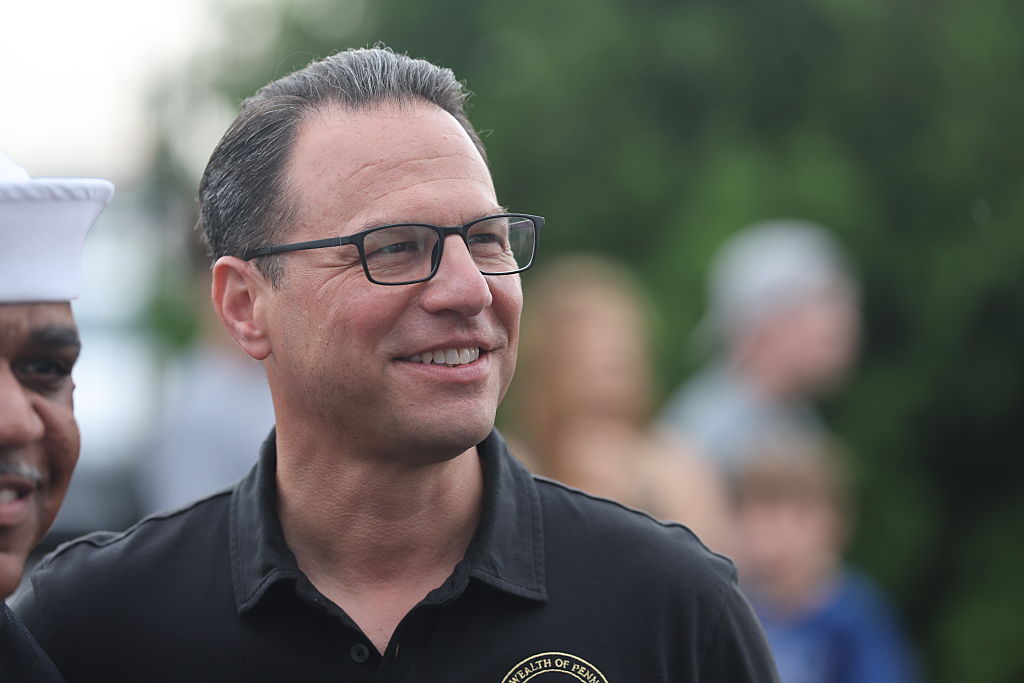
Several moderate House Democrats said they were concerned and frustrated by Pennsylvania Gov. Josh Shapiro’s account, which emerged over the weekend, of being questioned by Vice President Kamala Harris’ presidential campaign, as part of his vetting as her potential running mate, about whether he had ever been an agent of Israel. Shapiro, who volunteered on a kibbutz and briefly on an Israeli army base while in high school, also said that the campaign had pressured him to walk back condemnations of antisemitism on college campuses, and emphasized that he took offense to the scope and persistence of the questioning he faced about Israel, Jewish Insider’s Marc Rod and Emily Jacobs report.
Reactions: “Totally insane,” Rep. Jared Moskowitz (D-FL) told JI. “I don’t know how else to describe insanity. Literally insane.” Rep. Greg Landsman (D-OH) said the questioning was “concerning” and that he was “glad Josh had the courage to say what happened. Hopefully people will appreciate that you shouldn’t do that. … It’s a long-standing antisemitic trope that we’re all agents of the Israeli government, that we’re all working for this global Jewish cabal. And so that’s problematic,” Landsman, who is Jewish, continued.
Bonus: In Shapiro’s new memoir, which comes out next week, he recalls how his turbulent childhood — marked by his mother’s mental health challenges — shaped his approach to family and politics.
‘A new normal’
J Street hopes to capitalize on growing Democratic frustration with Israel

Three months after a ceasefire largely ended the fighting between Israel and Hamas in Gaza, the battle over the future of U.S.-Israel relations still rages in Washington. Both the left and the right face an erosion of support for traditionally pro-Israel positions. Amid the upheaval, the progressive Israel advocacy group J Street sees an opportunity: a chance to solidify Democrats’ shift away from unconditional support for Israel and its security needs. At the start of an election year, interviews with J Street’s top political official and its policy chief make clear that the group is eager to create space for Democrats who have taken a more critical approach to Israel, reflecting and reinforcing a shift toward greater distance in the historically close U.S.-Israel alliance, Jewish Insider’s Gabby Deutch reports.
Shifting tide: “There’s going to be a new normal,” Ilan Goldenberg, J Street’s senior vice president and chief policy officer, told JI in an interview. “There were two years of trauma that, I think, with the return of the hostages and the end of the war, people can finally start processing, but things are not going back.”
SUCCESSION RACE
Brendan Gill emphasizes support for Israel in crowded primary field to replace Sherrill

Essex County Commissioner Brendan Gill, one of the leading Democrats running for the vacant 11th Congressional District seat in New Jersey, told Jewish Insider’s Marc Rod he would be a strong supporter of Israel and the continued U.S.-Israel relationship, while also expressing concerns about the current Israeli government.
Background: Gill — a longtime New Jersey political hand who has previously worked as a staffer for or on the campaigns of Sen. Cory Booker (D-NJ), former Sen. Frank Lautenberg (D-NJ), who died in 2013, and former Reps. Steve Rothman (D-NJ) and Bill Pascrell (D-NJ) — said his time working with each of those lawmakers, all strong supporters of Israel, has served as his “North Star” for his policy toward the U.S.-Israel relationship. “I very much believe that we absolutely can respect the ability to disagree with decisions that are made by an elected government that we might not agree with, but still at the same time never waver on Israel’s right to exist, never waver on protecting the strategic partnership in that region of the world that the United States has enjoyed with the only democracy that exists, to continue to aid Israel in ways that are both important to its own protection and, by extension, the protection of our own national interests,” he said.
TAKING AIM
Mike Lawler condemns campaign ad against him as antisemitic

Rep. Mike Lawler (R-NY) condemned as antisemitic an ad running in New York’s suburban 17th Congressional District that targets him for his support for Israel and for receiving support from pro-Israel donors, Jewish Insider’s Marc Rod reports. “This ad is a disgrace,” Lawler said in a statement. “This kind of politics has no place in the Hudson Valley. I am calling on every candidate running in NY-17 to publicly and unequivocally denounce this ad immediately. Silence is an endorsement.”
What it says: The advertisement, paid for by the Institute for Middle East Understanding, attacks Lawler for supporting U.S. aid to Israel, claiming that such aid is depriving Americans of government-funded benefits programs. “Israelis enjoy universal healthcare, while Americans go bankrupt from medical bills,” the ad’s narrator states. “Lawler’s reward? Giant campaign donations from AIPAC and the pro-Netanyahu lobby.”
TEHRAN TALK
House Dems call for steps to restore communications access in Iran, but stay mum on military strikes
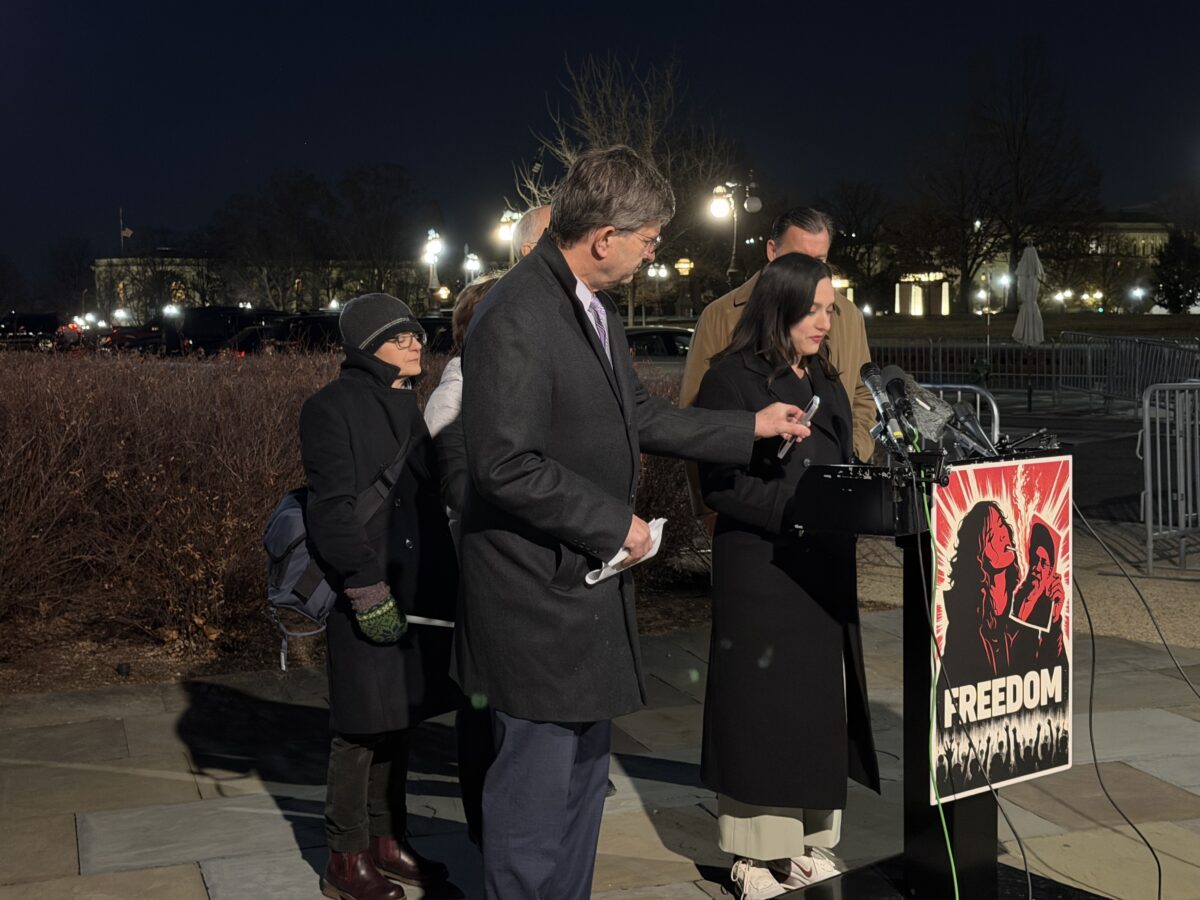
At a press conference outside the Capitol on Tuesday, House Democrats called for action by the U.S. government to ensure free internet access and telecommunications for Iranians amid a crackdown by the Iranian regime, but largely withheld comment on whether the administration should undertake military strikes on the regime in support of the protesters, as President Donald Trump has floated, Jewish Insider’s Marc Rod reports.
Reconnecting: “People cannot reach loved ones, plan and organize or reach unbiased information. They are literally being kept in the dark by their own government, and it could very well be permanent,” Rep. Yassamin Ansari (D-AZ), the daughter of Iranian immigrants and the first Iranian-American Democrat in Congress, said. “It’s why long-standing bipartisan efforts to ensure internet access in Iran cannot be left on the back burner. This access could save lives, and this is all very personal to me.” She thanked colleagues for signing on to a bipartisan resolution expressing support for the Iranian protesters and calling for steps to restore internet access.
Scoop: Reps. Josh Gottheimer (D-NJ) and Andrew Garbarino (R-NY) will reintroduce legislation on Wednesday to address the threat of killer drone strikes by the Iranian regime and other foreign adversaries through increased cooperation between the U.S. and Israel, Jewish Insider has learned.
TECH TOGETHER
Deep33 Ventures aims to counter China in U.S.-Israel tech alliance

A new deep-tech investment firm seeking to help Israeli startups fundraise and collaborate with U.S. companies emerged from stealth mode on Tuesday, announcing the launch of its $150 million fund. Called Deep33 Ventures, the firm will be led by serial entrepreneurs and investors Lior Prosor, who has invested in companies including Via Transportation, Lemonade Insurance and Carbyne, and Michael Broukhim, the co-founder of FabFitFun, who has invested in companies such as SpaceX, Stripe and Hut8, Jewish Insider’s Haley Cohen reports.
‘Allied infrastructure’: The fund, which already secured $100 million in capital commitments from its first group of investors, will focus on deep tech — which includes quantum computing, advanced energy and autonomous systems. “There isn’t a deep tech fund focused on Israel’s ecosystem. One of our biggest differentiators is the overlap of being deep tech and concentrated on Israel,” Broukhim told JI. With offices in Tel Aviv, New York and Los Angeles, the firm aims to create what it calls a U.S.-Israel “allied infrastructure corridor” combining the two countries’ technological strengths to counter China.
Worthy Reads
Pressing For Change: The Atlantic’s Arash Azizi talks to Iranians about potential U.S. military action against the Iranian government and Supreme Leader Ayatollah Ali Khamenei. “Ultimately, Iran’s next chapter will be the outcome not only of what America does or does not do but also of the interactions among regional actors, protesters, and the regime’s web of factions. How these will unfold is all but impossible to predict. But one thing is clear. Until a few years ago, millions of Iranians repeatedly voted in the country’s mostly unfree elections, hoping that regime insiders could pave a path for reform. They wouldn’t have dreamed of demanding change from American bombers or drones, or of asking the U.S. president to please kill the supreme leader for them. Khamenei’s obstinate refusal to effect any meaningful change and his bloody massacre of civilians in droves have brought Iranians to this point.” [TheAtlantic]
Government Without Jews?: In Tablet, former White House official Tevi Troy, looking at the history of Jewish participation in government since the U.S. was established, considers what that participation could look like in the future as both major political parties increasingly welcome antisemitic elements. “While the current attacks on Jews from both the left and the right are by no means unique in the context of Jewish history, they are alien to American political culture — which is what makes this moment frightening. The attempt to mainstream antisemitism on both the left and the right should be properly understood as an attack by extremists in both parties on the existing political culture and on the principles of the American founding. The American tradition is far more closely linked to the Jews and their many contributions to it than it is to the antisemites of the left or the right, whose hatred of the Jews reveals a rejection of that tradition — which they hope to reorder and replace with various European-born ideologies, from communism to fascism to theocracy, that have proven toxic to their political hosts.” [Tablet]
A Spin on Jewish Manhood: In The New York Times, Esther Zuckerman reflects on the Jewishness of the title character in director Josh Safdie’s “Marty Supreme,” a mid-century table tennis phenom whose religion is a critical component of his upbringing and shapes his decision-making as advances in the sport. “The brand of Jewish man who interests Safdie is not a model minority. The director is drawn to brash hustlers who make decisions that get themselves and the people around them into loads of trouble. And yet these characters are written with love and a deep understanding of the evolution of Jewish New York. … Marty Mauser may not achieve the greatness he longs for, but he is a representative of a generation of Jews whose dreams didn’t quite come true but who deserve recognition all the same. That’s the big-picture version of what Safdie and his cohorts are doing with ‘Marty Supreme.’ In the narrative, they dig deeper into the knotty reality of what it would have been like for a 23-year-old Jewish American man in 1952.” [NYTimes]
Word on the Street
Canadian Prime Minister Mark Carney, speaking yesterday at the World Economic Forum in Davos, Switzerland, argued in his speech to attendees that there had been “breaking of the world order, the end of a pleasant fiction and the beginning of a brutal reality where the geopolitics of the great powers is not subject to any constraint”…
Elsewhere at Davos, Sheikh Mohammed bin Abdulrahman Al Thani, Qatar’s prime minister and foreign affairs minister, said on Tuesday that President Donald Trump’s proposed Board of Peace represents the only viable path forward for Gaza, confirming that Doha has been invited to join the initiative, Jewish Insider’s Mathew Shea reports…
In a Wall Street Journal op-ed, Iranian Foreign Minister Abbas Araghchi defends Tehran’s violent crackdown on protests in the country and threatens that Iran will be “firing back with everything we have if we come under renewed attack” by the U.S.; in response, the WSJ’s editorial board, which called Araghchi the “soft face” of the regime, said the diplomat’s threat “betrays Iran’s harsh reality”…
Sen. Peter Welch (D-VT), Rep. Ro Khanna (D-CA) and more than 70 Senate and House colleagues wrote to President Donald Trump urging the U.S. to intervene to stop potential Israeli annexation of the West Bank, and to reimpose sanctions on violent settlers…
Goldman Sachs and the Qatar Investment Authority announced the expansion of their strategic partnership, with the QIA potentially committing up to $25 billion in Goldman Sachs’ asset management arm..
The Supreme Court declined to hear a case brought forth by Agudas Chasidei Chabad, a Brooklyn-based umbrella group representing the Chabad-Lubavitch movement, against Russia over the return of sacred Jewish texts that had been taken by the Nazis and are now held in Russia…
With worshippers at Beth Israel Congregation in Jackson, Miss., still reeling from a Jan. 10 arson attack that severely damaged the historic synagogue, Congress appears poised to provide $300 million for the Nonprofit Security Grant Program for 2026, a small boost from the funding provided in 2024 and 2025, Jewish Insider’s Marc Rod reports…
Miami Beach, Fla., nightclub Vendôme apologized for a now-viral incident in which far-right influencers were seen inside the venue as it played a Kanye West song praising Adolf Hitler; Vendôme said that three staff members that had been involved in the incident were no longer employed there…
Following the Buffalo Bills’ latest postseason loss, Gary Ginsberg laments in The New York Times about his hometown team’s lifelong failure to win a Super Bowl while expressing hope that revitalization efforts in the city could boost the team to a history-making championship win…
Israeli singer Noam Bettan won the season finale of popular Israeli singing competition show “Rising Star,” becoming Israel’s entrant to the 2026 Eurovision Song Contest…
Israel began demolishing the east Jerusalem headquarters of the U.N. Relief and Works Agency, following the passage of a law banning the agency, which works with Palestinians, over what Israel says is its support for terrorism and staffers’ ties to terror groups…
The Kurdish-led Syrian Democratic Forces are facing pressure from Damascus and Washington to agree to integrate into the Syrian government, days after the implementation of a ceasefire between the two…
Jacob Reses, chief of staff for Vice President JD Vance, and the Foundation for American Innovation’s Rachel Altman, got married on Sunday in Rockville, Md….
Literary agent and Holocaust survivor Georges Borchardt, who found a publisher for Elie Wiesel’s Night and represented the estates of such writers as Tennessee Williams and Hannah Arendt, died at 97…
Philadelphia attorney and community activist Daniel Segal died at 79…
Pic of the Day

Israeli Foreign Minister Gideon Sa’ar (left) and Czech Foreign Minister Petr Macinka spoke on Tuesday in Prague during an official visit by Sa’ar to the Czech Republic.
Birthdays

Actor, director and producer, he is the voice of Beast in Disney’s “Beauty and the Beast,” Robby Benson (born as Robin David Segal) turns 70…
Writer specializing in modern Judaism and women’s issues, Blu Greenberg (born Bluma Genauer) turns 90… Philanthropist, co-founder and chair emerita of the Charles and Lynn Schusterman Family Philanthropies, Lynn Schusterman… Owner of the NHL’s Boston Bruins and chairman of Delaware North, a global food service and hospitality company, Jeremy Maurice Jacobs turns 86… Literary critic, feminist, writer on cultural and social issues, Elaine Showalter (born Elaine Cottler) turns 85… Retired Israeli ambassador to Cyprus, New Zealand, Turkmenistan and Estonia, Shemi Tzur turns 81… Israeli visual artist, he taught at Jerusalem’s Bezalel Academy of Arts for 30 years, Zvi Goldstein turns 79… Attorney general of the U.S. during the Obama administration, now a senior counsel at Covington & Burling, Eric H. Holder Jr. turns 75… Past chairman of the Zionist Organization of America and chair of the real estate group at the NY/NJ law firm of Sills Cummis & Gross, Mark Levenson turns 69… CEO of UJA-Federation of New York since 2014, he will retire in June, Eric S. Goldstein turns 66… U.S. senator (R-ND), Kevin Cramer turns 65… Chairman and CEO of Norfolk, Va.-based Harbor Group International, a $21 billion real estate investment firm, Jordan E. Slone turns 64… Executive editor digital at the Washington Monthly, Matthew Cooper… Chief operating officer of OneTable, Andrea Greenblatt… Senior fellow at the USC Annenberg School, she is the former editor-in-chief of both Glamour and Self magazines, Cindi Leive turns 59… CEO at C-SPAN, Sam Feist turns 57… President and CEO of The Harry and Jeanette Weinberg Foundation, Rachel Garbow Monroe… Director, producer and screenwriter of films, best known as the producer or director of the eight films in the “Paranormal Activity” series, Oren Peli turns 56… Christian Zionist, television host and presenter of “The Watchman” sponsored by Christians United for Israel, Erick Stakelbeck turns 50… CEO at Shpait.AI, Shlomo Einhorn… Peruvian model and TV host, she represented her country in Miss Universe 2009, Karen Schwarz turns 45… D.C.-based staff writer for the Los Angeles Times, Jennifer Haberkorn… Israeli actress, screenwriter and filmmaker, Romi Aboulafia turns 42… Vice president, chief of staff and senior counsel at Children’s National Hospital, Jordan Grossman… Samuel Z. Eckstein…
Plus, Lawler calls on NY-17 opponents to denounce antisemitic ad

Kevin Dietsch/Getty Images
President Donald Trump gives a press briefing at the White House on January 20, 2026 in Washington, DC.
Good Tuesday afternoon!
This P.M. edition is reserved for our premium subscribers — offering a forward-focused read on what we’re tracking now and what’s coming next.
It’s me again — Danielle Cohen-Kanik, U.S. editor at Jewish Insider and curator, along with assists from my colleagues, of the Daily Overtime. Please don’t hesitate to share your thoughts and feedback by replying to this email.
📡On Our Radar
Notable developments and interesting tidbits we’re tracking
President Donald Trump continues to promote his Board of Peace ahead of its launch at the World Economic Forum later this week: In its charter sent to leaders around the world, the president laid out a vision for the body, which has grown into a U.N.-like institution that would mediate global conflicts and would require countries to pay $1 billion to secure a permanent seat, The Wall Street Journal reports.
Asked at a press conference this afternoon if he intends for the body to replace the U.N., Trump said it “might.” “Wish the United Nations could do more, wish we didn’t need a Board of Peace,” he said.
More than 10 countries have reportedly signed on to join the board, whose charter does not mention Gaza, including the UAE and Hungary. But its expanded mandate has made other countries wary: When told France does not intend to accept the invitation to join, Trump threatened to put a 200% tariff on French wines and Champagnes…
At the WEF in Davos, Switzerland, Treasury Secretary Scott Bessent credited the U.S.’ “maximum pressure” sanctions on Iran for the protest movement that wracked the country in recent weeks. “It’s worked because in December, their economy collapsed. … They are not able to get imports, and this is why the people took to the streets. … This is economic statecraft, no shots fired, and things are moving in a very positive way here,” Bessent said…
Asked about the remaining potential for U.S. military action in Iran over its violent crackdown on the protests, Trump said at this afternoon’s press conference, “I can’t tell you what’s going to happen in the future” and once again praised the regime for not proceeding with its plans to hang 837 protesters. “We’re just going to have to see what happens,” Trump said…
Israeli authorities began demolishing the compound that previously housed the U.N. Relief and Works Agency in Jerusalem, a year after Israel passed a law banning UNRWA from operating in the country over the involvement of its employees in terror activities, including the Oct. 7 attacks.
The Israeli Foreign Ministry denied U.N. claims that the compound has diplomatic immunity, saying in a statement, “Even prior to the passage of legislation in January 2025, UNRWA had already ceased its operations at this site and no longer had any UN personnel or UN activity there. The compound does not enjoy any immunity and the seizure of this compound by Israeli authorities was carried out in accordance with both Israeli and international law”…
Several European countries have not sent their representatives back to the U.S.-led Civil-Military Coordination Center in southern Israel after the holidays, Reuters reports, as the countries, including Germany, France and Britain, consider the value of engaging with the body that diplomats called “directionless” and a “disaster”…
In campaign news, Rep. Mike Lawler (R-NY) condemned as antisemitic an ad running in New York’s suburban 17th Congressional District that targets him for his support for Israel and for receiving backing from pro-Israel donors, Jewish Insider’s Marc Rod reports.
“This ad is a disgrace,” Lawler said in a statement. “This kind of politics has no place in the Hudson Valley. I am calling on every candidate running in NY-17 to publicly and unequivocally denounce this ad immediately. Silence is an endorsement.”
The ad, paid for by the anti-Israel Institute for Middle East Understanding, states in part, “Israelis enjoy universal healthcare, while Americans go bankrupt from medical bills. Lawler’s reward? Giant campaign donations from AIPAC and the pro-Netanyahu lobby.” The 17th District, one of Democrats’ top targets in November, has a sizable Jewish population and many pro-Israel swing voters, which have been key to Lawler’s past victories…
The Senate Leadership Fund, a super PAC with ties to Senate GOP leadership and one of the largest independent spenders in Senate races, announced an initial investment of $42 million to back Sen. Susan Collins (R-ME) in Maine. It’s the super PAC’s largest spend ever in the state, which will be rolled out in August, as Collins enters a general election likely facing either Gov. Janet Mills or oyster farmer Graham Platner…
Rep. Julia Letlow (R-LA) launched her bid to challenge Sen. Bill Cassidy (R-LA) this morning, days after Trump endorsed her on social media. Cassidy, who already has several primary challengers, drew the ire of the president when he voted to convict during his 2021 impeachment proceedings, though Cassidy had told other senators privately that he believed Trump would stay out of the race…
The University of Pennsylvania, which is being sued by the Trump administration over its alleged failure to comply with subpoenas related to an investigation into antisemitism at the Ivy League school, is fighting back against the administration’s request for records about Jewish employees, calling it “disconcerting” and an “extraordinary and unconstitutional demand.”
The Equal Employment Opportunity Commission had reportedly sought information about university employees who submitted complaints about antisemitic discrimination and those who were members of Jewish campus groups; Penn said in its filing that the EEOC is “entirely disregarding the frightening and well-documented history of governmental entities that undertook efforts to identify and assemble information regarding persons of Jewish ancestry”…
⏩ Tomorrow’s Agenda, Today
An early look at tomorrow’s storylines and schedule to keep you a step ahead
Keep an eye out in Jewish Insider for a deep dive into J Street’s embrace of Democrats seeking to create distance between the U.S. and Israel.
The World Economic Forum continues in Davos, where President Donald Trump will give an address at 8:30 a.m. ET. Also appearing onstage tomorrow are Palestinian Authority Prime Minister Mohammad Mustafa; Egyptian President Abdel Fattah El-Sisi; governors Gretchen Whitmer of Michigan, Andy Beshear of Kentucky and Kevin Sitt of Oklahoma; Saudi Foreign Affairs Minister Prince Faisal bin Farhan Al Saud; Rafael Grossi, director-general of the International Atomic Energy Agency; Nvidia CEO Jensen Huang; JPMorgan Chase CEO Jamie Dimon; and David Sacks, the White House AI and crypto czar.
Mark your calendars: AIPAC will host its Congressional Summit from Feb. 22-24, with a potential appearance by Israeli Prime Minister Benjamin Netanyahu, a Jewish communal source confirmed to JI.
Stories You May Have Missed
RESILIENCE OVER RUINS
Mississippi’s Jewish community rallies after antisemitic arson
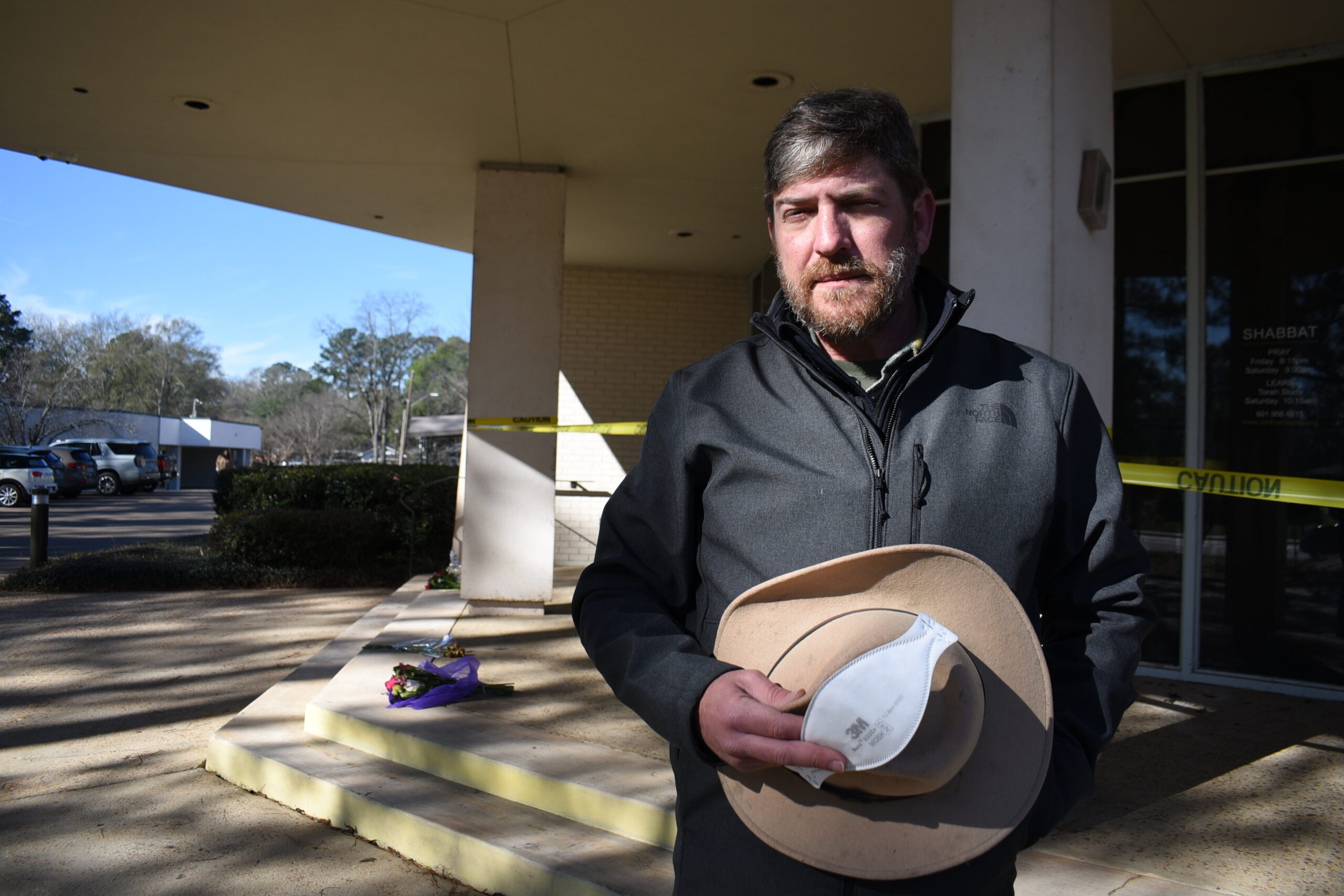
Beth Israel Congregation in Jackson has received support from churches and Jews all over the country, and has seen a revival of interest in membership
DOCTOR’S ORDERS
Amy Acton became a household name in Ohio — now, she wants to be governor
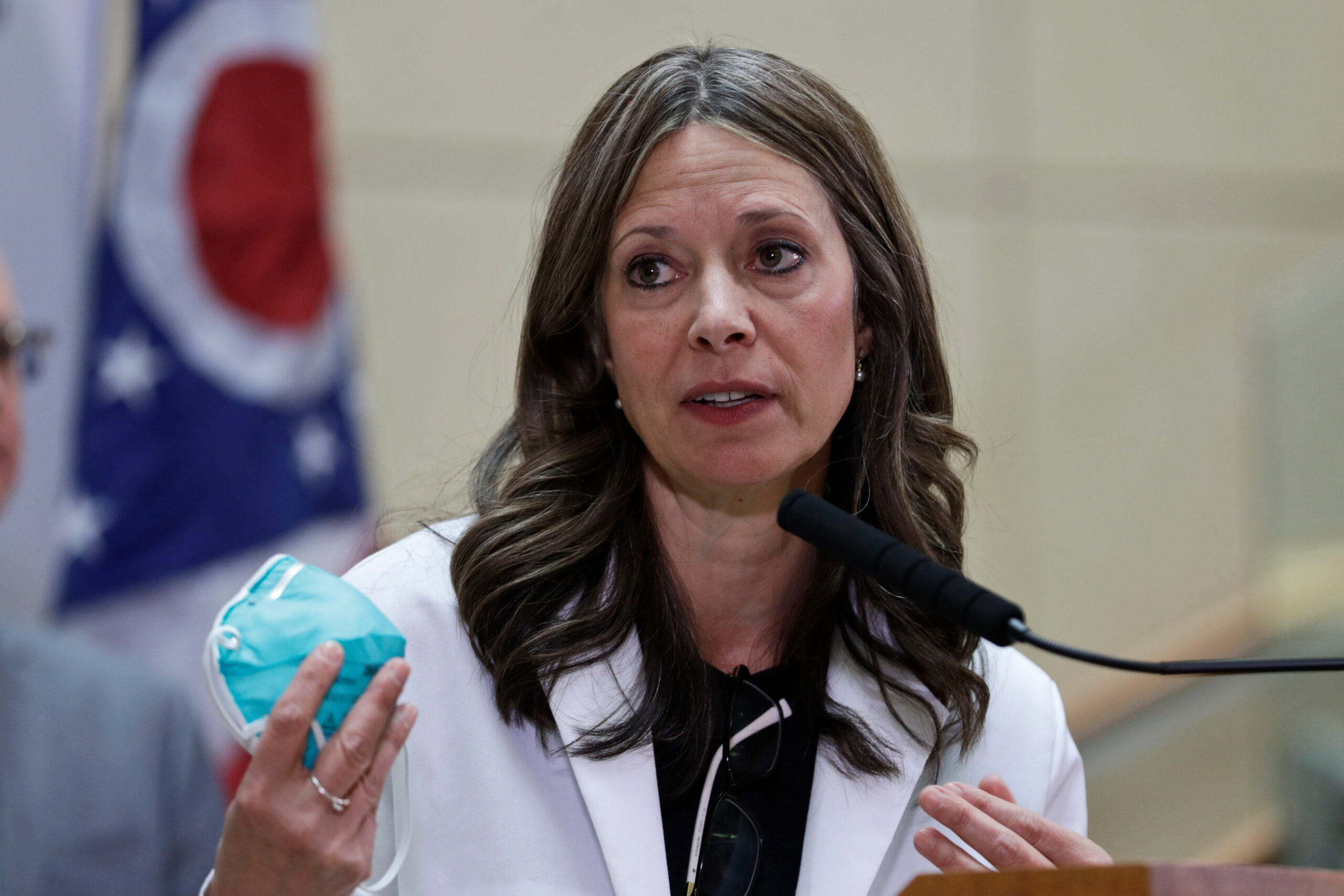
Acton, the expected Democratic nominee, was the state’s public health director during COVID, a legacy she hopes won’t get in the way of her affordability message
Biss now takes positions at odds with those advocated by AIPAC and decried its alleged involvement in the Illinois 9th District Democratic primary

Scott Olson/Getty Images
Illinois Democratic gubernatorial candidate Daniel Biss speaks to fans gathered for a Pussy Riot show at Subterranean on March 6, 2018 in Chicago, Illinois.
Evanston, Ill., Mayor Daniel Biss, running in the state’s 9th Congressional District on a platform deeply critical of Israel, sought support from AIPAC before he announced his run for Congress last year, Jewish Insider has learned.
One source familiar with multiple candidates’ outreach to pro-Israel political organizations intending to mobilize in the state’s 2026 Democratic primaries told JI that Biss had reached out to AIPAC in the spring of last year, before Rep. Jan Schakowsky (D-IL) had announced her retirement, to solicit AIPAC’s support for a prospective congressional bid should Schakowsky retire.
Niles, Ill., Mayor George Alpogianis, who owns a popular neighborhood diner, told JI he began hearing from multiple visitors to the restaurant that Biss had begun putting feelers out to AIPAC about a run around April of last year, weeks before Schakowsky announced her retirement.
Biss’ campaign denied having sought AIPAC’s support, alleging instead that the group had attempted to recruit him.
“Daniel has been clear that he has neither sought nor would accept AIPAC’s support in this race, and any suggestion that he ever solicited AIPAC’s backing is categorically false,” a Biss campaign spokesperson said.
“In the interest of open communication, Daniel met with AIPAC representatives to clearly lay out his positions on Israel, the need for a two-state solution, the humanitarian disaster the Netanyahu government has inflicted on Gaza, combating antisemitism, and related issues. After those conversations, AIPAC moved from attempting to recruit Daniel as their preferred candidate to labeling him a ‘dangerous detractor’ and backing state Sen. Laura Fine.”
AIPAC has not announced any formal endorsement in the race.
“While Daniel will always remain open to dialogue with those who disagree with him, his positions are guided by principle and not political pressure. And unlike other candidates, Daniel does not need the support of AIPAC or other outside special interests to win this race,” the spokesperson continued.
AIPAC declined to comment.
Biss, who is Jewish, has taken positions starkly at odds with those advocated by AIPAC since entering the race, including calling to block all offensive weapons shipments to Israel, supporting the “Block the Bombs Act” and calling for the U.S. to unilaterally recognize a Palestinian state.
He also wrote that, while he has deep familial connections to the state of Israel — his mother grew up in Israel, he spent significant time there and he had a cousin who served in the IDF after Hamas’ Oct. 7, 2023, terror attacks — “other families have stories that paint a dramatically different picture. The creation of the State of Israel in 1948 was itself a violent trauma for Palestinians. And I have also spent time in the West Bank, decades ago, witnessing first-hand the cruelty of the occupation — and the way, already then, that it warped Israeli attitudes.”
Biss additionally opposed Israeli and American strikes on Iran’s nuclear program during the 12-day war last June.
More recently, Biss signed a joint letter with several of the other candidates in the race alluding to and denouncing reported efforts by AIPAC to convince another candidate to drop out of the race. Opponents allege that AIPAC is quietly backing state Sen. Laura Fine in the race.
“Recent reports and conversations within our communities suggest that organized efforts are underway to pressure a fellow Democratic candidate to withdraw from the race,” the candidates wrote. “While vigorous persuasion and debate are part of politics, coordinated pressure campaigns aimed at forcing candidates out undermine the democratic process and erode trust among voters.”
Other candidates in the race, including influencer Kat Abugazaleh and Bushra Amiwala, an activist and a member of the Skokie Board of Education, have histories of anti-Israel activism and have staked out stances strongly hostile to Israel in the primary.
Biss is not the first Democratic candidate to shift his stance on Israel and AIPAC after failing to receive support from the group. JI reported in November that Rep. Seth Moulton (D-MA), running for Senate in Massachusetts, also sought AIPAC’s endorsement before launching his campaign with a focus on attacking the pro-Israel group.
Biss and other Democratic candidates’ changed views on their support of Israel have come as the party base has grown increasingly hostile to the Jewish state in recent years. Under pressure from party activists, earlier this month, California state Sen. Scott Wiener, running to succeed Rep. Nancy Pelosi (D-CA), called Israel’s conduct of its war against Hamas a “genocide.”
Brandeis Center founder Kenneth Marcus indicated the administration is receptive to taking action on an ‘extraordinary surge’ in health care-related antisemitism

Getty Images
Nurses station in busy hospital
Representatives from several Jewish groups met with Paula Stannard, the director of the Department of Health and Human Services’ Office for Civil Rights, last week to discuss potential action to counter antisemitism in health-care and medical education.
The meeting, organized by the Brandeis Center for Human Rights Under Law, also included representatives from the American Jewish Medical Association, Hadassah (The Women’s Zionist Organization of America), the Anti-Defamation League, Jewish Federations of North America and StandWithUs.
Kenneth Marcus, the founder of the Brandeis Center, told JI that the meeting was the second sit-down between the Brandeis Center and HHS leadership, given an “an extraordinary surge in health sector related antisemitism reports” to Brandeis and a “greater involvement by HHS in antisemitism and other civil rights issues than we’ve seen before, so meeting with HHS has become much more important.”
He said that, in the first meeting, which was just between Brandeis and HHS, his organization “made clear the nature and scope of the problem of antisemitism in health care,” particularly the “decolonizing therapy” movement in mental health spaces that has characterized Zionism as a mental illness to be treated.
The second meeting, last week, which lasted around an hour, brought in other Jewish communal groups to share additional information.
Eveline Shekhman, the CEO of AJMA, called the meeting “very productive.”
“We went in with the goal of coming collectively, and also to take a look at how we can use the government relations arm to work and partner with the government, so in that way, we could take a look at what’s going on in the workplace environment, as well as medical schools and all the other various stakeholders that would have a part in it, which includes the [medical] associations, the unions,” Shekhman said.
She said that the AJMA representatives sought to communicate the various forms and examples of antisemitism that providers and medical students have faced.
“This has a different level of gravitas because of the life and death nature of it. … When people are distracted in the ER and the OR by politics, and particularly by antisemitism, it really puts vulnerable people, patients at risk,” Andrea Wolf, AJMA’s director of advocacy added. “And then on top of that, if a patient comes in as an identifiable Jew, wearing a magen david or a yarmulke, or something like that, we’re not sure anymore that they can get the same level of care as someone who’s not identifiably Jewish.”
Dan Granot, senior director of government relations for ADL, said in a statement, “ADL’s data shows a troubling rise in antisemitism within health care settings. We must use all levers of government to respond to this crisis. Hospitals must remain places of healing, not hate.”
“As a member of the federal Task Force to Combat Antisemitism, the Department of Health and Human Services has a key role in confronting this scourge,” Granot continued. “We welcome HHS taking this challenge seriously and appreciate the opportunity to engage in a constructive discussion on what should be done to protect patients, providers, and future providers alike.”
Rachel Dembo, the director of policy and government relations for JFNA, said, “Nobody seeking medical care should be exposed to hate. Unfortunately, we have seen many disturbing instances of antisemitism creeping into medical settings, and too many instances where institutions failed to act or, worse, were permissive of antisemitism. We appreciate HHS OCR for taking this issue seriously and look forward to continuing to work with them and Congress to ensure Jewish Americans have access to hate-free health care.”
HHS is looking both at potential civil rights violations by individual institutions as well as at the possibility of broader policymaking to combat antisemitism in the field generally, Marcus said. He said that the problems in health care are wide-ranging, and come from patients, providers and healthcare students, in educational, hospital and medical association and conference settings.
“HHS has an extraordinarily wide jurisdiction. Since they fund such a high percentage of colleges and universities, they could certainly address many of the same sorts of situations that the Education Department’s Office for Civil Rights is handling,” Marcus explained. “But they also fund medical practices, health care of various sorts, and some associations, such as the American Psychological Association, where there have been concerning reports of antisemitic activity.”
He said HHS could issue informal guidance in the form of a dear colleague letter on antisemitism, but added that he’s “concerned at the appearance that HHS continues to fund some decolonizing therapy activity,” which he said he would like to see addressed in guidance and in enforcement activities.
Wolf said that AJMA is also pushing for a “more robust and accurate reporting mechanism” for incidents of antisemitism, noting that “our biggest challenge right now is not having a clear sense of the pervasiveness and the facts on the ground.”
Wolf and Shekhman said AJMA would also support an HHS dear colleague letter — reminding entities of their legal responsibilities and duty to combat antisemitism — and further work across administrative agencies and with Congress to address antisemitism and expand scientific partnerships between the U.S. and Israel.
Wolf said AJMA is also working to track donations to medical schools by bad actors.
HHS was involved in, and announced the revocation of, funds from various university-affiliated medical programs as part of the administration’s crackdown on campus antisemitism in early 2025. But that activity tapered off and faded from the public eye in the latter part of the Trump administration’s first year.
“What we’re looking for is a second wave of Health civil rights enforcement,” Marcus said. He noted that much of that early action was undertaken by personnel in acting capacities who in some cases are no longer at the agencies, and was driven largely by initiative from the White House.
“Now we’re looking for something different,” Marcus continued, calling for “more activity of a more institutionalized sort, such as investigations by HHS career officials throughout their regional apparatus” by the Office for Civil Rights and a “more normalized effort through the HHS bureaucracy taking on the issue of antisemitism.”
He said his conversations with Stannard and HHS have made him “optimistic” that such efforts would be forthcoming from the administration.
Wolf emphasized that AJMA aims to take a more collaborative approach with both the government and with medical schools themselves, and to serve as a resource to both. She said that HHS does not “condone or encourage investigations” of medical schools by HHS, “but once they are open by HHS, there’s really no better source of facts than AJMA membership, and so we will work with the government to help them.”
She said AJMA is happy that the administration is now taking a “more thoughtful and more targeted” approach to addressing antisemitism “without threatening a lot of scientific funding.”
Plus, all the president's advice on Iran

Andrew Lichtenstein/Corbis via Getty Images
Demonstrators hold a rally and march to the national ICE headquarters to protest the arrest of Mahmoud Khalil, April 5, 2025 in Washington, D.C.
Good Thursday afternoon!
This P.M. edition is reserved for our premium subscribers — offering a forward-focused read on what we’re tracking now and what’s coming next.
It’s me again — Danielle Cohen-Kanik, U.S. editor at Jewish Insider and curator, along with assists from my colleagues, of the Daily Overtime. Please don’t hesitate to share your thoughts and feedback by replying to this email.
📡On Our Radar
Notable developments and interesting tidbits we’re tracking
U.S. officials advised President Donald Trump that a large-scale military campaign against Iran is unlikely to topple the regime and could spark a wider regional conflict, The Wall Street Journal reports, a message that coincided with the president dialing back his warnings to Tehran over its violent suppression of protests.
Israeli Prime Minister Benjamin Netanyahu also reportedly weighed in yesterday, asking Trump to postpone any strikes, and Qatar, Saudi Arabia, Oman and Egypt have communicated similar messages.
U.S. officials told the Journal these developments have led Trump to hold off on strikes for now, though he directed military assets to be readied in case of action. The USS Abraham Lincoln Carrier strike group is reportedly being moved from the Indo-Pacific to the Middle East.
In a similar vein, IDF Chief of Staff Lt. Gen. Eyal Zamir visited an Arrow missile defense battery site in Israel today and directed a drill simulating a missile attack, saying in a statement, “It is important that every citizen of Israel knows that the IDF is constantly prepared to defend the country”…
In the absence of military action, the U.S. is punishing Iran economically, issuing sanctions today against what it called “the architects” of the crackdown. The Treasury Department will “use every tool to target those behind the regime’s tyrannical oppression of human rights,” Treasury Secretary Scott Bessent said in a statement.
Among the sanctioned Iranian officials are Ali Larijani, the secretary of the Supreme Council for National Security, who was “one of the first Iranian leaders to call for violence in response to the legitimate demands of the Iranian people,” according to the Treasury Department, and several commanders of the Islamic Revolutionary Guard Corps and Iran’s Law Enforcement Forces…
Turning to Gaza, American officials expressed their optimism about Phase 2 of the peace plan shortly after its launch yesterday, telling reporters, “For the first time in Gaza in almost a long time, there’s no Palestinian Authority and there’s no Hamas governing it.”
“We’ve talked to a number of Hamas people, and we’re hearing throughout the Arab world that people don’t want to be at war anymore. They want peace,” one of the officials said, claiming Hamas leaders “are indicating that there’s a real possibility” they will lay down their arms…
A new Emerson College poll released today shows the Republican primary for Texas Senate in a dead heat, with Sen. John Cornyn (R-TX) and his opponent, Attorney General Ken Paxton, polling at 26% and 27%, respectively. With Trump refraining from offering his endorsement to either candidate, it’s likely the race will head to a runoff.
On the Democratic side, state Sen. James Talarico is leading the primary over Rep. Jasmine Crockett (D-TX), 47-38%. Talarico has recently caused concern in the Texas Jewish community over his increasingly critical rhetoric on Israel, leading some to tell Jewish Insider that, without concerted outreach from his team, they’re likely to back Crockett…
A competitive Democratic primary is also underway in New Jersey’s 12th Congressional District, where surgeon Adam Hamawy entered the race today to succeed retiring Rep. Bonnie Watson Coleman (D-NJ) with a profile that may help him break through the field.
Hamawy, of Egyptian descent, served as a trauma combat surgeon during the Iraq War, where he operated on Sen. Tammy Duckworth (D-IL), who credits him with saving her life. In May 2024, he joined a delegation of American doctors to assist in health-care efforts in Gaza, where he was temporarily stuck during an Israeli border closure (he returned for a second mission in January 2025).
Though Hamawy has not run for office before, he has spoken extensively about his experience treating “mass casualties” in the enclave and condemning Israel and the U.S.’ role in the “indiscriminate killing and destruction there.” Watson Coleman, also an outspoken critic of Israel, brought him as her guest to Trump’s 2025 State of the Union address…
Asked about his views on Israel, Antonio Delgado, New York’s lieutenant governor who is challenging Gov. Kathy Hochul from her left, said in an interview released Tuesday that the U.S. should not “fund, provide weapons or diplomatic cover to any military operation that causes catastrophic civilian deaths or mass starvation … Otherwise, we are complicit.”
Delgado pledged not to take money from AIPAC, though the pro-Israel group does not contribute to gubernatorial races, and Delgado took a 2019 trip to Israel as a member of Congress with the AIPAC-affiliated American Israel Education Foundation.
Delgado further described Netanyahu as “deeply problematic” and a “war criminal,” but when asked if Israel is committing a genocide in Gaza, he largely demurred. “I can see how people would want to argue it both ways and I’m sensitive to this, candidly, based on my own relationships,” he said. Delgado’s wife is Jewish and they are raising their children Jewish. “It’s hard to argue against scholars. … [But] wherever you fall on that question, we can’t fund it. … We can’t be complicit in it, anymore”…
A federal appeals court ruled today that former Columbia University graduate student Mahmoud Khalil, a leader of the school’s anti-Israel protest movement, could be rearrested, JI’s Haley Cohen reports. Khalil was released in June from the Immigration and Customs Enforcement detention center in Louisiana, where he had been held for three months.
In a 2-1 ruling, a three-judge panel decided that the federal district court in New Jersey that issued Khalil’s release did not have jurisdiction over the matter and that it should have been handled in immigration court, which is part of the executive branch overseen by the Justice Department, meaning Khalil is now liable to be rearrested.
New York City Mayor Zohran Mamdani denounced the ruling, saying in a statement, “as the crackdown on pro-Palestinian free speech continues, Mahmoud is being threatened with rearrest. Mahmoud is free — and must remain free”…
⏩ Tomorrow’s Agenda, Today
An early look at tomorrow’s storylines and schedule to keep you a step ahead
Keep an eye out in Jewish Insider for a profile of Amy Acton, the Jewish public health expert hoping to become the first Democrat to win an Ohio governor’s race in 20 years.
The U.S. and Israel will sign a strategic framework on AI cooperation at the City of David tomorrow, led by Jacob Helberg, the U.S. under secretary of state for economic affairs, and Brig.-Gen. (res.) Erez Eskel, head of Israel’s National AI Directorate. Israeli Foreign Minister Gideon Sa’ar and U.S. Ambassador to Israel Mike Huckabee are also expected to be in attendance.
Also heading to Israel is Sen. Lindsey Graham (R-SC), who announced a last-minute trip this afternoon to meet with Netanyahu “at this crucial time in the history of the Middle East.”
Iran International will hold its second briefing of the week in Washington with former CIA Director Gen. David Petraeus. Read JI’s coverage of Wednesday’s event here.
Honduran President-elect Nasry Asfura will travel to Israel over the weekend, where he is expected to meet with Netanyahu, Sa’ar and President Isaac Herzog, as well as visit Yad Vashem and the Western Wall. Asfura, who will take office later this month, met with Secretary of State Marco Rubio in Washington earlier this week and was hosted by AIPAC leadership.
In observance of Martin Luther King Jr. Day, we’ll be back in your inbox with the Daily Overtime on Tuesday. Shabbat Shalom!
Stories You May Have Missed
SEEING PURPLE
Marine vet Ryan Crosswell aims to flip GOP-held Pennsylvania congressional seat

Crosswell, a former Republican who also served as a federal prosecutor, is touting his pro-Israel bona fides as he fights for the Democratic nomination against Rep. Ryan Mackenzie
BOOKSHELF
Ex-hostage’s wife writes book to help children deal with loss post-Oct. 7

The book, ‘Mojo’s Return: A Story of Resilience and Hope,’ was published in November
Plus, poll shows Stevens as most electable Dem in MI-SEN race

Francis Chung/Politico/Bloomberg via Getty Images
President Donald Trump speaks during a signing ceremony in the Oval Office of the White House in Washington, DC, US, on Wednesday, Jan. 14, 2026.
Good Wednesday afternoon!
This P.M. edition is reserved for our premium subscribers — offering a forward-focused read on what we’re tracking now and what’s coming next.
It’s me again — Danielle Cohen-Kanik, U.S. editor at Jewish Insider and curator, along with assists from my colleagues, of the Daily Overtime. Please don’t hesitate to share your thoughts and feedback by replying to this email.
📡On Our Radar
Notable developments and interesting tidbits we’re tracking
President Donald Trump indicated that his threats to Iran are making an impact; he told reporters this afternoon, “We’ve been told that the killing in Iran is stopping, it’s stopped, and there’s no plans for executions,” referencing reports that an arrested protester was due to be executed today.
Trump later appeared to downplay protester deaths, calling it “one of those things … people were shooting at them with guns and they were shooting back.” It’s a notable change in tune from the president, who just yesterday told Iranian protesters to “save the names of the killers and abusers” and that “help is on its way.”
Asked if this means that military action against Iran is off the table, Trump responded, “We’re going to watch it and see what the process is, but we were given a very good statement” that the killing has stopped “by people that are aware of what’s going on”…
Others are still bracing for potential military action: Some personnel were told to evacuate the U.S.’ Al Udeid Air Base in Qatar by tonight, Reuters reports. (Recall that Iran launched several missiles at Al Udeid after the U.S. strikes on its nuclear sites last June.)
A number of airlines have canceled or suspended flights to Iran; the Lufthansa group, in addition to avoiding Iranian and Iraqi airspace, said it will only operate day flights to Israel and Jordan through Jan. 19, avoiding overnight trips.
IDF spokesperson Brig. Gen. Effie Defrin warned on social media to avoid rumors and misinformation about the evolving situation, saying the IDF is “prepared for defense and on alert for surprise scenarios”…
White House special envoy Steve Witkoff announced the launch of Phase 2 of Trump’s 20-point Gaza peace plan today, “moving from ceasefire to demilitarization, technocratic governance, and reconstruction.” This phase “establishes a transitional technocratic Palestinian administration in Gaza … and begins the full demilitarization and reconstruction of Gaza, primarily the disarmament of all unauthorized personnel,” Witkoff said.
“The US expects Hamas to comply fully with its obligations, including the immediate return of the final deceased hostage. Failure to do so will bring serious consequences,” Witkoff added, though the U.S. has not taken action on Hamas’ failure to return the body of Ran Gvili, the final hostage, in the three months since the terror group was meant to at the outset of the ceasefire agreement.
It is still unclear how the U.S. and its partners will disarm Hamas or remove it from power, with the International Stabilization Force still not in place and foreign nations refusing to engage with Hamas militants…
Meanwhile, the midterms are picking up speed: New polling out of the Michigan Senate race shows Rep. Haley Stevens (D-MI) looking like the most electable Democrat against former Rep. Mike Rogers (R-MI), the expected GOP nominee.
In a Detroit News poll testing general election matchups, Stevens and Rogers were tied at 44% each, while physician Abdul El-Sayed, who has made criticism of Israel central to his campaign, fared the worst, losing to Rogers 48-42%. State Sen. Mallory McMorrow, another critic of Israel, would also trail, 46-42%, the poll found…
In the Garden State, Rep. Rob Menendez (D-NJ) secured the endorsement of Sen. Andy Kim (D-NJ) today, a meaningful show of support from the progressive-minded senator as Menendez may face a primary challenge from his left from Mussab Ali.
Ali, who is expected to join the race shortly, is a vocal opponent of Israel and has been a champion for the anti-Israel protests and encampments that roiled college campuses in recent years; Kim has also been criticized by Jewish leaders for his support of measures blocking some arms sales to Israel…
Trump will not be endorsing three Republican senators facing competitive reelection campaigns: Sens. Susan Collins (R-ME), John Cornyn (R-TX) and Bill Cassidy (R-LA), Politico reports. Cornyn and Cassidy are facing serious Republican primary opposition, while Collins is facing the likelihood of a hotly contested general election…
The State Department is indefinitely suspending immigration visa processing for individuals from 75 countries starting Jan. 21, building on the Trump administration’s total and partial immigration bans that already exist on nearly 40 countries. The pause will impact those looking to permanently immigrate who may “become a public charge on the United States and exploit the generosity of the American people,” the State Department said…
⏩ Tomorrow’s Agenda, Today
An early look at tomorrow’s storylines and schedule to keep you a step ahead
Keep an eye out in Jewish Insider for an interview with Ryan Crosswell, the Marine veteran and former Republican looking to win the Democratic nomination in a key Pennsylvania swing district.
The technocratic Palestinian committee launched with Phase 2 of the Gaza Peace Plan — which will be headed by Ali Shaath, a former deputy minister for the Palestinian Authority — is expected to hold its first meeting tomorrow in Cairo, also attended by Nickolay Mladenov, the former U.N. envoy to the Middle East now leading the Gaza Board of Peace.
The Israeli American Council kicks off its annual summit tomorrow in Hollywood, Fla., with a plenary including Adm. (res.) Daniel Hagari, the previous IDF spokesperson; Boaz Levy, the CEO of Israel Aerospace Industries; and Betsy Korn, the chair of the Conference of Presidents of Major American Jewish Organizations.
Stories You May Have Missed
MAYOR’S M.O.
Mamdani’s antisemitism strategy: Reluctant to confront extremist threats while pledging to protect Jews

The mayor’s comments responding to pro-Hamas protesters in Queens and an arson attack on a synagogue in Jackson, Miss., illustrate what Mamdani’s critics interpret as a core tension animating his assessment of antisemitism
FIGHTER FAULT LINES
Saudi Arabia’s talks to acquire Chinese-Pakistani JF-17 jets could complicate its pursuit of U.S. F-35s

Analysts tell JI that the move ‘is not the behavior Washington can reasonably expect from a partner who would like to be trusted with the F-35’
Plus, J Street plays both sides

Mandel NGAN / AFP via Getty Images
President Donald Trump speaks to the press upon returning to Joint Base Andrews in Maryland on January 13, 2026.
Good Tuesday afternoon!
This P.M. edition is reserved for our premium subscribers — offering a forward-focused read on what we’re tracking now and what’s coming next.
It’s me again — Danielle Cohen-Kanik, U.S. editor at Jewish Insider and curator, along with assists from my colleagues, of the Daily Overtime. Please don’t hesitate to share your thoughts and feedback by replying to this email.
📡On Our Radar
Notable developments and interesting tidbits we’re tracking
President Donald Trump’s rhetoric against Iran reached a fever pitch today, as reports indicate over 12,000 — and potentially as many as 20,000 — protesters have been killed by the regime amid nationwide demonstrations.
Trump posted on social media this morning that he has “cancelled all meetings with Iranian Officials until the senseless killing of protesters STOPS,” and said to the demonstrators, “Iranian Patriots, KEEP PROTESTING – TAKE OVER YOUR INSTITUTIONS!!! Save the names of the killers and abusers. They will pay a big price.”
Trump ended his message promising, “HELP IS ON ITS WAY,” without specifying what actions the U.S. may take, though he told reporters in Detroit that “it’s not a bad idea” for U.S. allies “to get out” of Iran.
Administration officials held several discussions today on options for intervening in Iran; Vice President JD Vance, whose team has pushed back on characterizations that he is opposed to military strikes, led the major briefing with the National Security Council’s Principals Committee this afternoon. Trump was in Michigan for a speech on the economy and likely did not attend…
As the U.S. weighs its next steps, Saudi Arabia, Oman and Qatar are advocating against strikes, warning the administration that destabilization of the Iranian regime could impact oil markets and hurt the American economy, The Wall Street Journal reports. Saudi officials told Iran that they will not allow the U.S. to use their airspace to conduct strikes…
While Trump blocks meetings with Iranian officials, his special envoy Steve Witkoff secretly met with the exiled former Iranian crown prince, Reza Pahlavi, over the weekend, Axios reports, in the first high-level meeting with the regime’s opposition since the protests began. It’s not clear how much support the son of the deposed shah has in Iran, though videos from recent protests show demonstrators chanting slogans associated with him and the monarchy…
Looking to the campaign trail, in a first, J Street endorsed Rep. Dan Goldman (D-NY) in his reelection race while also listing his opponent, former New York City Comptroller Brad Lander, as an “approved” candidate. It’s currently the only race where the group is supporting a challenger to an incumbent, in a district where the candidates’ differing stances on Israel are a key issue…
Roy Cooper, the former Democratic governor of North Carolina now running for the seat of retiring Sen. Thom Tillis (R-NC), raised more than $9.5 million in the final quarter of 2025, The Hill reports, a major haul for a seat that Democrats view as one of their best chances to flip. His opponent, former Republican National Committee Chair Michael Whatley, reportedly raised $5.1 million during the same time frame…
The Trump administration designated three Muslim Brotherhood branches as terrorist organizations today, including chapters in Lebanon, Egypt and Jordan, Jewish Insider’s Matthew Shea reports.
The Jordanian and Egyptian branches were named as Specially Designated Global Terrorists, with the State Department citing their provision of “material support to Hamas,” while the organization’s branch in Lebanon received the more stringent label of Foreign Terrorist Organization…
The U.S. is “closely monitoring developments in Aleppo,” Syria, and “urg[ing] all parties to exercise maximum restraint,” Adm. Brad Cooper, commander of CENTCOM, said in a statement today, after days of fighting between Syrian government forces and the Kurdish-led and U.S.-backed Syrian Democratic Forces killed dozens and displaced over 150,000 people in the city.
SDF fighters were expelled from two neighborhoods they had held since 2011 over the weekend, leading to protests by thousands of Kurds and marking a setback for efforts to integrate the SDF into the armed forces and to unify the country’s diverse populations…
⏩ Tomorrow’s Agenda, Today
An early look at tomorrow’s storylines and schedule to keep you a step ahead
Keep an eye out in Jewish Insider for a profile of the new president of the University of Michigan, who Jewish leaders are optimistic will improve the climate on a campus that experienced some of the most disruptive anti-Israel and antisemitic activity in the aftermath of Oct. 7.
Trump will address the issue of Iran in an interview airing on “CBS Evening News” tonight.
Tomorrow, Iran International will host a town hall with Robert Satloff, executive director of The Washington Institute for Near East Policy, and Joel Rayburn, the former deputy assistant secretary for Levant Affairs and U.S. special envoy for Syria.
In Netanya, Israel, the Tribe of Nova Foundation will host a ribbon-cutting for Nova House, a center primarily funded by UJA-Federation of New York for survivors of the music festival massacre.
Stories You May Have Missed
SCOOP
Trump, Netanyahu at odds over Israeli plans to end reliance on U.S. military aid

Two sources told JI the president pushed back on Netanyahu’s claims about the prudence of Israel’s proposal to end U.S. military assistance over the next decade
FUND IT OR LOSE IT
Kennedy Center President Ric Grenell to Jewish donors: ‘Act quickly’ to fund theater’s Israeli Lounge or risk losing it
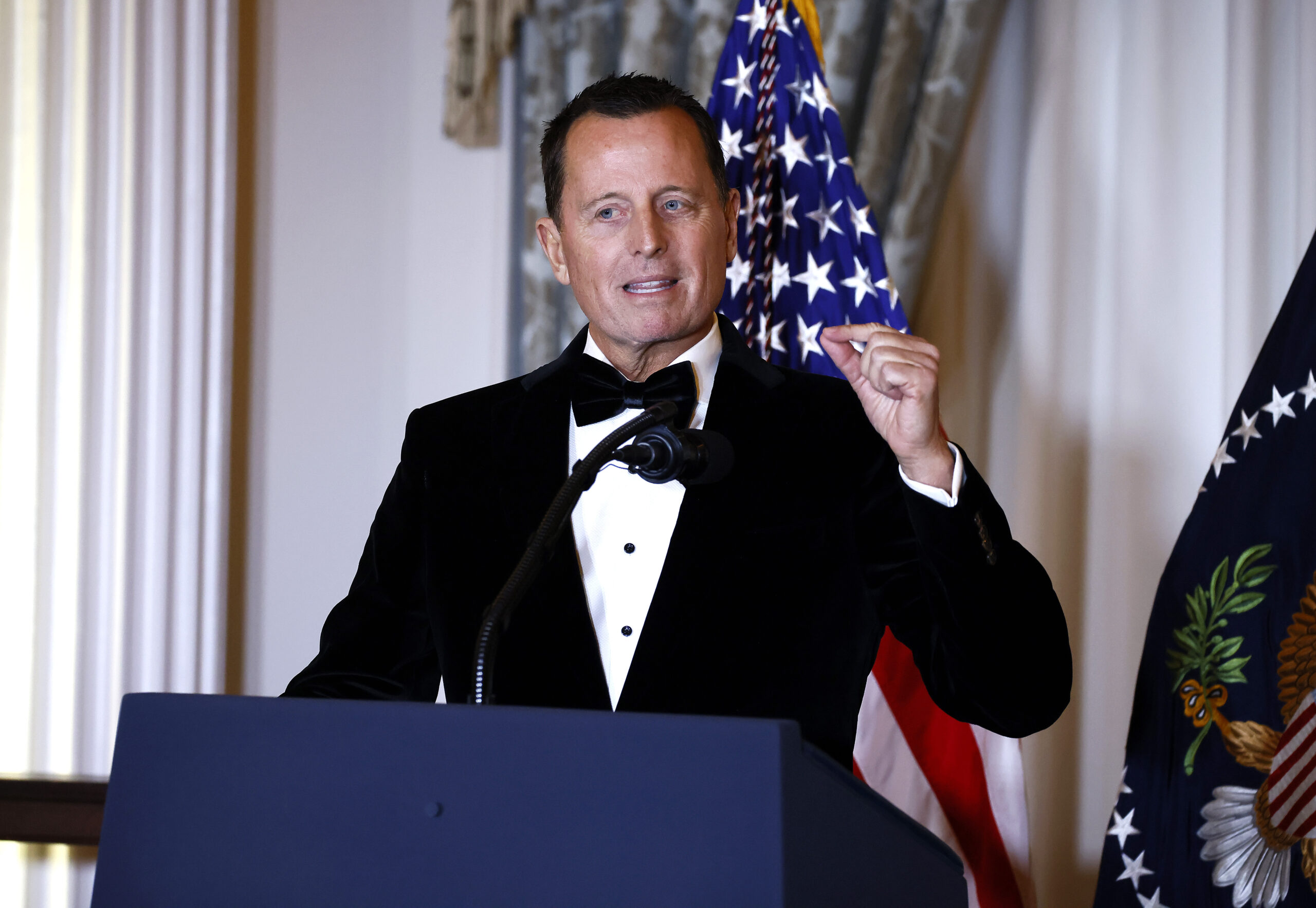
Grenell, at October event for Oct. 7-themed exhibit, told attendees: ‘It certainly would be a shame if we lost this room to a corporation or an individual and it was no longer the lounge‘
Plus, Trump favors strikes on Iran over diplomacy
Russell Yip/San Francisco Chronicle via Getty Images
California State Senator Scott Wiener addresses the SF Chronicle Editorial Board on Thursday, Jan. 18, 2018 in San Francisco, Calif.
Good Monday afternoon!
This P.M. edition is reserved for our premium subscribers — offering a forward-focused read on what we’re tracking now and what’s coming next.
It’s me again — Danielle Cohen-Kanik, U.S. editor at Jewish Insider and curator, along with assists from my colleagues, of the Daily Overtime. Please don’t hesitate to share your thoughts and feedback by replying to this email.
📡On Our Radar
Notable developments and interesting tidbits we’re tracking
The suspect in the arson attack that destroyed Mississippi’s largest synagogue early Saturday morning confessed to targeting the building because of its “Jewish ties,” Jewish Insider’s Haley Cohen reports.
In an affidavit filed in U.S. District Court in Mississippi more than 48 hours after the attack, the FBI said the suspect, Stephen Spencer Pittman, 19, admitted to starting the blaze at Beth Israel Congregation in Jackson, Miss., due to “the building’s Jewish ties” and referred to the institution as the “synagogue of Satan” in an interview with the Jackson Fire Department. Pittman was charged with “maliciously damaging or destroying a building by means of fire or an explosive”…
President Donald Trump said Iranian officials made contact with the U.S. over the weekend and proposed restarting nuclear negotiations, telling reporters, “A meeting is being set up, but we may have to act because of what’s happening before the meeting,” referring to the U.S. potentially taking military action in Iran over its violent crackdown on protesters around the country.
Iranian Foreign Minister Abbas Araghchi also spoke with White House special envoy Steve Witkoff in recent days about the protests, Axios reports; White House Press Secretary Karoline Leavitt told reporters today that an Iranian government official who spoke to Witkoff “express[ed] a far different tone than what you’re seeing publicly.”
Trump is currently leaning toward authorizing military strikes rather than engaging in diplomacy, The Wall Street Journal reports, and he is scheduled to hold a briefing tomorrow with advisors, including Secretary of State Marco Rubio, Secretary of Defense Pete Hegseth and Joint Chiefs of Staff Chairman Gen. Dan Caine, to make a determination…
California Jewish communal organizations released a joint statement today condemning state Sen. Scott Wiener’s remarks on Israel, after the Jewish House candidate said in a video statement yesterday that he is changing his position and will now call Israel’s actions in Gaza a genocide.
“We recognize that Senator Wiener has been a strong supporter of the Jewish community throughout the Israel-Hamas war and his many years of public service, and that he has directly experienced antisemitic attacks simply for being Jewish. Unfortunately, Senator Wiener’s newly stated position is both incorrect and lacks moral clarity. … We call on the Senator and our elected, civic, and education leaders to recognize and reflect on the consequences of their words in this fraught and polarizing environment,” the statement read…
In a major recruiting win for Senate Democrats, former Rep. Mary Peltola (D-AK) announced her run against Sen. Dan Sullivan (R-AK) today, JI’s Marc Rod reports, giving Democrats an outside chance of picking up the red-state Senate seat.
Peltola maintained a strongly pro-Israel voting record during her one term in the House, breaking on numerous occasions with a majority of her party to vote for measures supporting the Jewish state post-Oct. 7, including supporting a stand-alone Israel aid package opposed by many Democrats. Sullivan, for his part, has been a hawkish pro-Israel voice in the Senate, and has pushed for a more aggressive stance toward Iran…
Democratic Maryland state Del. Adrian Boafo is launching a bid to succeed his former mentor, Rep. Steny Hoyer (D-MD), as the former House majority leader retires. Boafo, who served as campaign manager for Hoyer, is expected to be the party favorite in the primary, Politico reports. Former Capitol Police officer Harry Dunn, who rose to prominence after the Jan. 6, 2021, Capitol riot, is also considering joining the race…
In another race to watch, Rep. Nellie Pou (D-NJ) in New Jersey’s 9th Congressional District gained another opponent in Tiffany Burress, a Republican political newcomer and wife of former NFL wide receiver Plaxico Burress. On the first day of her campaign, Burress has already secured the backing of several GOP county chairs, as the party looks to flip the seat away from Pou after Trump unexpectedly carried the district in 2024…
Former Obama administration officials and Crooked Media hosts Jon Favreau, Jon Lovett and Ben Rhodes are hosting a fundraiser in Hollywood, Calif., on Thursday for Abdul El-Sayed, a far-left, anti-Israel candidate running for Senate in Michigan, JI’s Marc Rod reports.
El-Sayed, a physician and former director of the Wayne County Department of Health, has made his criticisms of Israel a centerpiece of his campaign, blasting other candidates in the race as being insufficiently hostile to the Jewish state. Favreau, Lovett and Rhodes, on their “Pod Save America” and “Pod Save the World” podcasts, have also emerged as a vocal force against Israel and AIPAC in the Democratic Party, and have boosted prominent anti-Israel candidates in other hot-button primaries…
The future of the Israeli Lounge at the Trump-Kennedy Center is reportedly in peril, eJewishPhilanthropy‘s Judah Ari Gross reports, “unless a major donor from the Jewish community steps up and makes a large donation,” far-right commentator Laura Loomer said over the weekend. The center’s president, Richard Grenell, is seeking to renovate the space; Loomer has suggested Qatar may look to provide the funds for the room’s overhaul…
The New York Times reports on the brewing fight between states over the order of 2028 Democratic presidential primary elections…
Dina Powell McCormick, a banking executive, former deputy national security advisor to Trump and wife of Sen. Dave McCormick (R-PA), was named president and vice chair of Meta, reporting to CEO Mark Zuckerberg, Axios reports. Zuckerberg said in a statement that Powell McCormick will focus on “partnering with governments and sovereigns to build, deploy, invest in, and finance Meta’s AI and infrastructure”…
⏩ Tomorrow’s Agenda, Today
An early look at tomorrow’s storylines and schedule to keep you a step ahead
Keep an eye out in Jewish Insider for more details on the motives and background of the suspected arsonist who set fire to the Beth Israel Congregation in Jackson, Miss., over the weekend.
President Donald Trump will receive a major briefing on avenues for responding to Iran’s violent suppression of protests, including cyber, economic and military options.
New York Gov. Kathy Hochul will deliver her State of the State address in Albany, where she plans to announce her proposal to create a 25-foot buffer zone around houses of worship and health-care facilities. (The legislation, while welcomed by major Jewish groups, would not have prevented the pro-Hamas protest that disrupted a Queens community last week, which took place approximately 300 feet away from the targeted synagogue.) New York City Mayor Zohran Mamdani is expected to be in attendance.
Stories You May Have Missed
VENEZUELAN VIEWS
After years in exile, Venezuelan Jews celebrate the fall of Maduro

Some Venezuelan Jews see similarities in the response of far-left activists to Trump’s capture of Maduro and their criticism of Israel’s actions in Gaza
ON ALERT
Hezbollah’s continued presence in south Lebanon alarms Israel, despite disarmament claims

The Lebanese Armed Forces said it took operational control south of the Litani River, but has fallen well short of fully disarming the terrorist group
Some Venezuelan Jews see similarities in the response of far-left activists to Trump’s capture of Maduro and their criticism of Israel’s actions in Gaza

Michele Eve Sandberg/Sipa USA)(Sipa via AP Images
Mural artist from Venezuela, Pedro Martin, pictured. A mural depicting Venezuelan President Nicolas Maduro portrayed as captured is seen in the Wynwood Arts District in Miami, Florida.
When Valerie Stramwasser woke up on Saturday, Jan. 3, she glanced at her phone and saw hundreds of WhatsApp messages.
“I’m like, ‘Oh my god, something happened.’ I first thought that it was something in the family, and then I opened up and I hear, ‘We’re free.’ We’re free. It happened,” Stramwasser told Jewish Insider on Thursday. “Literally tears of joy.”
Stramwasser, 37, lives in Hollywood, Fla., with her husband and two children, but she grew up in Caracas, Venezuela. She was forced to flee the country as a teenager after a failed kidnapping attempt against her. She hasn’t been back in years, not even for the funerals of her grandparents.
The tears of joy began when she saw the news that the U.S. military had captured Venezuelan President Nicolás Maduro and his wife, and flown them to New York to stand trial on narco-terrorism charges. Stramwasser and her husband, who is also Venezuelan, couldn’t wait to tell their 8- and 11-year-old children the news.
“As a mom, you tell the stories to your kids, and they know how much I miss my country. But I’ve never been able to go back,” Stramwasser recounted. Then they drove to her brother’s house to celebrate and watch President Donald Trump discuss the operation. “This is one of the most important things that, as a Venezuelan, you can hear in the past 30 years.”
“Growing up there, it was a community of about 28,000 Jews that were living there. It was a vibrant community, a very successful and respected community,” said Paul Kruss, a city commissioner in Aventura, Fla., who also owns a popular local bagel shop. “Now there’s maybe 4,500 that live there, which should tell you all you need to know about the kind of brain drain that they had. It wasn’t only the Jewish community that fled.”
An economic crisis that began under the country’s socialist president, Hugo Chávez, who was elected in 1999, grew exponentially worse when Maduro came to power in 2013 after Chávez’s death. The resulting poverty, starvation and crime have led to a massive refugee crisis of roughly 8 million people who have left the South American country. Amid the global diaspora of Venezuelans, many are cheering the removal of Maduro, whom they view as responsible for deteriorating standards of living, repression and political dysfunction plaguing the country.
Stramwasser is one of hundreds of thousands of those Venezuelans who now call Florida home, including several thousand Venezuelan Jews who have developed outposts of their once-strong Caracas community centers in Miami.
“Growing up there, it was a community of about 28,000 Jews that were living there. It was a vibrant community, a very successful and respected community,” said Paul Kruss, a city commissioner in Aventura, Fla., who also owns a popular local bagel shop. His mother, who was from Warsaw, Poland, moved to Caracas after surviving the Holocaust. “Now there’s maybe 4,500 that live there, which should tell you all you need to know about the kind of brain drain that they had. It wasn’t only the Jewish community that fled.”
The surprise operation has largely garnered support from Republicans, while Democrats are more skeptical, including many who are outspoken critics of Maduro, igniting a debate in Congress about presidential war powers. Senate Minority Leader Chuck Schumer (D-NY) said Trump should not have acted without congressional approval.
“Maduro is a horrible, horrible person, but you don’t treat lawlessness with other lawlessness, and that’s what’s happened here,” Schumer said over the weekend.
In Florida, even among Democrats, the reaction was more celebratory.
“The capture of the brutal, illegitimate ruler of Venezuela, Nicolás Maduro, who oppressed Venezuela’s people is welcome news for my friends and neighbors who fled his violent, lawless, and disastrous rule,” Rep. Debbie Wasserman Schultz (D-FL) said in a statement. “However, cutting off the head of a snake is fruitless if it just regrows. Venezuelans deserve the promise of democracy and the rule of law, not a state of endless violence and spiraling disorder.”
The question of what comes next for Venezuela remains unanswered. The country’s interim president is Delcy Rodríguez, the vice president and oil minister, who was close to Maduro.
“The good thing about what just happened is that sometimes bad people in the world need a message to be sent. If they know that they can do bad things, and no one will come for them, well, they will just keep doing bad things,” said Brian Fincheltub. “ We want to go back, so we are very happy with this.”
Secretary of State Marco Rubio laid out a three-step process for Washington’s plans in Venezuela: stabilizing the country, followed by allowing American companies access to the Venezuelan market and, finally, a transition of power. But the U.S. has not laid out plans for a new political regime in Venezuela.
The Venezuelans cheering on the ouster of Maduro are content to wait a bit longer.
“She’s been part of the problem, no question,” Kruss said of Rodríguez. “I’m hopeful that the United States will be guiding them and letting the Venezuelan people decide who they want to be their leader, and I think this is just a transition period.”
Brian Fincheltub grew up in the Caracas Jewish community, which he called “one of the best in the world.” He was a social activist working in the slums of Caracas, but due to his ties to the opposition party, he fled the country in 2018 to avoid being jailed. Venezuela’s National Assembly named opposition leader Juan Guaidó acting president of Venezuela in 2019, setting up a showdown with Maduro, who never ceded power. Fincheltub moved to Washington to serve as Venezuela’s consul general under Guaidó’s opposition rule. Now Fincheltub works at the World Bank.
Fincheltub supports Trump’s actions, which he said is not about politics — that he would have supported the move had President Joe Biden done the same thing.
“The good thing about what just happened is that sometimes bad people in the world need a message to be sent. If they know that they can do bad things, and no one will come for them, well, they will just keep doing bad things,” said Fincheltub, 38. “ We want to go back, so we are very happy with this.”
Some Venezuelan Jews see similarities in the response of far-left activists to Trump’s capture of Maduro and their criticism of Israel’s actions in Gaza.
“People who are not Venezuelan, who did not grow up under Chávez or Maduro, who did not lose their country, their safety, their future, feel entitled to explain Venezuela to us,” said Valerie Stramwasser, who has said Florida will remain her home even if Venezuela elects a new government. “The same goes for people who are not Jewish, who have never lived the history, the wars, the constant existential threat, feel entitled to explain the Israel-Palestine conflict to us.”
“The same ones that were attacking Israel and the Jewish people are the same ones, or many of them, that are attacking President Trump, or that are attacking what happened in Venezuela,” Fincheltub said. “This is not about President Trump or President Biden. This is about the liberation of Venezuela.”
Stramwasser posted a video making a similar point on Instagram, where her posts usually get a couple thousand views. This one has been viewed more than 500,000 times.
“People who are not Venezuelan, who did not grow up under Chávez or Maduro, who did not lose their country, their safety, their future, feel entitled to explain Venezuela to us,” said Stramwasser, who has said Florida will remain her home even if Venezuela elects a new government. “The same goes for people who are not Jewish, who have never lived the history, the wars, the constant existential threat, feel entitled to explain the Israel-Palestine conflict to us.”
History, she added, will be on her side.
“History is very clear about this,” Stramwasser said in the video. “Those who confuse aggressors with victims don’t end up on the right side of history.”
Plus, New Jersey IHRA bill scuttled

Kamran / Middle East Images / AFP via Getty Images
Iranians gather while blocking a street during a protest in Kermanshah, Iran on January 8, 2026.
Good Thursday afternoon!
This P.M. edition is reserved for our premium subscribers — offering a forward-focused read on what we’re tracking now and what’s coming next.
It’s me again — Danielle Cohen-Kanik, U.S. editor at Jewish Insider and curator, along with assists from my colleagues, of the Daily Overtime. Please don’t hesitate to share your thoughts and feedback by replying to this email.
📡On Our Radar
Notable developments and interesting tidbits we’re tracking
Protests are escalating across Iran, with videos showing masses of demonstrators taking to the streets and security forces at times overwhelmed. Human rights groups estimate dozens of protesters have already been killed and reports indicate the country is experiencing an internet blackout. Storeowners are reportedly shuttering their businesses in an economic boycott, further deepening the economic crisis that spurred the unrest.
President Donald Trump reiterated his warning today that the Iranian regime will “have to pay hell” if “they start killing people, which they tend to do,” speculating that the deaths so far have been caused by stampedes and not law enforcement. Vice President JD Vance said at a press briefing that the Iranian regime “has a lot of problems” and that “the smartest thing for them to have done … is for them to actually have a real negotiation with the United States”…
Australian Prime Minister Anthony Albanese announced today that he is establishing a royal commission into antisemitism in the country, after the deadly terror attack on a Hanukkah celebration in Sydney last month. The commission, considered a powerful tool in Australian governance, will investigate the scope and causes of antisemitism and make recommendations for law enforcement, in a report due on the year anniversary of the Dec. 14 attack…
Spanish Prime Minister Pedro Sanchez said Spain would send “peacekeeping troops” to the Gaza Strip “when the opportunity presents itself.” Speaking to a gathering of ambassadors in Madrid today, he said, “Of course, we have not forgotten Palestine and the Gaza Strip … Spain must actively participate in rebuilding hope in Palestine.” Many countries remain wary of contributing troops to stabilize Gaza over concerns of being required to engage with Hamas…
Israeli Prime Minister Benjamin Netanyahu met today with Nickolay Mladenov, former U.N. envoy to the Middle East and soon-to-be representative of the U.S.-led Board of Peace in Gaza…
New York City Mayor Zohran Mamdani has been silent thus far today about a protest taking place tonight organized by the radical anti-Israel group responsible for a similar protest outside the Park East Synagogue in November, Jewish Insider’s Haley Cohen reports.
The group posted the address of the real estate event they intend to protest, which is taking place at a synagogue in Queens’ heavily Jewish neighborhood of Kew Gardens Hills. The synagogue canceled prayer services and two nearby schools, Yeshiva of Central Queens and PS 165, announced early closures. Democratic state Assemblymember Sam Berger, who represents the area, told JI that local principals, staff and parents are “very concerned.” The surrounding area has been “completely upended,” he said…
The New Jersey Legislature will not give further consideration to a bill seeking to codify the International Holocaust Remembrance Alliance’s working definition of antisemitism into state law during this legislative session, the bill’s lead sponsor announced, after several years of the Jewish community’s urging for the measure to be adopted…
Rob Sand, the state auditor and Democratic candidate for governor of Iowa, announced he raised over $9.5 million in 2025, more than double the record for off-year fundraising for a gubernatorial election in the state. Sand told Jewish Insider in 2019, when he first took office as auditor, that he conducted what was “definitely the first audit” to ensure agencies were in compliance with a state anti-BDS law. “When you say [you are] willing to be supportive of your ally [Israel], you need to put your money where your mouth is,” he said at the time…
Far-left New York state Assemblywoman Claire Valdez joined the race to succeed retiring Rep. Nydia Velázquez (D-NY) today in the progressive 7th Congressional District covering parts of Brooklyn and Queens. The Democratic Socialists of America and Mamdani are expected to endorse Valdez, a move that could prove consequential in the district that The New York Times said will “pit left against lefter.”
Valdez, who has already brought on several of Mamdani’s advisors, was a vocal critic of Israel’s war in Gaza and pro-Israel political groups; her opponent, Antonio Reynoso, takes similar stances but is viewed as a more “traditional progressive” and is expected to secure Velázquez’s support, the Times reports…
Rep. Steny Hoyer (D-MD) officially announced his retirement today after serving 23 terms, one of the longest-serving House members in U.S. history. Speaking on the House floor, the former majority leader and pro-Israel champion warned he was “deeply concerned that this House is not living up to the founders’ goals” and that the country “is heading not toward greatness, but toward smallness, pettiness, divisiveness, loneliness and disdainfulness”…
In his first State of the State address since 2020 — and final before his term ends next year — California Gov. Gavin Newsom heralded his state as a “beacon” and a “policy blueprint for others to follow.” He denounced Trump and laid out a policy agenda including clean energy, increased wages and lowered housing costs, in a speech seen as laying the groundwork for his potential 2028 presidential run…
The Qatar Investment Authority and Emirati-based MGX, linked to a UAE sovereign wealth fund, participated in the latest fundraising round for Elon Musk’s xAI, which raised over $15 billion total. Gulf investors including QIA and the Saudi and Omani sovereign funds have taken part in previous fundraising rounds for the company that owns the Grok AI chatbot on X…
⏩ Tomorrow’s Agenda, Today
An early look at tomorrow’s storylines and schedule to keep you a step ahead
Keep an eye out in Jewish Insider for a look at how legislation in New Jersey to adopt the International Holocaust Remembrance Alliance’s working definition of antisemitism was scuttled — and who was behind the bill’s demise.
The third season of the hit TV show “Tehran” will premiere in the U.S. on Apple TV tomorrow, after a delay of several years. The popular international thriller, which follows a Mossad agent operating undercover in Iran, was indefinitely postponed at the outset of the Israel-Hamas war in Gaza. The season ran in Israel in December 2024, and Apple has announced the fourth season is already in production.
On Saturday, Anti-Defamation League CEO Jonathan Greenblatt will sit in conversation with Rabbi David Wolpe about the “golden age of American Jewry” at Sinai Temple in Los Angeles.
We’ll be back in your inbox with the Daily Overtime on Monday. Shabbat Shalom!
Stories You May Have Missed
SAUDI SPOTLIGHT
U.S. lawmakers weigh in on fears of Saudi Arabia accommodating Islamists

The lawmakers downplayed reports of a serious Gulf rift, with Rep. Brad Sherman calling the increasing disputes between neighbors ‘tactical, not ideological’
MENIN’S MOMENT
New York Jewish leaders hope Menin will serve as check against Mamdani

Julie Menin was elected the first Jewish speaker of the New York City Council on Wednesday
Plus, Likud lawmaker calls out 'poison' on American right
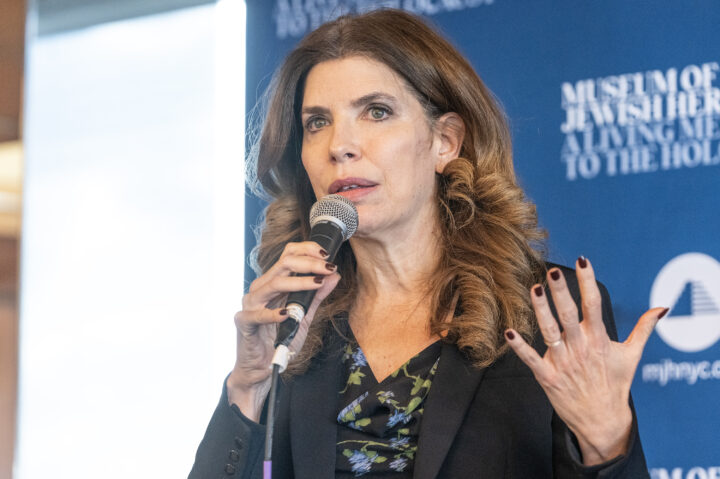
Lev Radin/Pacific Press/LightRocket via Getty Images
Council member Julie Menin speaks during rally of 240 Holocaust survivors for 240 hostages kidnapped by Hamas during terrorist attack on Israel on October 7, 2023.
Good Wednesday afternoon!
This P.M. edition is reserved for our premium subscribers — offering a forward-focused read on what we’re tracking now and what’s coming next.
It’s me again — Danielle Cohen-Kanik, U.S. editor at Jewish Insider and curator, along with assists from my colleagues, of the Daily Overtime. Please don’t hesitate to share your thoughts and feedback by replying to this email.
📡On Our Radar
Notable developments and interesting tidbits we’re tracking
Qatar is the top country donating foreign funds to American universities, and Cornell University is its leading recipient, Jewish Insider’s Haley Cohen reports.
According to a new dashboard from the Department of Education, Qatar holds the No. 1 spot for funds provided to U.S. universities at a whopping $6.6 billion — $2.3 billion of which has gone to Cornell, making up the vast majority of the school’s $3 billion in foreign funding. Qatar has provided significantly more funds than the next leading countries, bolstering criticisms of the Gulf state’s influence over American higher education…
Secretary of State Marco Rubio met with Saudi Foreign Minister Prince Faisal bin Farhan Al-Saud this afternoon “to advance ongoing bilateral cooperation” following President Donald Trump’s meeting with Saudi Crown Prince Mohammed bin Salman in November. Rubio and Al-Saud discussed issues including Gaza, Yemen, Sudan and Syria, according to a State Department readout.
The Saudi foreign minister also met with lawmakers on the Hill, including Reps. Brian Mast (R-FL) and Gregory Meeks (D-NY), the chair and ranking member of the House Foreign Affairs Committee…
Trump is expected to kick off the second phase of the Gaza peace plan next week, Axios reports, including announcing the formation of the Gaza Board of Peace. Among the countries expected to participate are the U.K., Germany, France, Italy, Saudi Arabia, Qatar, Egypt and Turkey, with former U.N. envoy to the Middle East Nikolay Mladenov at the helm…
In a Truth Social post this afternoon, Trump called for the U.S. defense budget to be raised to $1.5 trillion in 2027, an increase of approximately 50% from his 2026 request…
Likud lawmaker Dan Illouz, in a speech to the Knesset on Monday, warned the American right about the dangers of rising antisemitism within its ranks, JI’s Lahav Harkov reports.
“I stand here in Jerusalem to sound an alarm,” Illouz said. “We are used to enemies from the outside … but today, I look at the West — our greatest ally — and I see a new enemy rising from within.” Illouz, who was born and raised in Montreal, took the unusual step of speaking from the lectern in English.
The right-wing lawmaker called for American conservatives to reject what he called the “poison” of Tucker Carlson and Candace Owens, mentioning the podcasters by name. “They claim to fight the ‘woke left.’ They are no different than the woke left,” Illouz argued. “The woke left tears down statues of Thomas Jefferson, the woke right tears down statues of Winston Churchill … It is the same hatred of the West dressed up in a different costume”…
New York City Councilmember Julie Menin was unanimously voted speaker of the council today, as expected, after she announced in November that she had garnered enough support to secure the position.
Shortly after being elected, Menin, the first Jewish council speaker in the city with the largest Jewish population in the world, said she will look to codify legislation to protect the Jewish community, including establishing safe perimeters for protests around synagogues…
A new poll by the Honan Strategy Group found Jewish and non-Jewish New York voters split in their views about New York City Mayor Zohran Mamdani, the Forward reports. Fifty-five percent of non-Jewish respondents said Jews who say they feel threatened by Mamdani’s views on Israel are overreacting, while 53% of Jewish respondents said they are justified to feel that way. Fifty-one percent of Jews said Mamdani’s election is a troubling sign that antisemitism is being normalized, while 61% of non-Jews see it as evidence of healthy debate and diversity…
The New York Times lays out an ongoing lawsuit in New York over redistricting that could see the 11th Congressional District redrawn, which could impact the boundaries of Rep. Dan Goldman’s (D-NY) neighboring district and further complicate his reelection prospects…
In New Jersey, congressional candidates are raking in donations for what’s shaping up to be one of the state’s most expensive primary cycles ever. In the special election in the state’s 11th Congressional District to replace Gov.-elect Mikie Sherrill, former Rep. Tom Malinowski (D-NJ) announced he’s raised more than $1 million in the two months since he launched his bid.
Three Democratic candidates vying for Malinowski’s old seat in the neighboring 7th District, now held by Rep. Tom Kean Jr. (R-NJ), have also raised over $1 million each, including former Navy pilot Rebecca Bennett. The large fundraising hauls are unusual for an off year, though Democrats see the 7th as a promising opportunity to flip a House seat, given that the swing district narrowly voted for Sherrill, a Democrat, in November…
Pennsylvania state Sen. Doug Mastriano, a far-right Republican, announced today he will not pursue a rematch against Gov. Josh Shapiro, to whom he lost decisively in the 2022 gubernatorial race, amid speculation that he would once again seek the office…
Warner Bros. rejected a hostile takeover bid from Paramount, in the latest development in the battle to acquire the media giant. The company’s board voted to maintain its existing deal with Netflix for $72 billion, calling Paramount’s amended $77.9 billion offer with a personal guarantee from Larry Ellison “inadequate”…
⏩ Tomorrow’s Agenda, Today
An early look at tomorrow’s storylines and schedule to keep you a step ahead
Keep an eye out in Jewish Insider for a look at the dynamics that may play out between New York City Mayor Zohran Mamdani and the newly inaugurated City Council Speaker Julie Menin as she plays a critical role in potentially providing a check against the mayor’s policy agenda.
Temple Emanu-El’s Streicker Center in New York City will host a screening of the documentary “The Road Between Us” about Gen. Noam Tibon’s historic rescue of his family amid the Oct. 7, 2023, Hamas terror attacks, as well as a discussion with Tibon and director Barry Avrich. Read JI’s interview with Tibon and Avrich.
Stories You May Have Missed
REASONS AND RAMIFICATIONS
Why Israel recognized Somaliland — and what the rest of the world might do next

After Israel announced it would recognize the secessionist region, the big question remains whether the United States will follow suit
SAME AS THE OLD BOSS
New Venezuelan president signals similar anti-American foreign policy as Maduro

At a swearing-in ceremony on Monday, interim President Delcy Rodríguez appeared to embrace the ambassadors of Iran, China and Russia
Plus, New York candidates get in the midterm mood

Morteza Nikoubazl/NurPhoto via Getty Images
An anti-U.S. and Israeli billboard depicting symbolic images of coffins of U.S. and Israeli soldiers, alongside a statement from the Speaker of Iran's Parliament, Ali Larijani, that reads, ''Watch out your soldiers,'' hangs from a state building in downtown Tehran, Iran, on January 6, 2026.
Good Tuesday afternoon!
This P.M. edition is reserved for our premium subscribers — offering a forward-focused read on what we’re tracking now and what’s coming next.
It’s me again — Danielle Cohen-Kanik, U.S. editor at Jewish Insider and curator, along with assists from my colleagues, of the Daily Overtime. Please don’t hesitate to share your thoughts and feedback by replying to this email.
📡On Our Radar
Notable developments and interesting tidbits we’re tracking
Bolstering concerns that Iran could attempt to strike Israel to rally domestic support amid nationwide protests, Iran’s Defense Council warned today that Tehran could act against its “long-standing enemies” over their “hostile behavior.”
The body, formed after the June war with Israel, said in a statement that “Iran’s security, independence and territorial integrity are an uncrossable red line, and any aggression or continuation of hostile behavior will be met with a proportionate and decisive response.”
“The long-standing enemies of this land” are “repeating and intensifying threatening language and interventionist statements in clear conflict with the accepted principles of international law, which is aimed at dismembering our beloved Iran and harming the country’s identity,” the statement continued, as President Donald Trump has threatened to intervene if Iran cracks down on the protesters…
Wrapping up a U.S.-mediated dialogue in Paris, Israel and Syria made progress towards improving relations as they agreed to accelerate the pace of negotiations going forward, considered a U.S. proposal to establish a demilitarized joint economic zone and agreed to set up a communication mechanism to facilitate coordination on military deescalation, intelligence sharing and diplomacy…
Domestically, midterm election year is in full swing: Rep. Dan Goldman (D-NY) officially launched his reelection bid today in New York’s 10th Congressional District, highlighting the date as the fifth anniversary of the Jan. 6, 2021, Capitol riot and his role as the House’s lead counsel during Trump’s first impeachment.
Goldman came out of the gate against his opponent, former New York City Comptroller Brad Lander, with a slew of endorsements, including New York Gov. Kathy Hochul, House Minority Leader Hakeem Jeffries (D-NY), House Minority Whip Katherine Clark (D-MA) and House Democratic Caucus Chair Pete Aguilar (D-CA).
Goldman told The New York Times that he understood his continued support for Israel “ran the risk of engendering a primary” in his progressive district but that he made his decisions based on “what I genuinely thought was best for the state of Israel, the people of Israel, Palestinian civilians and the future state of Palestine”…
Nearby in New York’s 12th Congressional District, George Conway, a former Republican lawyer and prominent critic of Trump who launched his run today as a Democrat, raised several concerns about New York City Mayor Zohran Mamdani’s approach to Israel and antisemitism in recent interviews, Jewish Insider’s Matthew Kassel reports.
Conway, who recently relocated to Manhattan in order to run for the seat being vacated by retiring Rep. Jerry Nadler (D-NY), said in an interview with The New York Times that he was “disturbed” by Mamdani’s sharp criticisms of Israel, even as he called the mayor “a great politician” and voiced admiration for his “focus on affordability.”
Conway added in an interview with NBC News that he was “concerned about some of the language” Mamdani has “used in the past about Israel,” as well as the mayor’s recent decision to revoke a pair of executive orders related to Israel and antisemitism on his first day in office. “His focus really has to be on bringing people together,” Conway said of Mamdani, “not sending the wrong message to individual groups of people”…
In the crowded Democratic primary in New York’s 17th Congressional District to take on Rep. Mike Lawler (R-NY), Peter Chatzky, the deputy mayor of Briarcliff Manor, injected $5 million of his own money into his campaign, Politico reports. Chatzky has stood out from the crowd in the competitive swing district in the northern suburbs of New York City with his comparatively critical stance of Israel.
Cait Conley, meanwhile, a national security veteran strongly supportive of Israel who is considered one of the front-runners in the seven-person race to take on Lawler, announced yesterday that she raised more than $560,000 in the last quarter of 2025 and has over $1.2 million in cash on hand…
Former Rep. Mary Peltola (D-AK) is considering mounting a run for Senate to challenge Sen. Dan Sullivan (R-AK), Axios reports. Peltola narrowly lost her seat in 2024 when Trump carried the state in the presidential election; if she does make a bid, she would give Democrats the opportunity to contest a red-state race, giving them an outside shot to win back the upper chamber…
Rep. Doug LaMalfa (R-CA) died today at 65, Republican leadership announced. AIPAC mourned him as “an outspoken pro-Israel leader in Congress.” The congressman’s seat, a largely rural district he represented since 2013, was redrawn last year to be more favorable to Democrats, but a special election to fill his seat will be held under the old map friendlier to Republicans due to the timing of the vacancy…
Speaking at a press conference on the latest crime statistics out of New York City, NYPD Commissioner Jessica Tisch, standing next to Mamdani, said that antisemitic hate crimes in the city declined 3% from 2024 to 2025 but, at 57%, still make up the majority of all hate crimes reported…
In an interview released today on CNN commentator Scott Jennings’ podcast, Vice President JD Vance, asked about the rise of antisemitism in the conservative movement, said, “we need to reject all forms of ethnic hatred, whether it’s antisemitism, anti-Black hatred, anti-white hatred,” JI’s Danielle Cohen-Kanik reports.
“I think that’s one of the great things about the conservative coalition, is that we are, I think, fundamentally rooted in the Christian principles that founded the United States of America and one of those very important principles is that we judge people as individuals,” Vance continued…
⏩ Tomorrow’s Agenda, Today
An early look at tomorrow’s storylines and schedule to keep you a step ahead
Keep an eye out in Jewish Insider for a deep dive into the geopolitical ramifications of Israel’s choice to formally recognize the African nation of Somaliland — and whether the U.S. might follow suit.
The New York City Council will vote to elect its speaker tomorrow, which is widely expected to be Councilmember Julie Menin. Menin, who will be the first Jewish speaker of the council, has already begun to push back on Mayor Zohran Mamdani, expressing her concern to him over his repeal of former Mayor Eric Adams’ executive orders related to Israel and antisemitism.
In Washington, the Atlantic Council will host a discussion on the “future of humanitarian assistance,” including remarks from IsraAID CEO Yotam Polizer.
Stories You May Have Missed
TORAH AND BENCH
The judge overseeing the Maduro trial blazed a trail for Jewish lawyers

Judge Alvin Hellerstein became a law clerk because firms would not hire an Orthodox lawyer; now, he cites Torah from the bench
DRAWING LINES
Bruce Blakeman outlines his approach to antisemitism if elected NY governor
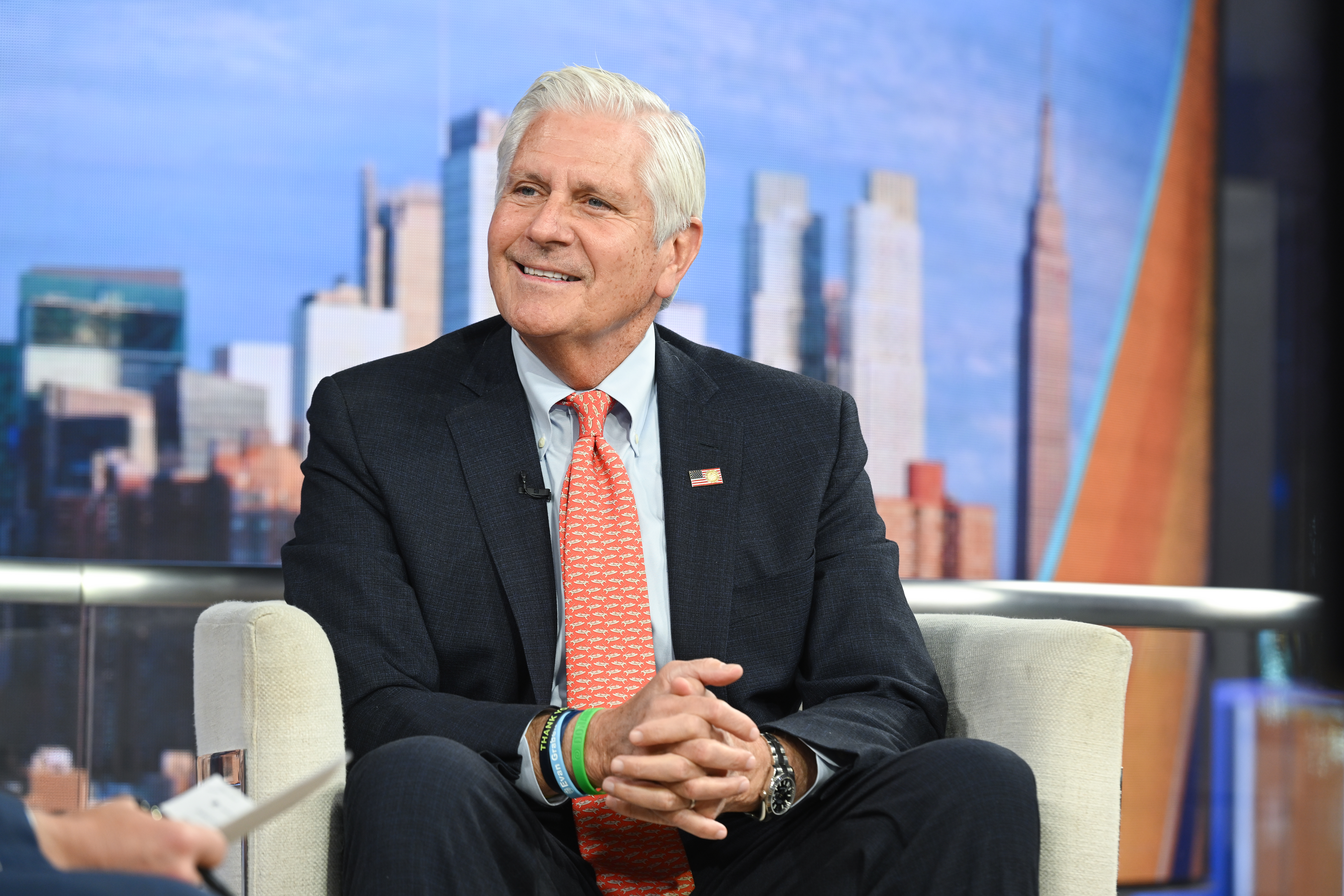
Asked about right-wing antisemitism, Blakeman said that Tucker Carlson ‘is a big blowhard who has an issue with Jewish people’
One source said the mayor plans to replace Moshe Davis as NYC’s top antisemitism official
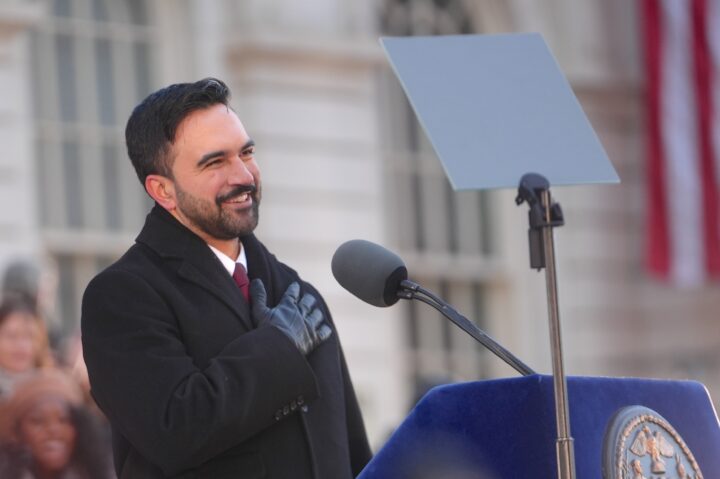
Selcuk Acar/Anadolu via Getty Images
Mayor Zohran Mamdani at his inauguration ceremony at City Hall, Manhattan, New York City, United States on January 1, 2026.
Days into Zohran Mamdani’s first week as mayor of New York City, some Jewish leaders are privately raising questions about whether his fledgling administration is prepared to implement a clear strategy to counter rising antisemitism, one of the key pledges of his campaign.
Even as he swiftly moved to revoke two executive orders tied to Israel and antisemitism on his first day in office, Mamdani has yet to disclose how he and his team plan to substantively address what he has repeatedly called “the scourge of antisemitism” in remarks vowing to protect Jewish New Yorkers.
The mayor, a democratic socialist and outspoken critic of Israel, faced backlash from leading Jewish groups last week after he repealed executive orders issued by former Mayor Eric Adams, including ones that adopted a working definition of antisemitism used by the International Holocaust Remembrance Alliance and banned city agencies from engaging in boycotts targeting Israel.
“He went from giving a speech about unity and collectivism to signing executive orders against the Jewish community,” one Jewish community leader said of Mamdani’s repeals.
Another Jewish leader in touch with Mamdani’s team echoed others who have emphasized that his advisers “need a plan” to counter antisemitism and that proposing a strategy is “important and should happen soon.”
The response so far has been limited. “A lot of ‘Yes, thanks for the feedback,’” the Jewish leader relayed. “I suspect they know and are working on it.”
While Mamdani also announced he would retain the office to combat antisemitism created last year by the Adams administration, he has otherwise not shared additional details about how it will be staffed or what specific issues it will prioritize.
Moshe Davis, who led the office under Adams, told Jewish Insider on Monday that he was “at his desk in City Hall,” but had not “heard much else” about the future of the office or his role in it. He said that on Friday he had distributed to officials an 80-page report produced by the office under Adams and publicly released last week.
The new report includes plans that Mamdani would likely oppose, such as training for all city employees on the IHRA definition, which labels some criticism of Israel as antisemitic.
One person familiar with the matter, who has spoken with Mamdani’s team, said that Davis will not be asked to continue on as the office’s executive director. Phylisa Wisdom, executive director of New York Jewish Agenda, a progressive Zionist group, is rumored to be a front-runner for the role, though no final decisions have been made, the source told JI.
Wisdom said that she was not familiar with the hiring process, but looks “forward to seeing how the Mamdani administration plans to tackle what he has rightly called the ‘scourge of antisemitism’ facing our city.”
“This will require a comprehensive strategy,” she told JI on Monday, noting that the office to combat antisemitism “can play a key role, coordinating between long-standing offices and agencies tasked with combating hate, and input from the diversity of New York’s Jewish community.”
A spokesperson for Mamdani did not respond to a request for comment on Monday.
Other Jewish community leaders said they were now waiting to learn more about Mamdani’s plans for the office — which could shed early light on his approach to antisemitism as he enacts his agenda.
“Haven’t heard anything beyond that he will retain the office but make some changes,” said one Jewish leader, who was unaware of what the changes would entail.
Mamdani, in defending his decision to revoke the executive orders, said last week his administration “will be relentless in its efforts to combat hate and division, and we will showcase that by fighting hate across the city.”
“That includes fighting the scourge of antisemitism by actually funding hate crime prevention, by celebrating our neighbors and by practicing a politics of universality,” he added during a Friday press conference.
Rabbi Joe Potasnik, executive vice president of the New York Board of Rabbis who served on Mamdani’s transition committee for emergency response, said he was taking a wait-and-see approach to the first few weeks of the administration. “No further details have been released so there is nothing more to add at this time,” he told JI. “Let’s wait and see if there are changes.”
Amy Spitalnick, the CEO of the Jewish Council for Public Affairs, said that the administration “has a real opportunity to not just signal its commitment to Jewish safety but to take real action.”
“From increased investment in hate crimes prevention to expansion of proven education tools, Mayor Mamdani can build this office into a hub to advance a comprehensive strategy to counter antisemitism and advance Jewish inclusion and safety,” she told JI.
Plus, the Harvard president's mea culpa

Bryan Dozier/Deadline via Getty Images
Amy Klobuchar, John Bessler and Tim Walz at the Residence of Ireland on April 27, 2024 in Washington, D.C.
Good Monday afternoon!
This P.M. edition is reserved for our premium subscribers — offering a forward-focused read on what we’re tracking now and what’s coming next.
It’s me again — Danielle Cohen-Kanik, U.S. editor at Jewish Insider and curator, along with assists from my colleagues, of the Daily Overtime. Please don’t hesitate to share your thoughts and feedback by replying to this email.
📡On Our Radar
Notable developments and interesting tidbits we’re tracking
Dominating the headlines, deposed Venezuelan President Nicolás Maduro and his wife pleaded not guilty to charges including narco-terrorism during their arraignment in New York City today. “I am still president of my country,” Maduro told the judge, who set their next hearing for March 17.
At the same time, Vice President Delcy Rodríguez, whom the Trump administration has said it will work with, was sworn in as interim president in Caracas, though she insisted that Maduro is still president and that he is being held hostage by the U.S…
Minnesota Gov. Tim Walz announced today that he will no longer seek reelection to a third term after facing weeks of criticism due to revelations of widespread fraud primarily among the state’s Somali diaspora population.
“I came to the conclusion that I can’t give a political campaign my all. Every minute I spend defending my own political interests would be a minute I can’t spend defending the people of Minnesota against the criminals who prey on our generosity and the cynics who prey on our differences,” Walz, who has increasingly played to the progressive wing of the Democratic Party, said in his announcement.
Sen. Amy Klobuchar (D-MN), a moderate with a record of winning over independent voters, is considering running for governor in his stead, after she and Walz met yesterday. On the Republican side, MyPillow CEO Mike Lindell and Speaker of the Statehouse Lisa Demuth are already vying for the office…
New York City Mayor Zohran Mamdani denied that his executive order altering the relationship between the NYPD and his office — which appeared to indicate that NYPD Commissioner Jessica Tisch would no longer report to him but to a deputy mayor — will be meaningful in its impact, telling reporters today that the commissioner “will continue to report directly to me … The executive order is in terms of the question of coordination.”
The direct line between the mayor and NYPD head has been in place at least since the terror attacks of 9/11, after which the commissioner began to hold daily intelligence briefings for the mayor. The National Jewish Advocacy Center called the restructuring “unprecedented” in a letter to Mamdani and said that “The close relationship between the NYPD and the Mayor’s Office has been key to averting disasters for the Jewish community,” including during Hanukkah last month.
The move came as Mamdani revoked an executive order adopting the International Holocaust Remembrance Alliance’s working definition of antisemitism and an anti-Boycott, Divestment and Sanctions order, which also drew backlash from Jewish leaders…
Meanwhile, in one of his final acts in office, Virginia Attorney General Jason Miyares sent a letter today reminding all K-12 superintendents and school boards in the state of their obligation to adopt the IHRA definition of antisemitism into their codes of conduct and discrimination policies, Jewish Insider’s Haley Cohen reports.
“As part of your compliance with Federal and Virginia law, you must implement the IHRA definition and its contemporary examples into your codes of conduct and discrimination policies to assess unprotected activity,” Miyares wrote, referencing a law passed by the state legislature in May 2023 requiring use of the IHRA definition by all state agencies…
Harvard President Alan Garber said that the university was wrong to let professors express strong stances on controversial issues in the classroom, causing students to feel they couldn’t share their views, including faculty espousing anti-Israel views in the wake of the Oct. 7 attacks. “It did happen in classrooms that professors would push this,” he said in a live taping of the Shalom Hartman Institute’s “Identity/Crisis Podcast” last month…
Leslie Grinage, Barnard’s dean and vice president of campus life and student experience, left her position today, the Columbia Spectator reports, after she came under intense criticism for her role in disciplining students who had violated school rules during anti-Israel protests on campus. Dozens of protesters staged a sit-in outside her office last year to demand the reinstatement of two students who were expelled after they disrupted a History of Modern Israel class…
Speaking in the Knesset today, Israeli Prime Minister Benjamin Netanyahu said he and President Donald Trump “will not allow Iran to rebuild its ballistic missile industry, and we certainly won’t let it renew its nuclear program” and that the two leaders agree that Iran must have no enrichment capabilities, all of its enriched uranium must be sent out of the country and there must be close oversight of its nuclear facilities…
Netanyahu also met with Rep. Josh Gottheimer (D-NJ) in Jerusalem today…
The Israel Defense Forces and Moroccan Armed Forces signed a joint work plan for 2026 during the third meeting of their Joint Military Committee in Tel Aviv this week…
A man was arrested for vandalizing the personal residence of Vice President JD Vance in Cincinnati this morning. Nobody was home at the time. “As far as I can tell, a crazy person tried to break in by hammering the windows. I’m grateful to the secret service and the Cincinnati police for responding quickly,” Vance said on X…
⏩ Tomorrow’s Agenda, Today
An early look at tomorrow’s storylines and schedule to keep you a step ahead
Keep an eye out in Jewish Insider for a look at Judge Alvin Hellerstein, the 92-year-old Orthodox Jewish federal judge overseeing the trial of Venezuelan President Nicolás Maduro.
The Academic Engagement Network is convening a three-day “boot camp” in Miami Beach this week for university faculty combating antisemitism and anti-Zionism on campus. Speakers will include Israeli journalist Nadav Eyal, the Atlantic Council’s Ahmed Fouad Alkhatib, antisemitism researcher Miri Bar-Halpern and past president of the American Association of University Presidents Cary Nelson.
Tomorrow, former Israeli Strategic Affairs Minister Ron Dermer and commentator Dan Senor will speak about “Israeli strategy in war and peace” in West Palm Beach, Fla., for the Palm Beach Synagogue’s “Critical Conversation Series.”
Stories You May Have Missed
DOMINO EFFECT
Toppling Maduro may weaken Iran’s hold in Latin America

Caracas served as the hub of Tehran’s operations in the Western Hemisphere
ON THE AGENDA
Security remains Jewish community’s top lobbying priority for 2026
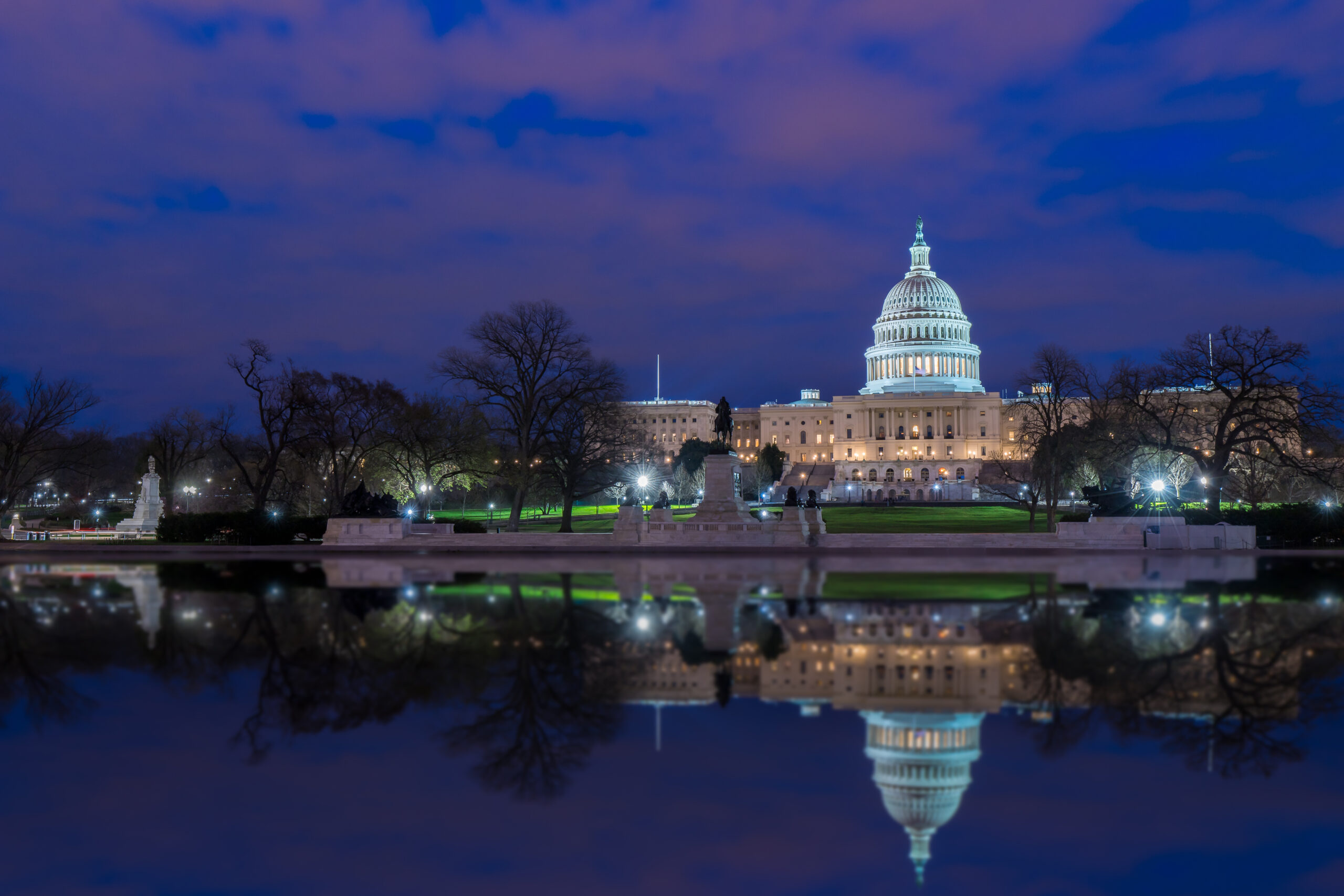
Major Jewish advocacy organizations told JI that they will continue to push for issues including Nonprofit Security Grant Program funding and combating antisemitism online
Plus, Mamdani's first mayoral moves rankle Jewish community

Nicole Combeau/Bloomberg
A resident holds a newspaper with news about ousted Venezuelan President Nicolas Maduro during a celebration at El Arepazo in Doral, Florida, US, on Sunday, Jan. 4, 2026.
Good Monday morning.
In today’s Daily Kickoff, we look at what the Trump administration’s capture of Venezuelan President Nicolás Maduro could mean for Iran’s influence in South America, and report on New York City Mayor Zohran Mamdani’s first days in office, which included the revocation of executive orders on supporting Israel and combating antisemitism. We have the exclusive on AIPAC’s appointment of Deryn Sousa as the organization’s new spokesperson, succeeding Marshall Wittmann, and report on Jewish communal priorities on Capitol Hill in the new year. Also in today’s Daily Kickoff: Julie Menin, Rabbi Zvi Hershcovich and Este Haim.
Today’s Daily Kickoff was curated by Jewish Insider Executive Editor Melissa Weiss and Israel Editor Tamara Zieve, with assists from Danielle Cohen-Kanik and Marc Rod. Have a tip? Email us here.
What We’re Watching
- As Congress returns this week, we’ll be keeping an eye on the Hill’s response to the ongoing wave of protests across Iran, the ripple effects of the Trump administration’s arrest of Venezuelan President Nicolás Maduro and the emerging rift among the U.S.’ Gulf allies.
- Following the winter break, lawmakers’ top priority now will be finalizing a deal on government funding before the end-of-month deadline. It’s looking less likely that we’ll see a repeat of last year’s extended government shutdown. There are still plenty of areas to be negotiated between the two chambers, including security grant funding, United Nations funding and funding levels for U.S.-Israel cooperative programs.
- We’re keeping an eye on the ongoing protests in Iran. Speaking to reporters on Air Force One last night, President Donald Trump reiterated his recent comments that the U.S. would intervene if Iranian officials were to kill protesters, having said on his Truth Social site on Friday that “If Iran shoots and violently kills peaceful protesters, which is their custom, the United States of America will come to their rescue.”
- Venezuelan President Nicolás Maduro is scheduled to make his first appearance in U.S. federal court at 12 p.m. ET today, where he will appear before Judge Alvin Hellerstein, a 92-year-old Orthodox Jewish federal judge.
- Minnesota Gov. Tim Walz, who had been planning a 2026 reelection bid, is set to make an announcement regarding his political future this morning, a day after meeting with Sen. Amy Klobuchar (D-MN). The impromptu press conference comes as Walz’s administration faces criticism and an investigation into widespread fraud centered around the state’s Somali diaspora population.
- U.S. Ambassador to Turkey and Syria envoy Tom Barrack is mediating talks in Paris today between senior Israeli and Syrian officials, aimed at reaching a security agreement between the countries.
What You Should Know
A QUICK WORD WITH JI’S MELISSA WEISS
As protests continue to spread throughout Iran and the geopolitical repercussions of the Trump administration’s capture of Venezuelan President Nicolás Maduro ripple across world capitals, the sentiment around the Middle East and in Washington is that renewed conflict with the Islamic Republic may well be on the horizon.
While smaller than previous nationwide protests in 2019 and 2022, the newest demonstrations come as Iran is facing economic instability, crushing international sanctions and record droughts. The protests that have spread across the country in recent days are the first major demonstrations since the 12-day war between Iran and Israel, with an assist from the U.S., last June that damaged the Islamic Republic’s nuclear program and further destabilized Iran.
The protests in Iran were already gaining steam at the time a Delta Force team apprehended Maduro and his wife on Saturday and brought them to the U.S. to stand trial on drug trafficking charges. But the Trump administration’s decision to send elite forces into Caracas and forcibly remove Maduro signals to Tehran — as well as Moscow and Beijing — that Washington is taking a tougher approach to regimes it sees as destabilizing and threatening to U.S. interests.
The world is watching this geopolitical high-wire act with wariness. In Israel, officials are closely monitoring the instability in Iran, concerned that the regime in Tehran could move to strike Israel in an effort to consolidate domestic support and quell the protests; Israel could also see a window of opportunity to strike Iran at a weak moment, either of which could reignite warfare between Jerusalem and Tehran.
It was less than a week ago that Israeli Prime Minister Benjamin Netanyahu met with President Donald Trump at his Mar-a-Lago resort in Florida and discussed the threat posed by Iran’s ballistic missile program.
In his weekly Cabinet meeting yesterday, Netanyahu addressed Iran in the context of his Palm Beach meeting last week, saying that Israel “reiterated our joint position of zero enrichment on one hand, and the need to remove the 400 kilograms of enriched material from Iran and oversee the sites with tight and genuine supervision.”
Noting that his sit-down with Trump was taking place as anti-government protests broke out in Iran, Netanyahu added, “The Government of Israel, the State of Israel, and my policy, we identify with the struggle of the Iranian people, with their aspirations for freedom, liberty, and justice. It is very possible that we are standing at the moment when the Iranian people are taking their fate into their own hands.”
DOMINO EFFECT
Toppling Maduro may weaken Iran’s hold in Latin America

The U.S.’ capture of Venezuelan President Nicolás Maduro on Saturday is expected to weaken Iran’s terrorism efforts, weapons production and economic activity in Latin America, experts say. With Vice President Delcy Rodriguez taking power — and the Trump administration expressing willingness to work with her — it remains unclear whether Maduro’s regime will largely remain intact with American supervision or if the government will ultimately be replaced by the democratic opposition, led by Nobel Peace Prize recipient Maria Corina Machado, or someone else, Jewish Insider’s Lahav Harkov reports.
Expected impact: Emanuele Ottolenghi, senior research fellow at the Center for Research on Terror Financing, told JI that “if the regime remains in place [under Washington’s supervision], there will have to be adjustments in its regional posture and foreign policy. That means, of course, the role that nefarious foreign actors such as China, Russia, Cuba and Iran played in Venezuela will change.” Danny Citrinowicz, a senior researcher at the Institute for National Security Studies at Tel Aviv University, told JI that “the Iranians turned Venezuela into a strategic hub, and now that has disappeared.”
Bonus: Politico talks to Vandenberg Coalition head Carrie Filipetti, who served as principal deputy assistant secretary of state for Cuba and Venezuela during the first Trump administration, about the apprehension of Maduro and potential next steps for the U.S. vis-à-vis its Venezuela policy.
shifting alliances
Saudi Arabia pivots from moderation

Saudi Arabia is recalibrating its regional posture in ways that are challenging long-held assumptions about Riyadh’s role as a moderating force in the Middle East, as recent moves across Yemen, Sudan and the Horn of Africa expose the country’s widening rift with the United Arab Emirates and a growing alignment with Qatar and Turkey — two countries with openly hostile positions toward Israel, Jewish Insider’s Emily Jacobs, Lahav Harkov and Matthew Shea report.
Series of events: The realignment has been most stark on the issue of Yemen, where Saudi Arabia led an airstrike on an Emirati shipment of vehicles last week that Riyadh claimed was intended for the UAE-backed Southern Transitional Council (STC), which has consolidated power in the country’s south as Saudi-backed efforts to stabilize the war-torn nation have stalled. Hours after the strike, the Emirati government announced it would withdraw its remaining troops from the country. The Saudis’ decision to embrace Islamist-aligned factions in Sudan, where the UAE is aligned with rival forces, has caused additional fissures with the Emiratis, putting the two U.S. allies and Gulf power players at odds. The Gulf states have also taken opposite sides on Somalia, with the UAE quietly supportive of Somaliland, while Saudi Arabia condemned Israel for recognizing its independence.
Qatari condolences: Qatari Education Minister Lolwah Al-Khater publicly mourned the death of Huthayfa Samir Abdullah Al-Kahlout, a senior Hamas military spokesman who served as the public face of the group’s media strategy during the war in Gaza, drawing renewed scrutiny of Qatar’s ties to the militant group, Jewish Insider’s Matthew Shea reports.
DAY ONE DOOZY
Mamdani slammed for repealing antisemitism executive orders

Newly inaugurated New York City Mayor Zohran Mamdani is facing criticism for repealing executive orders issued by former Mayor Eric Adams aimed at tackling antisemitism, including implementing the International Holocaust Remembrance Alliance’s working definition of antisemitism and an anti-Boycott, Divestment and Sanctions order. The revocation of those orders came as part of a blanket repeal of all of Adams’ executive orders following his September 2024 indictment on federal corruption charges, Jewish Insider’s Marc Rod reports.
Community reaction: In a joint statement, the UJA-Federation of New York, Jewish Community Relations Council of New York, American Jewish Committee of New York, Anti-Defamation League of New York/New Jersey, Agudath Israel of America, the New York Board of Rabbis and the Orthodox Union said that the Jewish community “will be looking for clear and sustained leadership that demonstrates a serious commitment to confronting antisemitism and ensures that the powers of the mayor’s office are used to promote safety and unity, not to advance divisive efforts such as BDS.” The statement continued, “Singling Israel out for sanction is not the way to make Jewish New Yorkers feel included and safe, and will undermine any words to that effect.”
Bonus: The New York Times reports that Mamdani’s decision to issue a blanket revocation of Adams’ executive orders was made in an effort to alleviate anger by Jewish groups over the rescinding of the two orders related to Israel and antisemitism.
EXCLUSIVE
AIPAC appoints Deryn Sousa as spokesperson

The American Israel Public Affairs Committee appointed Deryn Sousa as spokesperson, replacing Marshall Wittmann, who retired at the end of 2025 after 13 years in the role. Sousa steps into the public-facing position during a time when AIPAC is regularly in the spotlight — and as the powerful pro-Israel organization faces outsized criticism from the far left and far right over its influence in the American political system, Jewish Insider’s Gabby Deutch reports.
Background: Sousa reflects a different career trajectory than that taken by Wittmann, who came to AIPAC toward the end of his career after decades working in politics in Washington, including as communications director for Sens. Joe Lieberman (I-CT) and John McCain (R-AZ). Sousa has worked for AIPAC for a decade, having joined the organization soon after she graduated from the University of Georgia, where she studied Arabic and international affairs. She moved to Washington for the spokesperson role from Houston, where she served until recently as AIPAC’s Southwest regional political director.
MONEY IN THE BANK
Massie challenger raises $1.2 million in final quarter of 2025
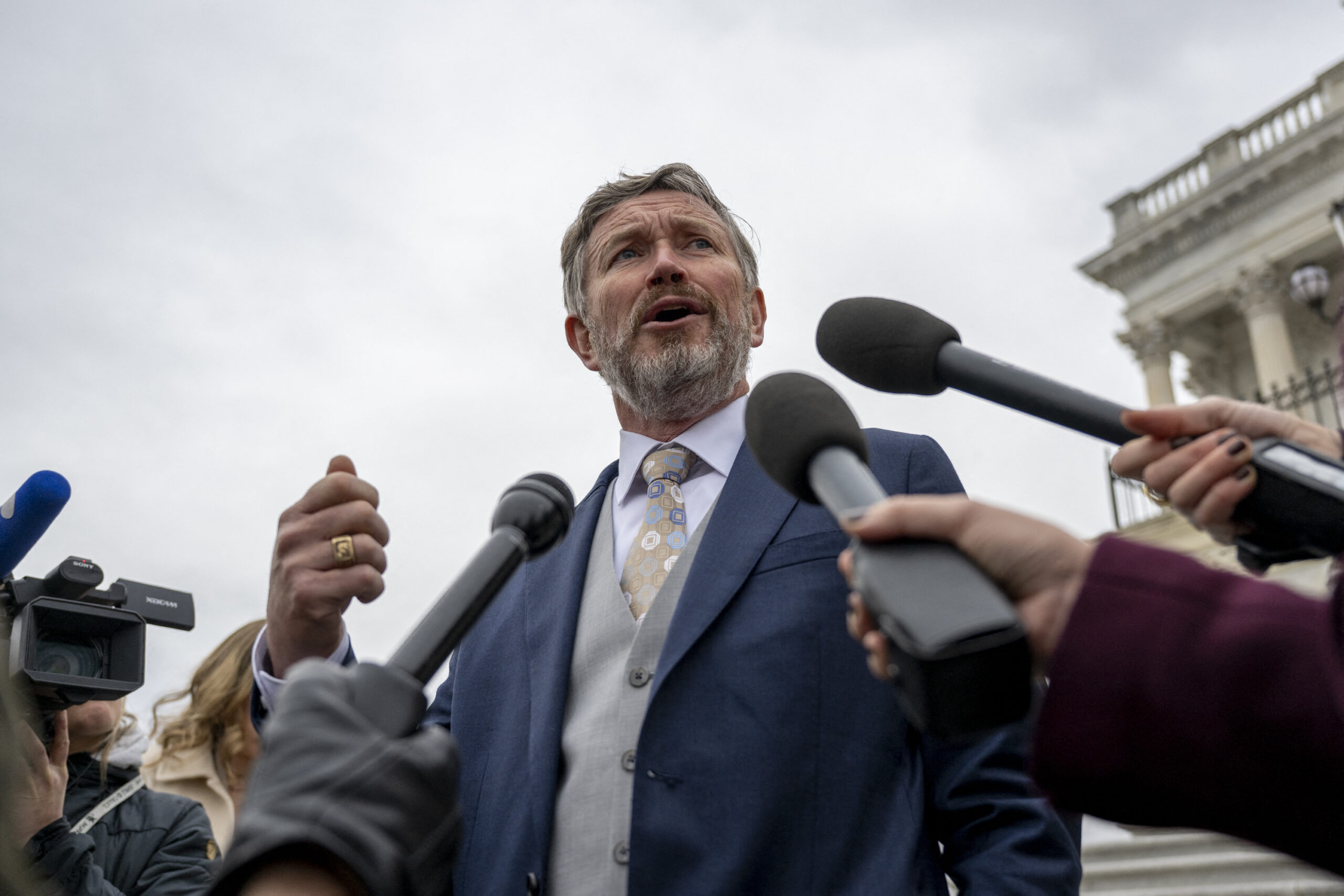
Ed Gallrein, the Republican primary challenger to Rep. Thomas Massie (R-KY) backed by President Donald Trump, said Friday that he had raised $1.2 million in the final quarter of 2025, a sizable sum that puts him in strong financial shape in preparation for a grueling race against Massie. Gallrein’s fundraising haul signals that he’s a more viable candidate than Massie’s previous challengers, and highlights the power of Trump’s endorsement, Jewish Insider’s Marc Rod reports.
Moving against Massie: Trump and his allies have also committed significant resources to the effort to defeat Massie, an isolationist Republican who has frequently opposed legislation to combat antisemitism and has broken with Trump on many key elements of his agenda, including on issues related to Israel and Iran. “This fundraising number reflects the overwhelming support Ed’s campaign has received right out of the gate,” Gallrein spokesperson Lance Trover said in a statement. “President Trump endorsed Ed because he knows Ed is fighting to put America First and will partner with him to unleash our economy, lower taxes, and stop the woke agenda.”
ON THE AGENDA
Security remains Jewish community’s top lobbying priority for 2026

Going into 2026, Jewish community groups said their advocacy priorities for Congress and the federal government remain largely consistent, with a focus across many of the major advocacy organizations on bolstering community security through the Nonprofit Security Grant Program and tackling antisemitism online, Jewish Insider’s Marc Rod reports.
The hurdles: While Congress has increased its attention to Jewish communal issues in the years since the Oct. 7, 2023, Hamas attacks on Israel, including a string of high-profile hearings on antisemitism and several bills passed to support Israel and combat Iran, many key legislative priorities for the Jewish community — including bills on antisemitism and substantial increases to annual security funding for nonprofits — have remained stubbornly intractable.
Worthy Reads
American Muscle: Politico’s Sophia Cai, Felicia Schwartz, Dasha Burns and Eric Bazail-Eimil posit that the Trump administration is taking a more hawkish approach to foreign policy in its second term. “The Saturday morning raid is a brazen escalation of U.S. involvement in a foreign country that landed the same weekend Trump publicly threatened to defend Iranian demonstrators against their own government. It serves as a fitting coda to Trump’s first year back in power, one marked by dramatically more involvement in foreign conflicts than candidate Trump or first-term Trump predicted. … Still, the move against [Nicolás] Maduro would have been almost unimaginable during Trump’s first term and during the heat of the 2024 campaign, when Trump adopted the views of restrainers who were skeptical of unconditional aid to Ukraine and spoke of the need to stop engaging in ‘forever wars.’” [Politico]
The Ties That Bind: In The Wall Street Journal, Armin Rosen observes the relationship between Somaliland and Israel, the latter of which was the first country to recognize Hargeisa’s independence last month. “Across 1,600 miles of distance, there is a surprisingly deep kinship between Hargeisa and Jerusalem. … Both countries see themselves as global outsiders waging a long campaign for legitimacy and respect. Israeli citizens and products are still banned in dozens of Muslim countries. As an unrecognized state, Somaliland lacks access to the Swift system for clearing international financial transactions, and its government is effectively blocked from borrowing meaningful amounts of money. Like Israel, a poor, war-ravaged and diplomatically isolated desert outpost during its first decades of existence, Somaliland has to find its way without much help.” [WSJ]
Word on the Street
The New York Post interviews New York City Councilmember Julie Menin about New York City Mayor Zohran Mamdani as Menin, who is Jewish, is expected to become city council speaker; Menin said she called Mamdani shortly after his revocation of Israel- and antisemitism-related executive orders to express her concern over the moves…
Florida GOP gubernatorial candidate James Fishback is facing resurgent allegations that he had an inappropriate relationship with a minor who worked at his nonprofit organization in 2022; Fishback called the allegations “completely false”…
Jewish Insider’s Gabby Deutch interviews Zvi Hershcovich, the Philadelphia-based Chabad rabbi running a digital clubhouse for Jewish hockey fanatics…
The Chabad house in Kathmandu, Nepal, is temporarily closed following a dispute with the building’s landlord; Rabbi Chezki Lifshitz and Rebbetzin Chani Lifshitz are looking for a new site for the Chabad house, which is a popular site for Israeli and Jewish trekkers and gained fame for hosting the largest Passover Seder in the world…
The New York Times reports on efforts to repatriate items that had belonged to Holocaust victims to their descendants…
A new report from the Israel Advanced Technology Industries Association found that more than half of the companies surveyed saw an increase in requests from employees to relocate outside of Israel…
Einav Zangauker, who gained prominence in Israel for her advocacy on behalf of her son, Matan, who was a hostage in Gaza, announced Matan’s engagement to Ilana Gritzewsky; Zangauker was released from Hamas captivity in October 2025, while Gritzewsky, who was also taken hostage on Oct. 7, 2023, was freed in November 2023…
Former Israeli hostage Romi Gonen recounted multiple incidents of sexual assault during the 471 days she spent in Hamas captivity in Gaza, in an interview with Israel’s Channel 12…
The BBC reached a five-figure settlement with an Israeli family from the Gaza envelope whose home a BBC reporting team filmed from without permission in the aftermath of the Oct. 7, 2023, Hamas terror attacks…
Egypt and Qatar inked an agreement that will see Doha sending gas to Cairo as Egypt works to diversify its national gas imports…
Swiss officials identified the bodies of Israeli teenager Charlotte Needham and Jewish sisters Alicia and Diana Gunst, who died in a fire at a Swiss ski resort on New Year’s Eve…
Singer Este Haim married tech entrepreneur Jonathan Levin in a New Year’s Eve wedding in Los Angeles…
eJewishPhilanthropy talks to friends and colleagues of philanthropist Morris Kahn, who died last week at 95…
Former Orthodox Union head Rabbi Julius Berman, who previously served as chair of the Conference of Presidents of Major American Jewish Organizations and chair of the board at Yeshiva University’s Rabbi Isaac Elchanan Theological Seminary, died at 80… Holocaust survivor Eva Schloss, the stepsister of Anne Frank, died at 96… Holocaust survivor Edward Gastfriend, who was instrumental in the creation of Philadelphia’s Holocaust Memorial Plaza, died at 100… Record executive and political activist Howie Klein died at 77 (read Phil Klein’s obituary for his father in the National Review here)… Journalist Tatiana Schlossberg, the daughter of Amb. Caroline Kennedy and Edwin Schlossberg, died at 35… Former Rep. Dick Zimmer (R-NJ) died at 81… Richard Pollak, the founder and editor of More magazine, died at 91… Piano virtuoso Gary Graffman died at 87… Longtime Upper East Side veterinarian Lewis Berman, whose clientele included the pets of numerous celebrities and high-profile figures, died at 90…
Pic of the Day

Israel’s Noa Szollos finished 28th in the Women’s Slalom race in Kranjska Gora, Slovenia, at the FIS Alpine Ski World Cup 2025-2026, earning Israel’s first-ever World Cup points in alpine skiing.
Birthdays

Tennis player ranked No. 1 in Israel for most of 2022, Yshai Oliel turns 26..
Author of 10 books including Mitzvah Man and collections of short fiction including Minyan: Ten Interwoven Stories, John Jacob Clayton turns 91… Sports journalist, author and former ombudsman for ESPN, Robert Lipsyte turns 88… NBA superfan who attends over 100 basketball games nationally each season, James F. Goldstein turns 86… Former member of the Knesset for the National Religious Party, Eliyahu Gabai turns 83… Former Philadelphia mayor for eight years, and then another eight years as Pennsylvania’s governor, currently a special counsel at Ballard Spahr, Ed Rendell turns 82… Retired attorney from Latham & Watkins, Paul Israel Meyer… San Diego-based attorney, she served as a member of Congress and as chief of staff for former California Gov. Gray Davis, Lynn Alice Schenk turns 81… Former attorney general of the U.K, now London co-managing partner and chair of the European and Asian litigation practice at Debevoise & Plimpton, Lord Peter Goldsmith turns 76… CEO of Legacy Interactive / Legacy Games, Ariella Lehrer, Ph.D…. Founder and principal of DC-based Mager & Associates, a boutique public policy and advocacy consulting firm, Mimi Mager… Retired chairman of the Jewish National Fund (Keren Kayemet LeYisrael), Daniel “Danny” Atar turns 68… Journalist John F. Solomon turns 59… Actress and television personality, she is best known for her nine seasons on “The Real Housewives of Orange County,” Heather Paige Kent Dubrow turns 57… Partner of both the law firm Galper & Goldberg PLLC and the PR firm Trident GMG, Joshua P. Galper… Professional poker player with more than $29 million of winnings, including $10 million at the 2025 World Series of Poker Main Event Championship, Michael Mizrachi turns 45… NYC-based saxophonist, composer, bandleader and educator, Oded Tzur turns 42… Founder and creative director of Alsall Studio, a social media and web design firm, Alexandra Lauren Sall…
Plus, Ben Sasse announces terminal diagnosis

Chris Jackson/Getty Images
Members of the public pay their respects at the Heaton Park Hebrew Congregation Synagogue on October 20, 2025 in Manchester, England.
Good Tuesday afternoon!
This P.M. edition is reserved for our premium subscribers — offering a forward-focused read on what we’re tracking now and what’s coming next.
It’s me again — Danielle Cohen-Kanik, U.S. editor at Jewish Insider and curator, along with assists from my colleagues, of the Daily Overtime. Please don’t hesitate to share your thoughts and feedback by replying to this email.
📡On Our Radar
Notable developments and interesting tidbits we’re tracking
Two men in Manchester, England were found guilty of planning a terror attack on the city’s Jewish community, in the same area where two people were killed in a car ramming and stabbing attack at a synagogue on Yom Kippur.
Police warned it would have been the “deadliest terrorist attack in U.K. history”; the would-be assailants were affiliated with ISIS and had obtained guns and ammunition for an extended shooting spree, which they indicated was revenge for Israel’s actions in Gaza. One told an undercover officer, “We start with the Jews and if there any Christians caught in the act, that is a bonus, but we start with the Jews”…
At the same time, British police dropped a criminal investigation into Bob Vylan, the rap duo who led “death to the IDF” chants at the Glastonbury music festival in June, citing “insufficient evidence for there to be a realistic prospect of conviction”…
Sen. Richard Blumenthal (D-CT) wrote to Secretary of Homeland Security Kristi Noem today pushing for additional information about Nonprofit Security Grant Program allocations, Jewish Insider’s Marc Rod reports, as well as criticizing the $330 million funding allocation for the program proposed last week by Republicans on the Senate Appropriations Committee.
“As I travel around Connecticut and hear from community leaders here and around the country, I am struck by the severely heightened anxiety and apprehension about physical threats to places of worship and community centers involving hate-based violence,” Blumenthal said.
The senator requested data on grant applications and acceptances, the reasons why FEMA has provided less funding than requested to some institutions and the resources FEMA provided to unsuccessful applicants for each year from 2023 to 2025…
Israeli Defense Minister Israel Katz walked back comments he made earlier today claiming Israel would reestablish settlements in the Gaza Strip; he said in a statement shortly after that “the government has no intention of establishing settlements” in the enclave and his comments were “made in a security context only.”
A U.S. official told Fox News about Katz’s initial remarks that “the more Israel provokes, the less the Arab countries will want to work with them”…
Israel covertly airdropped weapons and ammunition to a Druze militia in Syria shortly after the fall of dictator Bashar al-Assad, The Washington Post reports, over concerns of then-nascent President Ahmad al-Sharaa’s allegiances. Israel stopped providing weapons to the Druze after Al-Sharaa met with President Donald Trump in the White House earlier this year, though it continues to provide supplies including money, body armor and medical provisions.
“We were helping when it was absolutely necessary and are committed to minorities’ security, but it is not as if we are going to have commandos take positions next to the Druze or get in the business of organizing proxies,” one Israeli official told the Post…
At a meeting of the U.N. Security Council today, Iran accused the U.S. of violating its rights as a member of the Non-Proliferation Treaty by insisting that the country have no domestic uranium enrichment. (The U.N.’s nuclear watchdog agency declared Iran in violation of the NPT in June.)
U.S. deputy Middle East envoy Morgan Ortagus said in response, “We’d like to make it clear to the entire world: the United States remains available for formal talks with Iran, but only if Tehran is prepared for direct and meaningful dialogue. … We have been clear, however, about certain expectations for any arrangement. Foremost, there can be no enrichment inside of Iran, and that remains our principle”…
Estimated private funding of Israeli tech businesses reached $15.6 billion in 2025, according to early numbers from Startup National Central, a nonprofit that tracks and promotes the Israeli innovation ecosystem, up from $12 billion in 2024. “At the same time, deal volume declined to 717 rounds, the lowest in the last decade. This divergence tells a clear story: investors are doing fewer deals, but committing significantly more capital to each one,” the organization wrote….
Ben Sasse, the former Republican senator from Nebraska and previous president of the University of Florida, announced today that he has terminal Stage 4 pancreatic cancer. As UF president during the disruptive campus protests in the wake of Hamas’ Oct. 7 attacks, Sasse was heralded for taking a uniquely firm stance against the protesters; he resigned from UF in July 2024 due to his wife’s failing health…
⏩ Tomorrow’s Agenda, Today
An early look at tomorrow’s storylines and schedule to keep you a step ahead
This is the last Daily Overtime of 2025 — we’ll be back in your inbox on Monday, Jan. 5.
Until then, keep an eye out in Jewish Insider for reporting on Jewish communal organizations’ 2026 legislative agenda, Israeli Prime Minister Benjamin Netanyahu’s meeting with President Donald Trump in Florida next week (read JI’s Lahav Harkov’s preview of the meeting here), Zohran Mamdani’s first days in office after being sworn in as New York City mayor on Jan. 1, and more.
Happy New Year!
Stories You May Have Missed
MILTARY MATTERS
Pentagon plan to reorganize military could undermine U.S.-Israel security, experts warn

Shifting U.S. resources out of the Middle East could impact the U.S.’ ability to counter Iran and send allies towards Russia or China, JINSA’s Blaise Misztal said
DAMASCUS DEALINGS
Trump’s Syria strategy tested amid resurgence of ISIS in Damascus

An attack by ISIS forces on U.S. servicemembers earlier this month prompted U.S. airstrikes and an entry ban on Syrian nationals, despite Trump’s embrace of Syria President Ahmad al-Sharaa
Plus, the man tapped to lead the Mossad

Avi Ohayon (GPO) / Handout/Anadolu via Getty Images
Israeli Prime Minister Benjamin Netanyahu makes statements at Ben Gurion Airport ahead of his visit to Washington DC, where he will meet with US President Donald Trump in Tel Aviv, Israel on February 02, 2025.
👋 Good Tuesday morning!
In today’s Daily Kickoff, we preview next week’s White House meeting between Israeli Prime Minister Benjamin Netanyahu and President Donald Trump, and profile Israeli Maj.-Gen. Roman Gofman, who was recently announced as the next head of the Mossad. We look at efforts by former Vice President Mike Pence’s Advancing American Freedom organization to hire former Heritage Foundation staffers as the think tank faces mass departures over its support for Tucker Carlson, and report on moves by members of the Holocaust Memorial Council to remove Sen. Bernie Sanders over his failure to attend board meetings and repeated claims about Gaza that run counter to the museum’s mission. Also in today’s Daily Kickoff: Larry Ellison, George Conway and Sen. Ted Cruz.
Today’s Daily Kickoff was curated by Jewish Insider Executive Editor Melissa Weiss and Israel Editor Tamara Zieve, with an assist from Marc Rod. Have a tip? Email us here.
Ed. note: This is the last Daily Kickoff of 2025. The next Daily Kickoff will arrive on Monday, Jan. 5. Sign up for our email alerts to continue to read our breaking news reporting through the new year.
What We’re Watching
- We’ll be reporting on Israeli Prime Minister Benjamin Netanyahu’s meeting with President Donald Trump at the White House, slated for next week. More below.
- New York City Mayor-elect Zohran Mamdani will be sworn in on Jan. 1. New York Attorney General Tish James will conduct the official swearing-in at midnight, while Sen. Bernie Sanders (I-VT) will perform the ceremonial swearing-in during the day.
What You Should Know
A QUICK WORD WITH JI’S LAHAV’S HARKOV
When Israeli Prime Minister Benjamin Netanyahu meets with President Donald Trump next week, the Iranian threat will be at the top of the agenda. That’s a sentence that could have been written countless times in the past – but this time, after the degradation of Iran’s nuclear program, was supposed to be different.
We’re six months out from Operation Midnight Hammer, when the U.S. and Israel worked together to bomb Iranian nuclear facilities, and the 11 days of Israeli airstrikes on Iran that preceded it.
But much of the public conversation following that 12-day war focused on the damage done to Iran’s nuclear program – which is likely significant, but still hard to measure precisely – and less on the Islamic Republic’s ballistic missiles and air defenses.
Israel destroyed hundreds of missiles, launchers and production sites, and boasted about its control of the airspace over Tehran a day into the war as testament to its military prowess. But Jerusalem is now deeply concerned that Tehran has managed to recoup, with help from China, much of its losses.
In that vein, Netanyahu and his team are preparing to brief Trump on Israel’s concerns that Iran is expanding its ballistic missile program.
WAITING FOR GOFMAN
Netanyahu’s nominee to lead Mossad is his close advisor and an IDF general who fought the system

Israeli Prime Minister Benjamin Netanyahu’s announcement earlier this month that his military secretary, Maj.-Gen. Roman Gofman, would become head of the Mossad, came as a surprise to the public, as journalists and experts had been confident that current Mossad chief David Barnea’s deputy, known only as “A,” had the job in all but name. However, for those who know Gofman, his time in the IDF and his working relationship with Netanyahu, as well as the prime minister’s post-Oct. 7 predilection for bringing in outside candidates to take over defense institutions, Gofman was a natural choice, Jewish Insider’s Lahav Harkov reports.
Background: Gofman has a limited public profile as Netanyahu’s senior military advisor. But in Israel, his face is fairly familiar, as he can be seen walking behind Netanyahu into the Oval Office and other high-level meetings, even as military secretaries don’t make public statements. Gofman, 49, was born in Belarus, then part of the Soviet Union, and immigrated to Israel with his family at the age of 14. He was bullied in school and took up boxing to fight back, becoming the second-ranked young boxer in Israel in his weight category. He enlisted in the IDF Armored Corps in 1995 and has been in the military ever since, rising to the rank of Aluf, or major general.
CONSERVATIVE REALIGNMENT
Mike Pence’s think tank absorbs wave of Heritage departures
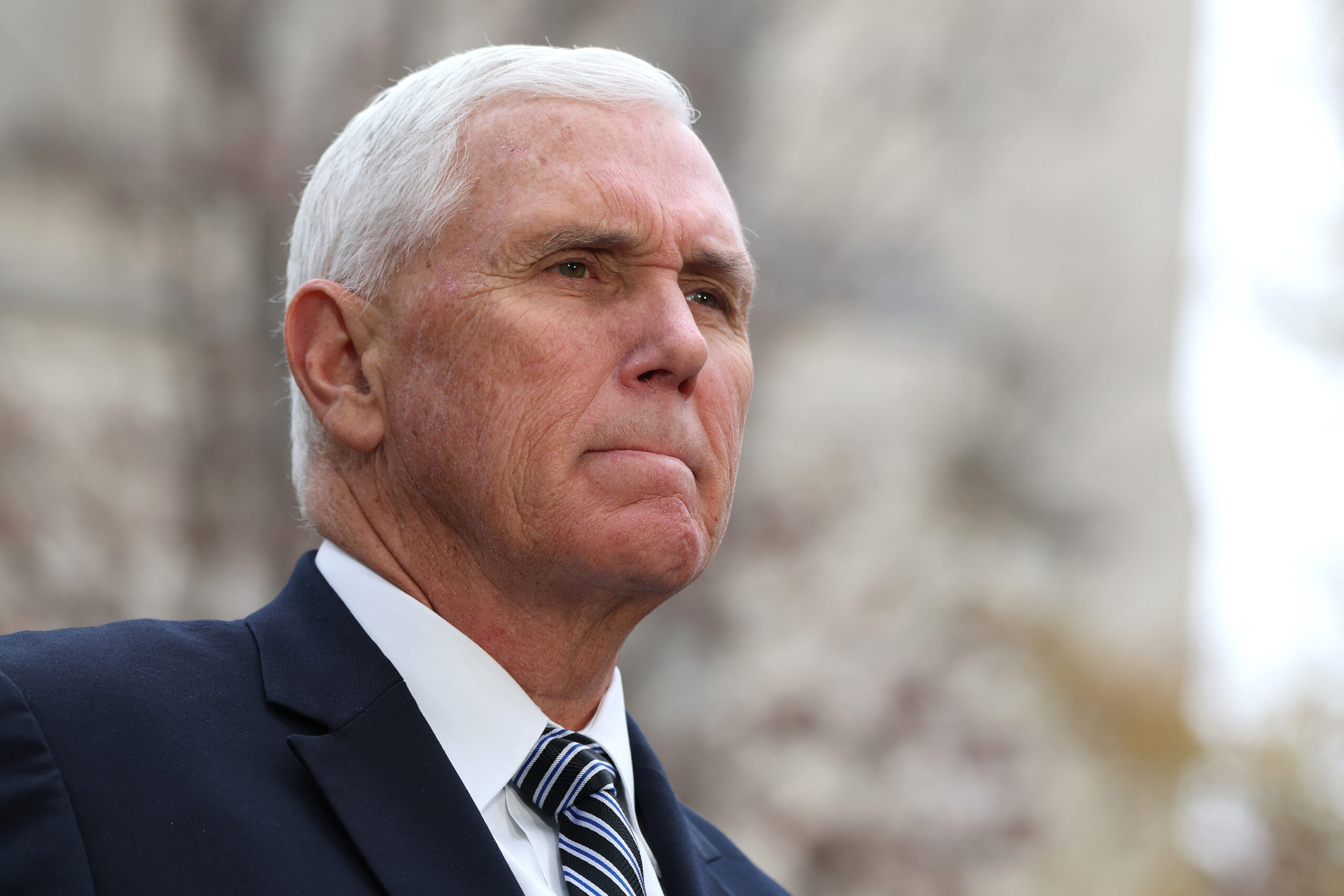
Tim Chapman, the president of former Vice President Mike Pence’s think tank, said on Monday that he expects his Advancing American Freedom organization to poach more staffers from the Heritage Foundation after announcing the hiring of 15 individuals from the embattled conservative organization, Jewish Insider’s Emily Jacobs reports.
New recruits: Advancing American Freedom, founded by Pence in 2021 to advocate for classical conservative principles as President Donald Trump’s MAGA movement cemented its hold on parts of the Republican Party, announced on Monday that 15 Heritage staffers, including three senior officials from the think tank’s legal, economic and data teams, would be moving to AAF at the start of the new year. Chapman, who has been leading the recruitment effort, predicted more Heritage staffers would resign amid continuing frustration over Heritage President Kevin Roberts’ refusal to disavow Tucker Carlson for his platforming of neo-Nazi influencer Nick Fuentes.
SANDERS SCRUTINY
Trump-appointed Holocaust Museum board members pushing to oust Bernie Sanders

Several Trump appointees to the board of the United States Holocaust Memorial Museum are pushing for the ouster of Sen. Bernie Sanders (I-VT), alleging that he has rarely attended meetings and that his accusations of genocide against Israel run directly counter to the museum’s mission, Jewish Insider’s Marc Rod reports.
What they’re saying: Jonathan Burkan, who was appointed to the council twice by President Donald Trump, said he’s never seen Sanders at any meetings of the council — which he said has not been the case for other lawmakers, both Democrats and Republicans. “Everything that’s happened after Oct. 7, everything that has been going on with antisemitism, with the Holocaust — I do feel that if someone is a Jewish elected official, they should at least attend one meeting in over a 20 year period of time,” Burkan said. “They should find someone else besides Bernie just to be on the council.”
MILITARY MATTERS
Pentagon plan to reorganize military could undermine U.S.-Israel security, experts warn

Senior Pentagon officials are reportedly weighing a sweeping proposal to reorganize the U.S. military that would shift authorities and resources away from the Middle East, a move experts warn could undermine U.S.-Israel security cooperation and destabilize the region. The plan, driven by Defense Secretary Pete Hegseth, would reduce the number of U.S. combatant commands from 11 to eight, cut the number of four-star generals and consolidate regional commands into broader organizations. Most notably, U.S. Central Command (CENTCOM) — which oversees the Middle East and parts of South Asia — would be placed under a newly created U.S. International Command, Jewish Insider’s Matthew Shea reports.
Regional ramifications: “If the reorganization happens, it will have detrimental effects on Israel and the wider region,” said Michael Koplow, chief policy officer at the Israel Policy Forum. “The Middle East presents unique challenges stemming from Iranian efforts to upend the regional order and the importance of protecting sea lanes and trade routes. Treating the region as one component of a larger command risks harming U.S. goals.”
DAMASCUS DEALINGS
Trump’s Syria strategy tested amid resurgence of ISIS in Damascus

Following the fall of the Assad regime in Syria, President Donald Trump has taken an unusually open approach toward Damascus, seeking to usher in a new era of stability and regional integration. But that strategy is beginning to face significant tests from jihadist elements embedded within Syrian President Ahmad al-Sharaa’s own military ranks, Jewish Insider’s Matthew Shea reports.
Flagging concerns: “What my colleagues and I have been warning this entire year is that al-Sharaa was putting his jihadist allies into the new Syrian military without apparent measures to prevent bad things from happening,” said David Adesnik, vice president of research at the Foundation for Defense of Democracies, who added that those with jihadist beliefs were integrated in “large groups.” Those concerns were underscored earlier this month, when two U.S. soldiers and one civilian contractor were killed in Syria in an attack claimed by the Islamic State (ISIS) — the first U.S. casualties in the country since Assad’s fall in December 2024.
Bonus: The New York Times reports on the Assad family’s “life of luxury and impunity” in Moscow, a year after Bashar al-Assad, his wife and children left Damascus for Russia.
CAMPUS BEAT
Professor who backed encampment selected for role on Northwestern presidential search committee

A Northwestern University professor who supported the anti-Israel encampment on the Evanston, Ill., campus and is married to the founder of the university’s chapter of Educators for Justice in Palestine was tapped to join a new presidential search committee, the school announced last week. Ian Hurd, a professor of political science and president of the faculty senate at Northwestern University, is listed on Northwestern’s website as an “expert on the Middle East.” As Faculty Senate president, Hurd has played an influential role in shaping faculty responses to campus protests, academic freedom disputes and university governance questions, Jewish Insider’s Haley Cohen reports.
Raising eyebrows: Hurd’s appointment to the search committee drew criticism from some of the school’s Jewish alumni. “The antisemitic encampment at Northwestern occurred in April 2024, immediately before Ian Hurd was elevated into senior faculty leadership. At the time, Hurd was a leading figure in the Faculty Senate and publicly defended the administration’s response,” Michael Teplitsky, president of the Coalition Against Antisemitism at Northwestern and an alum of the school, told JI.
Worthy Reads
Banning the Brotherhood: In The Spectator, Ed Husain calls on the United Kingdom to follow the lead of the U.S. and other countries and ban the Muslim Brotherhood. “What does the Brotherhood’s growing influence mean for Britain’s Muslims? It results in women facing sharia court trials for divorce proceedings. Mosques must send coaches to marches in London or risk becoming outcasts. For the rest of the country it has meant greater communal separatism and multiple terror attacks. Britain’s Jews are afraid to walk the streets of their country, and MPs have been attacked by Islamist extremists. The resulting terror threat has been classed by the government as ‘substantial’, with 43,000 individuals on an MI5 watch list just five years ago. The Jenkins report warned a decade ago about the threat from the Brotherhood to Britain’s national security. That menace has now metastasised.” [TheSpectator]
What the Far Right Gets Wrong: In Compact, David Azerrad examines the rise of the “JQers” — far-right influencers who push the idea of the “Jewish Question” as a means of explaining societal ills. “The problems we face are so daunting, the odds so overwhelming, that it is easier to rail against the Jews than to undertake the Herculean task of revitalizing the dying nations of the West. The JQers simply don’t have the stomach to consider that, in fact, it may well be our fault. We Americans and Westerners are the ones who squandered our inheritance, defiled our countries, and replaced our populations. We elected — and re-elected — the leaders who launched reckless wars and embraced foolish policies. They were not hoodwinked by the Israel lobby, and they would not suddenly become prudent statesmen if all Jewish influence were expunged from our politics.” [Compact]
Bank Notes: Bloomberg’s Paul Davies looks at Apollo Global Management CEO Marc Rowan’s efforts to redefine private credit through the creation of what Davies calls a “narrow” bank. “Apollo has ridden the boom in private markets over the past decade to command $908 billion in assets and become an increasingly significant lender to the US economy, along with a string of rivals and copycats. Banks, investors, regulators and politicians are — or ought to be — watching closely for emerging risks and benefits from the model Rowan has built. He needs to get his message about Athene’s version of private credit to all of these observers and to a media he has called confused and hysterical, but most of all to the armies of mom-and-pop annuity holders whose trust his business relies on.” [Bloomberg]
Word on the Street
A new report by the Anti-Defamation League highlights several members of New York City Mayor-elect Zohran Mamdani’s transition team who have used antisemitic tropes and justified Hamas’ Oct. 7, 2023 attacks, among other issues the group flags as “deeply troubling” and that raise further questions about his vetting process, Jewish Insider’s Matthew Kassel reports…
The Trump administration is recalling senior career diplomats from 29 countries, all of whom were appointed during the Biden administration; the majority of those whose tenure is being ended are posted in Africa or the Pacific Islands…
Former Blackrock executive Mark Wiseman was named Canada’s next ambassador to the U.S….
Axios spotlights Steve Witkoff’s South Florida Shell Bay club, where the White House special envoy and Jared Kushner, and occasionally Secretary of State Marco Rubio, have hosted high-level diplomatic delegations to discuss issues ranging from the Israel-Gaza war to Ukraine…
NBC News reports on Witkoff and Rubio’s clashing approaches to the Trump administration’s Russia-Ukraine policy…
The Washington Post looks at Sen. Ted Cruz’s (R-TX) efforts to position himself as a traditional Republican on foreign policy issues ahead of the 2028 presidential election, as the Texas Republicans mulls another White House bid…
Attorney George Conway filed to run in the crowded Democratic primary in New York’s 12th Congressional District, where Rep. Jerry Nadler (D-NY) is not seeking reelection…
Larry Ellison is personally guaranteeing the $40.4 billion that Paramount, led by his son David Ellison, is putting forward in its bid for Warner Bros. Discovery…
A New York Times analysis of donors to Trump administration projects and priorities found that Dr. Miriam Adelson’s foundation pledged $25 million to the construction of a new White House ballroom; additional donors include Palantir and Lockheed Martin, which are both donating $10 million to the reconstruction effort…
Authorities in New York levied a hate crime charge against a man in connection with an attack in Brooklyn’s Crown Heights neighborhood last week in which a Jewish man was stabbed; the assault was captured on camera and took place blocks from the Chabad Lubavitch headquarters…
The Washington Post looks at efforts by volunteers, aided by Jewish communal security organizations, to identify threats to Jewish groups and institutions…
Israel’s Cabinet approved the closure of Galei Tzahal, the army radio station, after 75 years of operation, as part of a broader government effort to exert control over Israeli media; Israeli press organizations plan to challenge the decision, which was also opposed by Attorney General Gali Baharav-Miara…
Israeli Defense Minister Israel Katz told leaders of the country’s settlement movement that “when the time comes,” Israel will reestablish settlements in the Gaza Strip, contradicting previous assertions by Israeli Prime Minister Benjamin Netanyahu…
The Wall Street Journal spotlights security lapses that have allowed Iranian hackers to exploit vulnerabilities in an effort to breach Israeli institutions and obtain and leak information…
Longtime Jewish public relations professional H. Glenn Rosenkrantz died at 64…
Swedish-born actress May Britt, who converted to Judaism before marrying Sammy Davis Jr., died at 91…Record producer Jerry Kasenetz, who with his business partner Jeffry Katz produced such songs as “Yummy Yummy Yummy” and “Little Bit O’ Soul,” died at 82…
Pic of the Day

Israeli Prime Minister Benjamin Netanyahu met on Monday in Jerusalem with Cypriot President Nikos Christodoulides and Greek Prime Minister of Greece Kyriakos Mitsotakis.
Birthdays

Israeli-Spanish singer-songwriter of Judeo-Spanish (Ladino) music, Yasmin Levy turns 50…
Television producer, best known for his work on the 1980’s television series “Cagney & Lacey,” Barney Rosenzweig turns 88… Electrical engineer, who with Vint Cerf, invented the Transmission Control Protocol (TCP) and the Internet Protocol (IP), the fundamental protocols at the heart of the Internet, Robert Elliot “Bob” Kahn turns 87… Emmy Award-winning actor, writer, director and producer, best known for his work on “The Simpsons”, he is still an active podcast host, Harry Shearer turns 82… Russian-born mathematician, living in France, Mikhail Leonidovich Gromov turns 82… U.S. district judge in the Southern District of New York, he has been on senior status since 2011, Judge Lewis A. Kaplan turns 81… Documentary filmmaker, she is best known for her films on businessman Julius Rosenwald and baseball players Hank Greenberg and Moe Berg, Aviva Kempner turns 79… Retired Justice on the Supreme Court of Canada, Michael Moldaver turns 78… One of two Grand Rebbes of Satmar, Rabbi Zalman Leib Teitelbaum turns 74… Editor-at-large of The Bulwark, William “Bill” Kristol turns 73… Retired Israeli basketball player and coach, until 2006 she was in the Guinness Book of World Records for the most points (108) ever scored in a women’s professional game, Orna Ostfeld turns 73… Dean at Indiana University’s School of Global and International Studies, he served as the U.S. ambassador to Poland in the Obama administration, Lee A. Feinstein turns 66… Software engineer at Goldman Sachs, Bill Pinsky… CEO of the Rabbinical Assembly, the international association of Conservative rabbis, Rabbi Jacob Blumenthal turns 59… USAID acting mission director for the West Bank and Gaza until 2021, then mission director for Bosnia and Herzegovina until 2024, Courtney Chubb turns 56… Political technology entrepreneur and campaign finance attorney, Jonathan Eric Zucker turns 54… Israeli investor in natural resources including diamond and copper mining interests in Africa, Dan Gertler turns 52… Beverly Hills-based attorney and real estate agent, he is a supporter of pro-democracy groups in his native Iran, Pooya Dayanim… Attorney in Austin, she clerked for Justice Alito on the U.S. Supreme Court, Zina Linda Gelman Bash… VP of strategy and mergers at the Heritage Group, an Indiana-based multi-generational family portfolio of companies, Adam Milakofsky… Israeli singer, songwriter, musician and composer of the genre known as Mizrahi music, Dudu Aharon turns 41… COO at Israel Policy Forum, Snezhana Valdman Orlando turns 41… Liberal rabbi in the city of Dresden and founder of the Besht Yeshiva, Akiva Weingarten turns 41… Partner and chief investment officer at Gelt Venture Partners, he was an MLB infielder and played for Team Israel in 2012 and 2017, Joshua Blake Satin turns 41… Chief of staff for the U.S. Ambassador to France and Monaco Charles Kushner, Gabriel Scheinmann… Founder and CEO at Stealth AI, he is also a lecturer and research scholar at the Wharton School at the University of Pennsylvania, Emil Pitkin… Brand marketing manager at Metagenics, Lauren Kahn… Israeli fashion model, Shlomit Malka turns 32… Senior vice president of the American Foreign Policy Council, Ilan Berman… Former account executive at Edelman, India Goodman… Tom Epstein…
Plus, Turning Point attendees hold the pro-Israel line

Gage Skidmore
Good Monday afternoon!
This P.M. edition is reserved for our premium subscribers — offering a forward-focused read on what we’re tracking now and what’s coming next.
It’s me again — Danielle Cohen-Kanik, U.S. editor at Jewish Insider and curator, along with assists from my colleagues, of the Daily Overtime. Please don’t hesitate to share your thoughts and feedback by replying to this email.
📡On Our Radar
Notable developments and interesting tidbits we’re tracking
Over a dozen of the Heritage Foundation’s top legal and economic staff are departing the think tank to join former Vice President Mike Pence’s Advancing American Freedom group, in the latest sign of the continued internal dysfunction racking Heritage since its president, Kevin Roberts, embraced Tucker Carlson after he platformed neo-Nazi Nick Fuentes.
“Why these people are coming our way is that Heritage and some other voices and commentators have embraced big-government populism and have been willing to tolerate antisemitism,” Pence told The Wall Street Journal.
More than 30 of Heritage’s employees have reportedly resigned or been fired in the last several days, and at least three trustees have also dropped their affiliation with the group. Josh Blackman, who announced he’s stepping down as senior editor of The Heritage Guide to the Constitution, told Roberts in his resignation letter that his comments on Carlson “were a huge unforced blunder, and gave aid and comfort to the rising tide of antisemitism on the right”…
A straw poll conducted of attendees at Turning Point USA’s AmericaFest summit found that the anti-Israel views of some of the event’s speakers were not largely shared by the audience — only 13% of respondents said they don’t view Israel as an ally of the United States (one-third thought Israel is a “top ally” while an additional 53% said it’s one ally of many).
Brent Scher, editor-in-chief of the conservative Daily Wire, wrote on X about the poll, “For those who think Tucker and Candace [Owens] are winning … they’ve convinced nobody.” The same poll found 84% of respondents would like to see Vice President JD Vance as the 2028 Republican presidential nominee…
A new report from the Anti-Defamation League finds that more than one-fifth of New York City Mayor-elect Zohran Mamdani’s appointees to his transition team have extreme anti-Israel backgrounds, Jewish Insider’s Matthew Kassel reports.
Among the advisors, Youssef Mubaraz, who was appointed to serve on the committee on small businesses, dismissed a Facebook video about Hamas’ widespread use of sexual violence on Oct. 7 as “propaganda,” according to the report. Mohammed Karim Chowdhury, a member of the worker justice committee, previously shared a post claiming that “Zionists are worse than Haman of ancient times, the Inquisition, and the Nazis.”
Mamdani said about the report at a press conference today that “we must distinguish between antisemitism and criticism of the Israeli government” and that the “ADL’s report oftentimes ignores this distinction”…
George Conway, co-founder of the anti-Trump Lincoln Project group, filed paperwork today to join the crowded Democratic primary in New York’s 12th Congressional District to replace retiring Rep. Jerry Nadler (D-NY). The once decidedly conservative lawyer abandoned his affiliation with the Republican Party over his disagreements with President Donald Trump and became a significant donor of former President Joe Biden, though Conway’s decision to run as a Democrat himself is a step further than he’s gone before.
The New York Times reported last month that Conway told a group of donors he would aim to act as a “wingman” to Reps. Jamie Raskin (D-MD) and Dan Goldman (D-NY), also both lawyers fiercely opposed to Trump, if elected to Congress…
Meanwhile Erik Bottcher, a New York City councilman, dropped out of the NY-12 primary in order to run for a state Senate seat…
Brad Lander, the outgoing New York City comptroller trying to unseat Rep. Dan Goldman (D-NY), received an endorsement today from anti-Israel City Councilmember Shahana Hanif, who has faced backlash from her sizable Jewish constituency for her refusal to explicitly condemn Hamas in the aftermath of the Oct. 7 attacks and blaming Israel’s “unjust occupation of the Palestinian people” for the violence, her inaction on incidents of antisemitism in the district and her endorsement of calls to “globalize the intifada,” among other issues…
U.S. Ambassador to Israel Mike Huckabee echoed warnings Jerusalem is reportedly providing to the Trump administration around Iran’s preparations for another military conflict with Israel while speaking at Tel Aviv University’s Institute for National Security Studies conference today.
“Iran, I don’t know that they ever took [Trump] seriously until the night that the B-2 bombers went to Fordow. I hope they got the message but apparently they didn’t get the full message cause … they appear to be trying to reconstitute and find a new way to dig the hole deeper, secure it more,” Huckabee said…
The Trump administration is recalling senior diplomats from at least 29 countries, State Department officials told the Associated Press, largely from Africa and Asia with several in Europe and the Middle East, as part of its continued effort to “advance the America First agenda”…
Israeli Prime Minister Benjamin Netanyahu hosted the prime minister of Greece and president of Cyprus in Jerusalem today to “strengthen security, promote economic development and deepen the ties between our countries,” he said in a statement…
In the latest development in the bidding war over Warner Bros. Discovery, Paramount amended its offer to acquire the company to include $40.4 billion of equity financing personally guaranteed by Larry Ellison, co-founder of Oracle and father of Paramount’s CEO, David Ellison. Warner Bros. had previously advised shareholders to reject Paramount’s offer due to concerns over its ability to provide the financing…
⏩ Tomorrow’s Agenda, Today
An early look at tomorrow’s storylines and schedule to keep you a step ahead
Keep an eye out in Jewish Insider for a preview of Israeli Prime Minister Benjamin Netanyahu’s meeting with President Donald Trump at his Mar-a-Lago resort at the end of the month.
Stories You May Have Missed
TALARICO TALK
Texas Jewish voters alarmed by James Talarico’s Israel rhetoric

Local leaders said that, without improved outreach from Talarico to address their concerns, they’re likely to vote for Rep. Jasmine Crockett in the Democratic primary
MENORAHS ON THE MALL
Lighting up Washington: Rabbi Levi Shemtov brings Hanukkah to the halls of power

The EVP of American Friends of Lubavitch is a staple around town during the holiday, regardless of the party in power
Local leaders said that, without improved outreach from Talarico to address their concerns, they’re likely to vote for Rep. Jasmine Crockett in the Democratic primary

Brandon Bell/Getty Images
Democratic Texas State Rep. James Talarico speaks during a campaign launch rally on September 09, 2025 in Round Rock, Texas.
Jewish leaders in Texas are growing increasingly concerned about Democratic Senate candidate James Talarico’s comments on Israel, with four members of the community telling Jewish Insider that without concerted outreach from Talarico, they’re likely to back Rep. Jasmine Crockett (D-TX) in the Democratic primary.
Their frustrations came to a head after Talarico accused Israel of war crimes in response to a general question on foreign policy at an event last week. “I will use every bit of financial and diplomatic leverage that this country has to end the atrocities in Palestine,” Talarico vowed to do if elected. “I will not use your tax dollars to fund these war crimes. I will vote to ban offensive weapons to Israel.”
He also said he’d refuse to accept support from AIPAC.
“I refuse to be complicit in the death and destruction in Gaza, and I will never use your tax dollars to support the killing in that part of the world, and it makes me sick to my stomach to see what’s happening,” Talarico said. “I hope in this campaign here in Texas we can send a crystal clear message to the rest of the country that we are done being complicit.”
The Texas state representative, who has studied to become a minister, said that the Gaza conflict “weighs on my heart as an educator, as someone who works with kids.”
“God is screaming at all of us in Gaza, as we speak,” he said.
In response to a later question about “what it means to protect all people, rather than only Palestinian people,” Talarico said that “all people are created in the divine image … which means every person has equal worth.”
“We shouldn’t be empowering people like [Israeli Prime Minister] Benjamin Netanyahu who are waging war against civilians. And that is not a reflection on the Israeli people because many of you know that we have seen historic protests in Israel from Israelis against their government and against Benjamin Netanyahu’s war cabinet,” Talarico continued.
Art Pronin, who leads the Meyerland Area Democrats Club, a largely Jewish Democratic group in the Houston area, told JI he’s known Talarico for years and the candidate has spoken to the Meyerland Democrats group. Pronin has repeatedly expressed concerns to Talarico directly and to the campaign about his Israel rhetoric, to little effect.
Pronin said he first confronted Talarico directly about the issue at the Texas Tribune festival in November, explaining that — while accusing Israel of war crimes and vowing not to accept funding from AIPAC or J Street — Talarico did not offer a word of condemnation for Hamas or its international backers, or express support for a two-state solution.
“I told him … ‘You’ve got to stop singling out one group,’” Pronin said, referring to AIPAC. He said that Talarico had apologized and said he would modify his rhetoric, but offered similar comments, unprompted, at the Houston town hall last week.
Pronin was in one of the front rows at the event, having been invited by Talarico personally. Pronin said that he again confronted Talarico and his staff after the event last week and they again apologized.
“It was the same conversation. I told him, ‘When you single out one institution over and over again, it’s dangerous.’ I explained to him why it’s dangerous: we just had a shooting in Australia this week. We had violence in New York, in the subway, a guy was stabbed in the street,” Pronin explained. “I said, ‘This is not helpful,’ and I said, ‘Somebody’s going to get hurt if you keep talking like this.’ I said, ‘You’re not balanced. You’re not talking about Hamas, you never mention [Oct. 7], you never even expressed empathy over what happened in Australia this week. And it’s Hanukkah tonight.’ I told him I was disgusted.”
Talarico has not addressed the shooting at a Hanukkah celebration in Sydney last week on social media, but did speak about it in an appearance on MSNOW’s “Politics Nation.”
“I am sending my love to our Jewish brothers and sisters in Australia and all over the world on this first night of Hanukkah,” Talarico said on Dec. 14, the day of the shooting. “It is incumbent upon all of us to confront antisemitism wherever it rears its ugly head, and it was inspiring to see a Muslim man stand up for his Jewish neighbors during that deadly attack in Australia. We need that kind of interfaith solidarity all over the world if we’re going to confront these problems with truth and love, and that act of courage should inspire all of us to do the same.”
“He needs to balance his comments out,” said Art Pronin, who leads the Meyerland Area Democrats Club. “He needs to meet with our Jewish federation, our Anti-Defamation League. He needs to have that round-table meeting that I’ve tried to get him to do. He needs to hear our voices on this matter and quit repeating this everywhere he goes. He’s got to balance it out, at least.”
Pronin said that, being near the front of the crowd and having been invited by Talarico personally, he felt insulted, “threatened” and “scared” by other members of the crowd.
He said that he asked Talarico to hold a meeting with Jewish community leaders in Houston, but hasn’t heard any further followup on the subject, and feels that Talarico is ignoring his and other Jewish community members’ concerns.
“I did express to him that I might vote for Jasmine Crockett over it,” Pronin continued. “He needs to balance his comments out … he needs to meet with our Jewish federation, our Anti-Defamation League. He needs to have that round-table meeting that I’ve tried to get him to do. He needs to hear our voices on this matter and quit repeating this everywhere he goes. He’s got to balance it out, at least.”
Talarico’s campaign manager, Seth Krasne, defended Talarico’s record in a statement to JI.
“James believes every human life is sacred. His longstanding record combating antisemitism, defending Jewish students on the floor of the Texas House, and supporting Israel’s right to exist demonstrate his steadfast commitment to Jewish safety,” Krasne said.
Krasne continued, “He will continue to speak out against Prime Minister Netanyahu’s unacceptable actions that threaten civilians in Gaza — this moral clarity should never be misconstrued as opposition to the safety and security of Israeli civilians and Jewish people around the world. In the coming months, James looks forward to working with Jewish leaders to continue the important work of eradicating hate wherever it rears its ugly head.”
A source familiar with the situation told JI that Talarico will not accept campaign contributions from any advocacy group associated with either side of the Israeli-Palestinian conflict, but is willing to meet with any group about the issue.
In a statement on the two-year anniversary of the Hamas attack, Talarico said that the “horrors of October 7th, 2023 will reverberate through our hearts and minds for generations to come,” noting that the attack was the deadliest day for the Jewish people since the Holocaust, and said that Hamas’ “war crimes should never be forgotten.”
“Every person on this Earth — no matter their color or creed — bears the image of the sacred. I continue to pray for the safe return of the hostages, an immediate end to the suffering in Gaza, and a lasting peace in the region,” he continued.
Days after the initial Hamas attack in October 2023, Talarico supported a resolution in the Texas statehouse that highlighted Hamas’ attack, its intent to destroy Israel and its use of Palestinian civilians as human shields and his support for Israel’s survival and right to “act decisively and unilaterally in self-defense to protect its citizens” and “pursue without interference or condemnation the elimination of Hamas until Hamas is permanently neutralized and public safety is assured.”
The resolution also called for the U.S. to “provide all assistance as may be required to support Israel in its defense against Hamas and all other terrorist organizations.”
“He’s very popular among the younger people and it’s very disheartening to see that he’s … going to pander to that very far-left wing progressive movement in terms of what’s going on with Israel,” Lisa Strauss, a leader in the local Jewish community, said, “especially given the fact that he’s technically in seminary to become a pastor.”
He also praised the ceasefire and hostage release agreement in November 2025, saying, “I hope this ceasefire will hold so we can achieve lasting peace and security for Palestinians and Israelis.”
Lisa Strauss, a leader in the local Jewish community who recently helped start Jewish Women Vote Houston, said that Talarico’s comments are “very disappointing.”
“He’s very popular among the younger people and it’s very disheartening to see that he’s … going to pander to that very far-left wing progressive movement in terms of what’s going on with Israel,” Strauss said, “especially given the fact that he’s technically in seminary to become a pastor.”
She expressed particular frustration at Talarico’s accusations of war crimes and other atrocities in Gaza, which she described as “propaganda,” and said that it’s “frightening” that he and so many other Democrats are taking similar stances and seem unwilling to “even open a discussion about Israel.”
“I would like to see him meet with Jewish groups and explain his stance in greater detail,” Strauss said.
She said that Talarico’s positions on Israel were a major subject of discussion at the first meeting of the Jewish women’s group, and are an issue that’s causing significant concern in her community.
“It’s definitely something that we need to look more into and be more concerned about,” Strauss said, adding that she was surprised that Crockett, an outspoken progressive on many issues, appears to be the more pro-Israel candidate in the race at the moment.
Yvette Pintar, a Jewish voter and local Jewish and Democratic leader who was also in the audience at Talarico’s event last week, said she’d heard Talarico make similar comments in the past and that they made her “uncomfortable.”
“It doesn’t provide context for what’s going on in Gaza,” Pintar said. “I have mixed feelings when I hear about, ‘I’m not taking one penny from AIPAC.’ I’m not a fan of AIPAC, so that’s OK, but it’s still very uncomfortable to hear it, when you single out one entity not to get money from in today’s world.”
“I don’t think that he’s inherently antisemitic … but I don’t think he has been very thoughtful about standing with Jews when it comes to concerns for our physical security, anywhere — overseas, here, or whatever it is,” Yvette Pintar, a Jewish voter and local Jewish and Democratic leader said. “It’s hard to believe that he has given much thought to the concerns of Jews when it comes to physical security.”
Pintar said she was particularly uncomfortable with Talarico’s answer to the follow-up question later in the event — about speaking for “all people, rather than only Palestinian people” — which she said had provided an opportunity for Talarico to commit to offering a statement of support for the Jewish community, particularly in the wake of the Sydney shooting, but felt he failed to do so.
“To me, it was so jarring not to address that, he missed a very easy and obvious opportunity to address the real anxieties that Jews and Israelis have about security. Jews right here in Texas, we had [the hostage crisis at a synagogue in] Colleyville in the not too distant past. This is right here in Texas, so I just thought that that was jarring and very concerning,” Pintar said.
“I don’t think that he’s inherently antisemitic … but I don’t think he has been very thoughtful about standing with Jews when it comes to concerns for our physical security, anywhere — overseas, here, or whatever it is,” Pintar said. “It’s hard to believe that he has given much thought to the concerns of Jews when it comes to physical security.”
Pintar said she hasn’t made up her mind on who to vote for yet, but has the “impression” that Crockett “may be better on these issues.” She said the Talarico campaign “needs to demonstrate to Jewish voters that he takes our concerns seriously. I haven’t seen anything yet that shows he has,” and particularly reassure Jews about their security.
She also said that his current approach to the conflict in Gaza “seems divisive, and that’s not what I would hope [for] from a candidate who is supposedly a peace-loving guy who is concerned with all kinds of communities.”
Fishback has sought to cast next year’s Republican primary as 'very clearly a two-person race,' but political operatives are skeptical his bid will amount to on-the-ground traction even as he provokes controversy from behind the screen
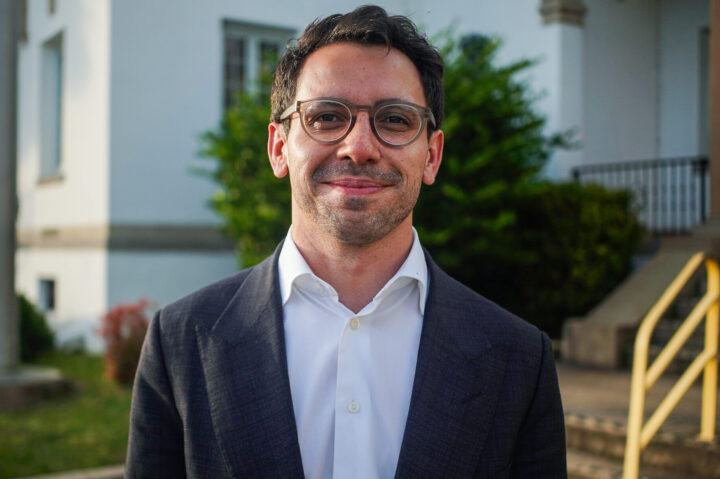
Campaign website
James Fishback
In recent weeks, James Fishback, a 30-year-old Republican investor who last month launched a long-shot campaign for governor of Florida, has drawn online attention for a series of incendiary social media posts attacking Israel and invoking antisemitic tropes.
In addition to praising followers of the neo-Nazi influencer Nick Fuentes, comments for which he has refused to apologize, Fishback has promoted a range of extreme anti-Israel positions, including in a recent campaign ad vowing to defend those who accuse the Jewish state of genocide. He has taken repeated aim at the pro-Israel organization AIPAC, which he calls a “foreign lobbying group,” saying its supporters are “slaves” and that his own “allegiance is to America.”
“I’ll be the first to admit that I fell for the ‘Israel is our greatest ally’ scam and the lie that criticizing Israel is ‘antisemitic,’” he wrote in a social media post this week. “It wasn’t until I was offered a paid trip to Israel this summer (which I never took) that I realized how cringe and pathetic the propaganda was.”
In using such inflammatory rhetoric, Fishback, a political newcomer, is likely seeking to capitalize on the views of a younger audience of far-right voters increasingly fueling anti-Israel as well as antisemitic sentiment in the GOP, which has recently forced the party to confront a growing schism within its ranks over its ideological direction.
But while Fishback has sought to cast next year’s Republican primary as “very clearly a two-person race” between him and Rep. Byron Donalds (R-FL) — the pro-Israel GOP front-runner now dominating the polls while reporting a $40 million fundraising advantage — political operatives in both parties are skeptical his insurgent bid will ultimately amount to any sort of meaningful on-the-ground traction even as he continues to provoke controversy from behind the screen.
“Social media is the only reason anyone has heard of Fishback, and 20 years ago no one would even be talking about him,” Steve Schale, a Democratic strategist in Florida, told Jewish Insider. “Unless he stumbles into a pile of cash, it’s hard for me to see this being more than just an effort to get clicks.”
Fishback, the CEO of an anti-DEI investment firm called Azoria, is hardly the first candidate hoping to translate social media clout into votes or fame. A growing cohort of young influencers seeking office has emerged in recent years, so far with no success.
Deja Foxx, a progressive TikTok activist who ran for Congress in Arizona this summer, had raised a lot of money and appeared to be gaining momentum near the end of the campaign. But despite the hype, Foxx fell short by nearly 40 points — losing out to a more established local lawmaker.
In the race to succeed outgoing Florida Gov. Ron DeSantis, Donalds, a three-term congressman who is endorsed by President Donald Trump, is heavily favored to clinch the nomination over a handful of lesser-known primary rivals. Multiple surveys have shown him leading by double digits — with support from a range of state elected officials. Fishback, for his part, claimed just 2% of the vote in a recent poll.
“Although we’re still in the early stages of this race, it’s almost game, set, match,” said Ford O’Connell, a Republican strategist in Florida. “Byron Donalds is dominating the field, approaching 50% in the polls. Once voters realize he has Trump’s endorsement, he becomes the clear favorite. In GOP primary politics, Trump’s endorsement is the platinum standard.”
“If you look at any legitimate polling I would say Mr. Fishback has a very tall mountain to climb,” Will McKinley, a GOP lobbyist and government consultant in the state, echoed to JI.
Jim Cherry, a Republican pollster in Florida, said his “firm does political polling and as of this point, no client has requested that we include Fishback in any gubernatorial head-to-head questions.”
A college dropout and former hedge fund analyst, Fishback attracted some attention in conservative circles after he pitched DOGE “dividend checks” to a receptive Elon Musk, though the plan never took off. He later launched a super PAC to oppose Musk when the billionaire mogul fell out with Trump. He announced his gubernatorial bid in mid-November, pledging to “build on” DeSantis’ “historic record.”
Fishback has portrayed himself as a strong ally of DeSantis, who has so far declined to publicly back anyone in the race, while dismissing Donalds’ bid. But Fishback’s hostility to Israel puts him at odds with the governor, who has long touted his support for the Jewish state.
Meanwhile, Fishback’s recent comments on Israel are almost certain to alienate a sizable population of Jewish voters who live in Florida and can help tip the scales in close elections.
“In my opinion, he’s not a serious candidate and is simply trying to be incendiary to get attention,” said Gabriel Groisman, a Jewish Republican donor and a former mayor of Bal Harbour, Fla.
He declined to comment further, saying that doing so would be “counterproductive.”
In a statement to JI Thursday, Sam Markstein, spokesperson for the Republican Jewish Coalition, dismissed Fishback as “a radical fringe candidate who has decided that the way to run his campaign is to attack the Jewish community and our ally Israel.”
“It won’t work — and Republican Floridians will resoundingly reject him in the GOP primary,” he said.
Fishback, in response, said the “only poll that matters is on Election Day: August 18, 2026,” adding: “Until then, I am committed to earning Floridians’ votes by visiting all 67 counties to meet folks where they are, hear their concerns and share my vision for a more affordable Florida.”
“If elected, I’ll be a governor for all Floridians,” he continued in a statement to JI. “As a Christian, I have never ‘attacked’ anyone for their faith. I will protect religious freedom and ensure the safety of all Floridians.”
Plus, Trump contradicts Bibi on Mar-a-Lago meeting

ANGELA WEISS / AFP via Getty Images
Catherine Almonte Da Costa, Director of Appointments, speaks during a press conference with New York City Mayor-elect Zohran Mamdani (L) and Jahmila Edwards (C), Director of Intergovernmental Affairs, on December 17, 2025 in New York.
Good Thursday afternoon!
This P.M. edition is reserved for our premium subscribers — offering a forward-focused read on what we’re tracking now and what’s coming next.
It’s me again — Danielle Cohen-Kanik, U.S. editor at Jewish Insider and curator, along with assists from my colleagues, of the Daily Overtime. Please don’t hesitate to share your thoughts and feedback by replying to this email.
📡On Our Radar
Notable developments and interesting tidbits we’re tracking
New York City Mayor-elect Zohran Mamdani’s newly tapped director of appointments, Catherine Almonte Da Costa, abruptly resigned this afternoon after her history of antisemitic online posts — including complaining about “money hungry Jews” — was unearthed, Jewish Insider’s Haley Cohen reports.
Da Costa, who previously served as executive assistant to former Mayor Bill DeBlasio and was appointed by Mamdani yesterday, posted a series of antisemitic comments in 2011 and 2012, which were obtained by the Judge Street Journal.
Among other X posts — deleted along with her account today — Da Costa wrote in January 2011, “Money hungry Jews smh,” according to screenshots. “Woo! Promoted to the upstairs office today! Working alongside these rich Jewish peeps,” she posted in June 2011.
After outcry from the Anti-Defamation League and others, Mamdani’s team told JI that “Catherine expressed her deep remorse over her past statements and tendered her resignation, and [Mamdani] accepted.” Da Costa said in her own statement that her posts were “not indicative of who I am” and had “become a distraction from the work at hand”…
In another incident of antisemitism proliferating online, Los Angeles Rams wide receiver Puka Nacua garnered widespread backlash — including from New England Patriots owner Robert Kraft’s foundation focused on combating antisemitism — for performing an antisemitic dance on social media on Tuesday, JI’s Haley Cohen reports, leading Nacua to issue an apology this afternoon.
During streamer Adin Ross’ livestream on Tuesday, he taught the wide receiver a touchdown celebration that ended with Nacua looking into the camera and rubbing his hands together — a stereotypical movement indicating greed that Ross’ fans refer to as his “iconic Jewish dance.” Ross then asked Nacua to perform the dance during the Rams’ game against the Seattle Seahawks tonight, to which Nacua agreed.
In his apology, Nacua stated that at the time of the livestream, he had “no idea this act was antisemitic in nature and perpetrated harmful stereotypes against Jewish people”…
In response to the Hanukkah terror attack in Sydney, Australian Prime Minister Anthony Albanese announced today that his government will introduce new legislation to strengthen hate speech laws in the country and allow the government to cancel or reject visas of people deemed likely to spread hate.
The move comes after Australia ignored repeated warnings from local Jewish communities and Israel that rising antisemitism in the country posed a threat to Jewish safety; Albanese conceded the point in his announcement, claiming, “Governments aren’t perfect. I’m not perfect”…
Scott Singer, the Republican mayor of Boca Raton, Fla., announced a run for Congress today for the seat held by Rep. Jared Moskowitz (D-FL). The district, already competitive, is facing a possible redistricting effort by state Republicans which would further endanger the pro-Israel congressman’s hold on it. Singer, who sits on the U.S. advisory board of Combat Antisemitism Movement, has been a strong supporter of Israel as well…
NOTUS asked over 120 House Republicans if they intend to run for reelection amid rumors of a mass wave of retirements in the party. Several, including Reps. Nicole Malliotakis (R-NY) and Mark Amodei (R-NV), gave noncommittal answers…
The State Department issued new sanctions today against dozens of ships and related companies involved in Iran’s “shadow fleet” used to evade existing oil sanctions, as well as against two International Criminal Court judges involved in prosecuting Israeli Prime Minister Benjamin Netanyahu and former Defense Minister Yoav Gallant, citing the judges’ votes against an Israeli appeal to drop arrest warrants for the two earlier this week…
President Donald Trump contradicted an announcement made weeks ago by Netanyahu’s office that the two have set a meeting at the president’s Mar-a-Lago resort in Palm Beach, Fla., for Dec. 29, telling reporters in the Oval Office today, “We haven’t set [a meeting] up formally, but [Netanyahu] would like to see me. … He’ll probably come see me in Florida.”
Asked if Egyptian President Abdel Fattah el-Sissi will join them, as speculated by the signing of a major gas deal between Israel and Egypt yesterday, Trump said, “I’d love to have him. El-Sissi is a friend of mine”…
D.C. City Councilmember Janeese Lewis George, a democratic socialist running for city mayor, committed to standing up for the Jewish community and taking proactive steps to ensure its security on a panel at a Jewish Community Relations Council of Greater Washington breakfast this morning, JI’s Marc Rod reports.
Lewis George’s presence at the event and comments are particularly notable given that she’s a self-identified democratic socialist. (Many DSA-aligned elected officials across the country, including Mamdani, have had combative or nonexistent relationships with mainstream Jewish organizations in their cities and districts.)
“I learned at a very young age how important it was to loudly condemn and loudly stand up for our Jewish neighbors,” Lewis George said. She recalled that she realized through education programs in D.C. schools “how important it was that we support each other in solidarity, in our connected struggles, our connected history”…
⏩ Tomorrow’s Agenda, Today
An early look at tomorrow’s storylines and schedule to keep you a step ahead
Keep an eye out in Jewish Insider for an interview with a longtime Jewish activist mounting a bid for Washington, D.C.’s congressional delegate seat.
White House Special Envoy Steve Witkoff will meet with the Qatari prime minister and Egyptian and Turkish foreign ministers in Miami tomorrow to discuss implementation of the second phase of President Donald Trump’s Gaza peace plan.
Turning Point USA’s AmFest continues over the weekend, including a debate over Israel on Saturday between political commentator Steve Deace and Christian nationalist leader Pastor Doug Wilson.
We’ll be back in your inbox with the Daily Overtime on Monday. Shabbat Shalom!
Stories You May Have Missed
FRIENDLY FIRE
At Heritage HQ, Ben Shapiro calls on think tank to draw red line against Tucker Carlson

‘If the Heritage Foundation wishes to retain its status as a leading thought institution in the conservative movement, it must act as ideological border control,’ Shapiro warned
CENTER PUSH
Moderate N.Y. Democrat Rory Lancman hoping to reinvigorate party’s centrist wing in the suburbs

The former state assemblyman told JI: ‘I confess to being disappointed that Democrats aren’t making a bright line litmus test out of whether someone supports the existence of the Jewish state’
Plus, Dan Shapiro takes the Rhodes less traveled

Christopher Furlong/Getty Images
Members of the public and congregants seen as Police and other emergency responders attend the Heaton Park Hebrew Congregation Synagogue, where multiple were injured after stabbing and car attack on Yom Kippur, on October 2, 2025 in the Crumpsall suburb of Manchester, England.
Good Wednesday afternoon!
This P.M. edition is reserved for our premium subscribers — offering a forward-focused read on what we’re tracking now and what’s coming next.
It’s me again — Danielle Cohen-Kanik, U.S. editor at Jewish Insider and curator, along with assists from my colleagues, of the Daily Overtime. Please don’t hesitate to share your thoughts and feedback by replying to this email.
📡On Our Radar
Notable developments and interesting tidbits we’re tracking
In the wake of the Hanukkah terror attack in Sydney and the deadly Yom Kippur attack in Manchester, the heads of Britain’s Metropolitan Police and Greater Manchester Police said they will change their policies on arrests in connection with the use of threatening slogans, including “globalize the intifada.”
“The words and chants used, especially in protests, matter and have real world consequences. We have consistently been advised by [the Crown Prosecution Service] that many of the phrases causing fear in Jewish communities don’t meet prosecution thresholds. Now, in the escalating threat context, we will recalibrate to be more assertive,” their joint statement read.
“We know communities are concerned about placards and chants such as ‘globalise the intifada’ and those using it at future protest or in a targeted way should expect the Met and GMP to take action. Violent acts have taken place, the context has changed — words have meaning and consequence. We will act decisively and make arrests,” they pledged. The Israeli Embassy in the U.K. welcomed the move but called it “disappointing” that it only came “after more Jews have been killed”…
Daniel Flesch, a senior policy analyst at the Heritage Foundation, emerged as a critical voice raising the alarm on right-wing antisemitism from within the institution in a speech on Monday night, Jewish Insider’s Gabby Deutch reports, as the think tank continues to grapple with fallout from its president’s embrace of Tucker Carlson after his controversial interview with neo-Nazi Nick Fuentes.
“The last couple of years, really for longer than that, the threat of antisemitism has largely been the domain of the left,” Flesch said at a Hanukkah party hosted by the Young Jewish Conservatives. “Now, in some ways, the call is coming from inside the house.”
Flesch continued, “Right now, the issue we’re facing is a threat to the West. We see it on the left. Now we’re seeing it to the right. And those like Tucker Carlson and others present the greatest threat, I think, on the right. They are anti-conservatives in the conservative movement, seeking to destroy our movements, and in so doing, destroy the future of the United States”…
And on the left, former U.S. Ambassador to Israel Dan Shapiro called out his fellow Democrats in The Atlantic for their own turn against Israel, including his former Obama administration colleague, Ben Rhodes, who has emerged as one of the leading anti-Israel voices in the party.
“The story of the [Oct. 7] attack and its aftermath — so often ignored in commentaries about the past two years — affirms that what the United States was dealing with was not a genocidal nation out to destroy all Palestinians but a deeply imperfect democratic partner beset by enemies, actual genocidal enemies, and terrorists sworn to its physical destruction,” Shapiro wrote.
“But there is a darker danger to the approach that Rhodes and others endorse. … If the test of fealty for the Democratic Party becomes supporting international efforts to pressure Israel to define itself out of existence, or expressing indifference to the campaign of Israel’s enemies to destroy it, we will be in a much uglier place. That is not a policy that would meet any moral test … Those calling for an end to U.S. support for Israel need to be mindful that, perhaps inadvertently, they are abetting this camp”…
Brad Lander, the outgoing New York City comptroller challenging Rep. Dan Goldman (D-NY), told the anti-Israel publication Zeteo News and its host Mehdi Hasan that politicians including former New York Gov. Andrew Cuomo, Mayor Eric Adams and President Donald Trump are “delighted to weaponize antisemitism, to weaponize Jewish fear, against Muslims especially but really against inclusive, multi-racial democracy” in the wake of the Sydney terror attack. He also pledged to support efforts to recognize a Palestinian state if elected to Congress…
The Senate passed the 2026 National Defense Authorization Act this afternoon, sending the bill to the president’s desk. Read JI’s coverage of the bill’s components, including the full repeal of Caesar Act sanctions on Syria and funding joint programs with Israel…
The Senate also finally confirmed Jared Isaacman to head NASA, after he was initially nominated last December but then pulled by the White House during a spat between Trump and Elon Musk, who backed his nomination, and renominated in November…
FBI Deputy Director Dan Bongino, Director Kash Patel’s right-hand, is contemplating leaving the bureau, multiple outlets report. Patel’s choice of Bongino for his deputy raised eyebrows at the time, given Bongino has no prior FBI experience — though he is a former Secret Service agent — and rose to prominence as a right-wing podcaster boosting claims that the 2020 election was “stolen”…
Israel signed its largest ever gas deal today with Egypt to the tune of around $35 billion, Israeli Prime Minister Benjamin Netanyahu announced. The White House had reportedly pushed Israel to finalize the deal to set the groundwork for a trilateral meeting between the three countries…
Secretary of State Marco Rubio met with Qatari Foreign Minister Mohammed bin Abdulrahman Al Thani today to “launch the seventh annual U.S.-Qatar Strategic Dialogue,” working to “deepen cooperation on shared economic and strategic goals in the Middle East and across the world,” according to a readout from Rubio…
⏩ Tomorrow’s Agenda, Today
An early look at tomorrow’s storylines and schedule to keep you a step ahead
Keep an eye out in Jewish Insider for an interview with a moderate New York Democrat hoping to reclaim the party’s pro-Israel bonafides in a state Senate race in the wake of New York City Mayor-elect Zohran Mamdani’s victory, and coverage of a fiery speech by conservative commentator Ben Shapiro at the Heritage Foundation today on antisemitism on the political right.
Turning Point USA’s annual America Fest summit will kick off in Phoenix, Ariz.; Opening night will include speeches from Erika Kirk, now CEO of TPUSA after the killing of her husband; Shapiro; actor and activist Russell Brand; and podcast hosts Matt Walsh and Tucker Carlson. The organization’s attempt to navigate its messaging about the identity of the GOP, including its stance on Israel, in the wake of its founder’s death will be on full display as both pro- and anti-Israel commentators, including Shapiro and Carlson, take the stage.
In Washington, the Jewish Community Relations Council of Greater Washington will hold the last in its series of “Lox and Legislators” breakfasts in D.C. with speakers including outgoing Mayor Muriel Bowser and Attorney General Brian Schwalb.
The Brooklyn Nets vs. Miami Heat NBA game taking place at the Barclays Center in New York will pay tribute to the victims of the Hanukkah terror attack in Sydney, including participation by the nephew of slain Rabbi Eli Schlanger.
Stories You May Have Missed
PRESIDENTIAL ADDRESS
Trump warns that Israel, ‘Jewish lobby’ have lost influence in D.C.

Speaking at the White House’s annual Hanukkah party, the president said Congress is ‘becoming antisemitic’
SANDERS’ STATEMENT
Bernie Sanders pivots from sympathy toward Sydney shooting victims to criticizing Netanyahu
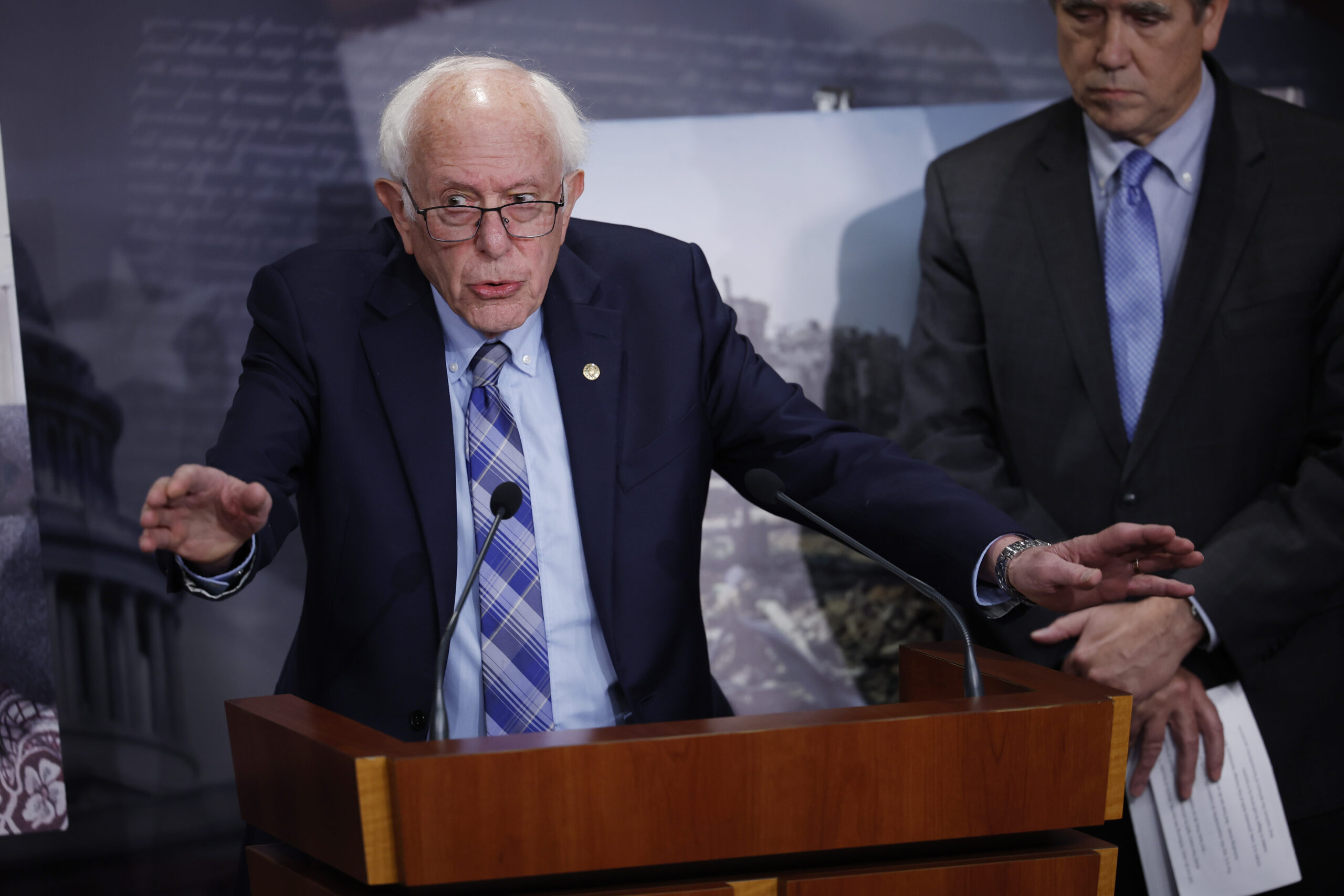
Netanyahu said on Sunday that Jerusalem had previously warned Australia’s PM that Palestinian statehood recognition endangered Jews in the country
Plus, WH adds Syria and Palestinians to travel ban

Smith Collection/Gado/Getty Images
U.S. Coast Guard cutter with crew on deck sailing through foggy harbor waters with Golden Gate Bridge faintly visible in background, San Francisco, California, December 6, 2025.
Good Tuesday afternoon!
This P.M. edition is reserved for our premium subscribers — offering a forward-focused read on what we’re tracking now and what’s coming next.
It’s me again — Danielle Cohen-Kanik, U.S. editor at Jewish Insider and curator, along with assists from my colleagues, of the Daily Overtime. Please don’t hesitate to share your thoughts and feedback by replying to this email.
📡On Our Radar
Notable developments and interesting tidbits we’re tracking
The co-chairs of the House Bipartisan Task Force for Combating Antisemitism are urging Australian Prime Minister Anthony Albanese to act more forcefully to protect Australia’s Jewish community and implement months-old recommendations from the country’s antisemitism envoy, Jewish Insider’s Marc Rod reports.
In a letter sent today, the lawmakers said that there were repeated “warning signs” before the Sunday massacre in Sydney targeting a Hanukkah celebration, including firebombings of synagogues, graffiti, assaults and threats of violence, which “have now led to a tragic reality.”
They noted that Jillian Segal, the Australian special envoy to combat antisemitism, released 49 recommendations to be implemented across a range of institutions in July, and questioned what the Australian government has done to enact that plan and how it will protect the Jewish community going forward…
The Coast Guard quietly implemented its new policy downgrading the status of swastikas from prohibited hate symbols to only “potentially divisive,” after having said it would scrap the change due to widespread backlash, including from members of Congress…
The Trump administration expanded its travel ban today to include individuals from five additional countries, among them being Syria, which the White House has otherwise been welcoming into the international community, as well as individuals with Palestinian Authority-issued travel documents…
The Department of Defense is preparing for a major restructuring, The Washington Post reports, including consolidating U.S. Central Command, European Command and Africa Command under a new organization called the U.S. International Command. “Such moves would complement other efforts by the administration to shift resources from the Middle East and Europe and focus foremost on expanding military operations in the Western Hemisphere,” sources with knowledge on the matter told the Post…
The U.S. and Qatar are drawing up contracts for Doha’s acquisition of F-35 fighter jets, Israeli media reports, raising concerns about the Jewish state’s qualitative military edge among Israeli officials. In response, they are reportedly compiling their own package of requests from the U.S., including more advanced fighter jets and munitions…
A conference hosted by CENTCOM in Doha today with dozens of countries to work on the International Stabilization Force for Gaza did not make meaningful progress, a European official told The Times of Israel, including failing to adequately determine the force’s mandate and its role in disarming Hamas…
A new Siena poll of New York voters released today found 35% of Jewish respondents view New York City Mayor-elect Zohran Mamdani favorably, up from the 18% of respondents who said the same last month. Among all respondents, Democratic Gov. Kathy Hochul led GOP challengers in head-to-head matchups with both Rep. Elise Stefanik (R-NY) and Nassau County Executive Bruce Blakeman; Hochul received around 50% of the vote to Stefanik’s 30% and Blakeman’s 25%…
Harmeet Dhillon, assistant attorney general for civil rights at the Department of Justice, said today that her office would investigate a disturbing video of several Orthodox Jews being harassed and physically assaulted in the New York City subway…
The guest list for a New York Young Republicans gala last Saturday, which was attended by members of Germany’s far-right Alternative for Germany (AfD) party, also included a former producer for former Rep. Matt Gaetz’s (R-FL) show who was fired for posting an animated video depicting Jews as cockroaches counting money; Jared Taylor, the editor of a white supremacist website called American Renaissance; and a streamer who goes by Sneako, known for posting antisemitic content, the Jewish Telegraphic Agency reports. Neo-Nazi Nick Fuentes also claimed he received an invitation, which was rescinded at the last minute…
Administration officials lined up to release statements in defense of White House Chief of Staff Susie Wiles after a Vanity Fair interview released this morning quoted her maligning President Donald Trump and his top Cabinet secretaries, which she said was “disingenuously framed” (though Trump himself said he agreed with her characterization in the interview that he has an “alcoholic’s personality”).
In one of several conversations with author Chris Whipple, Wiles said about Trump’s October appearance at the Knesset, where he lauded Israeli Prime Minister Benjamin Netanyahu and Israel’s war effort, “I’m not sure [Trump] fully realizes that there’s an audience here that doesn’t love it.”
Whipple also asked Secretary of State Marco Rubio if he would challenge Vice President JD Vance in the 2028 Republican presidential primary, to which Rubio said, “If JD Vance runs for president, he’s going to be our nominee, and I’ll be one of the first people to support him”…
Months after the merger of Paramount Skydance brought new leadership to CBS News, including The Free Press’ Bari Weiss as editor-in-chief, in part to address the channel’s perceived bias, Trump wrote on social media today, “For those people that think I am close with the new owners of CBS, please understand that 60 Minutes has treated me far worse since the so-called ‘takeover,’ than they have ever treated me before. If they are friends, I’d hate to see my enemies!” Trump has previously spoken positively of David Ellison, Paramount’s CEO, who has engaged extensively with the White House, including about an ongoing bid to acquire Warner Bros. Discovery…
New York magazine profiles Weiss’ journey from The New York Times to The Free Press to CBS News, where her hiring allowed Ellison to “signal with a single stroke that the new CBS News was pro-Israel, anti-woke, and MAGA-amenable — all attributes Weiss spent years cultivating in L.A. and that could come in handy in Ellison’s dealings with the Trump administration”…
⏩ Tomorrow’s Agenda, Today
An early look at tomorrow’s storylines and schedule to keep you a step ahead
Keep an eye out in Jewish Insider for a preview of the race for Pennsylvania’s 7th Congressional District, where Gov. Josh Shapiro’s endorsement in the Democratic primary may be a sign of how he hopes to build political capital as he prepares for a possible 2028 presidential campaign.
Conservative pro-Israel commentator Ben Shapiro will sit for a discussion tomorrow with embattled Heritage Foundation President Kevin Roberts. Their conversation comes amid heightened debate on the political right about antisemitism and anti-Israel animus, sparked by Roberts’ defense of podcaster Tucker Carlson after he platformed neo-Nazi Nick Fuentes. (Two more Heritage board members resigned today over the scandal.)
The Israeli Embassy in Washington will host its Hanukkah reception and Jewish members of Congress — including Senate Minority Leader Chuck Schumer (D-NY), Sens. Brian Schatz (D-HI), Jacky Rosen (D-NV) and Richard Blumenthal (D-CT) and Reps. Brad Schneider (D-IL), Brad Sherman (D-CA), Craig Goldman (R-TX), Dan Goldman (D-NY), David Kustoff (R-TN), Debbie Wasserman Schultz (D-FL), Greg Landsman (D-OH), Jan Schakowsky (D-IL), Jared Moskowitz (D-FL), Jerry Nadler (D-NY), Josh Gottheimer (D-NJ), Max Miller (R-OH) and Randy Fine (R-FL) — will host the annual Capitol Hill Hanukkah celebration.
In the evening, President Donald Trump will deliver an end-of-year address to the nation.
Stories You May Have Missed
SLOGAN UNDER SCRUTINY
Sydney Hanukkah massacre leads New York Democrats to grapple with ‘globalize the intifada’ rhetoric

Jerry Nadler protege Micah Lasher: ‘The spread of violence against Jews is intertwined with the social acceptability of violent rhetoric directed at Jews’
VANCE’S VIEW
JD Vance links youth antisemitism to immigration, demographics of Gen Z

‘I would say there’s a difference between not liking Israel (or disagreeing with a given Israeli policy) and anti-semitism,’ the vice president added





